





























As a firm built on relationships, our handshake matters. It means a warm greeting, the privilege of doing business together and knowing you can count on us.
Our performance builds relationships with our clients, many of whom have become old friends. It’s why shaking hands with us means just a little bit more.



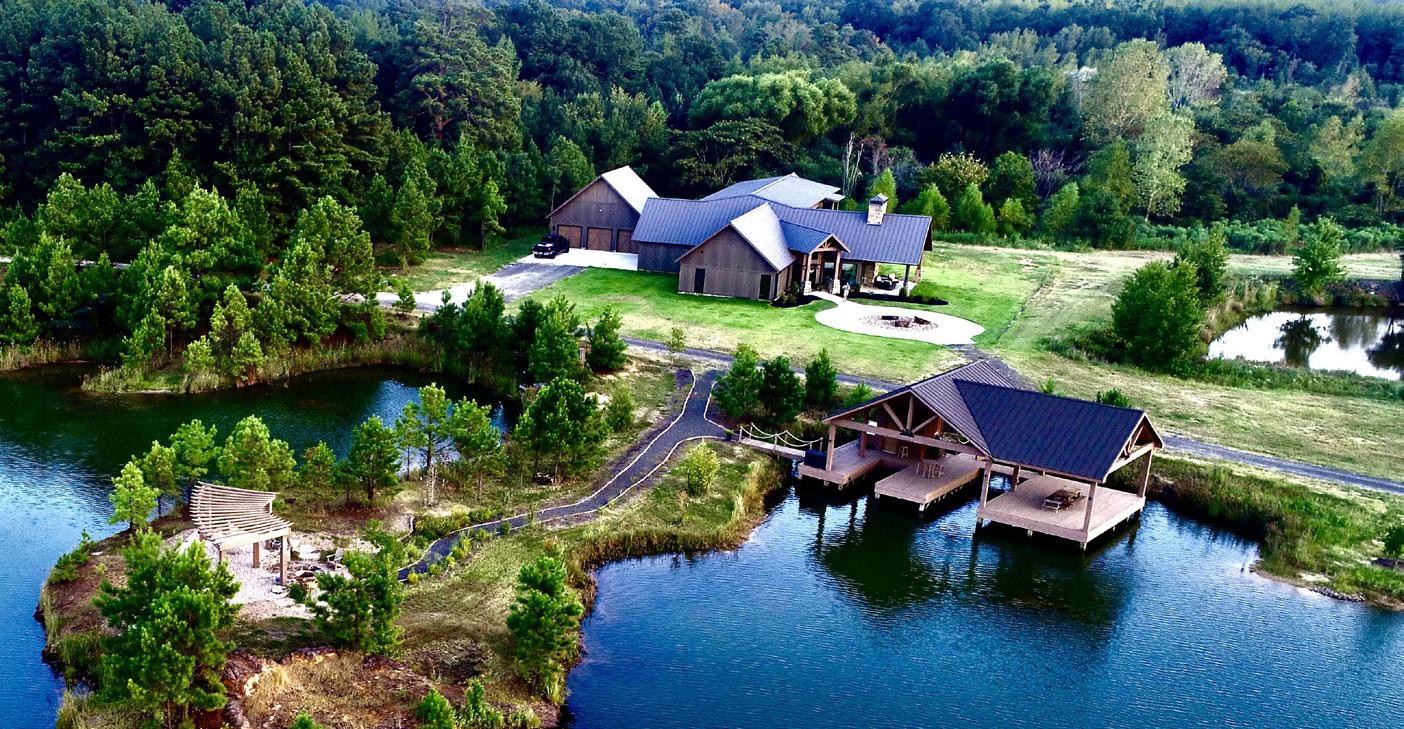
Generations of farmers, ranchers, homeowners and ag investors have relied on AgHeritage Farm Credit Services for loans and financial services.
We can help you live the life you’ve chosen.


AgHeritageFCS.com





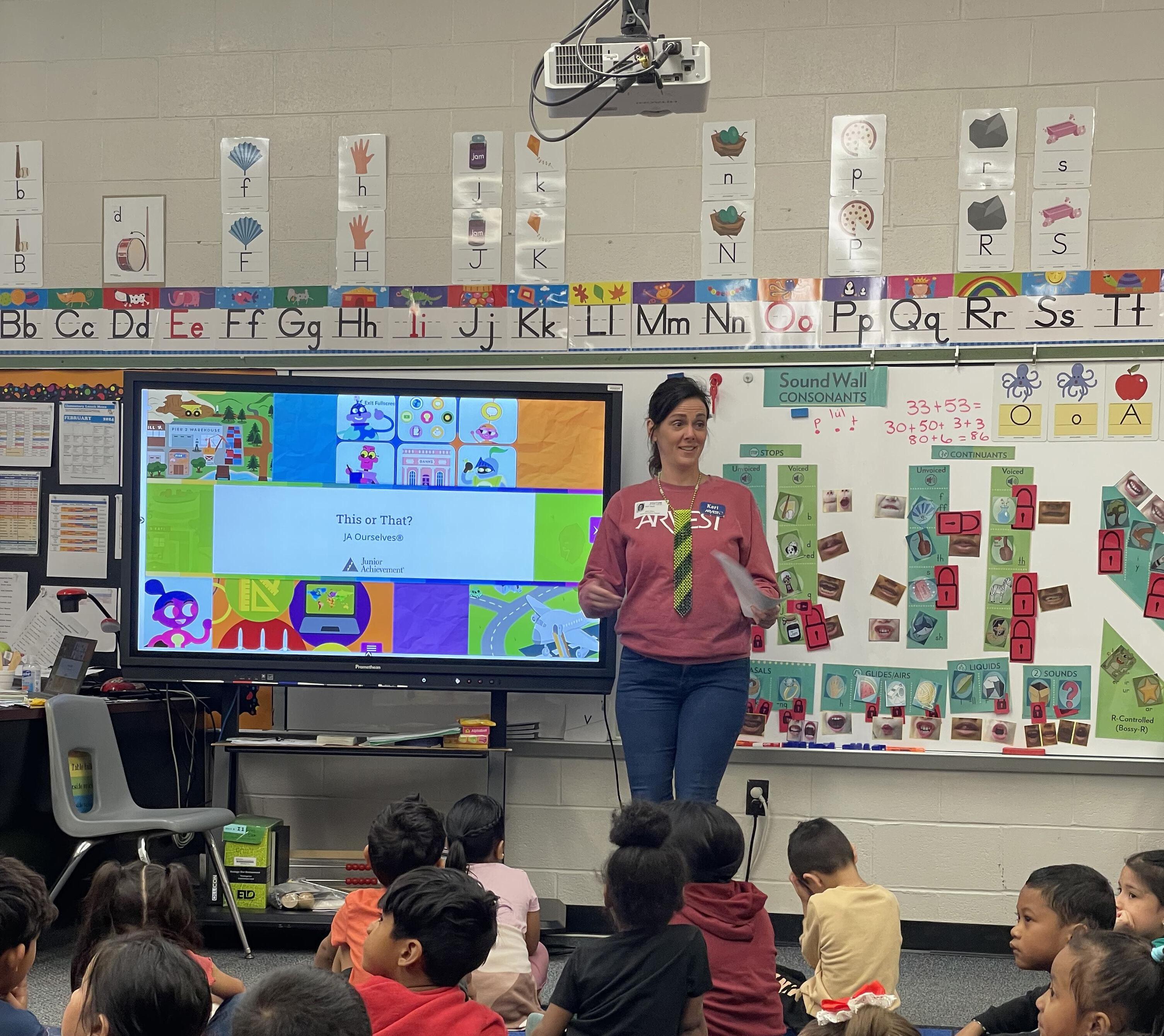
The mission of Junior Achievement of Arkansas — teaching kids about financial literacy and responsibility — is shared by some of the state’s biggest power brokers.
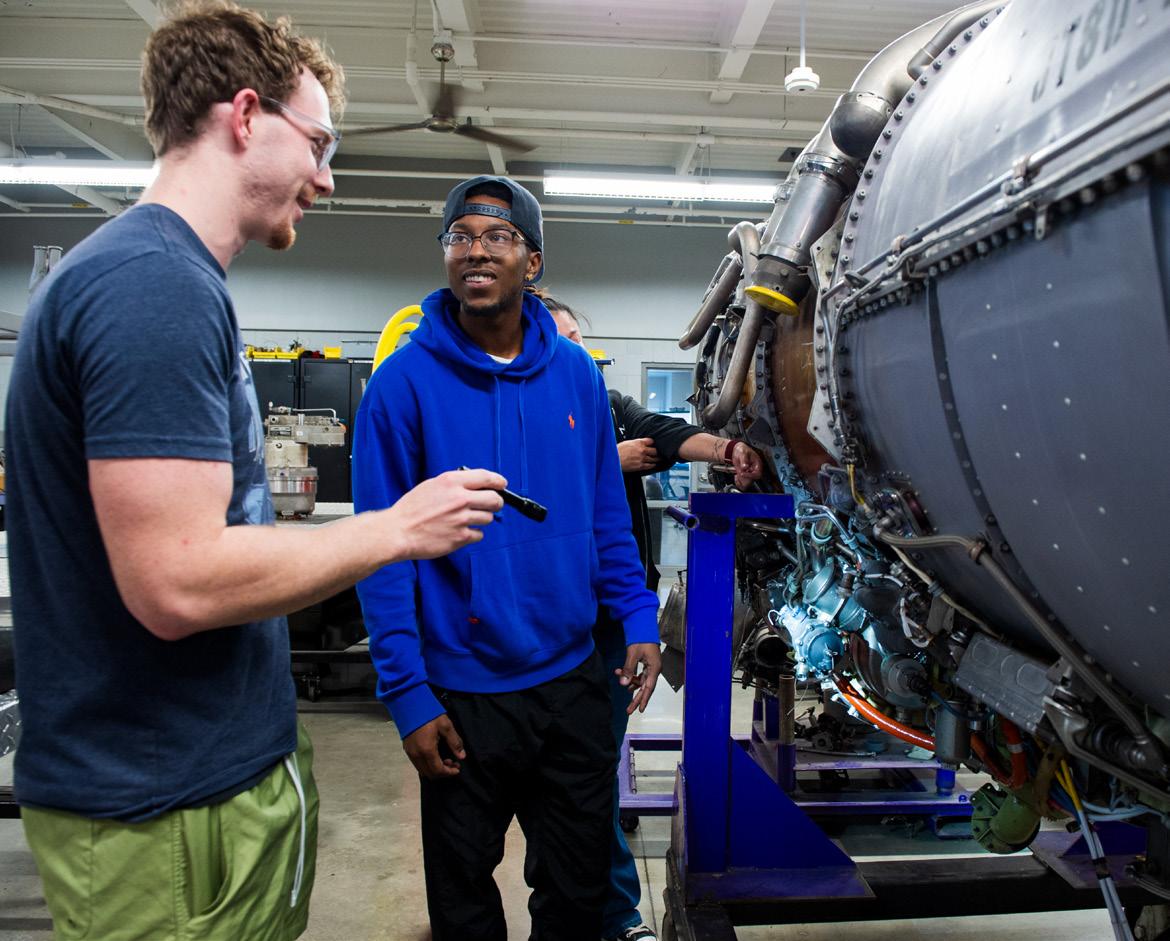
Caleb Huett, a 24-year-old flight captain for NetJets, had no aviation experience or connections when he enrolled in Ozarka College’s aviation program after high school.

DOLLARS PER ACRE
Agricultural row-crop and grain-production land has seen strong appreciation over the past several years, particularly with large farms.
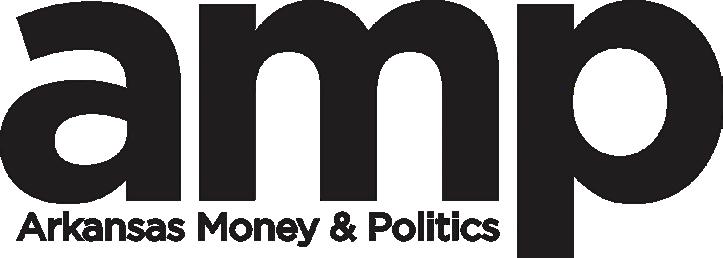

As women achieved near parity of numbers in many other industry segments, trucking remains a male-dominated industry.

The creation of a Lockheed Martin foreign pilot training center in Fort Smith could have a yearly economic impact of $500 million to $1 billion.

ArcBest’s two new revolutionary logistics products, the Vaux Freight Movement System and Vaux Smart Autonomy, represent two giant steps forward.

Beef, as the advertising tagline goes, is what’s for dinner. What if dinner featured some options to beef as we know it?
Heather Baker | hbaker@armoneyandpolitics.com
EDITOR-IN-CHIEF
Dwain Hebda | dwain@armoneyandpolitics.com
SENIOR EDITOR
Mark Carter | mcarter@armoneyandpolitics.com
ASSOCIATE EDITORS
Sarah Coleman | scoleman@armoneyandpolitics.com
Mak Millard | mmillard@armoneyandpolitics.com
EDITORIAL COORDINATOR
Darlene Hebda | darlene@armoneyandpolitics.com
STAFF WRITER
Sarah DeClerk | sdeclerk@armoneyandpolitics.com
MANAGING DIGITAL EDITOR
Kellie McAnulty | kmcanulty@armoneyandpolitics.com
ONLINE WRITER
Kilee Hall | khall@armoneyandpolitics.com
PRODUCTION MANAGER
Mike Bedgood | mbedgood@armoneyandpolitics.com
GRAPHIC DESIGNERS
Lora Puls | lpuls@armoneyandpolitics.com
Jenna Kelley | jkelley@armoneyandpolitics.com
SENIOR ACCOUNT EXECUTIVE
Greg Churan | gchuran@armoneyandpolitics.com
ACCOUNT EXECUTIVES
Mary Funderburg | mary@armoneyandpolitics.com
Karen Holderfield | kholderfield@armoneyandpolitics.com
Jona Parker | jona@armoneyandpolitics.com
Dana Rodriquez | dana@armoneyandpolitics.com
Bethany Yeager | bethany@armoneyandpolitics.com
EXECUTIVE ASSISTANT
Jessica Everson | jeverson@armoneyandpolitics.com
ADVERTISING COORDINATORS
Angela-Maria Jones | ads@armoneyandpolitics.com
Allison Runyon | ads@armoneyandpolitics.com
CIRCULATION circulation@armoneyandpolitics.com
ADMINISTRATION billing@armoneyandpolitics.com
CEO | Vicki Vowell
TO ADVERTISE call 501-244-9700 email hbaker@ armoneyandpolitics.com
TO SUBSCRIBE armoneyandpolitics.com/subscribe
In honor of AMP’s 10-year anniversary, the Top Ten installment once again recognizes 10 Arkansans who have made a difference in their fields.
Pharmacists Rebecca and Gary Whittington and their teenage kids used innovation to help in the fight against opioid overdoses.
CONTRIBUTORS
Becky Gillette, Terrance Armstard, Kenneth Heard, Jamison Mosley, John Alan Nelson, Steve Spencer, Todd Traub
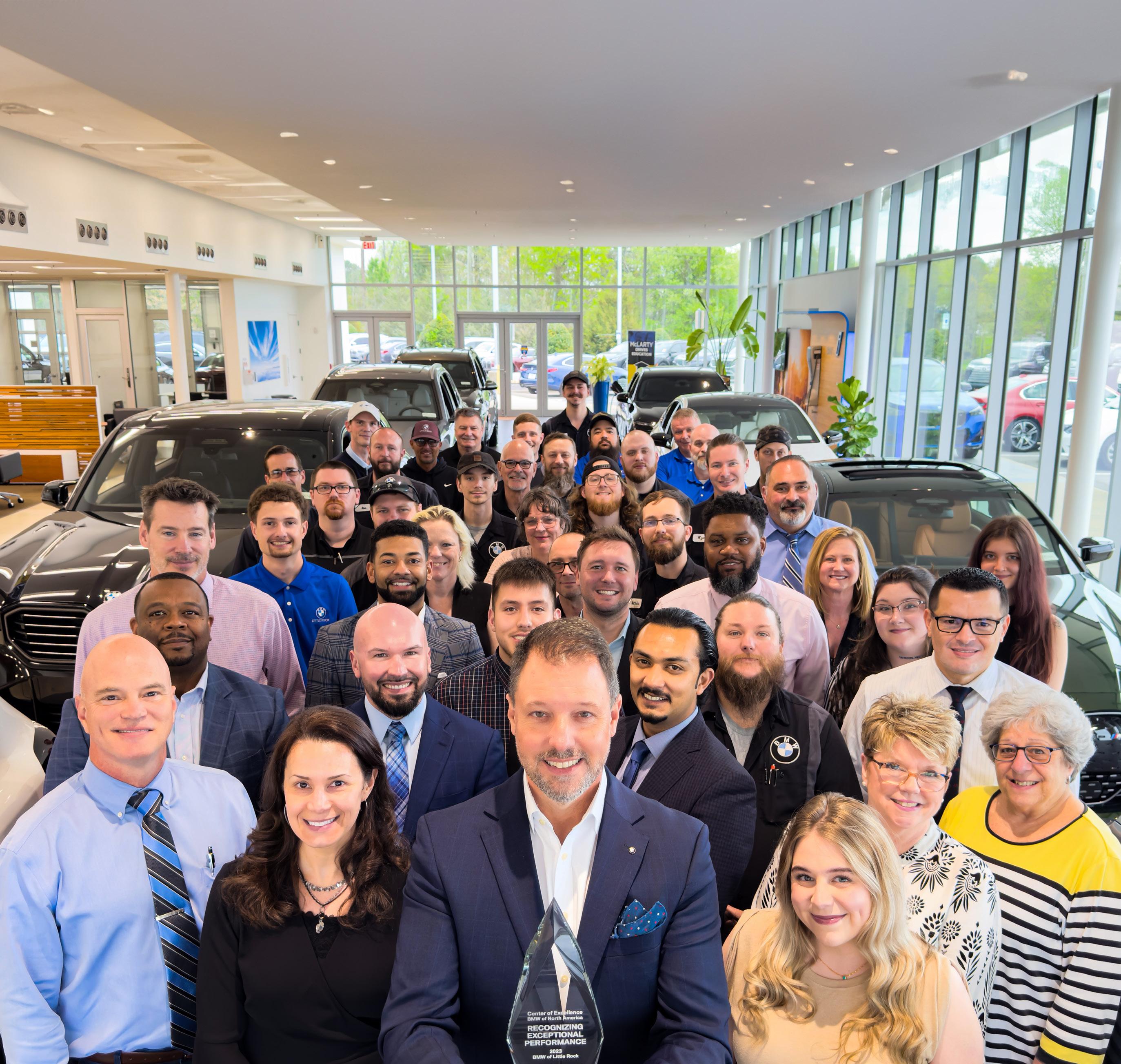


A trio of Arkansas power brokers — Sheffield Nelson, Jerry Jones and Mack McLarty — are helping Junior Achievement of Arkansas fulfill its mission of equipping kids with financial literacy.
(See story, page 12.)
FORTUNATE SON: WARREN STEPHENS’ SUCCESS CARRIES FORTH A FAMILY LEGACY
You were correct in saying, there was only one Jack and Witt, amazing men that went through decades of growth. You have made them proud in your leadership and in turn your children are saying, there is only one Warren. Blessings for the continuation of the Stephens Legacy.
Deborah D Phillips
STONE BANK HIRES EDMONDS AS MARKETING & DIGITAL MEDIA MANAGER
Awesome! Michelle is amazing!
Jennifer Wells
EDWARDS FOOD GIANT TO OPEN IN LAKEWOOD VILLAGE
Counting down the days!
Angela Voyles Golden
2024 AMP INFLUENCERS OF THE YEAR: CHARISSE CHILDERS
Congratulations Dr. Childers!
Angela Kremers
HEADS UP: TRAILBLAZING NEW PROVINCE GROWS BRAND WHILE FINDING SYNERGY WITH ANOTHER BREW
Very proud of New Province and being a part of their vision. Thankful to call New Province Brewing home for our food truck.
Crows Nest Cafe
March 5 — April 1
1 Fortunate Son: Warren Stephens’ Success Carries Forth A Family Legacy
2 Capital Hotel Announces Renovations
3 The Great American
Village
8 New Amazon Last-Mile Facility Expected for Hot Springs
9 Furniture Consignment Shop in Conway to Close
10 Four Join Arkansas Business Hall of Fame
Stone Bank CEO Nick Roach’s title was listed incorrectly in the March issue. His correct title is chief executive officer, director and president.
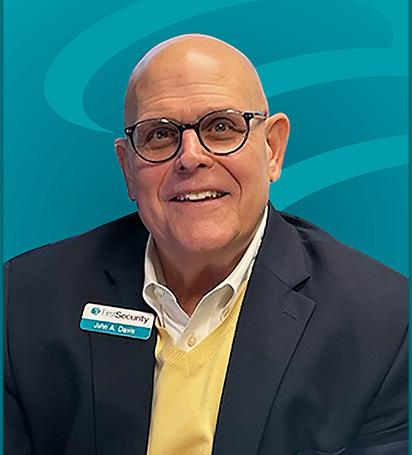
John Davis, who has served as the president of First Security Bank –North Little Rock since 2013, has announced his retirement at the end of March.

A catered meal is a must for almost any meeting or event, and sometimes, such fare is the most anticipated part of the gathering. When it comes to a sales presentation, a quarterly catchup or even a wedding, Rx Catering in Little Rock can be just what the doctor ordered.
Afew things to consider about this latest round of coaching roulette, Arkansas-style. As usual, it was a bumpy ride but ultimately, the little ball rested on seven when Hunter Yurachek pulled a John Calipari out of his, er, John Tyson’s hat.
First, the experience for Hog fans of Razorback coaching searches must be something like smoking the secretions of the Sonoran Desert toad, aka Bufo alvarius: psychedelic, guaranteed to produce a wild trip and sometimes even fatal.
(I’m not convinced the mysterious 1914 disappearance of American author and war correspondent Ambrose Bierce in northern Mexico wasn’t connected to the desert trip frog.)
Indeed, would-be day-trippers have not come back, much less down, from a Bufo high; no deaths have been reported as the result of an Arkansas coaching search, although many Hog fans likely found themselves on the proverbial edge before Yurachek was transformed from stooge to genius the instant Matt Norlander at CBS Sports hit send.
Secondly, the Hogs got a coach in Calipari with hall-of-fame bona fides who is considered the best recruiter in the game and, most importantly, just might be anxious to prove he still has it. Cal’s run at
Kentucky — one national title and six Final Fours — had run its course following a string of no SEC titles and first- and second-round NCAA exits. Following the Wildcats’ latest lackluster March, villagers across the Bluegrass State were making runs on pitchforks. The coach and his former school each needed a reset, and Arkansas needed some instant lightning in a bottle. Cal to Arkansas delivered a rare winwin-win trifecta.
Next, what Cal to Fayetteville did was show the college sporting world that Arkansas indeed intends to sit at the big boys’ table in the NIL era. Not only will Calipari earn more than $8 million each year in salary, but he’ll also have what national writers reported will be the biggest pool of NIL money available in college hoops — between $5 million and $6 million a year.
Whether Tyson’s latest commitment to Razorback athletics will loosen the purse strings of other potential big-money donors (Hunts notwithstanding) who may be waiting to see some sustained success remains to be seen. Hog fans have long wondered how the program could seemingly fall behind its peers in NIL when northwest Arkansas alone is home to so many homegrown Fortune 500 types. Perhaps fans can now breathe a sigh of relief.
Lastly, what the hire shows is that — on paper, at least — Arkansas is a basketball school. The head roundball Hog makes more than twice as much as the head Hog roaming the gridiron, and if Razorback football has been gifted a Tyson-like NIL commitment to football, it’s the most effectively well-kept secret ever.
Raise your hand, Razorback fan, if you ever cussed Calipari in the privacy of your den or man cave, whether he was coaching UMass, Memphis or UK. (And he’s coached against the Hogs at each of those schools).
Raise your hand if you exalted in divinelike ecstasy at the site of Cal being tossed out as decibels exploded and Wildcats players covered their ears inside Bud Walton Arena two years ago. Cal lost that individual battle, but his team, properly invigorated, came back to win the war, of course.
John Calipari. John freakin’ Calipari. Never in a million years would I ever have placed his name and Arkansas coaching search in the same sentence, much less the same universe. And what more appropriate day for news to settle that he would be the next head Hog for hoops than on the day of the total eclipse. But when it comes to Arkansas coaching searches, there’s never any telling what will emerge at the end of the ride.
By Heather BakerMy route to and from work each day takes me through the path of the tornado that skipped across Little Rock in March 2023. Driving east on Cantrell Road toward downtown, the landscape changes fairly dramatically once you drive past Reservoir Park. A canopied drive becomes open air, and the storm aftermath that reveals itself resembles the path of a lawn mower through an overgrown yard. Office and apartment buildings remain in various states of repair and some businesses, like the iconic original Purple Cow, have yet to reopen.
Considering the amount of destruction left behind in central Arkansas and, ultimately, in other parts of the state, it’s a miracle only one person was killed in that storm, but such is life in Arkansas — dealing with spring storms, that is.
Spring storms are part of the package deal we sign up for in Arkansas, but in return, we get to enjoy the blooming dogwoods and
azaleas and the beauty of planting season on farms throughout the Natural State while we look ahead with optimism about what’s to come.
The April issue of Arkansas Money & Politics features a focus on agriculture in Arkansas. We’ll look at the state’s nation-leading rice production, the challenges associated with the costs of running a farm, the evolution of technology on the farm and the state’s protein producers, as well as the trend towards other forms of meat.
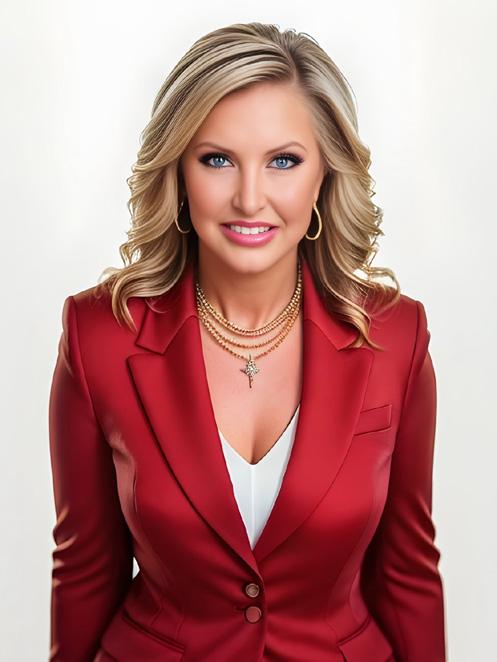
Transportation is also a focus in April, and Arkansas is a national leader. Inside, we sit down with Shannon Newton, president of the Arkansas Trucking Association, to discuss how the industry in Arkansas has represented such a good opportunity for women leaders.
Plus, we’ll feature Junior Achievement of Arkansas, an organization strongly backed by some influential Arkansans, including the trio seen on this month’s cover.
There’s a lot to take in and enjoy. Thank you for allowing us to share these good stories of Arkansas. Hit me up with any comments or story ideas at HBaker@ ARMoneyandPolitics.com.
Proximity to the Mississippi River and seemingly endless acreage available for development in America’s heartland have always been selling points for Blytheville.
That’s what first drew the United States government to build an airstrip on 2,600 acres in Mississippi County in 1942, and Blytheville was viewed as such a strategic advantage to our nation that the Air Force expanded its presence on another nearly 2,000 acres in the 1950s. While the military ceased consistent operations there 30 years ago, the geographic assets that made Mississippi County attractive for aerospace and defense remain today.
Five miles from the Mississippi River and just off Interstate 55, half the United States is less than a day’s drive away. With thousands of acres available and with rail, interstate and river transportation all converging in Mississippi County, the region is ripe for continued growth.
Then there is the airport itself. Theoretically, you could land a 747 from the north and a 747 from the south at the same time, and they would never touch. Nowhere else in the state — and few other towns in the United States — offers the availability of an 11,600-foot-long, 300-foot-wide runway (plus additional 1,000-foot-long runoffs on each end). Even if they had the space available, an airfield the size of the Arkansas International Airport (the former Eaker Air Force Base) would cost at least $2 billion to build today. That is why 35 companies, including Aviation Repair Technologies, call the Arkansas Aeroplex home and why we regularly field calls from global commercial enterprises, as well as military and military-adjacent operations. American military units from as far away as Florida and New Mexico use the base for training exercises. Those fly-ins generate fuel and use fees that are reinvested back into the city, county and state. Boeing, Lockheed Martin and Textron Aviation have all used the base for testing and training. Both Air Force One and Air Force Two have used the facility on occasion. Multiple e-commerce and distribution companies have inquired about expanding there, and so have firms that perform helicopter maintenance. That level of interest isn’t surprising given its assets and considering the state is well positioned in the aerospace and defense industry.
at approximately 150 companies with an average wage approaching $70,000 annually.
Those high-skill, high-dollar jobs are exactly what the state economy needs to continue growing, and those are exactly the kind of jobs Mississippi County has provided for years. Steel producers, like the military before them, took note of the natural assets in the region and have invested heavily for the past 38 years. As the steel industry continues to blossom in the region, Mississippi County actively seeks ways to diversify its economy. It sees some of the greatest opportunities in aerospace and defense.

Representatives from the county will attend the National Business Aviation Association Convention & Exhibition in Las Vegas and the Farnborough International Airshow in England. I will head to Washington, D.C., the first week of November for a visit with military and congressional leadership. Seeing the possibilities ahead, we in Mississippi County are actively investing and seeking investment in what we believe to be the most underutilized economic development resource in Arkansas. Congress recently approved Mississippi County for $2 million in funding for further clean-up efforts at the air base. In addition to our terrific geographic location and Arkansas’ aggressive economic development incentivizing, Mississippi County also has the power to issue revenue bonds to organizations that are interested in investing in the county. Those bonds simplify the process for financing major infrastructure projects, from hangars to distribution warehouses. While we are grateful for the state and national funding, we’re just as willing to invest in ourselves. Mississippi County was the first county in the state to fund an economic development foundation through a sales tax. That move has helped incentivize the steel industry growth and could assist with additional economic development growth around aerospace and defense. Plus, we invested $1 million on runway improvements in 2023.
We have the vision. We have the interest. We have the space. The sky’s the limit in Blytheville and Mississippi County.
Today, the industry ranks as the state’s top exporter. A 2022 report from the Arkansas Economic Development Commission notes that aerospace and defense exports made up more than $890 million annually. Nearly 9,000 Arkansans work in aerospace and defense jobs
Judge John Alan Nelson is serving his sixth year as the chief executive officer for Mississippi County. Nelson, a licensed pilot, has presided over sales tax revenue increases of nearly $11 million, and he and his team recently secured National Cold War Center designation from Congress at the former Eaker Air Force Base in Blytheville.
The research community is inundated with data, particularly data that involves genes, proteins and small molecules. Today, data is measured in petabytes, one of which is equal to 1,000 terabytes. One petabyte could store the data contained in 20 million filing cabinets that contain 500 billion pages of printed text.
Thanks to advanced sequencing technologies that literally map the entire genome, the amount of biological and clinical data generated in the past decade is overwhelming. Obtaining and collecting data isn’t the limiting factor anymore. Extrapolating meaningful, useful information from the data is the challenge the scientific community faces. We need individuals with the skills necessary to parse and interpret the growing mountain of data.
Enter Arkansas Research Alliance Academy member Mary Yang, a professor of information science at the University of Arkansas at Little Rock and the lead instructor for bioinformatics courses. Broadly speaking, bioinformatics is a multidisciplinary field that encompasses molecular biology, genetics, computer science, mathematics and statistics. Yang’s leadership in the Systems Genomics Laboratory at UA Little Rock is not just about managing data; it’s about pioneering new pathways in science and education and preparing the next generation of Arkansans to navigate and conquer the data mountain.
“We continue to develop and grow in this field,” Yang said. “Working on human data, for example, requires a great many people with biomedical and computational skills. This is an opportunity for Arkansans to compete for or create high paying jobs, which is a benefit to our state’s economy.”
wards building that valuable professional workforce.
“Students graduate from our bioinformatics program, and they have a job offer immediately,” Yang said, “and half of them work in Arkansas .”
Bioinformatics specialists are in high demand at places like the University of Arkansas for Medical Sciences in Little Rock and the Food and Drug Administration’s National Center for Toxicological Research in Jefferson County. Both are vital research centers that parse and process enormous stockpiles of data in the pursuit of new drugs and therapies. The challenge, Yang said, is “reducing the noise and pinpointing the precise molecular targets from vast amounts of data.”
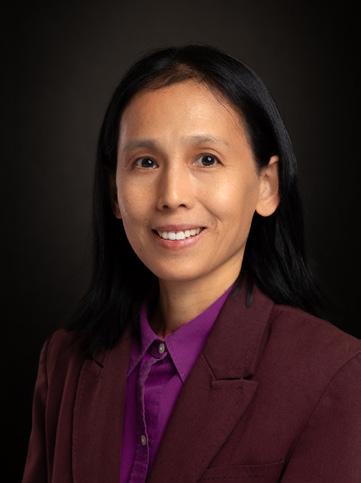
“For example, everybody knows that cancer is caused by genetic mutation,” she said. “Consider that the human genome is 3 billion base pairs of DNA, but among these, maybe 1 percent or less leads to cancer or other diseases. That’s an incredible amount of data to sift in search of that 1 percent.”

Yang said artificial intelligence is valuable, but scientists are still needed to conduct research. (Photos provided)
Creating a specialized community that understands the complex computational challenges in bioinformatics is a catalyst to supercharging Arkansas’ burgeoning innovation economy. Yang’s Systems Genomics Laboratory is a promising step to-
Artificial intelligence could prove valuable in assisting bioinformatic specialists, but the technology is not a cure-all.
“The strength of AI is that it can handle very large data and make quick computations,” Yang said, “but you still need scientists to conduct the research. Even AI needs the direction and vision only scientists can provide.”
Mary Yang has published more than 100 research articles and serves as the director of the Joint Graduate Program in Bioinformatics at the University of Arkansas at Little Rock and the University of Arkansas for Medical Sciences. She became a member of the ARA Academy of Scholars and Fellows in 2023.
After releasing its fourth quarter and fiscal year 2024 figures in February, Arkansasbased Walmart once again demonstrated its might as the world’s largest retailer and the one of the most successful corporations humanity has ever seen. The retail behemoth reported numbers that defy the imagination, including $648 billion in fiscal year 2024 revenue, up 6 percent over FY 2023.
Per credit card giant Capital One, Walmart commands 8.6 percent of retail business nationwide and operates 10,000 stores globally. The company serves the rough equivalent of two-thirds of the U.S. population in customers every week and employs 2.1 million people, a headcount equal to or greater than the populations of 16 U.S. states.
The Bentonville-based company’s mammoth success continues to redefine how the world purchases goods, yet ask the former Walmart hourly dock worker who now serves as president and CEO, Doug McMillon, to name the biggest threat to future prosperity and, along with fickle consumer habits, the changing matrix of retail and more intense global competition, he will likely name something surprising. For McMillon, one of the most potent threats to the company — and to the nation — is America’s lack of financial literacy.
“Even as our country continues to move past the worst effects of the COVID-19 pandemic, supply chain issues persist. There is growing inflation, labor and wage pressure and rising interest rates,” McMillon co-wrote with John Hope Bryant, founder, chairman and CEO of Operation HOPE, in a June 2022 piece for Time. “While Americans work to make sense of all this — and plan around it — lack of financial literacy makes it difficult for many. Over the long run, this lack of knowledge puts the American Dream at risk for millions.
“We believe the private sector has an opportunity and a responsibility to help address this by providing employees, families, customers and communities with increased access to financial education.”
Back here in Arkansas, companies are living up to that responsibility through Junior Achievement, a nonprofit dedicated to exposing children, youth and young adults to the topics of money, finance, entrepreneurship and the world of work. Junior Achievement partners with school systems and businesses statewide to deliver on its mission through age-appropriate educational programming delivered by scores of volunteers reaching 22,000 students every year.
McMillon and Walmart have partnered to support
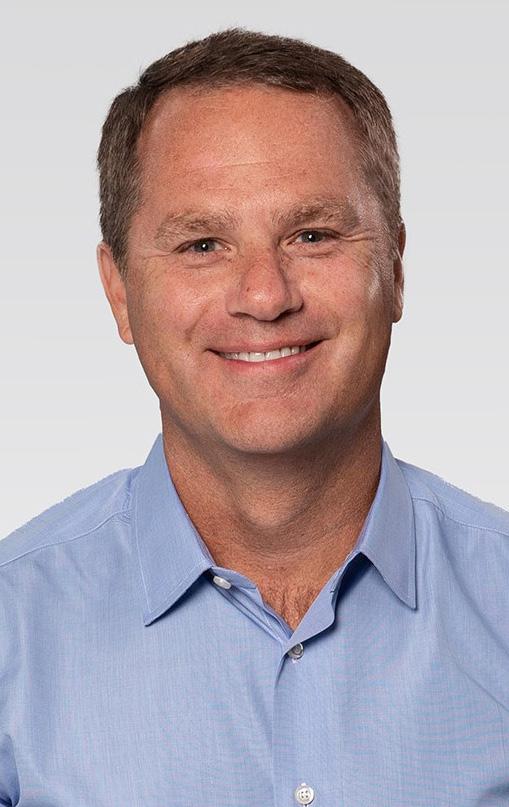

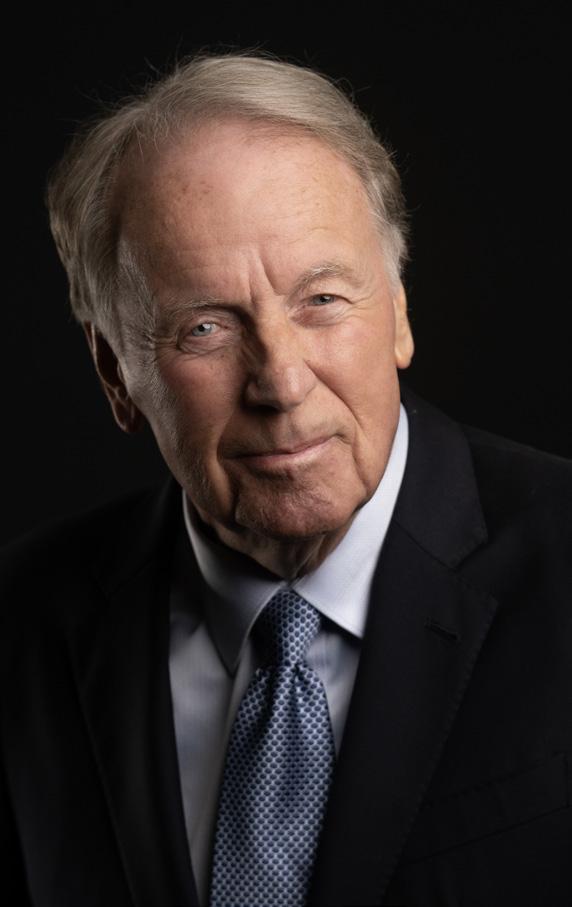
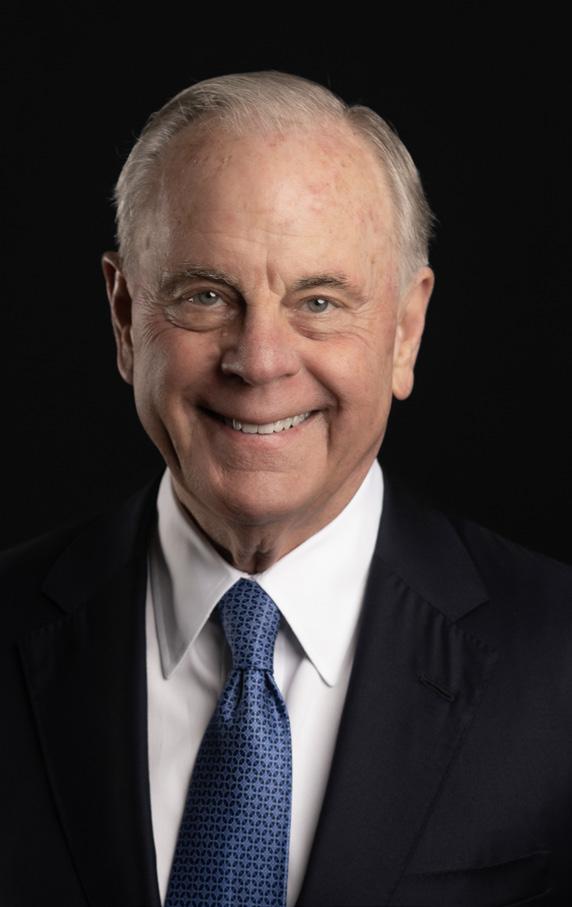
JA’s education and youth development for more than 15 years. For this unwavering commitment, McMillon will be honored with the organization’s Legacy Award, which will be presented at the inaugural Hall of Fame Gala in May.
“Doug’s dedication to education and workforce training makes him particularly deserving of this honor,” said Tonya Villines, president and CEO of Junior Achievement of Arkansas. “His experiences and success provide an inspiration to the younger generation to pursue their dreams with dedication and hard work.”
According to the 2021 TIAA Institute-Global Financial Literacy Excellence Center Personal Finance Index, America has writhed in the steadily tightening grip of financial illiteracy for five generations. Among the socalled Silent Generation, those individuals born between 1927 and 1947, and the baby boomers born between 1946 and 1964, only 55 percent of people surveyed could demonstrate a grasp of basic financial concepts.

With Generation X, made up of people born between 1965 and 1980 and Gen Y (also known as millennials), born between 1981 and 1996, this less-than-impressive level of understanding began to slip further, registering at 49 percent and 48 percent, respectively. Gen Z, born 1997 to 2012, scored the lowest at 43 percent, but that number should be taken with a grain of salt considering the youngest in the demographic are only 12 years old.
The negative effect the lack of financial literacy is having on individual success and the prosperity of society in general is considerable. In the Time article, McMillon and Bryant cited statistics from the Financial Industry Regulatory Authority that stated only about 33 percent of Americans in 2021 had a working understanding of interest rates, mortgage rates and financial risk, a knowledge gap that cost them $415 billion in 2020 alone.
As a result, they wrote, stress over money issues is at an all-time high, with 80 percent of employees admitting feeling the pressure over their finances. This stress
is linked to multiple health concerns, which can lead to expensive treatments that only compound the issue. Meanwhile, stress-related illness among employees costs American businesses $300 billion annually in lost productivity.
“These are more than just statistics,” McMillon and Bryant wrote. “Behind the numbers are real people: tens of millions of parents, seniors and young people enduring financial stress, personal hardships and strained relationships as they struggle to save, borrow and invest in ways that provide greater financial stability, flexibility and security.”
As the latest high-profile executive to carry the torch for improved financial literacy education in the state, McMillon has very large shoes to fill, starting with Sheffield Nelson, a prominent Arkansas attorney, executive and political figure. It was the self-made Nelson — who rose from desperate circumstances to head Arkansas Louisiana Gas Co. from 1973 to 1984 and twice run for governor — who first came across the fledgling Junior Achievement organization and resolved to bring the program to Arkansas.
“The early days were tough as they are in any new organization,” he said. “You have to first line up your funding and make sure you can stay alive financially. Secondly, you have to start involving the people that you know can make a real difference.”
On both points, Sheffield held two significant hole cards in his pals and fellow titans of Arkansas business, Mack McLarty and Jerry Jones, who he quickly enlisted to the cause. The additional firepower was considerable: in addition to his family’s business interests, McLarty also served as president and CEO of Arkla and would go on to be President Bill Clinton’s chief of staff.
Doug’s dedication to education and workforce training makes him particularly deserving of this honor. His experiences and success provide an inspiration to the younger generation to pursue their dreams with dedication and hard work.
“I grew up very poor in east Arkansas, and it drove me to try to do better, and the way to do better was to get an education,” Nelson said. “I always have had a real interest in education. I think that’s been the best thing that’s happened to me in Arkansas in life is to go through the education system and proceed still further and get a college degree and a law degree.
—Tonya Villines, president and CEO of Junior Achievement of Arkansas
“I read about [the JA organization] and had an interest in it. I had just finished my tenure at Arkla, where I had been for 22 years, and I was in law, and I thought this would be the best chance I’d ever have to take a close look at it, which I did.”
Sheffield launched the Arkansas chapter in 1987 and, despite his own considerable name recognition and clout in the business community, experienced a high level of growing pains getting things off the ground.
“It was kind of a natural,” said McLarty of his decision to get involved. “It just seemed like the right thing to put your shoulder to the wheel and invest the time and energy and hope it paid dividends in terms of really being able to develop and engage young people.
“The fact it was a national organization, to me, gave it a lot of credibility. We weren’t reinventing the wheel. We were building on something that was already in place, even though it was new to Arkansas. Success was not assured by any means; it was a brick-by-brick endeavor helping young people better understand, appreciate and be more knowledgeable of business. It’s very gratifying to see what it has done over the years.”
The other heavy hitter in Sheffield’s lineup, Jones, started his career at his father’s insurance business before moving into oil and gas and, finally, professional sports. He has owned the NFL’s Dallas Cowboys since 1989 and is today widely regarded as one of the most influential executives in professional sports. Like McLarty, Jones said the cause of JA was an easy one to get behind.
“Mack and I both had a great entrepreneurial upbringing,” he said. “We were looking at [Junior Achievement] from different vantage points but both saw what this might do. It’s endless as to the things that you could involve in the program to educate young people
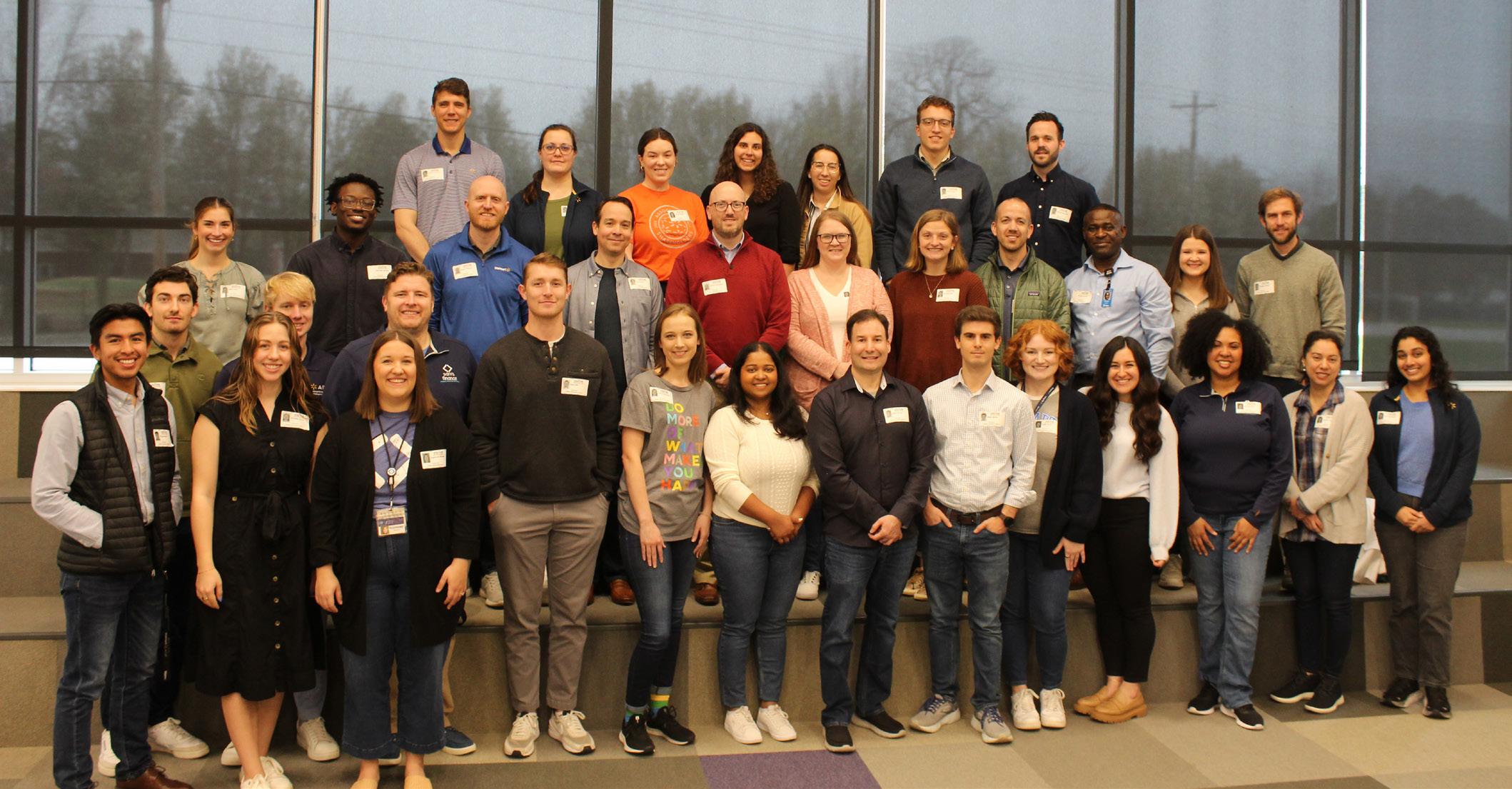
about business and entrepreneurship and all of those principles, both the ethics of it as well as the practice of it. All of those things are part of Junior Achievement.
“Let me just sum it all up: If anybody ever says in the world of entrepreneurship and business that they’re self-made, they aren’t telling it straight. Everybody has had to have a physical helping hand, as well as a knowledgeable hand, as well as encouragement — everybody. That’s Junior Achievement to me.”
The lifeblood of the Junior Achievement program are volunteers, thousands of whom deliver the curriculum to kids from kindergarten through high school. Time commitment can vary from one full day to one class period a day spread out over a week or several weeks. Volunteers are equipped with presentation materials prepared by the organization but are also highly encouraged to lend additional insights from their own personal careers and business experiences.
“JA has had a history as a catalyst in our community to create change by collaborating with long-standing partners in the education space, as well as local businesses,” Villines said. “Countless goals have been achieved thanks to these supporters that have helped expand our student reach across the state, counties and schools. These leaders have played a pivotal role in driving our mission forward.
“JA’s activities include a blended-learning approach for both in-school and after-school students,
JA exposes young people at the high school level and sometimes much earlier to better understand business, work and provides good examples through the people who teach the Junior Achievement classes.
— Mack McLarty, Chairman, McLarty Companies
extended work readiness, financial literacy, and entrepreneurship programming to young adults. We could not do any of this without our village of supporters, and I’m grateful for their energy and passion to our JA mission.”
The organization continues to evolve to meet the needs of its various audiences, including launching lessons on different platforms and recently rolling out a new job-readiness program targeting young adults ages 19 to 25.
JA provides presentation materials to volunteers,
who also share insights from their careers.
(Photos provided)

“Today’s economy is not working for everyone,” Villines said. “Employers seek skilled and engaged work, yet almost 60 percent of U.S. employees complain about job seekers’ lack of preparation, and more than 3 million young people are disengaged, out of work and out of school. We need a new way to prepare young people for work that meets the needs of employers and employees alike. JA wants to close the gap between employers and entry-level employees.
“This summer, we will be hosting JA Pathways to Success Youth Program to help 500 young adults in central Arkansas develop critical skills and secure job
JA’s activities include a blended-learning approach for both inschool and after-school students, extended work readiness, financial literacy, and entrepreneurship programming to young adults.
—Tonya Villines, president and CEO of Junior Achievement of Arkansas

opportunities. The job placement training consists of 18 hours of training June 10 to 12 designed to lead participants directly to a job or a career-focused education or training program.”
Jones said he has seen the detrimental effect of a lack of financial understanding up close throughout his time in business. He said even multi-million-dollar athletes are not immune to the pitfalls that come with ignorance in financial matters.
“My story is I lived my young life in Rose City out in North Little Rock, where I was under the tutelage of the greatest role models anybody could ever have, and that was my mother and father,” Jones said. “They were the ultimate entrepreneurs; Mother was the ultimate working mom, and they had their own businesses. Around that kitchen table, I heard them not discuss the answers, but discuss the challenges of business.
“Everybody can’t be around driven and gifted entrepreneurial minds like that, however. Seventy percent of the people we draft in the NFL have no male role model in their lives. You are such a product of your environment, and that’s why it’s so essential to display the types of things that youth get to see in Junior Achievement.”
McLarty agreed, saying that the lessons learned through Junior Achievement hold the potential for a far greater societal benefit than merely conveying individual concepts.
“Philosophically, work orders life,” he said. “A good education is so key to having a good, productive and meaningful life, a life lived beyond yourself. It doesn’t directly go with the length of education or any of that although it may have a relation to it. Your teachers were mentors, and that makes such a difference in life, or not, if they were absent.
“In this case, JA exposes young people at the high

school level and sometimes much earlier to better understand business, work and provides good examples through the people who teach the Junior Achievement classes. All of that positively reinforces and builds a stronger community and, at the end of the day, a rising tide lifts all boats. How we educate the next generation, how we support them, the values we try to impart in them the right way, Junior Achievement provides a vehicle to do that. That’s critically important for the future of our state and, more broadly, our nation.”
Both McLarty and Jones underscored Nelson’s impact and drive in getting the chapter started and gaining its initial momentum.
“You couldn’t have had a better leader than in Sheffield, in my mind, who provided a vision and fertile ground to get in and support it any way you can,” Jones said. “Sheffield’s leadership, his energy was contagious, and that had everything to
do with my involvement. I’ve just been amazed at how [the group has] evolved and taken root from his idea and where the organization is today.”
In turn, Nelson deflects such praise to chapter staff and board leadership for the advancements of the JA organization. He said he never could have imagined Junior Achievement of Arkansas would be what it became thanks to the time, talent and treasure of individuals and companies throughout the Natural State.
“I have had a number of people come up to me who finished high school and who have gone on to college who said one of the most important things to them was the influence that we had on them,” Nelson said. “I think what we’ve seen at Junior Achievement is we’ve stayed with it and improved it and tried to step up and help young people today even better than we could have back then.
“I feel very strongly that [the staff and leadership] have done just exactly what I had hoped they’d do. In fact, they worked themselves halfway to death trying to get everything done. Tonya has provided such good leadership, and they’ve got so many strong people involved that I don’t need to do much today but sit back and watch and be happy.”


Female drivers continue to grow in numbers, but much work remainsBy Dwain Hebda

There was a time when Nikki Ray, vice president of Paul Ray Trucking in Nashville, would have been unique to the point of odd for being a woman at the helm of a transportation company.
Ray, who came into the business at the elbow of her father, Paul Ray, was always around the family business and said she never really thought about doing anything else. She did not see a lot of women in trucking growing up, yet ask her what kept her in a male-dominated industry all those years, and the question hits her as peculiar, as if the answer was an obvious, foregone conclusion.
“It’s kind of a family affair all the way around. It’s all that I knew,” she said. “I have my granddad on my mom’s side who was a truck driver, and my dad’s dad started as a truck driver and then opened his own company. Two of my mom’s brothers were truck drivers. I kind of had it on both sides of my family.
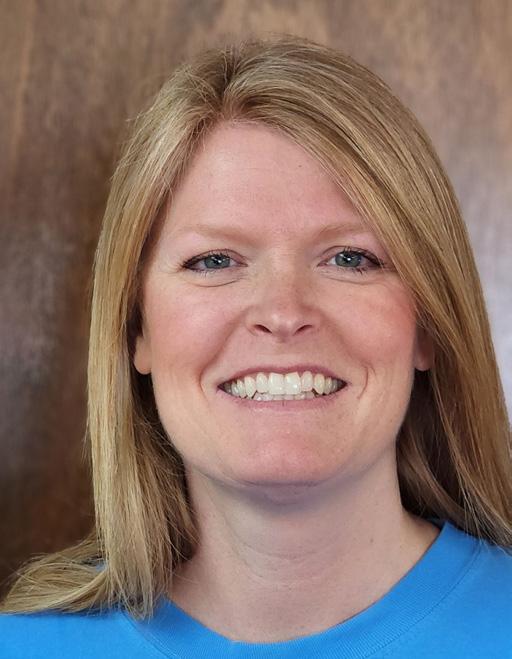
“It was kind of a unique situation for me. I have childhood memories of when my dad worked for his dad, memories out here playing around the trucks, just not even able to work but just playing with
Nikki Ray
It’s kind of a family affair all the way around. It’s all that I knew.
my cousins out here. I’m an only child, and I started helping my dad with paperwork when I was in high school and liked it. I think it was just really always my plan to stay with the family business.”
For many people, there are few industries that fit the image of “male dominated” as clearly as trucking. Even as women have achieved near parity of numbers in many other industry segments — including, interestingly, some of the white-collar positions that help trucking companies run — the owner’s office and behind the wheel are areas that have remained almost exclusively a male domain.
However, as the song goes, “The times, they are a-changin’,” as the number of women in trucking have reached levels previously unimaginable. Thanks in part to the unlikeliest of catalysts, the COVID-19 pandemic and the ecommerce retail phenomenon, women are getting behind the wheel in record numbers, though exactly how many depends somewhat on the source.
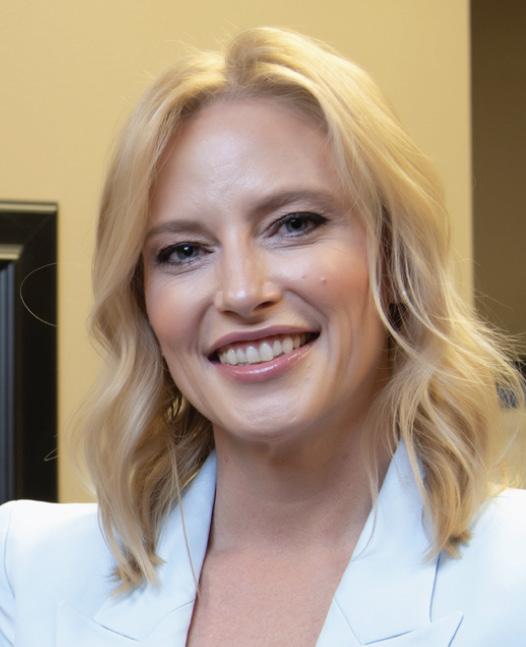
In 2021, National Public Radio reported 17 percent of drivers were women, the highest ever, while the Women in Trucking Association, an organization dedicated to increasing women in the industry, put the driver percentage at a little more than 12 percent in 2023. Regardless of the actual number, the song remains the same: The number of women in the industry has doubled in the past 20 years, per TruckInfo.net.
The Women in Trucking Association’s figures also showed strong gains where it matters most, in positions of leadership. About 32 percent of women are in C-suite or executive positions in the trucking industry nationwide, 37 percent are in supervisory leadership roles, and a little more than 28 percent serve on boards of directors.
In reporting the data, the Trucker magazine also noted such representation of women could be found in both large and small organizations. More than 14 percent of respondents worked for companies with more than 10,000 employees, and almost 13.5 percent worked for companies between 1,000 and
5,000 workers. Meanwhile, more than 23 percent were in companies with less than 50 employees, and 34 percent employed 50 to 499 workers.
In Arkansas, women can be found in prominent positions of leadership in the trucking industry from top to bottom. In addition to independent owner-operators, two of the state’s largest transport companies — ArcBest in Fort Smith and Lowell-based J.B. Hunt — boast female chief executive officers in Judy McReynolds and Shelley Simpson, respectively. The state’s trade group, the Arkansas Trucking Association, is not only led by Shannon Newton as president and CEO, but five of the six ATA staff members are also female.
Newton, who has watched the industry evolve for two decades,
However, as the song goes, “The times, they are a-changin’,” as the number of women in trucking have reached levels previously unimaginable
gave credit to pioneering women such as Johnelle Hunt, who, with her husband, J.B. Hunt, founded the trucking company of the same name. Newton said Johnelle Hunt’s example, combined with men willing to provide women with the opportunity to advance, accelerated many careers.
“It’s very difficult to aspire to something or for others to envision something that doesn’t exist,” she said. “When you mention J.B. Hunt, you consider the success of that company and the role Ms. Hunt played in that. Her husband truly viewed her as a business partner. That was very much evident in the way that he treated her, in the way that he included her and in the way that she committed herself to working hard for the business.
“Therefore, you would be remiss not to say that women are successful here in Arkansas, in part, because men empowered them and could see them in a leadership role and assigned them a certain scope of responsibilities.”
Unlike Ray, Newton had no background in the trucking industry when she got her start in the payroll department at Maverick Transportation in North Little Rock, following her graduation from the University of Central Arkansas in Conway.
“When I started there, there were no males in the payroll department. I think that’s probably pretty stereotypical,” she said. “Something that was unique about my role is that my responsibilities included orientation for new drivers to the payroll process. I would have to go over there, a 23-year-old, fresh-out-of-college introvert, and stand in front of a classroom of somewhere between 18 and 30 men who had shown up for their first day on the job to be a truck driver at Maverick. I was kind of thrown into that environment because that was part of my payroll duties where I had to explain to new employees how they were going to get paid and to fill out their paperwork for that.
“I was somewhat of an anomaly going back and forth because I spent a lot of my time in recruiting and with the new driver employees. That was a little bit different as I had more exposure to other employees other than just in the payroll department.”
Even by trucking industry standards, role models were hard for Newton to come by in association work — she is the first female president and CEO in the seven-decade-plus history of ATA — but she came by her leadership chops honestly.
where women have yet to assert themselves.
“I think the biggest challenge that I see is from the entrepreneurship picture,” she said. “We can rattle off the six or eight Fortune 500 companies who are here, and they have channels of leadership structure and development and organizational structure to make their leaders equipped. What you really see in our industry, however, are small businesses. Those small businesses are overwhelmingly initiated by men who were exposed to the industry through their family or who worked for someone else and then chose to leave and go out on their own. We don’t see that in the same volume for women.
“I believe that over time, as our industry employs more women, that will increase, but women are just intuitively not as risk taking as men are. In any industry, you don’t see women being entrepreneurs or starting businesses at the same rate that men do. In our industry, that is really the biggest pathway to success.”
I believe that over time, as our industry employs more women, that will increase, but women are just intuitively not as risk taking as men are.
“My grandmother was college educated, my mother was college educated, and they both worked while I was young,” she said. “I never really thought that was weird or something that was not achievable for me.”
Shannon Newton Arkansas Trucking Association
Today, the membership has long since gotten used to her, and Newton gets to be a role model for young women and girls looking to carve their own channel in life.
“When I became the president of the Arkansas Trucking Association, everybody wanted to talk about the first female president and all of the accolades that came with that. That was very uncomfortable for me. I didn’t really like that,” she said. “I came to realize there are girls out there who don’t have professional women or successful women or women in positions of leadership or authority in their lives. Putting myself out there and telling my story and letting them see me has a value that I didn’t previously recognize.”
Newton is quick to mention, however, that for everything that has been achieved in the industry, there are still pockets
For trucking companies that have a history of advancing women, such as Paul Ray Trucking, it has made it easier for the succeeding generations to imagine what is possible.
“I currently work with five women who were with the company before me,” Ray said. “I’m so thankful for them because they helped pave the way for me. The road was much easier for me because of them. These women inspired me, and without their guidance, I would not have gained the confidence or knowledge to grow in this industry.”
Ray said she never experienced any sexism or felt any animosity from the men she worked with during her career but acknowledged that might not reflect everyone’s story. She said she derives great satisfaction from continuing the family business while inspiring others along the way.
“I honestly think I was maybe the lucky one. I don’t ever recall anyone ever saying anything negative, and if they did, I certainly didn’t know it,” she said. “I just don’t ever remember feeling intimidated by what I was doing. I think we’ve had good customers and employees through the years, and I don’t think I ever felt that they treated me differently or respected me less.
“The advice I would give to the young women coming after me would simply be to be confident, recognize your potential and trust your abilities. Never be afraid to ask for help, or question everything. That is how we learn and understand.”



3 Rivers Logistics
AAA Cooper Transportation
ArcBest
Arkansas Freight Solution
Bowerman Trucking
Brent Higgins Trucking
Brew Crew Transportation
Bruce Oakley
CalArk
Carman
C.C. Jones Trucking
CCS Transportation
Celo Transport
Truckload and les-than-truckload brokerage services for both refrigerated and dry loads along. with flatbed, hotshot, bulk and intermodal brokerage services Gillett
Less-than-truckload, truck load, dedicated contract carriage, brokerage and fleet maintenance
Fort Smith, Jonesboro, Little Rock
Intermodal and international shipping, less-than-truckoad, trade show shipping, time critical, flatbed and temperaturecontrolled services. Fort Smith
Freight-transportation services and hauling cargo Little Rock
Nationwide dry-van freight transportation Searcy
Refrigerated and frozen products Mulberry
Steel transport crew offering flatbed services Farmington
Dry bulk transportation North Little Rock
Dry van trucking services, in addition to temperaturecontrolled warehouse and distribution Little Rock
Freight shipping and trucking Fort Smith
Heavy hauling and specialty transport; produce North Little Rock
Truckload dry van and refrigerated van services
Expedited hot shot, point-to-point delivery, less-thantruckload, long distance, critical delivery and secure delivery Springdale
Central Hauling Co. Dry-box truckload carrier
Glory Transportation
J.B. Hunt
J.D. & Billy Hines Trucking
carrier with trucking brokerage
Intermodal, dedicated, final-mile, refrigerated, truckload, less-than-truckload, flatbed, expedited and single-source services
Customized services to move wood chips to paper mills in addition to flatbed trailers
JM Bozeman Enterprises Dry van truckload carrier and logistics
Keen Transport Heavy-haul logistics and transportation for the construction, mining and agriculture equipment markets
Laubach Freight Truckload, less-than-truckload, intermodal deliveries, hot shot, flatbed, conestoga flatbed and interplant shuttle
Lew Thompson & Son Trucking
Loggins Logistics
MAGS Trucking
Marrlin Transport
Maverick Transportation
MC Express
McSheer Truck’in
Morris Transportation Services
Old Dominion Freight Line
PAM Transport
RCX Solutions
Rich Logistics
Southern Refrigerated Transport
Southland Transport Service
Regional and dedicated truckload services
Flatbed services in nearly 30 states
Huntsville
Jonesboro
Dry van Cabot
Long-haul carrier for dry goods
Flatbed, dedicated, glass and brokerage services
Van Buren
North Little Rock
Irregular route carrier with trailer leasing and dedicated service Jonesboro
Truckload transportation, dedicated routes and full-service brokerage
Long-haul, regional, short-haul and local services
Less-than-truckload freight leader with air-expedited transportation, brokerage services, warehousing, supply chain consulting and container drayage
Dry van truckload, expedited truckload, intermodal and logistics for manufacturing, retail, and automotive industries
Rose Bud
Hamburg
Fort Smith, Jonesboro, North Little Rock
North Little Rock, Tontitown
Truckload, less-than-truckoad, flatbed, intermodal, temperature-control, expedited shipping and international shipping Little Rock
Scheduled truckload, expedited freight and door-to-door services Little Rock
Temperature-controlled, dry van and hazmat services Texarkana
Hopper-bottom freight, dry van freight and temperaturecontrolled freight
Dedicated, dry van, expedited, flatbed, intermodal, less-than-truckload, over-dimensional and temperaturecontrolled operations
Wayne Smith Trucking Ground transportation services Morrilton
Woodfield Dry van truckload services
XPO Logistics
Less-than-truckload transportation, truck brokerage, final mile logistics, intermodal, drayage, contract logistics, ground and air expedite, global forwarding and managed transportation
Fort Smith, Jonesboro, Little Rock, Springdale
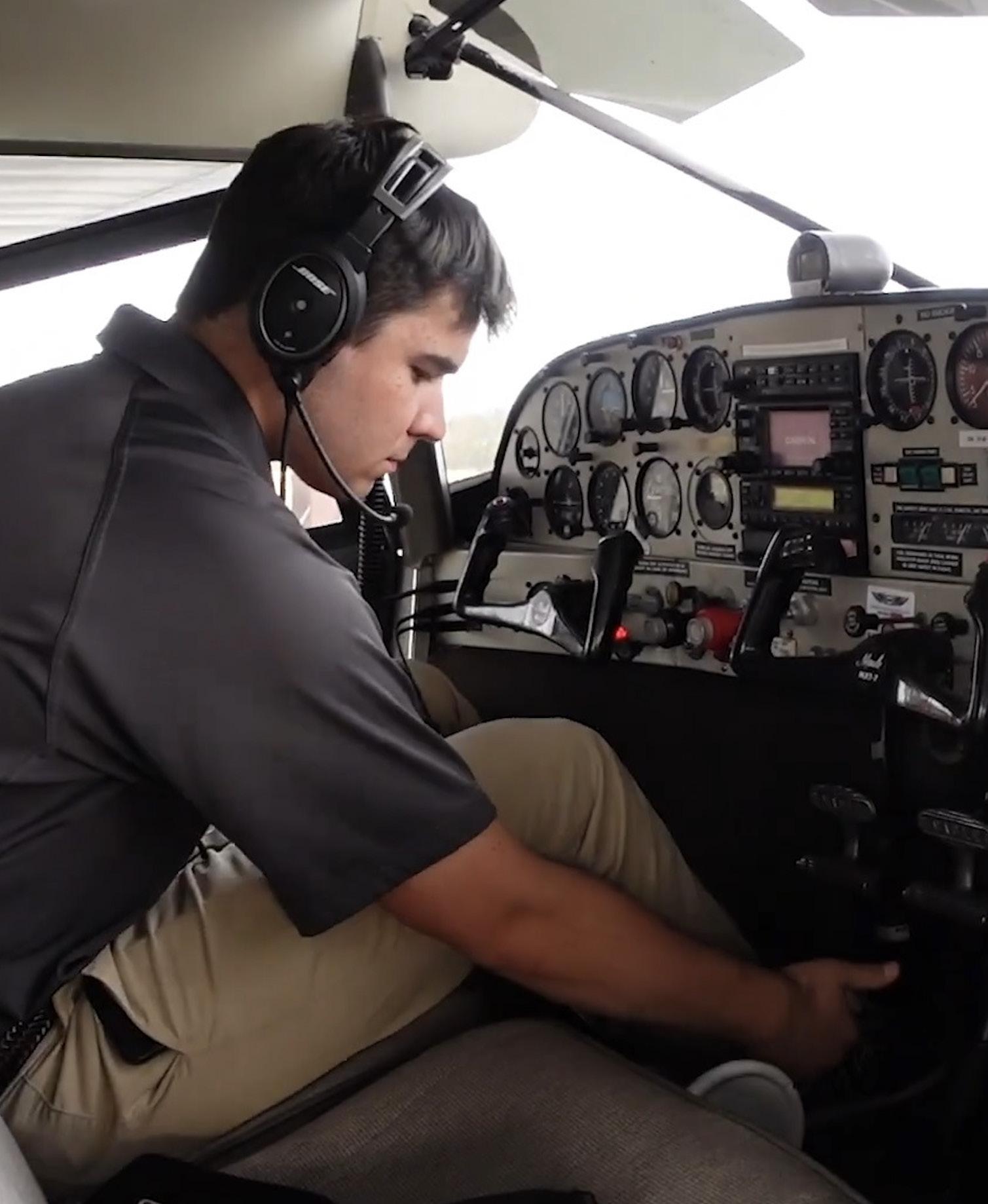
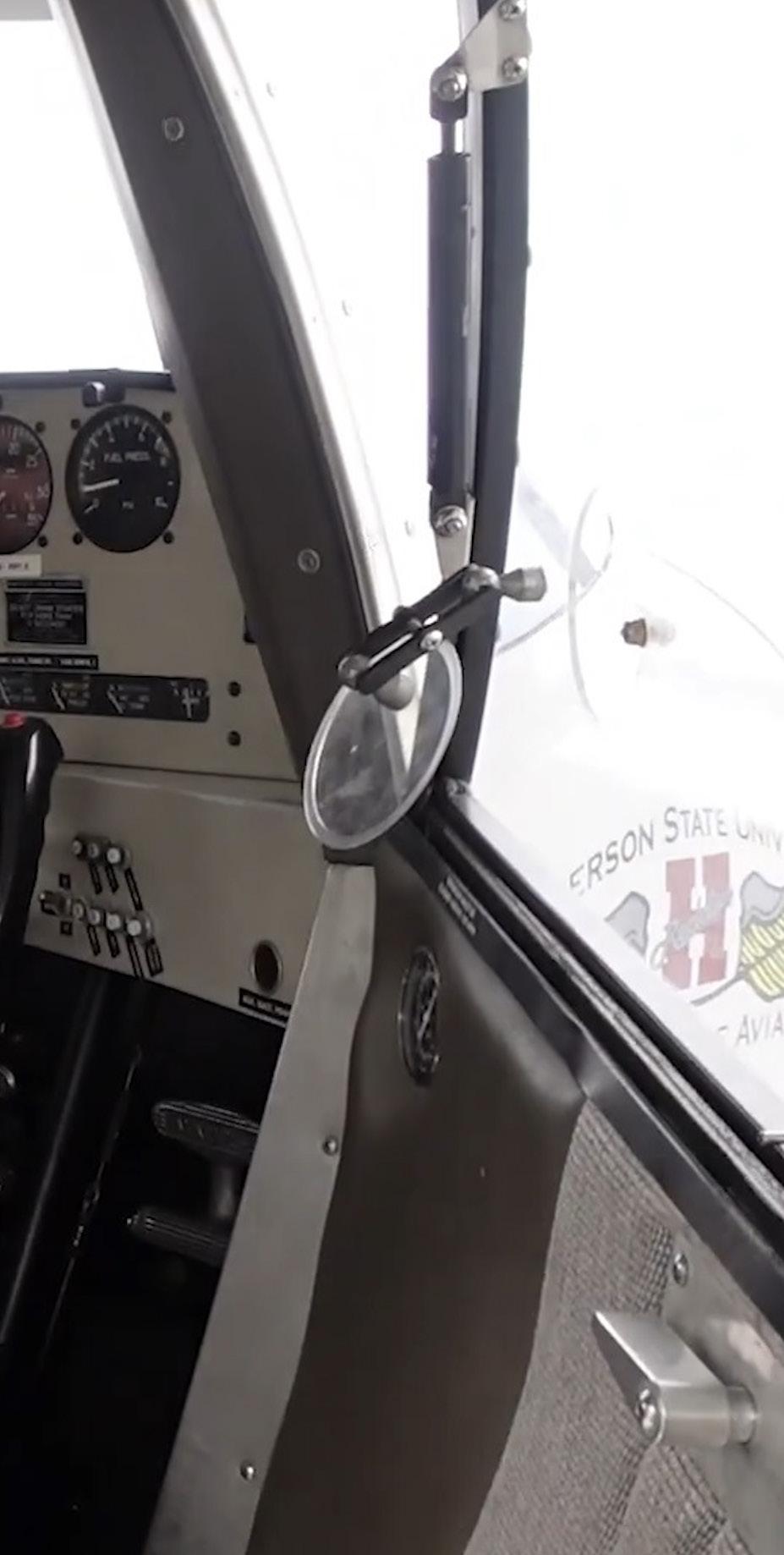
Caleb Huett had no aviation experience outside of flying remote-control planes with his brothers or connections to the industry when he enrolled in the aviation program at Ozarka College in Melbourne in fall 2018. Today, he is a pilot for one of the world’s largest private-jet charter fleets. After working for the college as a flight instructor for two years, the 24-year-old Mountain Home native was hired as a first officer at NetJets and, once he had more than 2,500 hours in the air, was promoted to captain.
Based out of NetJet’s hub at Springfield-Branson National Airport, Huett flies clients all over the continent and sometimes beyond. His work schedule, he said, is essentially one week on, one week off, and the money is good.
The biggest draw, of course, is easy — Huett gets to fly a jet for a living.
“Once you get inside the cockpit, you’re gonna get the aviation bug,” he said. “You’re gonna want to make it a career.”
Private aviation has, excuse the pun, taken off since the COVID-19 pandemic almost grounded commercial airlines.
“The private side of the industry has really blown up the last four years,” Huett said. “People who could afford to fly went private and then stuck with it.”
Clinton Jackson, director of the Ozarka program, said demand for pilot training at the Melbourne two-year college is up. The program takes roughly 25 to 30 new students each fall and has a growing waiting list, he added.
It is easy to see why. The average annual salary for all U.S. commercial pilots in 2022 was just less than $149,000, according to the Bureau of Labor Statistics, with the top 10 percent earning more than $217,000.
“It’s a pretty easy program to sell,” Jackson said. “We pick the best and the brightest. We’ll have eight, nine companies recruiting them once they complete their degree and get their ratings. They can make $75,000 or more right away. Some are making over $100,000 as kids — six figures right out of school.”
That kind of money will stretch far in Arkansas. Not many industries can offer such an immediate and valuable bang for your buck, and for Ozarka students, the Arkansas Future grant program for those enrolled in two-year schools can offset all tuition costs.
“Our aviation program is very important to us,” said Richard Dawe, Ozarka president, himself an aerobatics pilot. “We want to continue to focus on making highly trained, professional pilots, and we believe we do it better in half the time.”
Even at four-year schools, the return on investment is strong for aviation students. Rich Wyman, director of the aviation program at Henderson State University in Arkadelphia, said the cost for all minimum required flight training plus tuition and fees comes to about $68,000.
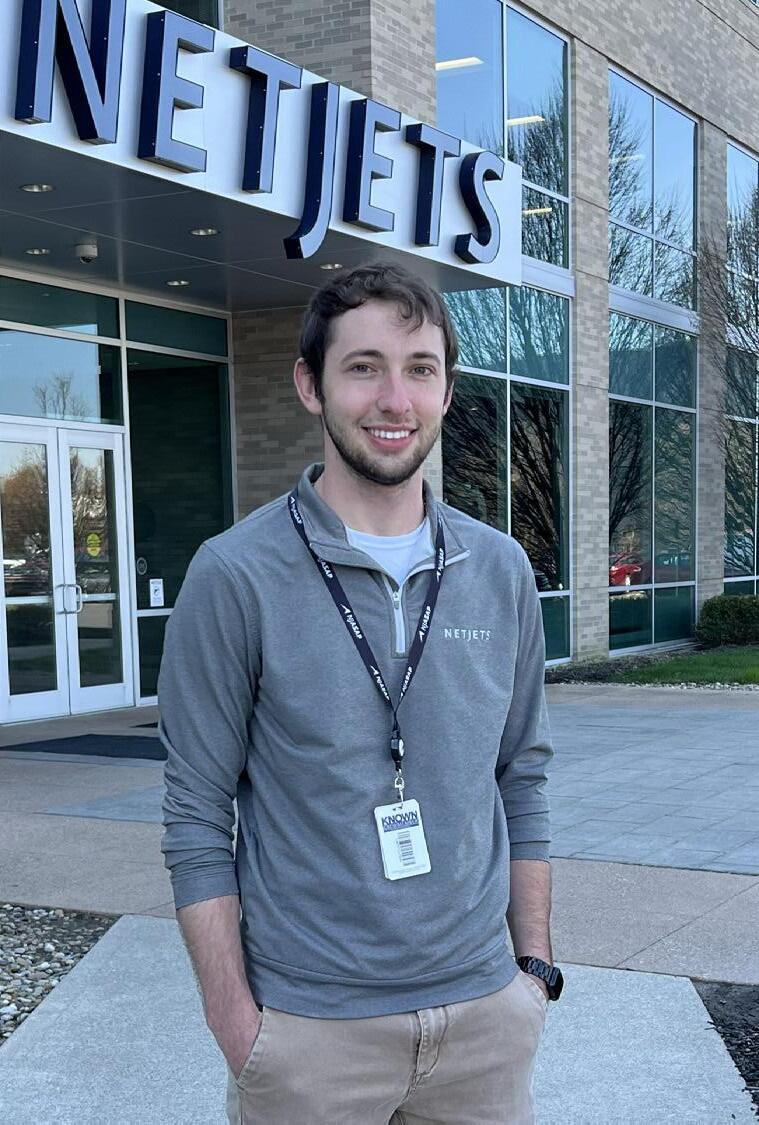
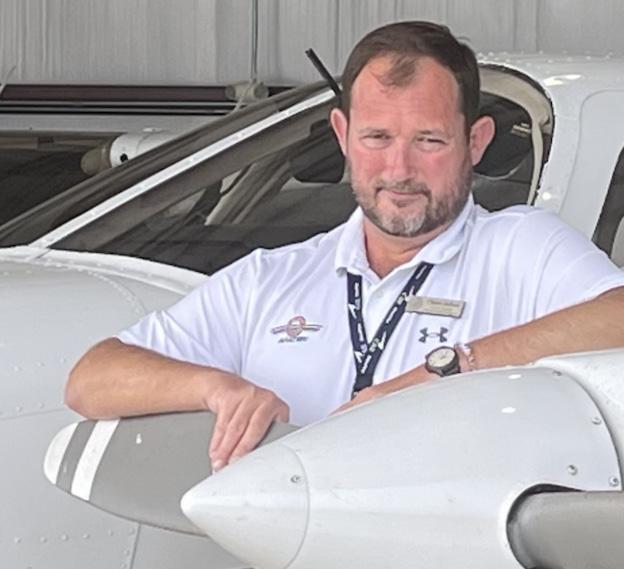


“Hiring demand in this industry is compounded by an aging workforce.”
— Jeff Gray, ASU Mid-South
“Many professional pilots with major air carriers can earn that much in their first year on the job, and advancement is rapid after that first year,” he said.
The Henderson program, launched in the early 1970s, is home to roughly 75 students each year and turns out between 15 and 20 graduates of its professional pilot program each spring, Wyman said. Ozarka’s Jackson is an HSU aviation grad.
Many graduates often stick around to work as part-time flight instructors and get their hours up. Huett worked as a flight instructor at Ozarka after earning his degree. It takes 1,200 hours to get “a decent airline job,” Jackson said.
Most airlines no longer require their pilots to have a bachelor’s degree, which makes schools like Ozarka more popular and essential to the pipeline. Even though a four-year degree is no longer essential for a career as a commercial pilot,
Wyman said the advantages of earning one are important.
“Beyond earning the necessary pilot certificates, students are immersed in a constant learning environment of aviation safety, single pilot and crew member responsibilities, knowledge of aviation regulations, and technical subject areas,” he said. “I believe this background gives our graduates an advantage over many others in a hiring pool.”
The industry simply needs qualified pilots, regardless of where they went to school. Huett said NetJets is looking to make 600 to 900 new hires in the next two years.
The industry needs more mechanics, as well. Jeff Gray, vice chancellor for learning and instruction and chief academic officer at Arkansas State University Mid-South in West Memphis, said the demand for airframe and powerplant mechanics certified by the Federal Aviation Administration is high. Labor market data for the region indicates rapid growth for occupations requiring an A&P certificate and projects growth of more than 24 percent for those jobs in the next two years.
“Hiring demand in this industry is compounded by an
aging workforce,” he said. “Proximity to the Memphis International Airport and FedEx Express further increases demand in the region.”
Aircraft mechanics and service technicians earn a median annual wage of more than $71,000, Gray added.
“Entry-level mechanics will typically earn between $20 and $25 per hour, and more experienced workers can earn as much as $60 per hour,” he said.
Huett flies passengers to many big airports but sometimes has to make a drop from a dirt runway in the middle
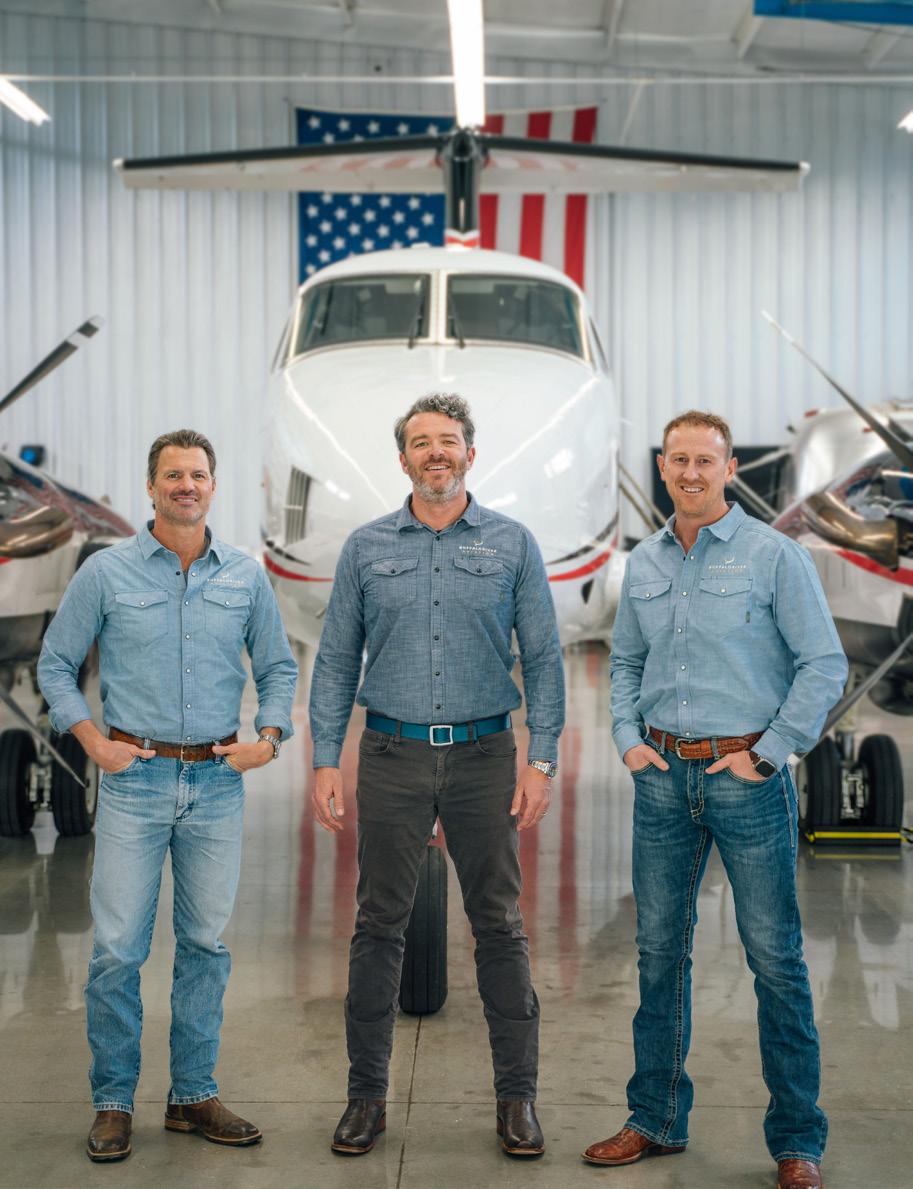
of nowhere. Arkansas is home to many dirt and grass runways that cater to duck hunters, fly fishermen and others immersed in the state’s burgeoning outdoor recreation economy.
The grass airstrip at Gaston’s White River Resort in Gassville has been around since the 1950s. Owner Clint Gaston said it was just 1,200 feet long when it was first laid out in the 1950s. It doubled in length in the ‘70s, and another 800 feet were added in the ‘80s, taking it to its current run of 3,200 feet.
Gaston’s has proven to be a reliably popular flight destination.
“We get around 10,000 different types of aircraft to our resort and restaurant on an annual basis,” Gaston said. “If the weather is nice, you can bet we’ll have some planes and helicopters using our airstrip to enjoy lunch, dinner or a few days of trout fishing on the White River.”
Bentonville’s Buffalo River Aviation provides charter and flight-management services. Based out of Thaden Field in Bentonville and also using Rogers Executive Airport, the firm was founded by Arkansas natives and professional pilots Brian Ahlert, Austin Albers and Chris Townsley. Albers said the Bentonville base puts clients within a few hours of anywhere in North America. The firm, which partners with Little Rock’s Central Flying Service, is planning to add a third jet to its fleet later in the year to help meet demand.
“While we can pick you up wherever needed, being in the heart of Bentonville has proven extremely convenient for many of our clients thus far,” he said. “Arkansas and especially northwest Arkansas has seen an uptick in all things aviation, including those who charter aircraft and those looking to buy and learn how to fly them.”
Whether or not it was helped along by the pandemic, interest in aviation has increased locally, Albers said.
“What we have seen over the last several years is a higher interest from individuals and businesses who understand the benefits of chartered flights versus
(Clockwise from left) The approach into Bentonville's Thaden Field; students at ASU Mid-South's aviation mechanics program; the grass airstrip at Gaston's White River Resort.

commercial aviation,” he said. “Those benefits include ease of travel and, in most cases, an incredible time savings. Families can stay on vacation longer, or business travelers can spend more time preparing for the big presentation because they aren’t dealing with the traditional trappings of a busy commercial airport. There is a strong need for shortnotice, real-time service for personal or business use.”
Albers said he and his partners often are asked how fast BRA can get someone to Florida. His response: “Two to 2 1/2 hours depending on which plane you want to take.”
The open road was never so open as it is above the clouds. For pilots like Huett and Albers, paychecks are icing on the cake, and the road to becoming a pilot is more open than many realize. Wyman said aviation students can build from the ground up.
“We always have a few whose parents

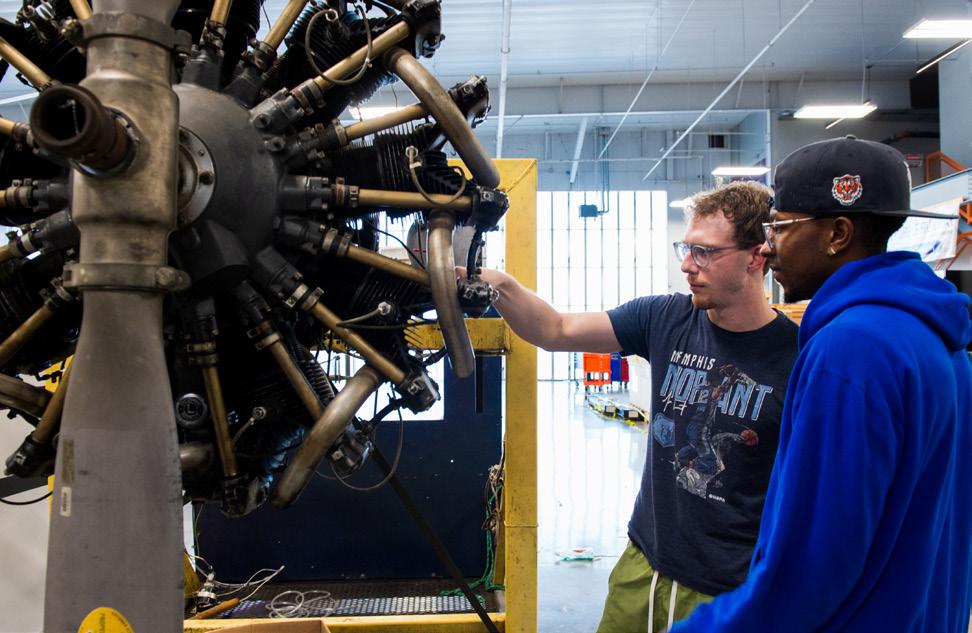
or other close relatives are professional pilots, so they may know a little about the aviation industry,” he said. “However, that does not necessarily give them an automatic advantage over others enrolling in the program. Many students come in with no experience or connections at all, but their determination to become professional pilots shows in how greatly they apply themselves in training and in working together with their peers. We provide the tools they need for launching their careers.”
Huett advised anyone looking to take off as a pilot to get over any fear of flying. He said the only time he really got nervous was before launching his first solo flight. He likened it to the nerves he experienced before the first time he went bungee jumping.
“Right before you take off, the realization hits, but then you’re out flying again,” he said. “It’s like learning to drive a car — all about repetition.”
The Walnut Ridge airport is considered a frontrunner as a possible site for a future regional airport in northeast Arkansas. (Photos provided)

The interest in a regional airport for northeast Arkansas is there, even if the overall regional economics are not, according to the results of a state study.
Though the study revealed a strong interest in building a regional airport in the state’s northeast corner, local residents should not plan to book flights any time soon. Craighead County could economically support a regional airport, the study revealed, but neighboring Arkansas counties and those in southeast Missouri and northwest Tennessee could not. The Arkansas Department of Commerce’s Division of Aeronautics evaluated 19 counties in northeast Arkansas, an area of the Missouri bootheel and the northwest corner of Tennessee. It found that the socioeconomic indicators of the region perform below state and national averages needed to support an airport.
The division said northeast Arkansas has “potential to serve expanded [air service] industry.”
Garver, a national engineering firm based in North Little Rock, reviewed the survey and suggested the state study long-term facility requirements for building a regional airport. One of the firm’s specialties is evaluating and building airports.
“The demand is here,” said Arkansas Rep. Jack Ladyman (RJonesboro), who asked in a letter that the Federal Aviation Administration commission an independent study about the need and a suitable site for an airport.
“Our problem is that Craighead’s growth rate by 2042 is projected to be higher than Arkansas’ growth over the same time,” he said. “Craighead County is there demographically, but the support isn’t there for the surrounding 18 counties. The survey shows the social economics there are down.”
“The survey shows the social economics there are down.”
— State Rep. Jack Ladyman
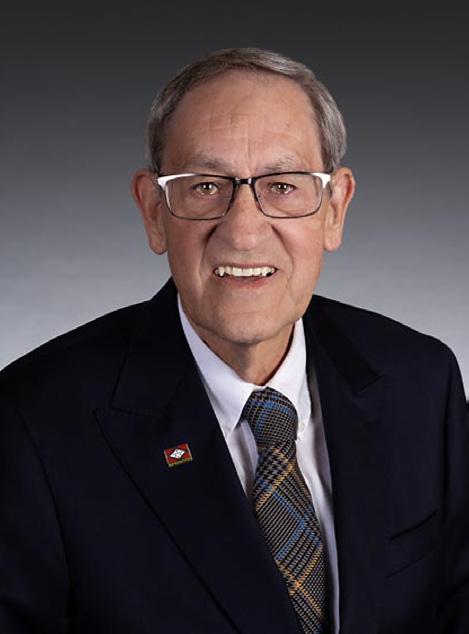
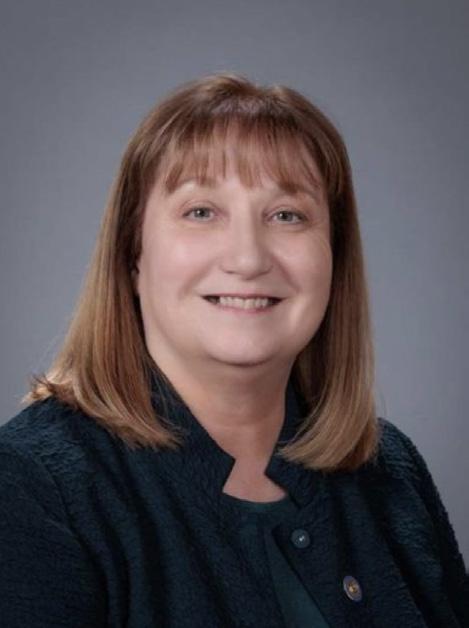
“We would definitely see an economic boom in this area with an airport.”
— State Rep. Fran Cavenaugh
There has been talk for years of developing a regional airport in northeast Arkansas. Ladyman was the mayor of Elkins in northwest Arkansas in 1998, when what is now the Northwest Arkansas National Airport began operations just outside of Bentonville.
“It was a different time then,” Ladyman said. “There was no pressure then, and there was no lack of places to build one.”
The Northwest Arkansas National Airport has been a catalyst for growth in the area. This year, airport industry officials predict more than 1 million enplanements will occur there.
In 2022, the Jonesboro Municipal Airport recorded 3,712 enplanements, making it the seventh-busiest airport in the state. The Bill and Hillary Clinton National Airport in Little Rock recorded the most passengers in the state with more than 963,500 that year.
Of the eight commercial service airports in Arkansas, only Jonesboro’s is in northeast Arkansas. It is served by Air Choice One with two flights a day to St. Louis and one to Nashville.
The other commercial service airports are in Little Rock, Bentonville, Fort Smith, Texarkana, El Dorado, Harrison and Hot Springs.
“We saw what [Northwest Arkansas National Airport] has done in helping that area develop completely,” said Arkansas Rep. Fran Cavenaugh (R-Walnut Ridge). “We would definitely see an economic boom in this area with an airport.”
The study did not dwell on locations for a regional airport. It did say that one should be at least 60 to 70 miles away from the international airport in Memphis. The survey showed that 83 percent of respondents indicated use of the Memphis airport for air travel, and 12 percent traveled to Little Rock for flights. Forty-six percent of those responding to the survey took one to three air travel trips a year.
There are a few sights around northeast Arkansas that have been considered possibilities for a regional airport. The former Eaker Air Force Base in Blytheville and airports in Walnut Ridge and Newport all have runways long enough to handle commercial and corporate aircraft.
The Jonesboro Municipal Airport is blocked by residential areas on its eastern side and train tracks to the north and south. There is no opportunity for any future airport expansion.
There have also been suggestions of building a new airport on land north of Brookland near the Greene and Craighead county lines or in an area west of Jonesboro toward Walnut Ridge.
Perhaps the frontrunner for a regional airport is the Walnut Ridge facility in Lawrence County. Built in 1942 as a U.S. Army flight training school, the airport is just north of town near Williams Baptist University.
The airport boasts three runways, including one that is 6,000 feet long. Large airplanes, including military C-130 cargo planes, have landed there when they could not land at the Jonesboro airport.
“I’ve said all along I’d love to have it here,” Walnut Ridge Mayor Charles Snapp said. “The main question, though, is where is the best place for an airport that would serve the people the best and be the most cost effective? It’s going to come down to being data dependent. As we grow, the need for a regional airport is going to grow.”
Regardless of any growth now, area officials also must deal with shortages in both pilots and aircraft.
“Because of that shortage, airlines are not expanding into new areas,” Ladyman said. “The demand is here, but I don’t believe airlines are willing to come here yet. We have to bring the rest of the region up, like Craighead County, to bring them.”
There is still optimism, officials said. The fact that a respected firm like Garver suggests conducting further research is encouraging, Cavenaugh said.
“We’re in the same spot Northwest [Arkansas Regional Airport] was 30 years ago,” she said. “The demographics don’t show the real story. They were stunned with the number of responses to the survey. That shows there’s support.”
Based on factors gleaned from the study, Garver does urge the state’s aviation division to further investigate placing a regional airport somewhere in northeast Arkansas.
“We recommend the state of Arkansas take the next step in the process and initiate a facility-requirements study,” Garver’s review of the study reads, “… expanding airline service into the region is not imminent, primarily due to existing socioeconomic conditions and the regional airline industry.”
“The study should focus on establishing the near-term, mid-term and long-term facility requirements and identify triggering events warranting future airport development,” the review states.
Atlanta (ATL)
Charlotte (CLT)
Chicago (ORD)
Dallas (DFW and DAL)
Denver (DEN)
Destin (VPS)
Houston (IAH)
Las Vegas (LAS)
Los Angeles (LAX)
Miami (MIA)
New York City (LGA)
Orlando (SFB)
Phoenix (PHX)
St. Louis (STL)
St. Petersburg (PIE)
Washington, D.C. (DCA)
Atlanta (ATL)
Charlotte (CLT)
Chicago (ORD)
Dallas (DFW)
Denver (DEN)
Destin (VPS)
Fort Lauderdale (FLL)
Houston (IAH)
Las Vegas (LAS)
Los Angeles (LAX)
Miami (MIA)
Minneapolis (MSP)
Nashville (BNA)
New Orleans (MSY)
New York City (LGA)
Orlando (MCO and SFB)
Phoenix (PHX and AZA)
St. Petersburg (PIE)
Tampa (TPA)
Washington, D.C. (DCA)
As part of a team of experts dedicated to providing innovative solutions for airports across Arkansas, Garver’s Jordan Culver knows that the work of building relationships is as important as the work that happens on the airfield. Being a trusted partner is about providing communities with the infrastructure they need to not only thrive but take flight.

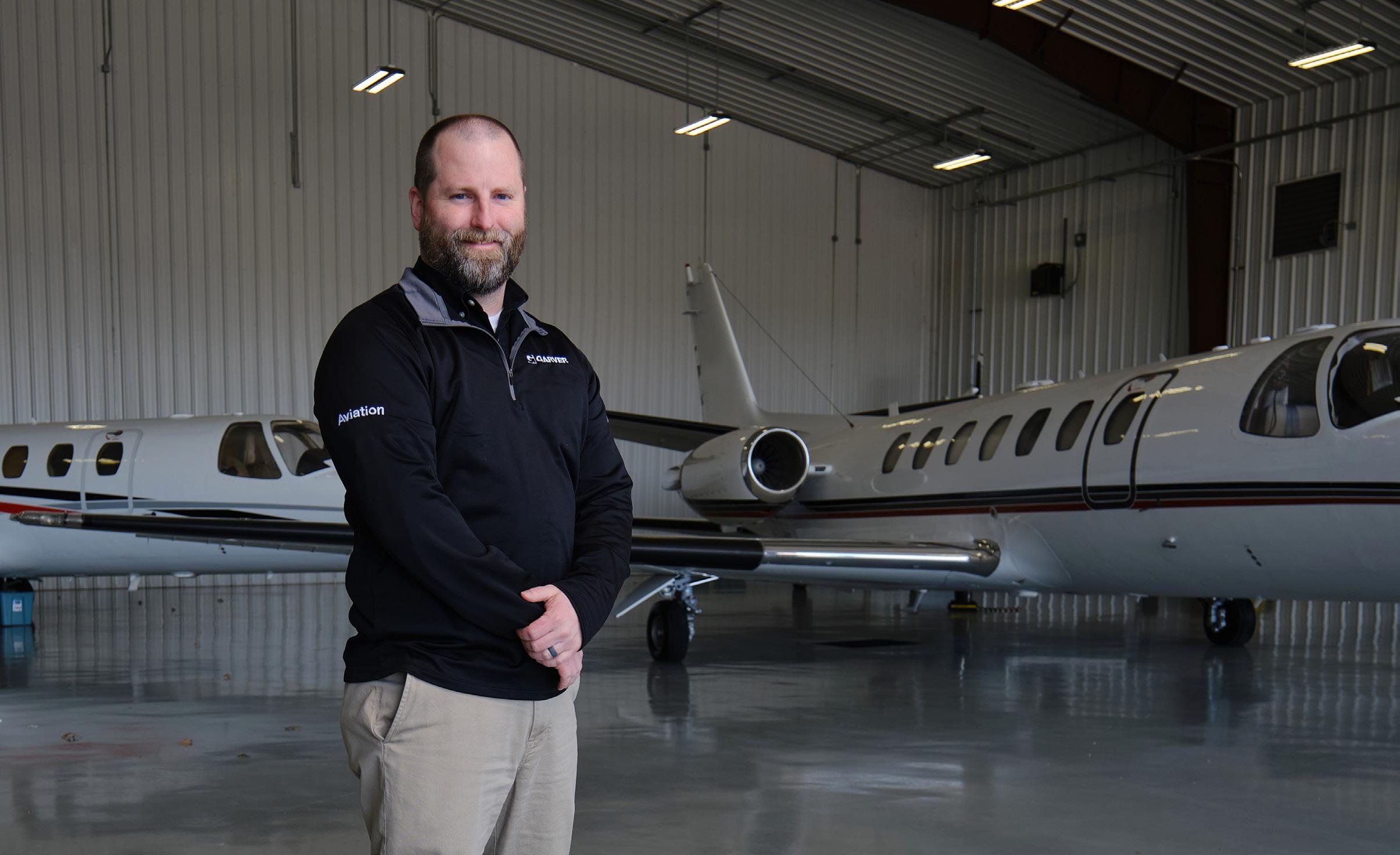




LOCKHEED MARTIN SEEN AS ‘TIP OF ICEBERG’ FOR FORT SMITHBy Kenneth Heard
The creation of a Lockheed Martin foreign pilot training center in Fort Smith will have a yearly economic impact of $500 million to $1 billion to the area, local leaders say.
The facility, built at the Ebbing Air National Guard Base adjacent to the Fort Smith Regional Airport, should begin training foreign pilots to fly Lockheed’s F-35 advanced fighter jets in September.
The base will become the new location for the 425th Fighter Squadron, a Republic of Singapore F-16 Fighting Falcon training unit. The squadron had been located at the Luke Air Force Base in Arizona.
The move is part of Lockheed Martin’s program of selling the jets to foreign countries and then training pilots at a U.S. base. Lockheed officials say it will cost about $765 million to make the base fully operational.
Poland is the first country expected to send its pilots to train at the base. The country bought 32 of the jets in 2019 for more than $6 billion. The training will last two to three years while pilots learn to operate the jets.
Lockheed Martin, based in Bethesda, Maryland, scheduled an April 16 recruitment event at the Wyndham Fort Smith City Center downtown to interview candidates for jobs at the training base once it opens.
Keith Petrosky, the director of talent acquisition at Lockheed Martin, said the company hopes to hire about 80 people.
“We’re looking for positions to support training instructors for the F-35 jets,” he said.
He said candidates will be interviewed by six-man teams, and decisions for hiring could be made the same day.
Other “support system” jobs in supply, logistics and security could follow, he said.

He said he expects hundreds, if not thousands, will “come from all over” to apply.
“We encourage the community to look at the jobs available,” Petrosky said. “We’re excited to be in the Fort Smith community.”
Tim Allen, president and CEO of the Fort Smith Regional Chamber of Commerce, credited the Ebbing Air National Guard Base already in place for winning the Lockheed Martin facility. Fort Smith competed with four other states.
The base opened in 1954 as the Arkansas Air National Guard’s 188th Wing. It was formerly a fighter wing that had operated F-4 Phantom II aircraft, F-16 Fighting Falcons and A-10 Thunderbolt II aircraft.
The Arkansas Economic Development Commission estimated the project will eventually bring 900 military members and their families to the Fort Smith area.
“Today’s announcement [of the Fort Smith facility] … cements Arkansas’ important role in training, equipping and supplying our friends across the globe,” Gov. Sarah Huckabee Sanders said March 15, when the Air Force chose Ebbing as its new destination.
“Our having Ebbing for 50-plus years was what got us further down the road with Lockheed Martin,” Allen said.
The Arkansas Economic Development Commission estimated the project will eventually bring 900 military members and their families to the Fort Smith area.
He said Lockheed Martin will continue bringing in new workers to Fort Smith once the flight school is operational. He estimated that the economic impact — when considering the number of employees there and any satellite industries that sprout up to support the center — could reach $1 billion annually. In all, more than 1,000 people could eventually move to the area to support the training base.
The Lockheed Martin Aeronautics Field Sustainment team will handle all maintenance for the F-35 pilot training.
Heidi “Splash” Moore, Lockheed Martin senior manager and site leader for Ebbing Air National Guard Base, said an F-35 Full Mission Simulator building will be constructed at the base.
“The flight training mission at Ebbing will be first class from day one because of the highly skilled team of the 33rd Fighter Wing [deployed from Eglin Air Force Base in Florida], the 188th Wing Air National Guard and Lockheed Martin personnel,” she said.
“The Fort Smith community is a real diamond in that it is friendly, enthusiastic and supportive,” Moore added.
Chip Paris, president and CEO of Paris Marketing and Public Relations, which works with the Fort Smith chamber, said the flight school represents the “tip of the iceberg” for the city.
“This will have a cascading effect,” he said. “Subcontractors will come here to build pieces of the [F35] planes. It will keep growing over time. This will forever change the landscape of Fort Smith.”

It is another busy day at the warehouse, semi after semi pulling up to the docks and multiple forklifts scuttling to and fro down long aisles across the yawning space. The process of loading and unloading the trailers has not changed that much to the naked eye, save for one thing: There is not a human in sight steering forklifts, lifting loads or depositing pallets.
Welcome to ArcBest’s warehouse of the future, one made possible by two revolutionary products created by the Fort Smith-based freight and logistics solutions provider. The products — 2023’s Vaux Freight Movement System and Vaux Smart Autonomy, released this spring — represent two giant steps forward in the evolution of materials movement.
“We’ve been in logistics for a hundred years, and logistics is typically concerned with the movement of goods from point A to point B,” said Michael Newcity, ArcBest chief innovation officer and president of ArcBest Technologies. “When you start talking about the bigger supply chain, you really start introducing what’s happening inside the warehouse, what’s happening inside the dock. The term there is intralogistics.
“We’re very focused on our customers and helping them solve these complex problems. We felt like we could help them with this by introducing technology inside the warehouse that touches this cross-dock load/unload process.”
Ever since COVID-19 kinked the supply chain such as to strangle the flow of goods, logistics has elevated to the public consciousness like never before. Consumers saw firsthand how fragile the systems for getting goods from manufacturers to store shelves actually were, and transportation companies have been searching ever since for ways to shore up and reimagine distribution and freighthandling processes once widely taken for granted.

Much of that effort has fallen on the backs of trucking companies, and for good reason. Intermodal options such as rail, air and sea all pull a share of the movement of things, especially in bulk, but when it comes moving freight to within reach of most consumers, truck-
ing stands head and shoulders above these other modes of traffic. According to the American Trucking Associations, more than 72 percent of U.S. freight is hauled at some point by truck, and that includes to the distribution centers that make online commerce fulfillment possible.
The profit matrix for freight companies is built on several factors, not the least of which is efficient use of time and manpower, which includes more efficient loading and unloading of semis. This has brought warehouse operations under more and more scrutiny and led management to seek better solutions to keep freight flowing, boost safety and minimize damaged goods.
According to data from the 2024 Outlook Survey by Peerless Research Group, released by Logistics Management, an average of 30 percent of those queried between 2022 and 2024 were planning to invest in materials-handling equipment and other technologies, although it is notable 2024 is the lowest of the three due to ongoing inflation and other economic factors.
Despite that, an overwhelming 90 percent of respondents said they expected their spending to be the same or higher this year compared to last year, and a like percentage expect to spend as much or more over the next two to three years as in 2024. Respondents also showed an appetite for new thinking; about half of the companies making investments this year are doing so in first-time, disruptive applications, a jump of almost 10 percent over each of the past two years.
The ArcBest innovations are nothing if not disruptive. Last year’s Vaux Freight product, which earned a spot on Time magazine’s most innovative inventions list, reduces trailer loading and unloading time from hours to a matter of minutes. The system employs a racking system to fit inside a semitrailer that can be
loaded and unloaded in its entirety, rather than by individual pallets. The system can be configured in a multitude of ways to match the products being hauled and is loaded or unloaded from both sides by multiple forklifts prior to being maneuvered into a trailer.
“The system’s software that optimizes the labor around that uses AI to calculate a next best move, if you will, for loading and unloading,” Newcity said. “Think of the positions on that mobile platform as airline seats, and the software is assigning the seats in terms of where to place the freight and optimize it. What that’s done is it’s taken a process that’s normally two to four hours of loading or unloading a truck down to mere minutes.
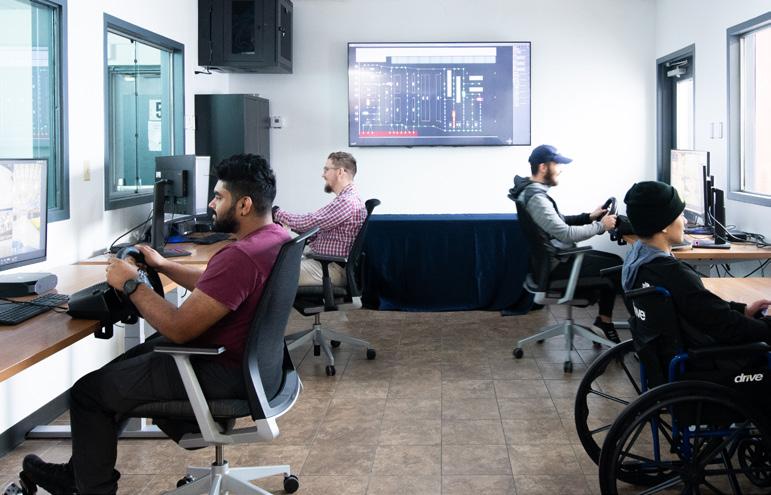

“When you think about the capital that’s involved in having a truck pull up with a tractor and a driver, and they’re sitting for two to four hours, that’s a lot of capital that’s tied up in that process.”
If Vaux Freight is stunning in its simplicity, Vaux Smart Autonomy is a full-on futuristic assault on the senses. The new system takes the freight the next step by deploying up to 40 autonomous forklifts to handle not only loading and unloading trailers via Vaux Freight, but manage individual pallet placement and retrieval throughout the warehouse.
“What you have is what we call a robot fleet manager, an RFM. It’s like the operating system for the forklift fleet, and it’s taking the assignments,” Newcity said. “In the warehouse, they may have what they call a warehouse management system, a WMS, which is taking all the pick orders. It’s telling what has to move to the staging area or what has to move to this truck or that truck. It sends orders to the RFM software, and what’s unique about our software is it takes that pass, and it breaks it down.
“This task, let’s say, is five parts; four of those parts are going to be autonomous, one of those parts is going to be teleoperated, and then it sends out the task in the appropriate sequence to the operator. It’s doing that across all of our autonomous forklifts in the fleet. We’re first in the industry in this.”
The forklifts, which come in three models, can shelve loads as high as 40 feet, reach speeds in excess of 7 miles per hour and operate in put-away spaces as tight as 9.5 feet. Employing onboard sensors, each machine scans bar codes to identify freight and deliver to the right storage aisle and space and can even drive evasively to avoid something in its path.
“These forklifts are almost independent robots,” Newcity said. “They navigate the environment independently. They have built-in safety mechanisms. That’s why they’re easy to introduce into the environment. The robot fleet manager software has a map of the warehouse, so it understands things like pathing and
With the ArcBest system, operators gain the ability to control machines and the flow of materials remotely.
different lanes these forklifts can operate in. The customer can modify those lanes.
“Safety is always a priority, and so what they do when they encounter each other or they encounter a person, they have all the smarts to navigate that environment or to stop altogether. They do get smarter as they’re on the floor, and that’s a huge AI component to this. Every time it makes a run in the environment, it’s learning from that.”
Aside from those benefits, the system also addresses one of the thorniest issues facing the industry right now: a lack of labor. According to Logistics Management’s “2023 Study of Logistics and Transportation Trends,” labor-related issues, including costs, talent shortage and availability, ranked with inflation as the top four industry challenges for 2024. With the ArcBest system, operators gain the ability to control machines and the flow of materials remotely, stretching available personnel.
“The teleoperator could be an employee of the company sitting there in the warehouse, or he could be one of our teleoperators sitting in Fort Smith, or she could be in Mexico or in Europe,” Newcity said. “We’ve got some customers that have said, ‘We’ve been needing this to start a third shift, but we can’t get the labor in our market to do it.’ This enables them to start that third shift. It also potentially enables us to get to different labor pools. Maybe it’s the aging workforce for whom driving a forklift can be taxing, or it might be a disabled veteran that operated heavy equipment in the military.”
The fact that a heritage trucking company is producing such technology as a business unit speaks to the changing face of the industry, at least at its highest levels. Newcity rides herd over a team of 600 in the tech division, which begs the question of whether ArcBest was today a transportation company heavy into technology or a technology company that happened to deal in transportation. It is a paradigm that gives Newcity pause.
“Will customers tell us to get back in our lane? We haven’t had a single customer say, ‘Why are you doing this?’” he said. “What they say instead is, ‘This makes sense for you to do because you’ve been in the freight-handling business for a hundred years versus some startup.’
“I see us as a company that is solving logistics problems for our customers. We’re doing that through a great culture, we’re doing that through relationships, and it’s undergirded by technology and innovation. It’s all there.”
Ability
Fayetteville
Advanced Integrated Technologies
Mountain View
Aerial Patrol
Maumelle
Aerojet Rocketdyne
Camden
AeroNautique
Sherwood
Aerotech Machine Corp.
Batesville
Ag Air Aircraft
Corning
Airborne Air
Ambulance/Airborne
Flying Service
Hot Springs
Air Charter Express
North Little Rock
AirLease International
Hot Springs
Airmotive
Clinton
AirReady MRO Services
Melbourne
Air Resource Group
Little Rock
Airtech Supply
Hot Springs
Allied AgCat Productions
Walnut Ridge
American Defense Components
Stamps
American Eagle Airlines
Bentonville
American Rheinmetall Munition
Camden
Amfuel
Magnolia
Source: AEDC
Amos Flying Service
Batesville
Arcturus Aerospace
Little Rock
Arkansas Aeronautics
West Memphis
Arkansas Air Center
Jonesboro
Arkansas Turbine Services
Pocahontas
Armtec Defense Technologies
East Camden
Aviation Graphix USA
Bella Vista
Aviation Interior Services
Searcy
Aviation Repair Technologies
Blytheville
B & D Design Services
Springdale
BEI Precision Systems & Space Co.
Maumelle
Bemco
Centerton
Bishop Aviation
Hot Springs
Boyd Interiors
Mena
C & H Aircraft Restoration
Evansville
CAVU Aerospace
Stuttgart
Central Flying Service
Little Rock
Class A Tooling
Cabot
Cobalt Aero Services
Hot Springs
Craft Manufacturing and Tooling
Hot Springs
Crider Aircraft Painting
Mena
Custom Aircraft Cabinets
North Little Rock
D&N Machining
Greenwood
Pine Bluff Arsenal
Pine Bluff
Dassault Falcon Jet
Little Rock
Dawson Aircraft
Clinton
Delta Airport Consultants
Little Rock
Devol Aviation
Fayetteville
Ducommun
Berryville and Huntsville
Duke Manufacturing
Fort Smith
Edmonds Aviation
Searcy
ESNA Arkansas
Pocahontas
Executive Aviation Services
Fayetteville
Ferra Aerospace
Rogers
Flying Investments
Fayetteville
Freedom Works
Manufacturing
Hot Springs
Frost Flying Marianna
FTS
Little Rock
Galley Support Innovations
Sherwood
Game Composites
Bentonville
General Dynamics
Ordnance and Tactical Systems
Hampton
Grandeur Fasteners
Danville
Hampton Aviation
Mena
Highland Machine
East Camden
JEVAC Machine
McNeil
Lockheed Martin
East Camden
LRDC Systems
Little Rock
Maynard
Fayetteville
Mena Air Center
Mena
Mena Aircraft Engines
Mena
Mena Aircraft Painting
Mena
Mt. Ida Machining
Mount Ida
Mundo-Tech
Rogers
North Little Rock Air
North Little Rock
ORC Products DA
Springdale
Pinnacle North Corporate
Aircraft Interiors
Little Rock
POL Systems
Magnolia and Camden
Pratt & Whitney PSD
Springdale
R & C Aviation
Mena
Raytheon
East Camden
Rose Aircraft Service
Mena
Rotorcraft Repair & Manufacturing
Pocahontas
Safran Electrical & Power
Little Rock
SGL Carbon
Arkadelphia
Shield Aerodynamics
Pine Bluff
South Delta Aviation
Helena-West Helena
Spectra Technologies
East Camden
Stallings Aircraft Propeller
Colt
StandardAero
Little Rock
Triumph Aerostructures
Hot Springs
Triumph Airborne Structures
Hot Springs
Triumph Group Fabrications
Hot Springs
Trutrak Flight Systems
Springdale
TWH Enterprises
Batesville
Valance Surface Technologies
Camden
Vision Technologies
Rogers
Wolfspeed
Fayetteville
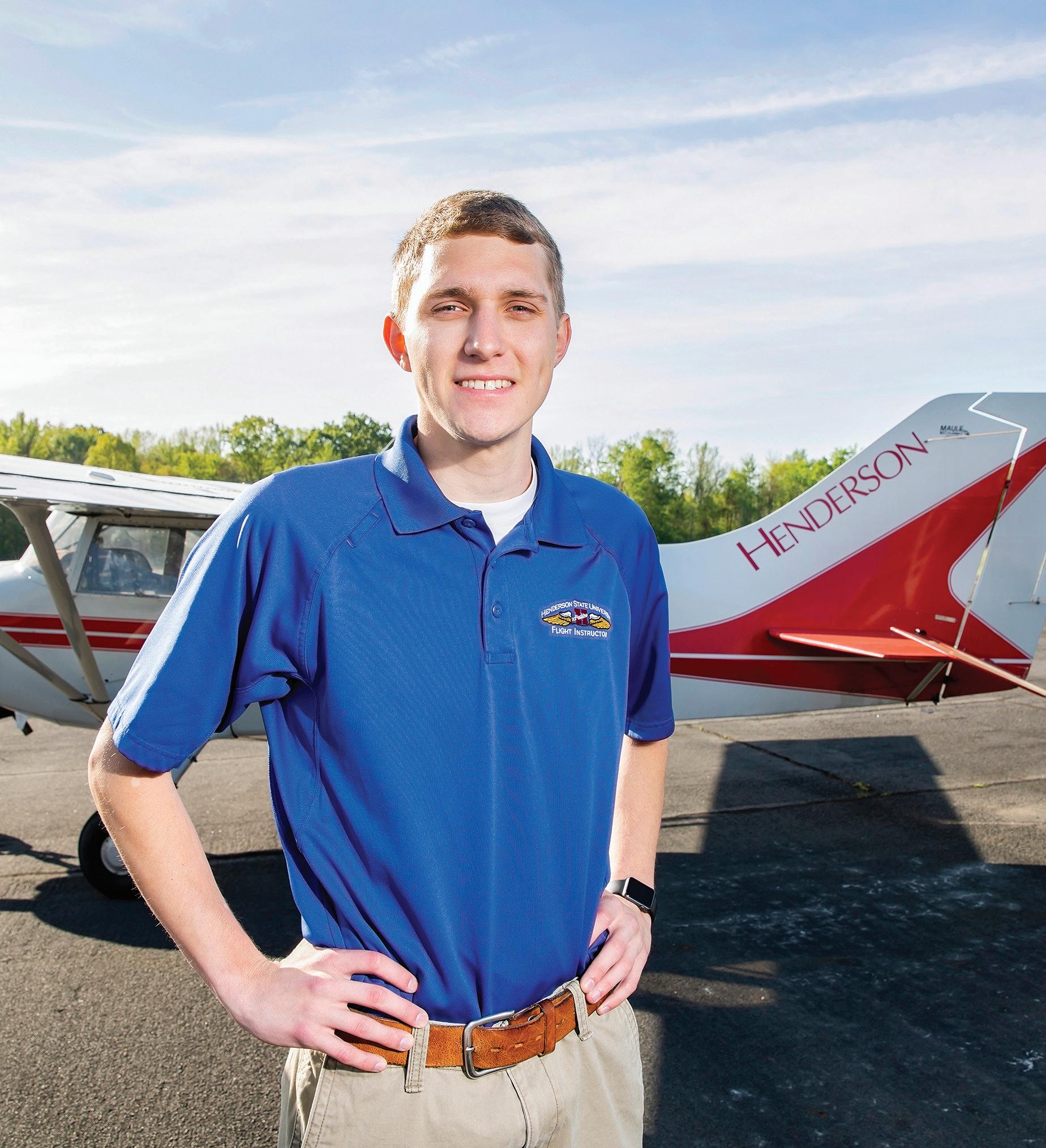

Arkansas still producing almost half of U.S. harvest
By Kenneth Heard
While there are scores of variables, such as weather, commodity prices, crop rotations, politics and equipment malfunctions, that may hinder Arkansas’ rice farmers, there is one constant that growers can count on.
The state will continue to rank first in the U.S. in rice production.
California is the second-leading rice producer in the country, and most of its rice is planted in the clay soil of the Sacramento Valley region. Louisiana is third, followed by Mississippi, Texas and the bootheel area of southeastern Missouri.
Arkansas farmers are expected to plant more than 1.2 million acres of rice this spring and produce at least 40 percent of the nation’s rice crop during harvest time in late August and September.
“Rice is a big deal,” said Arkansas Secretary of Agriculture Wes Ward. “When people think of Arkansas, they usually think of chickens first. They are amazed that the state creates nearly 50 percent of the country’s rice.”
Last year, farmers planted more than 1.4 million acres of rice on Arkansas soil and produced about 168 bushels per acre. The record for rice production, nearly 170 bushels per acre, was set in 2021.
The primary crops are long- and medium-grain varieties, and a majority of rice crops are grown in the eastern half of the state because of the fertile Delta soil there.
Ward said production could be slightly less this year, only because farmers may rotate crops and, instead of planting rice, they may choose corn or soybeans.
Of course, weather plays a major role in predicting rice production. Droughts can ruin crops, and Arkansas has seen its share of dry summers over the years. It is expensive enough, farmers say, to irrigate crops with adequate water during normal seasons.
Ward said Gov. Sarah Huckabee Sanders’ recent executive order to review the Arkansas Water Plan to assess water usage and demand should greatly help rice farmers. Officials will review the plan and develop long-term goals to create sustainable water usage, he said.
Rice farmers begin studying market forecasts during February to determine if it is lucrative to plant the crop.
“A lot of the decision of what to plant happens now,” said Kelly Robbins, executive director of the Arkansas Rice Federation, an organization that provides information to rice growers and markets the product both nationally and internationally.
“Farmers need to know if rice prices are good and how long they will stay that way,” he said.
Politics also plays a role in production. International embargoes on rice, such as one issued in 2018 about exporting rice to China, hindered Arkansas farmers.

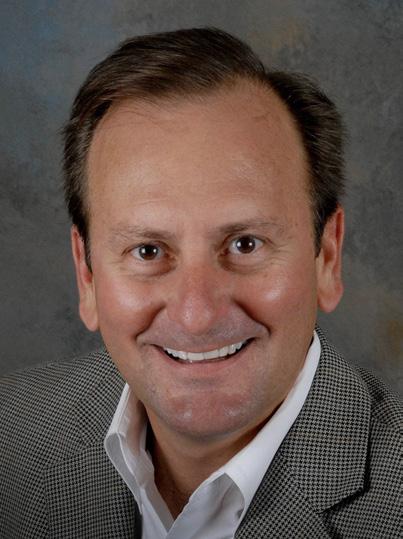
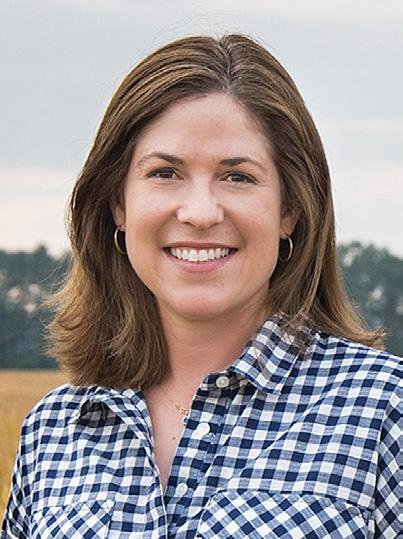 Wes Ward
Kelly Robbins
Wes Ward
Kelly Robbins
“China is a difficult market,” said Ward, who was named the state’s third secretary of agriculture by former Gov. Asa Hutchinson in 2015 and then reappointed to the position by Sanders in 2023. “They are protective of their rice. They take a very protective approach to importing rice into China.”
One way to combat that is to market rice in other countries. Arkansas rice is now heavily exported to Central America and Mexico. About 50 percent of the state’s rice goes outside of the country, Robbins said.
The Rice Federation also markets rice within the country. September is deemed National Rice Month, and festivals, including the annual Arkansas Rice Festival in Weiner, honor that by promoting the product.
New markets for specialty rice have also opened up in recent years, including varieties grown specifically for the production of sake, a spirit native to Japan. The Delta produces some of the most coveted sake rice in the world and has even spawned Arkansas’ first sake producer, Origami Sake in Hot Springs.
The specialty rice is grown only in Arkansas on land that is strictly farmed for rice and has no yearly crop rotation.
“It’s a slow go,” Robbins said of the length of time to grow the specialty rice, “and it doesn’t produce a high yield, but it’s the only type of rice grown in the country.”
“Farmers need to know if rice prices are good and how long they will stay that way.”
— Kelly Robbins , Arkansas Rice Federation

(Photos provided)
Production has increased vastly since the first rice was planted in Arkansas 120 years ago. Nebraskan entrepreneur W.H. Fuller traveled to southwest Louisiana on a hunting trip in 1896 and saw locals there growing rice in Crowley. Fuller, who had moved to the Stuttgart area in eastern Arkansas, realized that the Louisiana clay soil needed to grow the rice was similar to that found in Arkansas.
“We had good rice country if we had the water,” Fuller said of Arkansas, according to a 2005 article in Arkansas Historical Quarterly. Fuller returned to Crowley to learn more about rice and making wells for the crop. In 1904, he was proclaimed the “master of rice farming,” and he and his brother-in-law and sister-inlaw harvested 5,000 bushels on the state’s first rice farm.
Now there are 1,877 rice farms that pump $1 billion into the state’s economy. They have created 25,000 jobs for farmers, rice mill operators and workers, transporters and others.
While rice is a massive economic driver in the state, there is also a human side.
Jennifer James, who has farmed rice on 6,200 acres in southern Jackson County with her family for 30 years, writes a blog

about her agricultural adventures.
“I hope to give you a glimpse of what a true Southern family row-crop farm looks like,” she states in the introduction to her blog at FieldGoodLife.com.
“I put the content out there for everyday folks,” she said. “A lot of people don’t realize all that goes on in farming. Some are far removed from the agriculture world.”
James said she now works on the business side of the farm by preparing taxes, checking market forecasts and fertilizer prices, debating about what crops to rotate, and developing her yearly operating budget.
She has not made any blog posts recently because she has been busy, she said, but she hopes to write more soon. She also wants to use her forum to promote women in the agricultural industry.
In addition to farming, she serves on the Arkansas Rice Federation and the Riceland Foods boards.
“I want to be here on the farm,” she said, “but I have an itch to advocate and influence policy. When we go to national rice meetings and we say we’re from Arkansas, it’s like being a star. We’re a big thing nationally.”

Since 1988, Greenway Equipment has been dedicated to providing our communities with the equipment, parts, services, and expertise they need to take on every project, every season!










WWhen it comes to meat, there are plenty of reasons to chew the fat. According to the Arkansas Farm Bureau, people consume an average of 70 pounds of beef, about 50 pounds of pork and nearly 16 pounds of turkey per year.
How does all that meat make it onto the plate? According to the Farm Bureau, 97 percent of Arkansas farms are family-owned, so it is likely that there is a family behind most meat-based meals, and there are plenty of organizations working to promote protein industries.


As the leading agricultural industry in Arkansas, poultry is not chicken feed. According to the Poultry Federation, more than 6,500 farms in Arkansas produce some kind of poultry. In total, the industry provides about 157,600 jobs and, in 2021, provided about half of the state’s total agriculture cash receipts at $5 billion.
“One of our missions is to provide the safest, most affordable and abundant supply of chicken, turkey and eggs that are used to feed the world,” said Marvin Childers, president of the Poultry Federation.
Established in Little Rock in 1954, the Arkansas Poultry Federation was created as a nonprofit trade organization to represent the state’s poultry and egg industries. In 1998, the office merged with Oklahoma and Missouri and became the Poultry Federation.
The Poultry Federation works to promote and protect poultry interests, from production and distribution to merchandising and consumption, in addition to increasing efficiency, encouraging research, supporting youth programs and providing information about the industry with an eye for market expansion.
“We struggle to educate the general public on where their food comes from,” Childers said. “All poultry and eggs are grown by family farmers and processed by poultry companies.”
The organization hosts a number of annual events for those in the industry, including the Food Safety Conference, which took place in March; the All Member Meeting, which took place
in April; the Poultry Festival in June; the Nutrition Conference in August; and the Poultry Symposium for Production & Processing in October.
The 12th annual Food Safety Conference drew more than 300 food safety professionals, industry representatives and academics from across the country to Oaklawn Racing Casino Resort in Hot Springs, Childers said.
“Participants received critical information on the topic of food safety and quality and compliance challenges from some of the best and most knowledgeable speakers in the business,” he added.
Now in its 64th year, the Poultry Festival draws members and friends of the poultry and egg industries from across the country. In 2023, the organization sold more than 4,500 tickets to the festival and had an economic impact on Rogers of nearly $4.2 million, Childers said.
Festival activities include a golf tournament, trap shooting, a fishing tournament, a scholarship auction, an industry awards ceremony, an all-member barbecue contest and a 4-H barbecue contest, as well as a concert at the end of the festival. Last year, the 27th annual scholarship auction raised more than $136,000, Childers said.
“For over 20 years, TPF has provided scholarships to deserving young people interested in pursuing a career in the poultry and egg industry,” he said. “All proceeds from the auction are applied to the scholarship fund and support our partnerships with 4-H and [National FFA Organization] in Missouri and Oklahoma.”
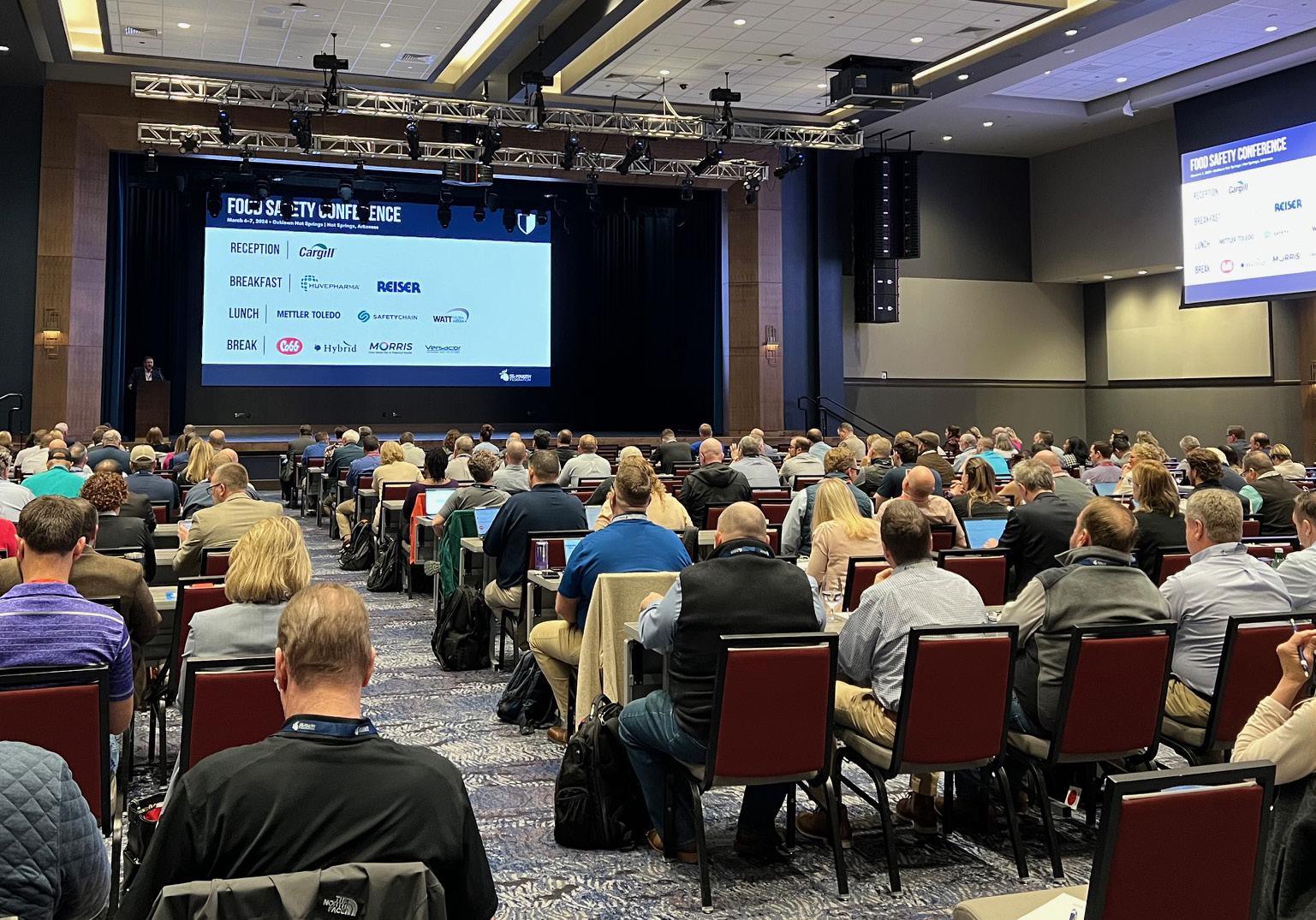
The poultry and egg industries face challenges on a daily basis, he added.
“Currently, we are facing several poultry diseases that can be devastating,” he said. “As we move to antibiotic free, this challenge becomes more difficult.”
Research and education are key to ensuring environmental stability in the industry, he said, adding that the Poultry Federation is always on the lookout for new technologies that can assist.
“We must continue to support the universities that do the research for the industry and always be willing to adapt to changes,” he said.
Founded in the 1970s, the Arkansas Pork Producers Association works to promote pork as the “meat of choice in the 21st century.” Arkansas’ place in the industry has fluctuated over the decades. Jerry Masters, executive vice president of the association, said the state’s pork industry grew rapidly during the early 1990s, and the state was 10th in the nation for pork production in the early 2000s.
Then one company left the business in 2002, and the state’s numbers declined by about 65 percent, he said. Now the state ranks 22nd in the nation for pigs produced, he added.
Almost all the pigs born in Arkansas are transported out of state at weaning time because most corn growers, feed producers and packers are located in the Midwest, so it is more economical to send pigs there than raise them to maturity in Arkansas, he said.
“At one time, we finished a lot of pigs out here until they got market weight,” he added. “Today, we send pigs north to the companies’ finishing facilities.”
New and established technologies have increased production efficiency over the years, he said.
“There are constant advancements in technology in trying to
make our animals more efficient through breeding and through genetics,” he said. “The amount of production that we’ve been able to improve in terms of pigs per sow per year and feed efficiency on pigs, that has continually gotten better and better.”
The association works with youth organizations such as 4-H and FFA chapters to fund scholarships, judge showmanship and skill-a-thon contests, and educate young people about nutrition, health and animal care.
One of the Pork Producers’ most successful events is the annual golf tournament, which is scheduled for May 22 at Chamberlyne Country Club Golf Course in Danville.
“Pork producers, company employees and our allied industry members and interested parties come to participate in the golf tournament,” Masters said. “That has been very successful for us over the last 25 years.”
In 2005, the Pork Producers worked with then-Gov. Mike Huckabee and his staff to help establish the Arkansas Department of Agriculture, he said, and during the most recent legislative session, pork producer and state Rep. DeAnn Vaught helped change the regulation authority of Regulation 5, which governs pork production, from the Arkansas Department of Environmental Quality to the Arkansas Department of Agriculture.
The public’s perception of the Arkansas pork industry’s stewardship of the environment is one of the biggest challenges facing the industry, he added.
“I know a lot of people don’t understand what our producers have to go through to maintain a permit in terms of setback requirements, soil tests, record keeping and wastewater samples,” he said.
Other challenges to the pork industry in Arkansas include a large feral hog population that threatens the health of domestic swine herds and thinning profit margins for pig farmers, he added. Competing for consumer dollars is the main way to improve profits, he said, adding that the Pork Producers work to promote pork’s nutritional value and relative inexpensiveness.
“Pork is a very nutritious protein source,” he said. “It’s a great value for consumers to purchase, and as an organization, we look forward to not only working with our producers, but working with consumers to educate them on the positive environmental responsibility of our producers in every aspect of the business.”
Beef, too, is an important industry in Arkansas. Jake Cartwright, director of commodity activities and economics for beef, equine and dairy at the Arkansas Farm Bureau, said the beef cattle industry directly contributed $687 million to Arkansas’ gross domestic product in 2022.
Of the state’s 13.7 million acres of farmland, he said, 43 percent is used for hay production or pasture, the vast majority of which supports beef cattle production, and of the 38,000 farms in Arkansas, 20,000 of them, or 53 percent, produce cattle.
“Ag is the largest industry in the state,” he said. “With 53 percent of the farms that are in the state producing cattle in some form, it’s obviously a major player.”
Another challenge affecting not only the cattle industry but agriculture as a whole is the delay of the Farm Bill.
The Farm Bureau hosts two meetings a year where producers can learn about current events affecting the industry, mingle with other producers from across the state and discuss ways to overcome challenges facing the industry, he said.
The Farm Bureau is active in the state fair and also partners with the Arkansas Cattlemen’s Association and the Arkansas Beef Council. In addition, 4-H and FFA provide youth with hands-on training and information to prepare them for careers in the cattle industry.
Over the past two years, drought has been one of the biggest challenges facing the industry, he said, adding that the resulting lack of feed has caused a reduction in cattle. The industry is currently at the bottom of the 10-year cattle-production cycle that peaked in 2019 and dropped steeply over the past two years, he added.
“For producers, it’s affecting prices, so because there’s less cattle, the supply-and-demand aspect of that, prices have gotten better,” he said. “On the consumer aspect of that, you’re going to see, in the grocery store, beef prices are going to get a little bit higher as they start trying to accommodate for there being not enough cattle.”
Some farmers have turned to pasture, rangeland and forage insurance to hedge their bets when it comes to the drought’s effect on the feed supply, he added.
Although prices are on the rise, he added that they are only just beginning to catch up with inflation, which has caused labor and other costs to skyrocket at cattle operations over the past few years, he added.
Another challenge affecting not only the cattle industry but agriculture as a whole is the delay of the Farm Bill, federal legislation that renews every five years and provides the foundation for many agricultural programs, he said. The new version of the bill expected last year was not written, he said, and the upcoming election has caused concerns that it may not be renewed this year.
“You’re probably looking at, ultimately, 2025 to get one,” he said. “The Farm Bill lasts for five years, and it gives producers a lot of certainty about what the industry’s going to look like for the next five years and what programs are going to be funded for if they’re going to have insurance for this or that product or, you know, disaster relief money or something like that, so it’s certainly probably one of the biggest things affecting the industry right now.”
Drones and machines that use artificial intelligence have allowed farmers to maintain farms more efficiently by specifically targeting weeds rather than targeting an entire pasture, he
added. In addition, genetic advancements in the cattle industry allow today’s farmers to produce more meat using fewer animals and less feed than ever before, he said.
“2022 was the most beef that America’s ever produced before,” he said. “2023 was right next to it, and our cattle herd numbers are very close to a 50-year low right now, so genetics have been a major tool in producing more beef for consumers with less animals and less feed.”
Some common practices that promote eco-friendly cattle operations include rotational grazing, erosion control, discouraging invasive species and reintroducing native grasses, he added.
Since the COVID-19 pandemic, the industry has seen an increase in direct-to-consumer beef production in which consumers buy beef directly from farmers, rather than at grocery stores, he said, adding that he expects the segment to continue growing.
“We’ve seen a huge growth in that, and I really don’t think that area of the industry is going to go anywhere,” he said. “I think now more than ever, consumers are well aware of what they’re buying and putting on their plates, and they want to have that connection with the person who grew their food.”
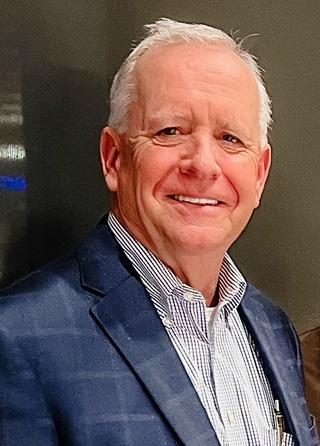
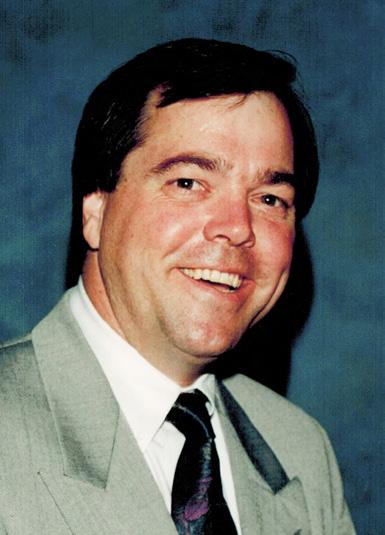
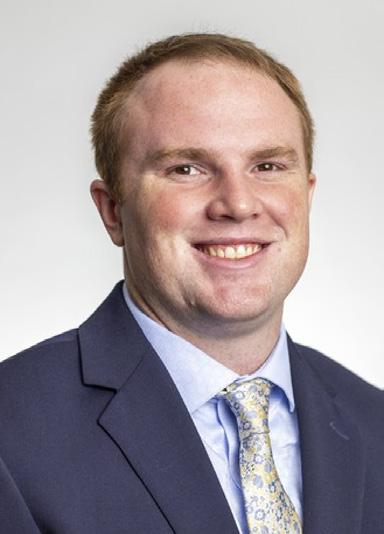
With a mission to ensure agriculture remains viable and profitable, the Farm Bureau will continue its work to ensure beef producers in Arkansas can grow healthy cattle and access a market that allows them to make a living, he said.
“There’s lot of people that picture farmers and ranchers like we would have 100 years ago,” he said. “They think of a farmer, and they see an old man that’s on a tractor, wearing overalls and carrying a pitchfork, and the reality is that agriculture is really the cutting edge, in a lot of cases, in modern science and technology and that farmers and ranchers, they’re feeding more people that we’ve ever fed before with less land and less resources than we ever had before.
rkansas may be known for its chicken and rice, but if an emerging generation of producers have anything to say about it, the state may also one day be known for a range of alternative proteins to feed an increasingly diverse audience. Designer beef, bison and even rabbit are slowly gaining a foothold in the state’s ag industry to satisfy a variety of market demands.
The rationale for raising these specialty proteins is a multifaceted one stemming from consumer and societal preferences that follow several related and non-corresponding market trends. On the one hand are carbon concerns — beef and pork take time and space, consume resources, and produce waste that some corners of society say is unsustainable at best and environmentally catastrophic at worst. This has given fuel to vegetarian and vegan influencers and driven up market shares being claimed by plant-based meat products, in addition to pushing the argument for animal production that takes far less space and resources.
Meat is also a political issue. Billions of dollars are tied up in American agriculture, and political unrest around the world threatens the supply chain and foodstuffs both inbound and outbound. Related to this but largely still fringe is the animal rights movement, which decries inhumane treatment of animals as food sources and further fuels plant-based and lab-created meat replacements.
Health concerns have long been another driver for livestock
production trends as producers look to bring to market proteins that are leaner and have less artery-clogging fat. Related to this has been increased market demand for organic meat from animals that have been raised on grass and without hormones or other chemical additives, for which consumers have shown a willingness to pay more. Such options are harder to come by in mass-produced proteins these days, a point rammed home in March when restaurant chain Chick-fil-A joined Tyson Foods, Pilgrim’s Pride and other producers in backing off its pledge to only serve chicken that has never been fed antibiotics.
Despite all of this, the data shows most Americans are not quite ready to jump ship on meat proteins just yet, although a growing number are making supplemental changes to their weekly diet. According to BeefResearch. org, two-thirds of 2021 consumers were nonrestrictive eaters, while 20 percent were semivegetarian or flexitarian, meaning they generally follow a vegetarian diet but eat meat on occasion.
Almost seven in 10 consumers overall ate beef at least once weekly in 2021. According to
the Consumer Beef Tracker survey conducted by the National Cattlemen’s Beef Association, 80 percent ate chicken, 47 percent ate pork, and 45 percent ate fish. Of the 31 percent of consumers that ate meat alternatives weekly, statistics showed it was not their sole source of protein because 83 percent also ate chicken, 73 percent ate beef, 47 percent ate pork, and 45 percent ate fish.
BeefResearch.com also found that even rising prices have not been enough to convince the vast majority of carnivores to back off meat on the household menu. Americans put away 58 pounds of beef per capita in 2021, continuing a five-year upward march, though still well off from 2000 to 2009, when consumption averaged 65.3 pounds.

parents would tell you that I wanted to be a zookeeper or something like that when I was little.”
Finally, there are market forces so basic they have nothing to do with any of the above, such as people who simply want a new gastronomical experience as seen on cooking shows or via foodie content on social media that extolls super high-end proteins.
Arkansas’ agricultural community offers a variety of specialty producers seeking to find their place in this protein diorama. Tribe Ranch in Bonnerdale is a good example; a family-owned and -operated outfit that is looking to build on the wagyu brand caché.
“My brother actually found the Akaushi breed, which is a breed of wagyu [cattle]. All of Akaushi is wagyu, but not all of wagyu is Akaushi,” said Logan Tankersley, who works the ranch with his father, mother, wife, brother and sister-in-law. “Once we found that breed and found the company that originated bringing them over from Japan to start a herd here, we met with them and did a bunch of research with them and the American Akaushi Association. We just realized we wanted to be different and have a little niche.”
The family has built a herd of 42 full-blooded wagyu, 60 black angus and 45 cross-bred animals, half of which will soon birth calves that are 75 percent wagyu and 25 percent angus — not bad for a family that had zero ag experience prior to establishing the ranch three years ago.
“My parents have always wanted to be in agriculture and just that sort of lifestyle because that’s how people used to survive every single day,” Tankersley said. “I’ve always loved animals. My
The family, whose previous careers ran from manufacturing to law enforcement, knew enough to enlist some help to give them a crash course in their new venture. They brought in a bona fide cattleman from Montana to learn the finer points of ranching.
“Curt Pate is one of the world’s greatest cattle handlers. His great-great-grandparents came [to Montana] by wagon to settle their land,” Tankersley said. “We had him come in right off the bat. He brought his trailer here and stayed for three or four months and poured into us. He really helped us learn to be safe and taught us about low-stress cattle handling.”
The family’s venture comes at a time when wagyu beef is soaring in popularity. Technavio recently reported 2021 was a record year for Japanese exports of the prized beef, totaling 8,000 tons worth $4 billion. Once available only in Japan, wagyu cattle were first exported to the U.S. in 1975, and this continued in limited quantities through the 1990s before the Japanese government banned further export of all wagyu genetics.
The limited number of animals that exist in the U.S. makes purebred wagyu meat raised domestically quite rare, giving rise instead to the “American wagyu” crossbreed. The angus genetics results in meat that is leaner than Japanese wagyu and imparts a beefier flavor.
Tankersley said the ranch is just getting to the stage where it can supply meat to the Arkansas restaurants that have shown interest in the family’s beef. Each step has been deliberate to help preserve product quality, he said.

“We wanted to do something really special,” he said. “We wanted to get away from selling calves at a sale barn, where they might go to some huge feedlot for a fast-food burger. We want to raise high-quality, healthy beef that the American consumer would like.
“We believe if there’s a bunch of stress and they’re getting a bunch of artificial things in their diet or on the ground, it will affect the meat. I think people today are more concerned about what they’re eating and where it comes from. I think that’s going to be a big deal.”
Another relative newcomer who learned his craft from the ground up is Rod Chiodini, founder of Ozark Valley Bison Farm in Fox. Chiodini, a former microbiologist, landed in Arkansas 20 years ago from Massachusetts in pursuit of a dream of living in the wide open spaces.
“We’ve been looking for a farm for years and found this one that had been deserted for almost 40 years,” he said. “We spent the first 10 years or so just reclaiming the land and so forth. Our original plan was to raise cattle, but like many people, I only wanted a couple of heifers and a bull to have running out in the pasture and let them have babies.
“I’d spent some time in Montana, and I had a lot of exposure to [bison] and fell in love with them. We actually didn’t like the cattle we were looking at then, so we decided to go with the bison. According to the state veterinarian, we are the largest

herd in the state.”
There was a time in the state’s history when Chiodini would not be the curiosity he is today when it comes to bison. Tens of millions of the animals once roamed North and Central America prior to the Europeans arriving. Spanish and French explorers found plenty of the creatures in the mid-1500s and late 1600s. By about 1820, the animal was long gone from the Natural State, and rampant slaughter of the beasts throughout the decade brought the bison to the brink of extinction. Today, about 400,000 bison populate private and government herds throughout North America, the National Bison Association states.
The animal’s flavor profile and leaner meat has steadily created a market for bison, but raising them presents some unique challenges, Chiodini said, especially when it comes to processing.
“The first thing is they’re not domesticated. They are classified as wild animals,” he said. “You take the wildest cow you can get and multiply that by about four, and you have yourself a bison. Everyone knows what happens when you put a wild animal into a corner. Think about a young, 1,000-pound animal backed into a corner.
“I used to have processing done at a plant in Pottsville, but they won’t do them anymore. I brought them an 1,800-pound bull one time, and he kind of convinced them never to do bison again.”
The farm’s 73 head roam over 200 acres and supply Chiodini’s operation, the only all-grass-fed herd on the continent certified by the U.S. Department of Agriculture.
“I think the market found us,” he said. “We do have a Facebook page and stuff, but I’d say 90 percent of our market comes from our website and repeat customers. We sell bison all over the country. I do take early deposits on the calves, and I’ve got calves going down to Florida and all the way up to Pennsylvania that aren’t even born yet. We also sell retail meat that’s all USDA inspected, and I do sell about six 2-year-old bulls each year as market-ready animals.”
Chiodini, 67, said the market opportunity for bison is limited only by his own capabilities as a solo operator.
“I’m not sure I want to grow very much. I really can’t,” he said. “What people don’t appreciate or understand is if I want to kill eight animals for meat a year, that adds 24 animals to the herd because I only process once a year at 28 months of age. I’m not a spring chicken anymore. This is my retirement.”
One meat source, rabbit, checks all of the boxes for the ideal source of protein. The animals take far less space than cattle or hogs and reach market size in just 10 weeks, therefore requiring less food. Possessing a lean, protein-rich meat, a market-ready rabbit yields about as much as an average chicken and can be prepared similarly, from grilling and frying to stewing and barbecue. Plus, the animal’s famed proclivities means an ample supply of livestock can be produced year in and year out from just a couple pairs of starter adults who yield about nine litters per year.
We all grew up with the Easter bunny. That has something to do with it.”
Wolverton, who has kept rabbits since childhood, launched Always Wabbit Country in 2018 as a way to supplement the family’s food sources and as a business.
“I started out my rabbitry with four rabbits, two females and two males,” she said. “I knew that if we needed meat, that it was a cheap way to go. Rabbits are fed a pellet. A bag of pellets costs under $20, and four rabbits and a 50-pound bag of food lasts about two months. It’s a very good meatto-food ratio, a very sustainable thing.”
Rabbit is more widely consumed around the world than it is in the United States, from gourmet French dishes lapin à la moutarde (rabbit stewed in mustard sauce) and civet de lapin (rabbit stew with red wine and vegetables) to more rustic Italian coniglio alla cacciatora and traditional Chinese and Moroccan dishes.
One meat source, rabbit, checks all of the boxes for the ideal source of protein. The animals take far less space than cattle or hogs and reach market size in just 10 weeks, therefore requiring less food.
“It tastes a lot like chicken,” Wolverton said. “It’s a white meat, very healthy, extremely lean. It can be fixed in dishes in replacement of chicken. You can flavor it just like you would chicken, and it’s really good. Why you can’t find rabbit in a grocery store is still beyond me because it’s so much cheaper [to produce] than cattle or hogs.”
For now, Wolverton raises rabbits for her own family’s use, as well as selling live meat rabbits at farmers markets. She also dispenses plenty of information to those who contact her, wanting to establish their own rabbitry. She does not sell meat directly to the public due to a labyrinth of regulatory requirements but is trying to advocate for the industry in Arkansas overall to create more of a market for the product, from meat to pelts to rabbit waste, which she said makes an excellent, ready-to-use fertilizer.
About the only knock against rabbits as a sustainable food source is, as rabbit farmer Andrea Wolverton at Always Wabbit Country in Ash Flat said, an image problem.
“In the United States, we grew up with bunnies that are fluffy and cuddly, and I think we can’t get past that cuddly, fluffy thing,” she said. “I think that is part of the reason why it hasn’t gone over real well in the professional agriculture industry and it hasn’t really taken that next step.
“My goal is to meet with the Arkansas USDA and talk to them about this,” she said. “I would also start doing some education to homesteaders and let them know that while almost every single country farm has chickens, chickens take a long time to grow out if you’re wanting meat from them. My rabbits take less than half of the time to reach processing weight.
“I really want to start educating homeowners and homesteaders about the business of sustainable rabbit meat. It just makes so much sense.”

Agricultural row-crop and grain-production land has seen strong appreciation over the past several years, particularly with large, highly efficient and improved farms in areas of quality ground water combined with good farmers and prospective tenants, said Gar Lile, founder and president of Lile Real Estate in Little Rock.
Higher prices are making it more difficult for farmers to make a profit, he said, and higher input costs to grow the respective crops, combined with decreasing commodity prices, will have a major impact on farmers this year and in the foreseeable future.
Major factors that impact the cost of farmland are supply and demand, but Lyle said just as impactful are inflation perceptions, the relatively low interest rate environment — in spite of recent upticks — as well as the commodity prices of the respective crops and the attractiveness of alternative investments.
Lile said the market is not necessarily seeing a lot of individual out-of-state buyers, but there is a good bit of interest in farmland by real estate investment funds and trusts, which are geographically diverse.
Ryan Loy, extension economist with the University of Arkansas System Division of Agriculture, said the cost to purchase or rent land depends on location, soil quality and the crop being grown.
Loy cited data from Fayetteville real estate investment firm AcreTrader that found Arkansas farmland has risen an average of 5 percent per year over the past 20 years.
“Currently, Arkansas farmland averages about $3,200 per acre with an
appreciation this past year of 2.3 percent,” he said. “That is below the 5 percent long-run average. Interest rates could be a factor in the slowdown. Particularly for big purchases, folks might be a little leery about locking into high interest rates now when rates might start coming down, and they are wary of variable rates in case interest rates pick up. Nobody knows where interest rates are going.”
Farm rental rates average $120 per acre, but Loy said 20 percent to 25 percent crop shares have become increasingly common. Instead of paying rent per acre, the landowner takes 20 percent to 25 percent of the crop revenue.
“We have had high commodity prices the past three years, so that crop-share model has become more popular, especially in a good year with high yields and high prices,” Loy said. “If you are in a 25-percent crop share agreement, the farmer receives 75 percent of revenue but often must pay 100 percent of production costs.”
A foreign ownership ban is in place for China, Iran, North Korea and Russia. In October of last year, Arkansas made national headlines by being the first state in the country to require a Chinese state-owned company to divest its ownership in Arkansas land.
“The land in question is owned by Northrup-King Seed Co., a subsidiary of Syngenta Seeds, which is ultimately owned by China National Chemical Corp. a state-owned enterprise,” Arkansas Attorney General Tim Griffin said in a statement last fall. “I am ordering ChemChina, as a ‘prohibited foreign-party-
“Folks who can’t get rice seed to plant might switch to something else, such as soybean, for this year.”
— Ryan Loy, UA System Division of Agriculture
controlled business,’ to divest this land within two years or I will commence an enforcement action in Craighead County Circuit Court. Additionally, as the owner failed to file in a timely manner documents required by Act 1046 of 2021 with the Arkansas secretary of agriculture, I am also imposing a civil penalty of $280,000, which represents 25 percent of the reported fair market value of the property.”
Loy said he has heard most buyers from other states who purchase farmland in Arkansas are interested in land for recreation, primarily hunting. That carries a whole different pricing scheme.
Higher interest rates have dampened some large spending on farms, and Loy said the rates make it harder to make a profit. It all depends on the person and what they need.
“Not everybody gets the same interest rate,” Loy said. “For a younger farmer, interest rates might be extremely high. Someone with a lot of historic lending for that farm could get something around the prime rate of around 8 percent to 8.5 percent. The commercial lending route could carry an extremely high
interest rate. However, if you can get loans directly from the Farm Service Agency, you might be able to get operating loans at 4.8 percent or 5.2 percent, but those loans carry their own eligibility requirements and loan amount caps.”
Costs for fertilizer are up about 4.1 percent over last year but still significantly lower than 2022, a COVID-19 pandemic year that stands out for high production costs. Why are costs for fertilizer increasing again? Loy pointed to a lot of market uncertainty because of global conflict, export restrictions from China and the price of natural gas.
Russia was one of the leading exporters of nitrogen fertilizer, but after Russia invaded Ukraine, the market was not available due to transportation disruptions and trade restrictions.
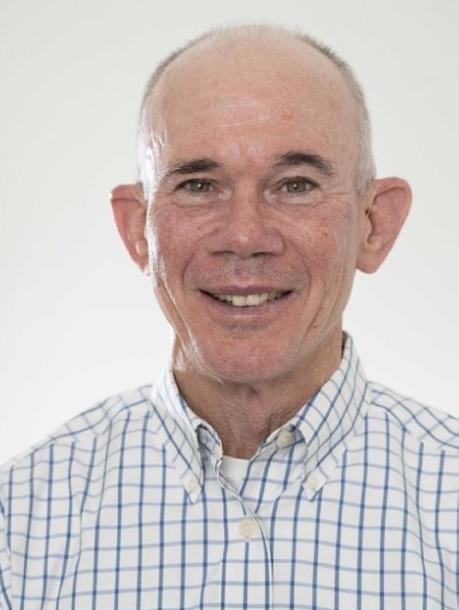

“Since then, the global capacity to produce these fertilizers has adjusted for the lack of Russian supplies,” Loy said. “Prices will slowly come down and stay steady with a few increases from demand, I think. The other part of the global disruption is the Israeli conflict. Israel is a major potash exporter. Nothing yet has happened to disrupt that supply, but it could happen at any minute. Houthi rebels are attacking ships, and major exporters are not using the Suez Canal right now. China imposed an export ban in 2022 to help with their domestic price of fertilizer. No one knows if that will continue or not. If it does, these uncertainties could begin to put a lot of pressure on prices.”
On the seed side of things, a major concern is with the cost and availability of rice seed. Rice seed is extremely expensive this year.
“Our rice ergonomist says it could impact acreage,” Loy said. “Folks who can’t get rice seed to plant might switch to something else such as soybean for this year.”
Typically, animal feed prices follow the corn market. Corn is lower this year after three consecutive years of higher prices. As of mid-March, December futures were $4.71 per bushel, which is extremely low.
Another continuing issue is labor. Loy said domestic labor is hard to find and, if it is found, hard to maintain.
“Especially since COVID, folks are not working as much, and the last thing they want to do is manual labor on the farm,” he said. “A lot of farmers have to go with immigrant labor, and sponsoring foreign labor has become extremely expensive. H-2A visa rules are becoming more expensive for the farmer. Labor is not getting any cheaper, especially specialized labor. How much help you need depends on the crop you are growing.”

With advances in farm technology, Ryan Moore could theoretically drive his tractor on any field in the world while sitting on his couch in Little Rock.
Moore, the owner of M&M Ag Consulting, said “theoretically” because of certain liabilities that may prevent him from safely operating his tractor only with computer technology. There could be unseen debris or erosion in a field, someone could inadvertently step in front of the moving equipment, or there could be a glitch in the internet connection used to pilot the tractor.
Nevertheless, this is the direction farming is headed, and those in the industry predict all-automated farms within a decade.
Moore can already check on any field his company oversees by using his computer — all while sitting on that couch.
“Logistics make it able to check on a farm anywhere in the world,” Moore said. “I’ve had customers sit on a beach and watch their farm on their laptop.”
By Kenneth Heardand [machinery] spraying crops, all with the push of a button if the perimeters are set up. We’re not at full production yet where there’s no one in the [tractor’s] cab — yet.”
John Deere promises fully-automated tractors by 2030, noting on its website that farmers “are already closer than you think.” Many are already using precision technology such as AutoPath guidance systems or StarFire receivers that help farmers plant and irrigate fields more accurately.
 Ryan Moore
Ryan Moore
Moore’s system uses 360-degree cameras to observe fields and evaluate the data it records. The new technology is geared toward creating better yields, saving farmers labor costs and eliminating worker fatigue.
Costs of the new technology may be prohibitive to some farmers. Computer systems are expensive, and if they break down, they are costly and time-consuming to repair, but Moore and others see the benefits of advanced technology in the fields.
Moore’s company advises farmers about money- and timesaving strategies using GPS, satellite imagery, data-driven programs and automation.
“It’s here today,” he said. “We can have tractors planting seeds
“The pros far outweigh the cons,” he said. “These systems can do more acres a day than we could 10 or 15 years ago. Farmers can do field preparations now in the fall using this. Before, they’d be doing it around Thanksgiving. Most of my farms are done by November.”
The technology can also help farmers avoid human errors.
Using remote diagnostics, Moore said, can allow farmers to catch mistakes such as forgetting to shut off irrigation pivots.
Instead of a farmer having to check fields for the pivots, the system will send critical warnings and then turn off pumps and machinery when commanded.
Such systems can also evaluate planting success. Imagery can monitor growth patterns and isolate any weeds that may grow in areas. Using that data, farmers can apply pesticides and herbicides on the “troubled areas” and not waste chemicals, money and time on the better-producing areas.
“It’s a great thing,” said Jackson County rice farmer Joe Christian, “but it really depends on the cost now. The cost of equipment is overwhelming. If it continues with this inflation, it will break a lot of us. I think once they figure it out, it’s going to help a lot of people.”
Christian, who has farmed for more than 40 years along the Cache River, said the technological advances could result in saving farms.
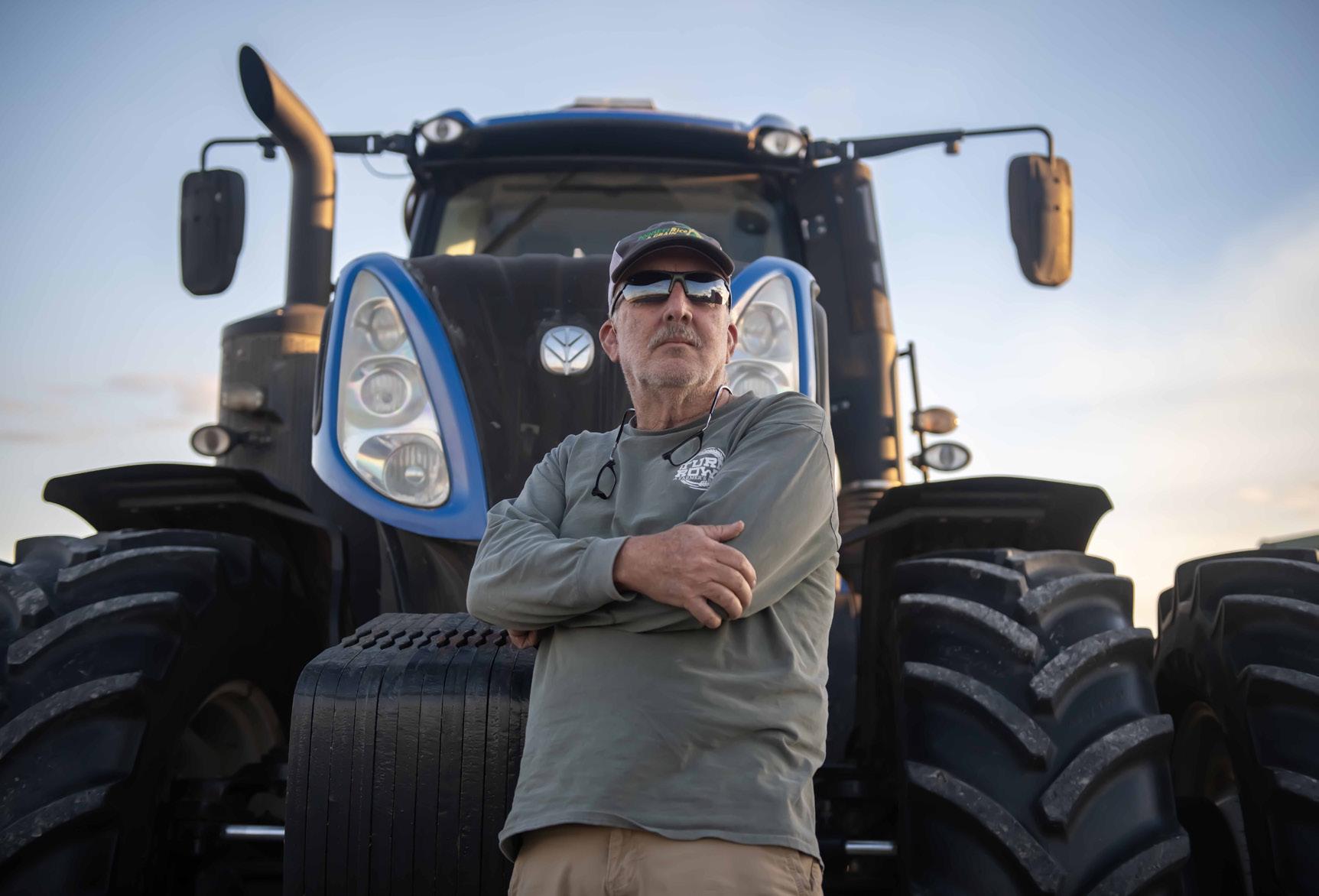
“It used to be that you lived on the farm, and the whole family had jobs on the farm,” he said. “Now it’s a lot of people far removed from that.”
He added that using the data-driven farming systems can also save money in the long run.
“It’s hard to find labor,” Christian said. “Nobody wants to work on farms anymore. It’s long hours, and you get your hands dirty. Farming is all about working to save money. If there’s anything involved in saving money, we’re all for it. Technology is not necessarily just driving a tractor. There are lots of other things it can do.”

Cengiz Koparan, an assistant professor of precision agriculture technology at the University of Arkansas System Division of Agriculture, began what he called his “journey” into studying farming technology almost 20 years ago.
Then he planted 1,000 apple trees at his family’s farm in Ankara, Turkey. It was an extensively labor-based task, he said.
“It took seven or eight days to harvest them with seven or eight people working,” he said. “I realized a robot could work overnight and do it in one day.”
Koparan earned a bachelor’s degree in agricultural engineering from Ankara University in 2008 and a master’s degree in business management from the University of Cambridge in England in 2012.
He began working at the University of Arkansas in 2023 and is studying the use of drone systems for remote sensing and the implementation of self-driving tractors.
Koparan also focuses on blackberry production. Called a “hobby” by many in Arkansas because those who raise the berries do it more for themselves than commercially, blackberries could become a major crop in Arkansas with the use of the advanced technology, he said.
“It could become a very productive crop,” he said.
Camera-operated drones can check blackberry fields for blooming flowers, evaluate that data and then apply the correct amount of needed chemicals.
Koparan said computerized systems can also evaluate any previous problems farmers experienced with crops and alleviate those problems the following planting season.
“Artificial intelligence can work day or night,” he said. “We won’t need operators on them. It eliminates operator fatigue. From a financial point of view, will this be able to solve all the problems? It will contribute to solving some of them.”
He said the new technology could push Arkansas, one of the leading states in the U.S. in agriculture, even further ahead in productivity.
“Look 20 years back,” he said. “These systems were new ideas back then. Look at cars 20 years ago, and look how advanced they are now. It’s here now. Using robotics can be great for farmers. Arkansas has a high potential for growing, based on experience. With technology, we sure won’t fall behind.”
Emerging technologies are perhaps one of the most impactful influences of the early 21st century, and former Gov. Asa Hutchinson took steps to both capitalize on the economic opportunities offered by such technologies and shield the state against threats caused by them.
In 2019, the Arkansas General Assembly passed legislation to support a cyber alliance aimed at reducing cyber risks and encouraging economic development, and earlier, in 2017, Hutchinson formed the Blue Ribbon Commission to Report on the Economic Competitiveness of Arkansas in Data Analytics and Computing.
That commission birthed the Arkansas Center for Data Sciences, a statewide nonprofit that works to enhance the state’s tech talent pipeline by connecting employees with employers, and thanks to a new partnership announced Jan. 3 between ACDS and the University of Arkansas at Little Rock, computer science students at the university can apply for paid internships and apprenticeships that provide hands-on experience and income while students pursue their degrees.
“The UA Little Rock and ACDS partnership encourages employers and students to develop a relationship early in their pursuit of their computer science degree and offers a summer internship and a potential apprenticeship that would jump-start their career,” said Bill Yoder, executive director of ACDS.
Albert Baker, chair of the department of computer science at UA Little Rock, said he plans to gear the department’s scholarships toward freshmen, promote
internships after sophomore year and encourage apprenticeships the last semester of senior year. If all goes well, students may have full-time jobs lined up before they graduate, he said.
He added that he is working to ensure that students receive credit hours for their apprenticeships, potentially including credit toward their capstone projects. He is also working to open the program to graduate students, many of whom are international students who may be able to benefit from programs that provide visas to graduates who work in high-demand areas in the U.S., he said.
In addition to exposing students to an employer pool, ACDS can provide career coaching, resume preparation and other career services, he added.
“We’re really excited,” he said. “This whole idea of apprenticeships and using apprenticeships in higher education is something that I’m seeing an awful lot about now, and so it really does make sense, particularly for an area like computer science.”
The partnership represents a shift in higher education toward hands-on, practical experience for students in their prospective career fields, he added.
“A student who has one summer internship and then an apprenticeship, certainly if they do well, they’re going to stick with that company, but going forward in their careers, having that level of experience along with the point in time where they’ve just earned their degrees is going to be invaluable,” he said. “It’s going to give our students a really big leg up.”
Baker, who added that he expects the next wave of information technology to focus on artificial
intelligence, machine learning, augmented and virtual reality, and full-stack software development, said hands-on experience is especially important in tech fields because every company has its own enterprise software development methodology, or way of taking software from concept to completion.
“In order for a student to be productive, actually returning value, they need to understand how the company goes about doing that, and it varies by company,” he said. “There’s no uniform, set way of doing it, so having our students have the opportunity to get that real experience early on will make them more productive employees sooner.”
The program fits well with the state’s larger efforts to enhance cybersecurity and other tech industries, he added.
“Whatever needs for computer scientists that Arkansas industry might have, this is a portal through which employers get access to our students before they graduate, and our students get the opportunity to get real industry experience, so I look at it as complementary,” he said.
Currently in its beginning stages, he said he expects the program to expand its scope and area as it matures.
“It’s going to grow, and it’s going to grow with students from our department, and then one asks the question, ‘Well, what other departments and what other industry areas, what else can we do to foster the inclusion of apprenticeships in undergraduate education?’ and so I think it’s going to grow,” he said. “I think it’s going to grow across our campus, and on down the road, I can see it spreading out to other campuses in Arkansas, as well.”
Lonnie Emard, director of apprenticeship at ACDS, described ACDS as a bridge that connects prospective employees with employers in the tech industry. Over the past four years, the nonprofit has facilitated more than 1,000 apprenticeships, he added.
“[Potential employees] look out over this chasm, and they see these jobs in IT and cyber, and they say, ‘You know what? I think I could do that,’” he said. “Now some of them who are going to school for IT and cyber, they know that’s where they’re headed, but it doesn’t always guarantee them that they’re going to get that opportunity, right? Sometimes they don’t know about all the opportunities, and sometimes the companies still don’t know about them.”
He added that although apprenticeship is traditionally considered for such fields as carpentry and plumbing, learn-and-earn apprenticeship programs
can shore up both the quantity and quality of talent in the information technology sector.
“The foundation of this pathways program was to think about a scholarship to a student who then gets attached to an employer who then promises an internship to get them some meaningful work experience and then eventually hiring them full time as an apprentice even before they’ve graduated but with the notion that they’re going to start working and earning money, but they’re not going to stop their education,” he said. “They’re going to complete their degree, as well as begin working and earning a salary, and you can imagine that’s a winwin-win all the way around.”
He added that of the more than 150 employers ACDS partners with, it focused on partners in the local area, many of whom have already worked with or shared an interest in UA Little Rock. Potential employers include Sequretek in Little Rock, Consolidated Admin Services in Cabot, Priority Wire & Cable in North Little Rock, Mainstream Technologies in Little Rock, and technology-solutions provider Metova.
“Some of them already knew of interns or had interns or folks from UALR, so it’s not a totally novel idea to all of them, but as we introduce the rationale behind why this program was a little different, that gave us a narrower group but one that’s really focused on making this kind of an offer to a candidate,” he said. “We’re just in our infancy here, but already, it’s being received very, very well.”
The main challenge the program has faced so far is communicating how the apprenticeship program differs from traditional recruitment strategies such as offering internships and attending career fairs, which most companies already do, he said.
“We have proven that the apprenticeship program is a great onboarding strategy for employers who either, one, are stealing them from somebody else, or they’re waiting and fishing in the pond with everybody to go to campus and hire,” he said, “and guess what? There’s just not enough in that pool.”
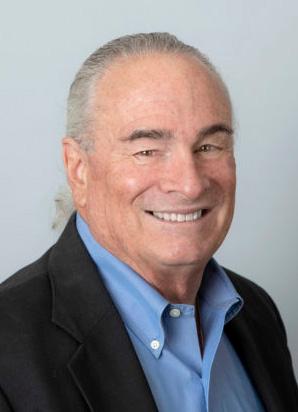
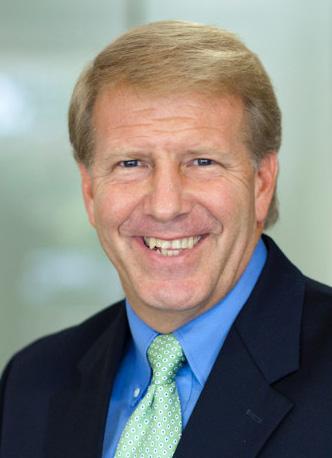

In addition, the apprenticeship program provides greater cohesiveness between the training provider — in this case, the university — and employers so students receive customized training and are better prepared for the jobs that are available, rather than simply having a broad base of technical knowledge.
“Employers and people from industry would rather have somebody learning it but also figuring out how are they going to employ it and actually practicing that so when they come on board, they’re that much more prepared,” he said. “That’s what we’re trying to couple together so that [education and employment] aren’t independent activities, but they can work hand in hand.”
Another distinction is that ACDS provides administrative support to companies offering apprenticeships, he said.
“We’ve taken that burden off of every employer to have to be their own sponsor, so that means we kind of buffer them from the Department of Labor and all that administrative work, so ACDS has done that,” he said. “We help companies find candidates, like through this program and others, that they otherwise were not finding. We project manage every implementation so that that’s not a barrier.”
them as we possibly can?” he said. “How do we scale?”
ACDS has discussed replicating the program at UA Little Rock with John Brown University in Siloam Springs, he added.
“We believe it’s a working model that can scale and can be utilized in a number of higher ed institutions around the state,” he said.
Identifying candidates for computer science jobs earlier, perhaps at the high school level, and connecting them with potential employers could help the state retain talent as students become more aware of the employment opportunities in Arkansas, rather than seeking greener pastures elsewhere, he said.
“We believe it’s a working model that can scale and can be utilized in a number of higher ed institutions around the state."
— Lonnie Emard, ACDS
“The more we can educate parents and students about this program, this combination of what’s going on with UALR, high school scholarships, freshman, sophomore internships leading to apprenticeships, they’re working while they’re in school, this whole idea of earn and learn at the same time, reducing the amount of debt, maybe eliminating it, having them earning income, and then still maintaining that while they complete their degree for their future benefit — I mean, what a model,” he said. “I think it really can serve to be something unique.”
The organization can also access various funding types to offset employers’ costs when it comes to training interns and apprentices.
“ACDS has been able to couple federal grants, state funding through the Office of Skills Development, private foundation grants because of us being a nonprofit to where we’ve offset the cost of that training for every employer in the state,” he said. “That training cost of an apprentice and even sometimes the wage of an intern, we’ve been able to offset that so that the employer didn’t have to bear that cost.”
He added that ACDS does not pay for the costs associated with all interns who enter the program because many companies already have funds allocated toward internship programs.
The main challenge ahead, he said, is to provide even more candidates, employers and schools with access to ACDS programs.
“It’s just a matter of how we integrate the connection between where are the candidates, who are the providers, like UA Little Rock, where are the employers, and how do we take the ACDS model and reach as many of
Emard said emerging technologies such as AI and robotics will continue to become more important across all occupations, not just those in IT fields.
“Most every company is now a tech company,” he said. ‘I don’t care what industry they’re in, right? Technology has now affected what they do, which means every job is being affected by technology, so it’s not just the people writing software, not just the folks that are handling cyber and data analytics, but every job has a technology component to it.”
He added that ACDS not only helps students at UA Little Rock stay out of debt and earn income during their college years, but could help established professionals advance their careers within a company by offering training on new technology.
“They can continue to advance their career when the companies are identifying that next level of opportunity requires more technology,” he said. “Well guess what? Instead of them having to go steal somebody from another company, they’re promoting from within, again, using the apprenticeship program, so it’s a succession plan for the whole state.”


Arkansas business is as wide-ranging and diverse as the Natural State’s beautiful landscape. In this special sales section, Arkansas Money & Politics recognizes some of the state’s most prominent business people, representing the full spectrum of Arkansas industry. Come get to know these leaders of industry in Arkansas.
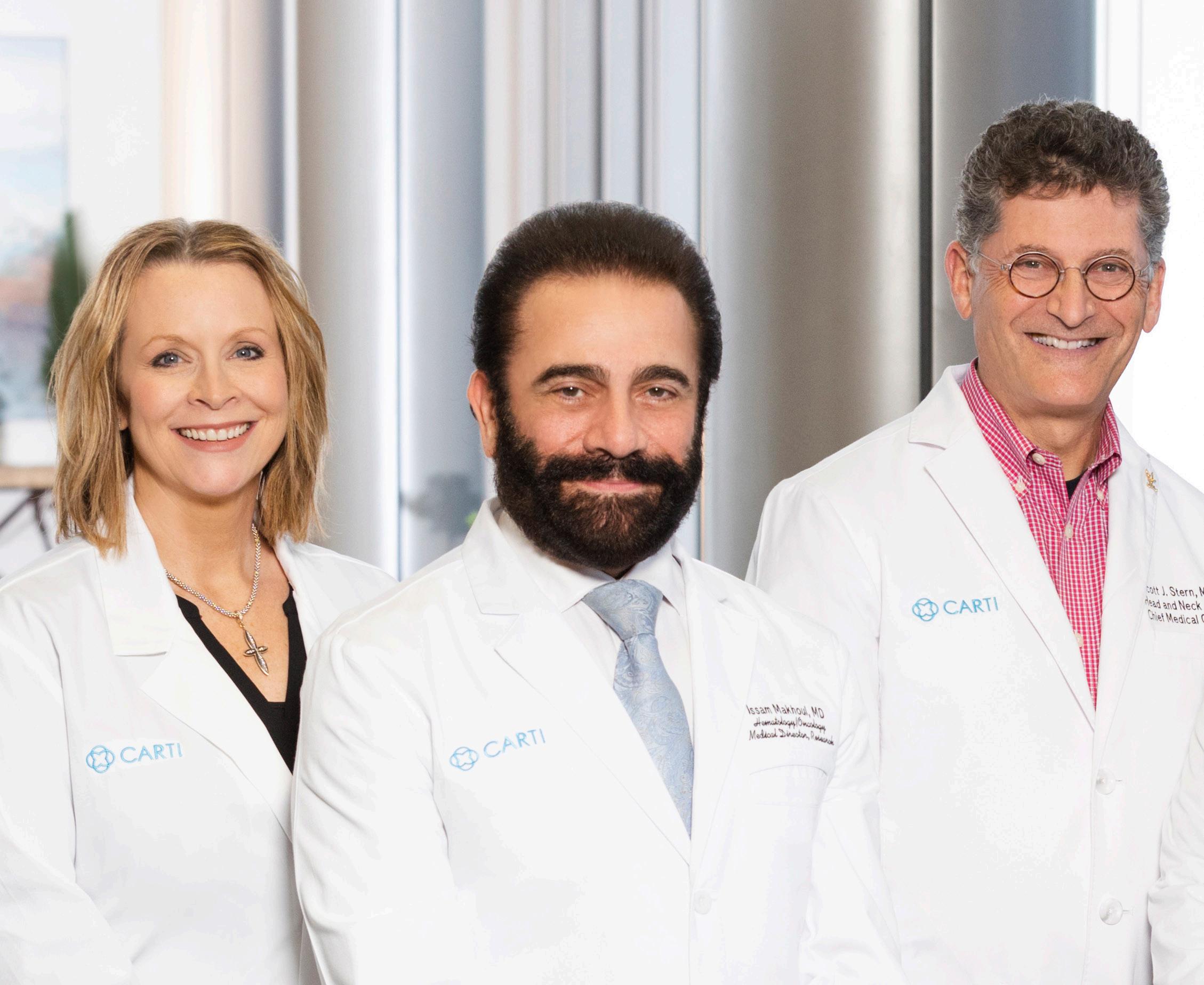
The medical experts and staff at CARTI are unified around a singular vision: to be the cancer treatment destination. An independent, not-for-profit provider, CARTI serves more than 50,000 new patients each year from every county in the state, as well as from across the country.
CARTI is disrupting the traditional standards of care delivery in order to make trusted cancer care accessible for every patient. Instead of expecting patients to travel far out of their way to seek treatment, the medical, surgical and radiation oncologists, diagnostic radiologists, and all other medical providers at CARTI deliver the world’s most advanced techniques to patients in their own communities.
In 2023, CARTI opened Arkansas’ first cancer-focused surgery center, adding to its single, coordinated network of 18 care locations across the state. Located at the flagship Little Rock campus, the 57,000-square-foot CARTI Surgery Center — featuring extended-stay capabilities and minimally invasive da Vinci Robotic-Assisted Technology — offers a more convenient and comprehensive alternative for patients while enhancing patient experiences and outcomes.
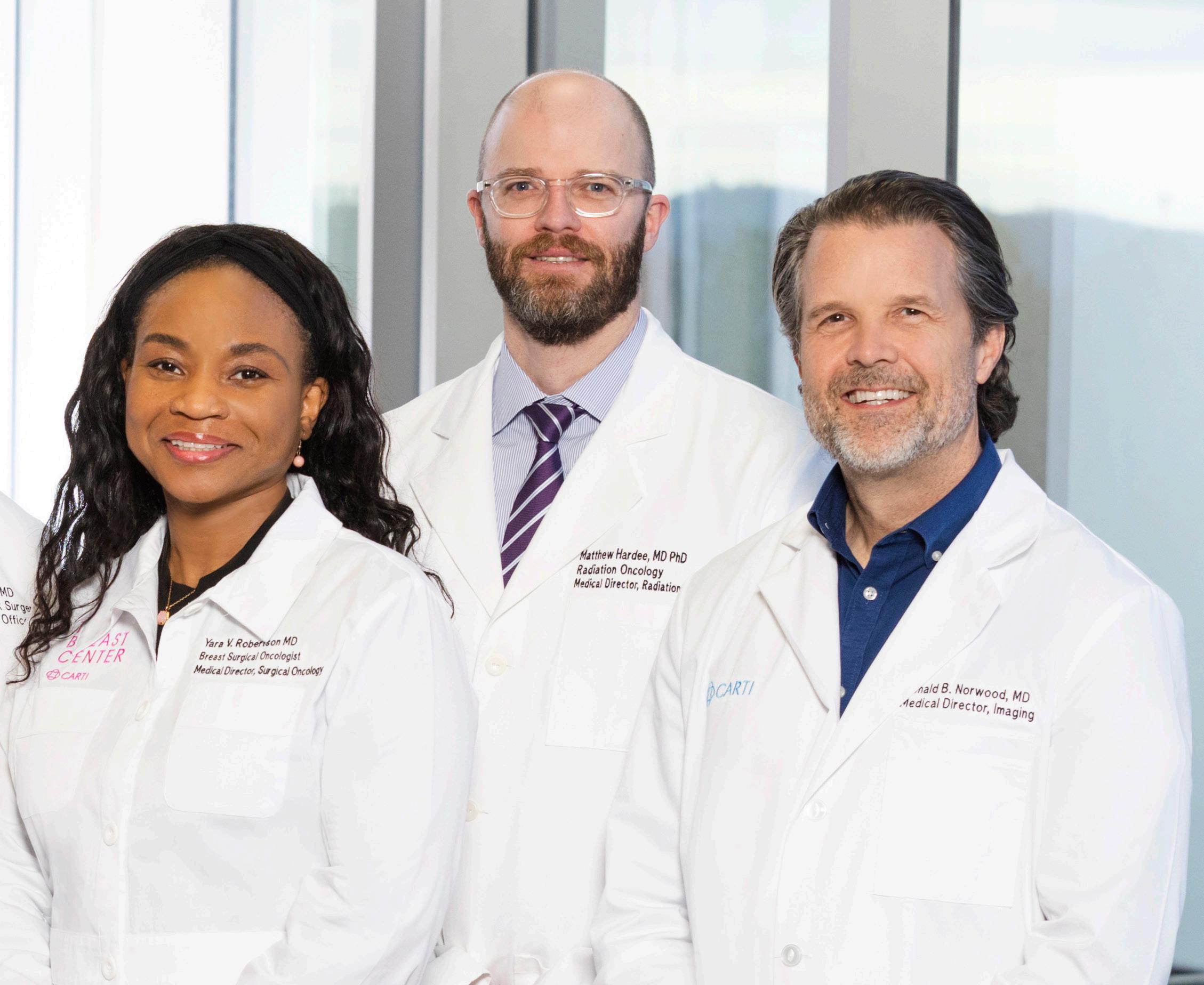
In addition to leading-edge, expert treatment, CARTI also prioritizes the human side of health care. The Bridge — CARTI’s recently completed resource and support center — helps patients and families deal with the myriad of fears and uncertainties that occur during any stage of a cancer journey. Patient navigators, counselors, advocates and facilitators provide direct resources, specialized workshops and a host of support services designed to improve quality of life for patients and their families. Areas of assistance include transportation, lodging, physical therapy, prosthetics and orthotics, massage therapy, patient mentorship, live cooking demonstrations, a salon and appearance center, numerous support groups, and more.
At CARTI, innovation goes hand in hand with compassion. Not everyone can handle such a strenuous field of work, but the team at CARTI is a special group, dedicated and called to serve Arkansans everywhere. No matter where, no matter how — people are CARTI’s purpose.

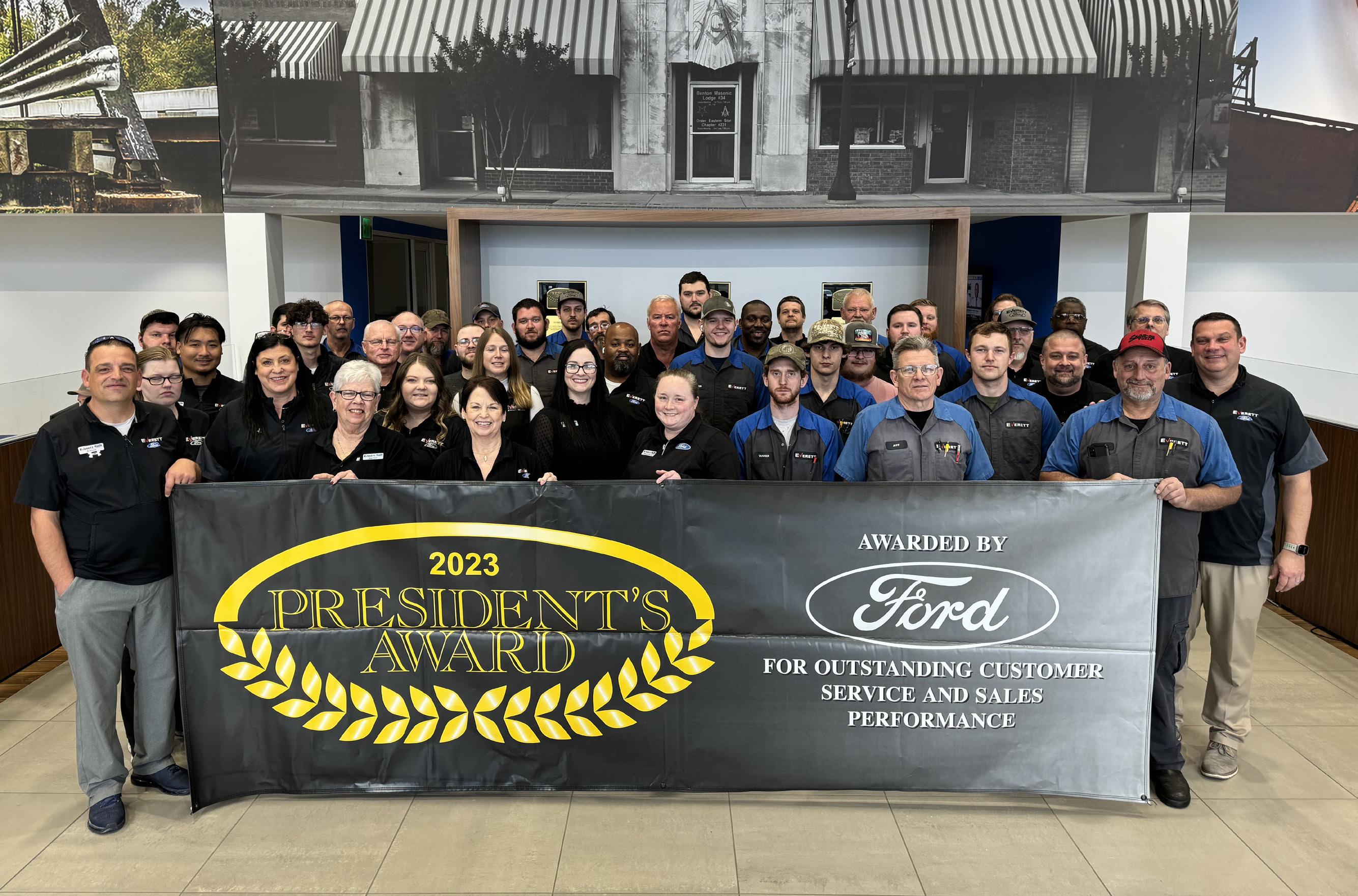
Everett Ford and Everett Buick GMC
How did your business get its start?
“Family Owned and Customer Friendly” is more than a phrase — it is the foundation of the Everett business. After working in the automotive industry for more than 30 years, Dwight and Susie Everett founded the Everett Automotive Group in 2006 with their sons-in-law, Chad Hendrix and Brandan Hudspeth.
The group expanded to northwest Arkansas through the purchase of another Buick GMC dealership in 2008, followed by impressive growth and the purchase of Chevrolet and Chrysler Dodge Jeep Ram dealerships. The group added three additional dealerships between 2014 and 2017, including two in north Texas.
In 2018, following the sale of the group’s three northwest Arkansas locations, Everett purchased the Chevrolet dealership in Saline County. Less than 12 months later, the group followed that up with the purchase of the county’s Ford dealership. After divesting its Texas dealerships,
Everett rounded out 2019 with four locations. In early 2021, Volkswagen of America awarded Everett an open point in Rogers, and that dealership opened in November 2022.
What are the keys to your success?
Our success starts with our employees, who believe in and work for our mission daily. The goal of our business is to lead the industry in both sales and service by building lasting relationships and keeping customers at the center of all that we do.
Our customers continue to return year after year for their next vehicle purchase. We are grateful for the support of this community over the past 15 years and into the future as we eagerly provide our family-owned, customer-friendly service here in central Arkansas.


What is the most important thing you do for Arkansans?
Everett has been committed to giving back and improving the communities we have the privilege to serve since our beginning in 2006. We are proud to support local community events and organizations every year.
One of the ways Everett serves the communities in which we operate is through the giving of our time and resources. Each year, our team donates countless hours of their time in community service work — from volunteering in local schools to fundraising events and serving on nonprofit boards and committees. We understand that being customer friendly means being a part of the community, and that is a responsibility we take seriously.
Everett also supports many worthy causes through financial contributions. Wherever someone is working to make a positive difference in our communities, we are honored to support and work alongside them.
What have been your organization's proudest accomplishments?
Everett dealerships have been honored to receive many awards and recognitions, but the proudest accomplishments come from our customers. Everett has been the only General Motors dealership in Arkansas to receive the GM's Dealer of the Year award for customer satisfaction. The dealership has received the award 14 times for GMC and eight times for Buick.
Everett Ford is one of the select few Ford dealerships in this region to receive the Ford President’s Award, and the dealership has attained this recognition each year it was eligible. This award is one of Ford Motor Co.’s most prestigious awards and it recognizes the top-performing Ford dealerships for achieving the highest level of customer satisfaction in both sales and service.
Pictured: Dwight and Susie Everett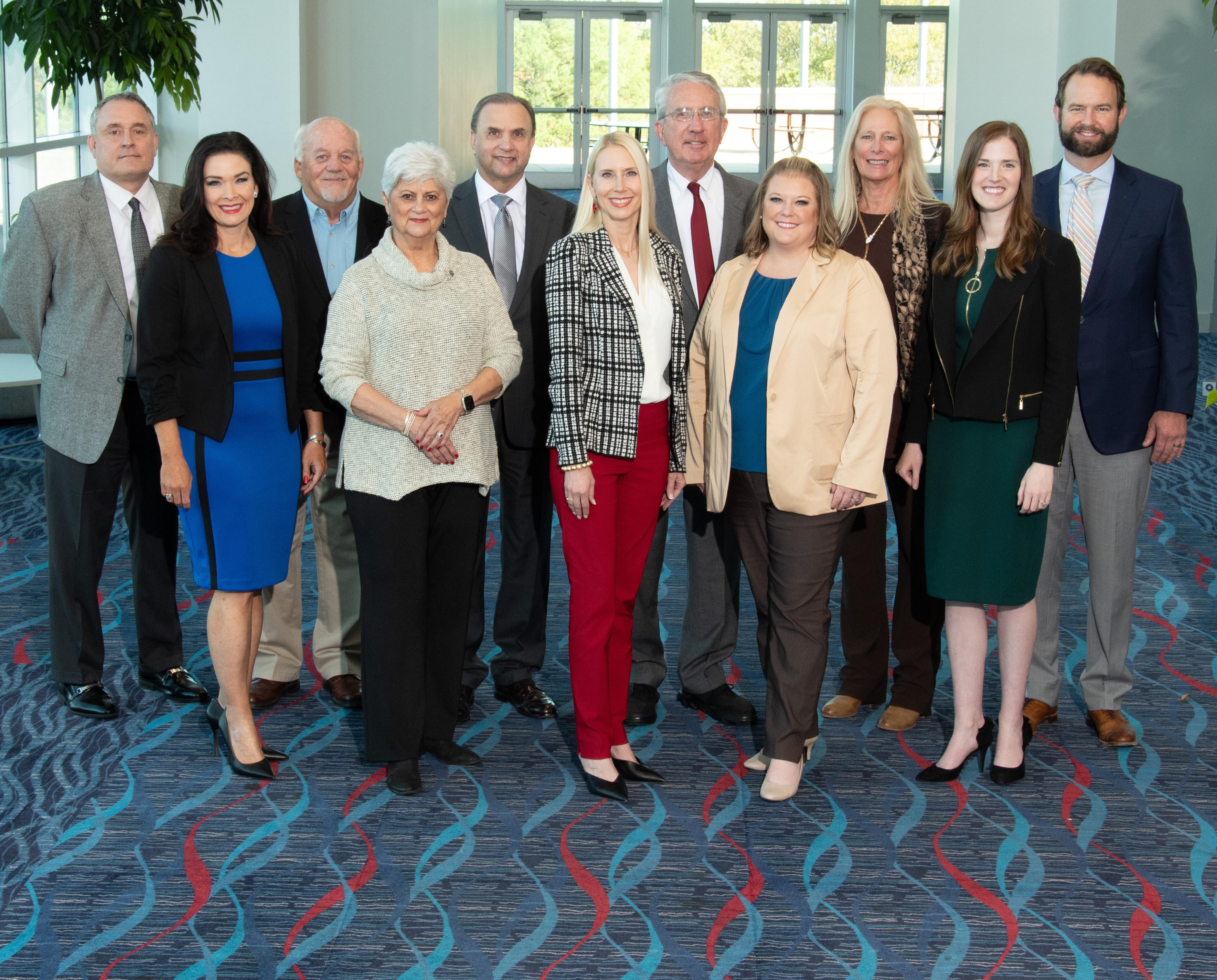
As the predominant advocates for Arkansas business and industry, the Arkansas State Chamber of Commerce and Associated Industries of Arkansas act in tandem to improve the business climate, increase economic opportunity, and promote and defend free enterprise in Arkansas.
By working alongside industry leaders, community partners and elected officials, the State Chamber/AIA seeks to bridge the gap between its members and the state Capitol. The legislative changes championed by the State Chamber/AIA over the past decade alone represent hundreds of millions of dollars in taxpayer savings for employers and employees alike.
The State Chamber/AIA also advocates on behalf of business and industry through its affiliated organizations and programs, such as the Arkansas Economic Developers & Chamber Executives, the Arkansas Institute for Performance Excellence, and Leadership Arkansas. The AIA’s workforce initiative, Be Pro Be Proud, currently operates within six states across the nation. Plus, Be Pro Be Proud has made more than 2,000 tour stops impacting nearly 400,000 students nationally.
For nearly a century, the State Chamber/AIA have served members by influencing policy decisions and driving forward the shared goal of economic prosperity throughout Arkansas. At the State Chamber/AIA, business matters because people matter.
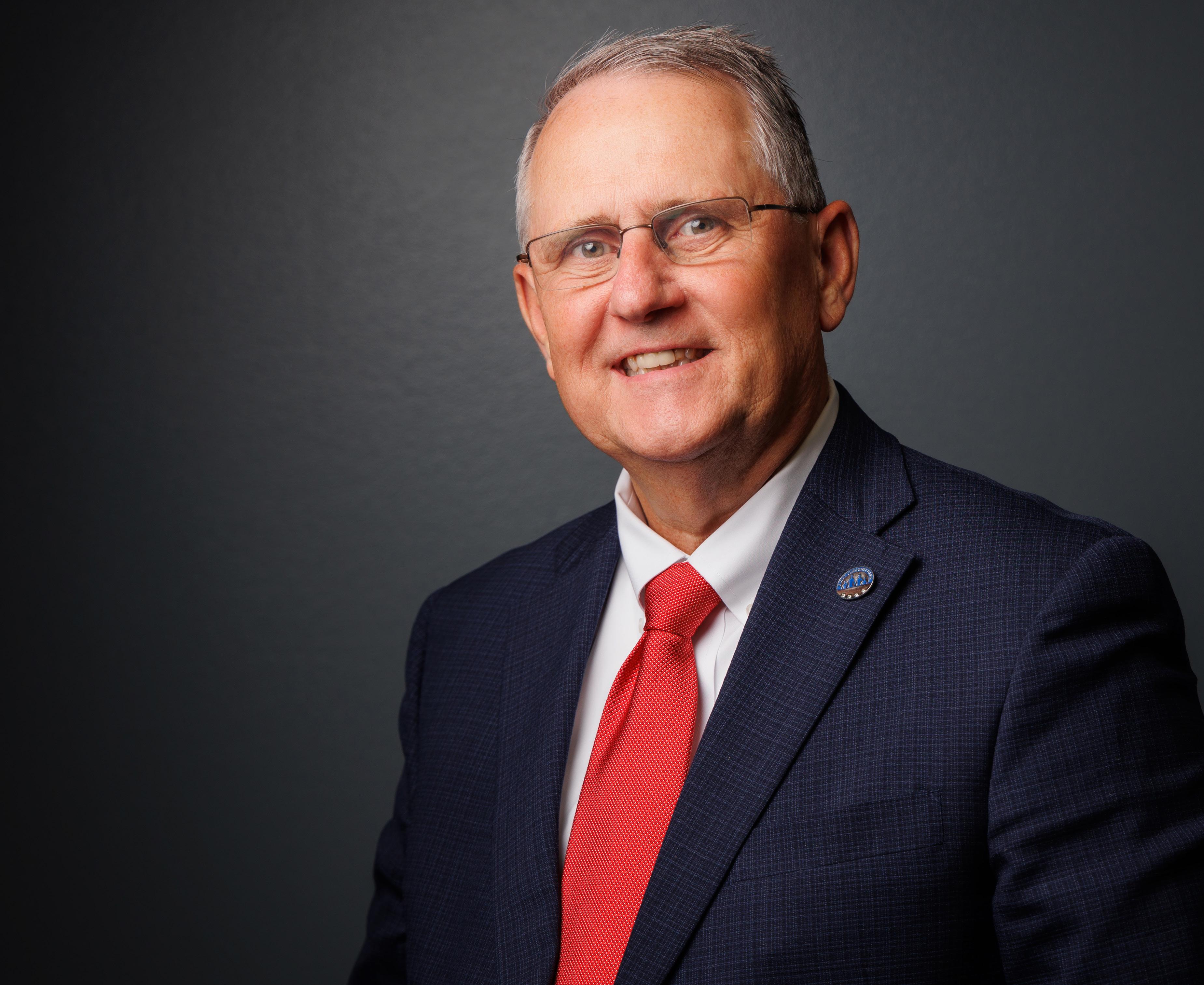
How did you get started in banking?
I began my career 42 years ago after working part time for a local community bank in Batesville while I finished my second degree at Arkansas State University in Jonesboro. I realized it would be a great career that would allow me to help people and businesses achieve their financial goals and help the community that I was raised in be a great place to live, work and raise a family.
What is the most important thing you do for Arkansans?
The most important thing we do for Arkansans is provide them with the financial tools and resources they need to achieve their goals and build a secure future for themselves and their families. We make investments in each of the communities we serve and where our customers live.
What are you most proud of when it comes to your work?
I’m most proud of the relationships we’ve built with our customers and the impact we’ve had on our communities. Seeing our customers succeed and knowing that we played a part in their successes is incredibly rewarding.
What sets First Community Bank apart from its competitors?
Our employees are the cornerstone of our organization, and we consider them our most valuable asset. We take pride in our exceptional team of professional community bankers, who are like a family. What distinguishes us is our belief in cultivating relationships, not just executing transactions. This principle is evident in all aspects of our work.
First Community Bank • firstcommunity.net
First Community Bank
Pictured: Boris Dover, President and Chief Operating Officer
What is your mission?
Our mission at Pinnacle Advisors is to assist small business owners and their families in achieving their financial potential. We believe that this can be achieved by helping our clients develop strategies based on established best practices, along with innovative ideas and a focus on maintaining ethical standards that everyone can be proud of.
What sets you apart from your competitors?
Pinnacle Advisors takes a proactive, client-centric approach to navigating all aspects of financial planning. Our goal is to continuously evolve and adapt our services to meet changing market conditions, regulatory requirements and client needs. We believe that every client faces a unique set of circumstances which requires a customized approach.
What has been your organization’s proudest moment?
Our business gets to have a front-row seat for all our clients’ wins. Sometimes it’s a successful retirement, a business exit or overcoming a particular challenge, but each time we get to celebrate one of those wins with a client, it’s a really special moment for us.
What is the most important thing you do for Arkansans?
We invest in Arkansas. At the core of our business, we strive to utilize resources that directly benefit our state.
What are your organization’s goals for the next few years?
We are blessed to have experienced tremendous growth over the last 10 years, and we look forward to continuing to grow. We have a clear vision of who we are and what we offer, and we look forward to being able to work with an ever-growing list of clients.
Pictured: Victor Werley, Partner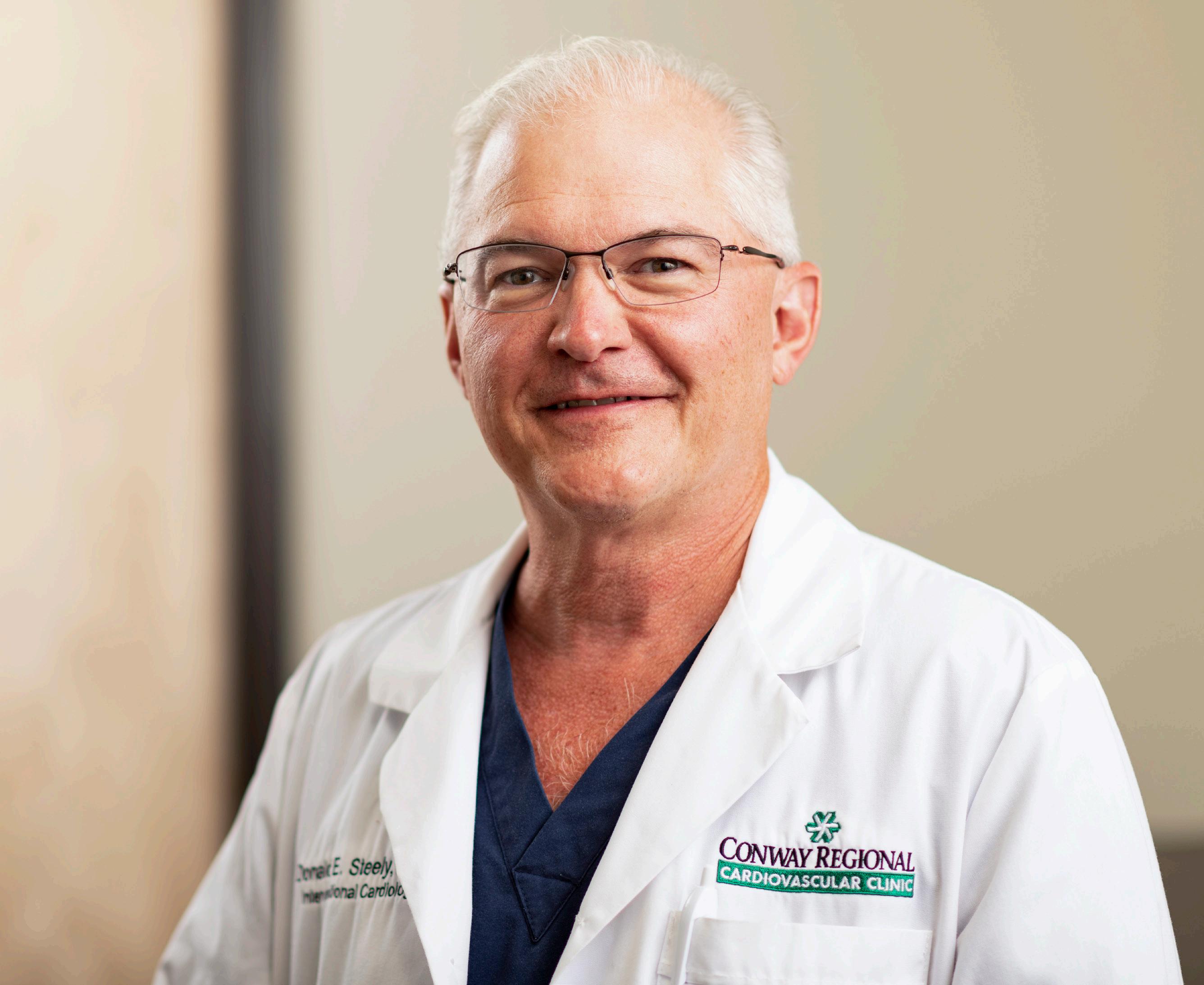
What is the key to your success?
The key to the success of our heart team is delivering the best possible emergency cardiac care to Conway Regional Health System patients, resulting in the fastest emergency care. On the personal side, I have been blessed to have a job that I love. There is nothing that I would rather do than practice interventional cardiology in Conway.
What is the most important thing you do for Arkansas?
We are continuing to work to expand our outstanding cardiac team. We have three other talented interventional cardiologists in Rimsha Hasan, M.D., Yalcin Hacioglu, M.D., and Ronak Soni, M.D. This is the most caring and amazingly talented staff and team of doctors I have ever worked with.
What are your goals for the next few years?
My goal is to continue to expand the cardiac program’s outreach into the community by continuing to grow our services, staff and physician team into communities such as Clinton, Dardanelle, Russellville and Greenbrier. Thanks to the Conway Regional primary care network, we are able to achieve those goals.
What all do you do?
I serve the community in several ways. I’m the doctor on the sidelines for Greenbrier High School, and I’m part of the sports medicine team for the University of Central Arkansas and Hendrix College [both in Conway]. I help teach the cardiac portion of the master’s level athletic training program at UCA. I am also part of the team that has helped integrate Pafford Emergency Medical Services into the Conway community.
Pictured: Don Steely, M.D., Interventional Cardiologist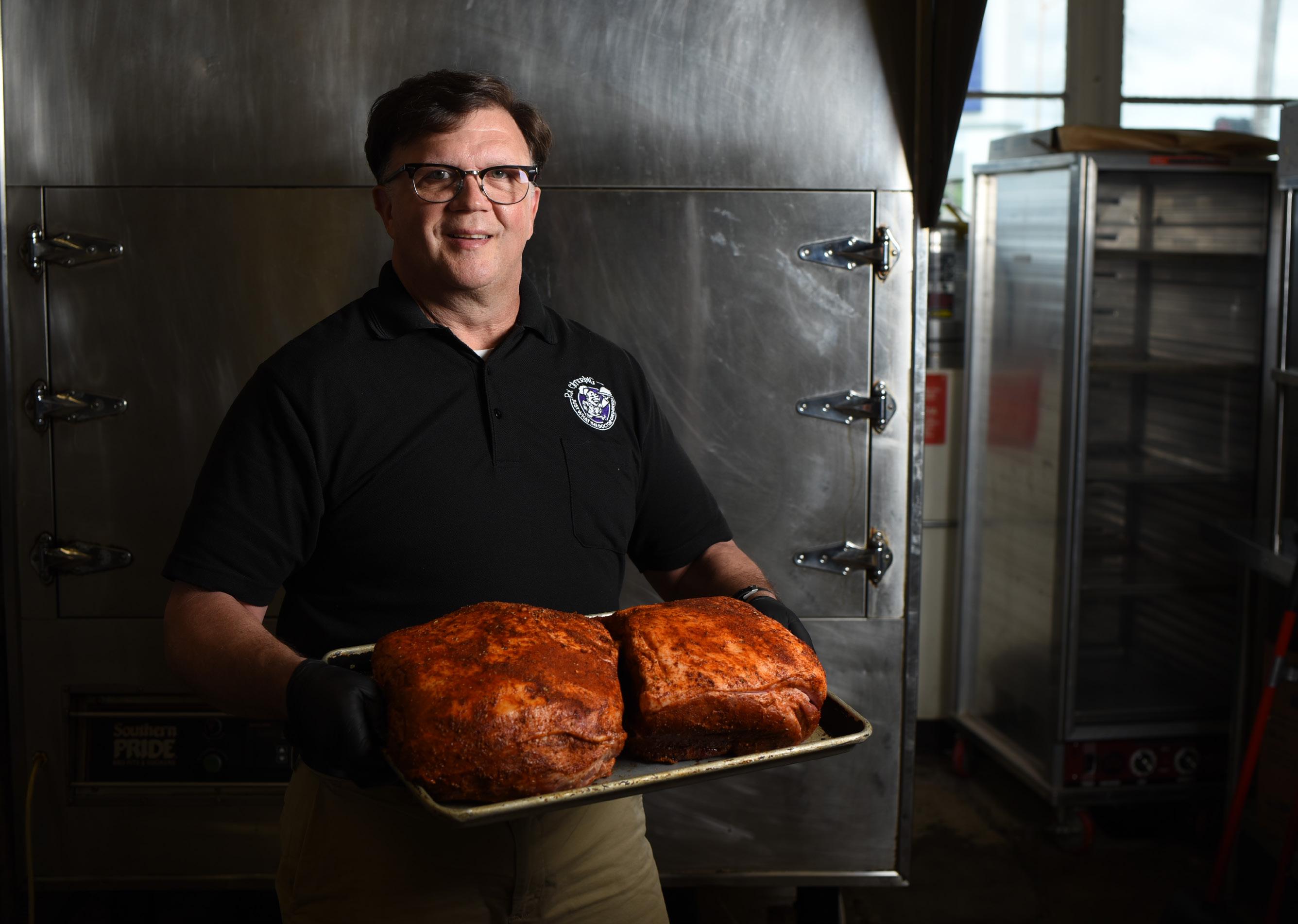
What is the history of your business?
In 1994, we started New York Bagel & Deli. While this was primarily an indoor breakfast and lunch hot spot, our catering business began to grow. Our first catering customers were, as one might guess, pharmaceutical sales representatives. This evolved into a robust catering business which we fully embraced and thus reinvented ourselves into what is now Rx Catering.
What is the key to your success?
I have always believed in providing a great customer experience. From browsing our online menu to requesting quotes for large events, my desire is for the customer’s experience to be an enjoyable one that results in repeat business. The three keys to our success are great food, strong customer relationships, and a fun and positive work culture.
What sets you apart from your competitors?
Unmatched customer service. In addition, our business model is structured so that work hours are flexible, and we always entertain any and all catered events, regardless of the day, location or time.
What has been your organization’s proudest accomplishment?
I would have to say it was when Rx Catering was chosen for the Arkansas Enterprises for the Developmentally Disabled Champion for a Cause award.
What is the most important thing you do for Arkansans?
By far, it has been our ability to give back to the community by supporting various nonprofits, such as Lessons for Life, Miss Arkansas, Arkansas Enterprises for the Developmentally Disabled and the Women’s Foundation of Arkansas, among several others.
Pictured: Jay Ramsey, Owner


How did you get started in this business?
In 2003, I was introduced to a gentleman in North Little Rock who owned a company called Harvey Gene’s Carpet Clean, which was a nationally known carpet cleaning brand. My mom and aunts used this product all the time, and I recognized it as the industry standard from a young age. I found out that there was an opportunity to purchase the business. After some research, we did a little tweaking and came up with what we believe to be the best pet stain and odor remover on the market.
What is your product, and what sets you apart from your competitors?
Our product is an environmentally friendly pet stain and odor remover that requires no water, soap or abrasives. This is a biodegradable, spray-and-wipe no-rinse cleaner that leaves no residue. So many products on the market today mask odors or just lift stains to a surface level. Our product goes a step beyond that.
What kind of success have you had so far?
We have been in over 1,800 Walmart locations, have won awards on QVC and have been featured on HSN. We are currently selling online and at Drug Emporium in Little Rock.
What kinds of challenges have you faced as an entrepreneur?
Dealing with corporate America is brutal, and you lose the personal connection with your customer base. We have taken great joy in doing business with locally owned companies over the last few years and really getting to know who is using our products. I have come to the realization that people are more likely to be a returning customer when they like the service just as much as the product.
— Blaine Freeman, owner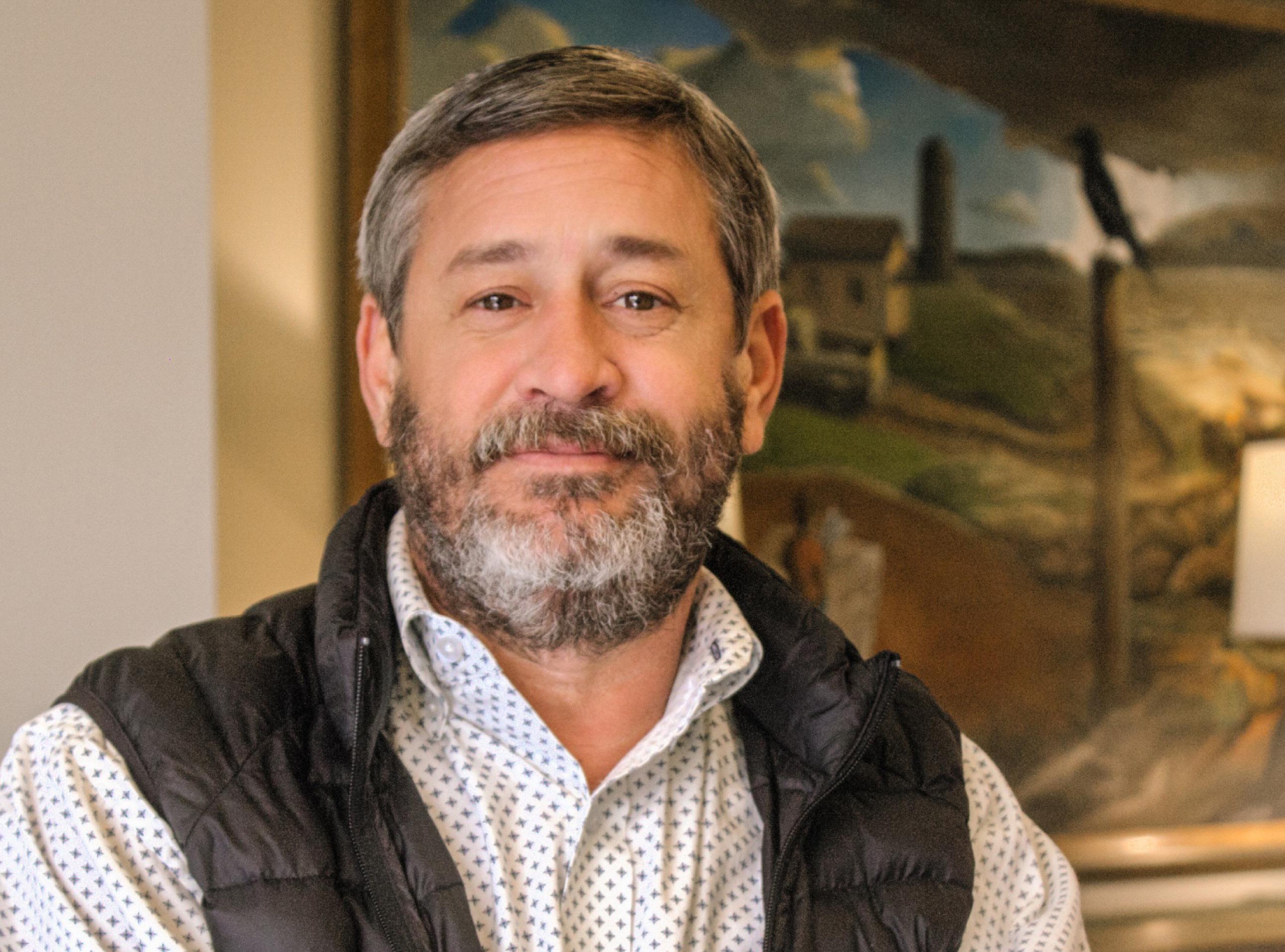
What are the keys to your success?
The key to success for Gary Houston Electric involves a combination of factors — quality, professionalism, integrity, innovation and employee development — along with a dedication to continuous improvement and adaptability to changing market conditions and customer needs.
What sets you apart from your competitors? Our expertise and experience, quality of workmanship and customer service are what truly set us apart.
What has been your organization’s proudest accomplishment?
Our longevity and growth over more than four decades, as well as seeing all our team’s successes and achievements throughout the years.
How is your company facing industry challenges? The shortage of skilled laborers in the electrical industry has made it difficult to find qualified workers. Supply chain
disruptions have been another huge challenge. We’ve faced material shortages and price fluctuations that impacted project timelines and costs, but we are proactively addressing these challenges and adapting to changing industry trends.
What qualities are most important in your industry? Adaptability, technical proficiency, problem-solving skills and good customer service.
What is the most important thing you do for Arkansans?
The most important thing that Gary Houston Electric does is provide essential electrical services that contribute to the safety, comfort and functionality of homes, businesses and communities throughout the state.
What are your organization’s goals for the next few years?
Expansion of services, continued employee development and customer satisfaction.
Pictured: Keith Weeks, president and co-owner
Tell us about the history of your business:
Headquartered in Little Rock, Moses Tucker Partners is an industry-leading, full-service commercial brokerage, property management and development real estate operation and one of Arkansas’s largest commercial brokerage and management firms. Established in 1985 by visionary entrepreneur Jimmy Moses, MTP has been instrumental in revitalizing downtown Little Rock and numerous urban cores across Arkansas and the mid-South region. With an impressive portfolio of more than $2 billion in development projects, including historic preservation, mixed-use properties, multifamily dwellings, retail spaces, offices and industrial complexes, MTP is a real estate powerhouse dedicated to passionately shaping the commercial real estate landscape with innovation and elite-level excellence.
What has been your organization’s proudest moment or accomplishment?
One of our most notable achievements is our instrumental role in revitalizing downtown Little Rock, particularly in the transformation of the River Market and East Village districts. This accomplishment is a testament to our commitment to revitalizing urban areas and fostering vibrant communities.
What is the most important thing you do for Arkansans?
MTP plays a crucial role in elevating the quality of life for Arkansans by spearheading projects that promote economic growth and enhance communities’ overall well-being. Our projects contribute to immediate improvements and often serve as catalysts for further investment and revitalization efforts, leaving a lasting and positive imprint on the state’s built environment and urban landscape.
What are your organization’s goals for the next few years?
Over the next few years, our organization aims to maintain its steadfast commitment to building sustainable developments across the mid-South region. We aspire to further expand our footprint while creating vibrant, sustainable and economically viable urban environments that will contribute to the region’s long-term well-being. Central to our success is our ongoing effort to recruit the most dynamic, well-educated and capable associates. We recognize that our achievements stem from hiring the best and the brightest and investing in their professional development. This proven approach continues to drive our success, making it an integral part of our winning formula.
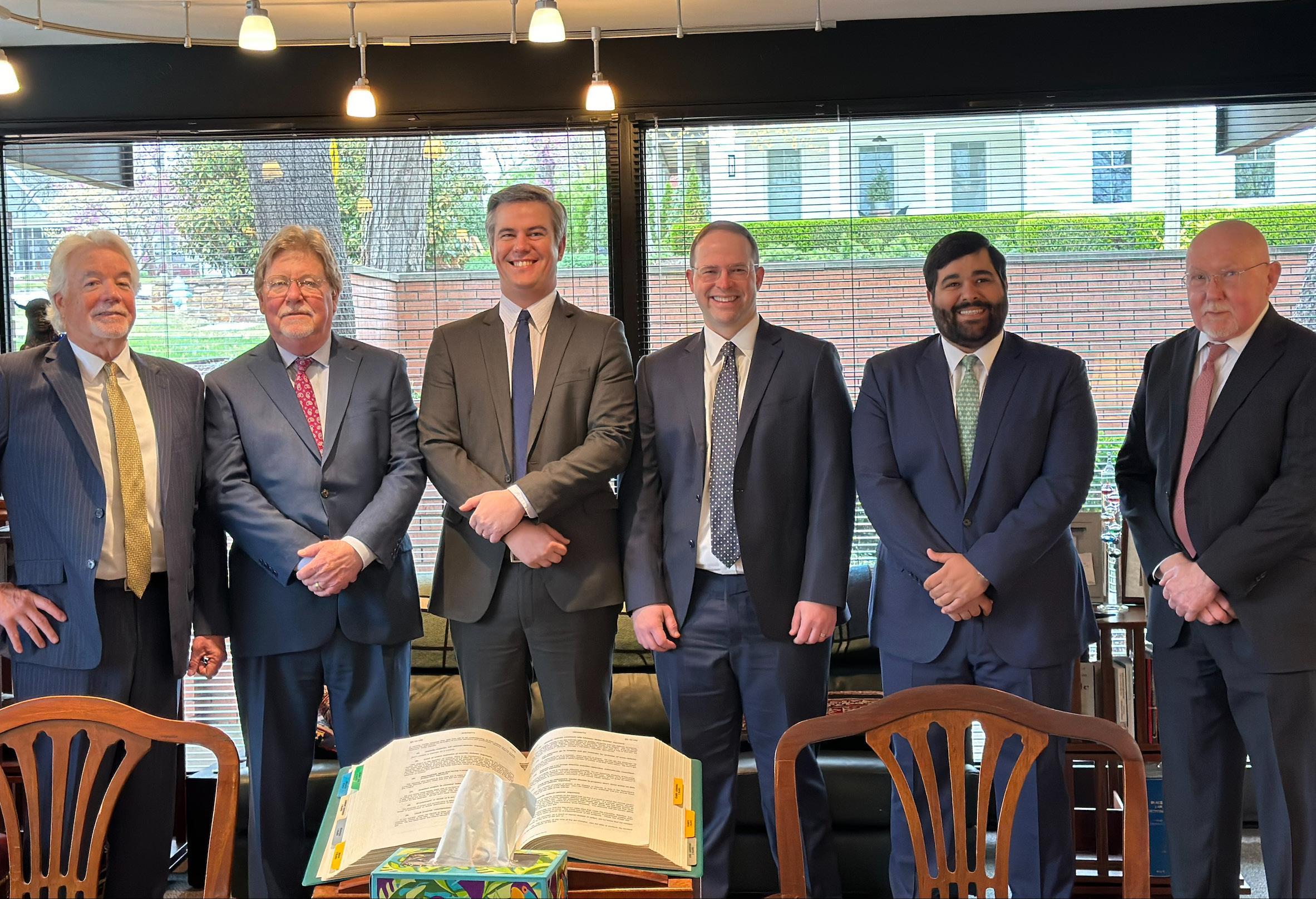
Fayetteville-based Taylor Law Partners prides itself on providing clients with aggressive, professional criminal defense representation. Founded by Michael Mashburn and W.H. Taylor more than 37 years ago, the firm stands apart for its longevity, commitment to excellence and resources. The firm’s current partners include W.H. Taylor, Terry Harper, Stevan Vowell, Chris Hussein, Ryan Jewell and Matt Benson.
Over the course of nearly four decades, Taylor Law Partners has litigated many complex civil and criminal matters to both juries and to the bench. The firm’s litigation practice ranges from capital murder defense to national independent counsel investigations, from complex white-collar matters to day-to-day criminal matters. The firm has been known for years as the go-to law firm for students of the University of Arkansas in Fayetteville who find themselves charged in both district and circuit courts.
Clients often hire Taylor Law Partners for its unparalleled counsel when it comes to resolving matters out of court or avoiding intense public scrutiny. The firm’s clients have included government officials, public and private organizations, individual lawyers, and many private citizens. The firm also handles a myriad of other legal matters, such as personal injury, domestic and family law issues, real estate, and more.
Taylor Law Partners is known for providing legal representation grounded in truth and common sense with a combination of empathy, honesty and a strong work ethic that spares no details. The firm’s goal is to continue to provide that sound legal advice, especially since the Arkansas legislature has recently passed new parole eligibility rules that will make the selection of an experienced criminal defense lawyer even more crucial.
Clients who refer their friends and family to Taylor Law Partners can rest assured that their loved ones’ rights will be protected and that they will receive their day in court. Oftentimes, the proudest moment for any member of the Taylor Law team is when a client shakes their hand and says, “Thank you for giving me back my life.”
Pictured: Terry D. Harper, W.H. Taylor, Matt Benson, Ryan Jewell, Chris Hussein, Stevan E. Vowell.
What is the key to your success?
At the heart of Harbor’s success lies an unwavering commitment to its mission: integrating cutting-edge technologies and ideas into every phase of design, construction, operation and maintenance for our clients. This commitment, coupled with a deep-rooted belief in promoting environmental and social stewardship, ensures that sustainability is woven into the fabric of every project design and our own business practices.
What has been your organization’s proudest moment or accomplishment?
Securing the title of Arkansas’ Best Places to Work in 2021 and being nominated again in 2022, as voted on by our staff, not only validates our commitment to our employees but also underscores the dedication they bring to our clients. As we strive to create an exceptional workplace, they, in turn, deliver outstanding service to our clients.
How is your company facing industry challenges?
Like most industries, one of the biggest challenges is talent acquisition and retention. Harbor continues to explore ideas of how to build paths for our employees as our goal is to have each grow and expand their skills without having to leave Harbor for other opportunities. We strive to do this through understanding and addressing diversity and transparency. As we grow and work to attract new and younger talent we know this plays a large role in joining a company.
What is the most important thing you do for Arkansans?
Beyond our professional endeavors, the staff at Harbor is actively engaged in various community initiatives, fostering partnerships with local organizations and serving in varying capacities. Our deep-rooted commitment to keeping Arkansas the Natural State has solidified Harbor’s reputation as a trusted partner. We collaborate with our clients both in state and across the globe to create a more sustainable and prosperous future for our state and its residents.
 Pictured: Leslie Davis, president and CEO, from left Tresa Adair, vice president of sustainability and digital solutions, and Andrew Rike, PE., vice president of engineering
Pictured: Leslie Davis, president and CEO, from left Tresa Adair, vice president of sustainability and digital solutions, and Andrew Rike, PE., vice president of engineering
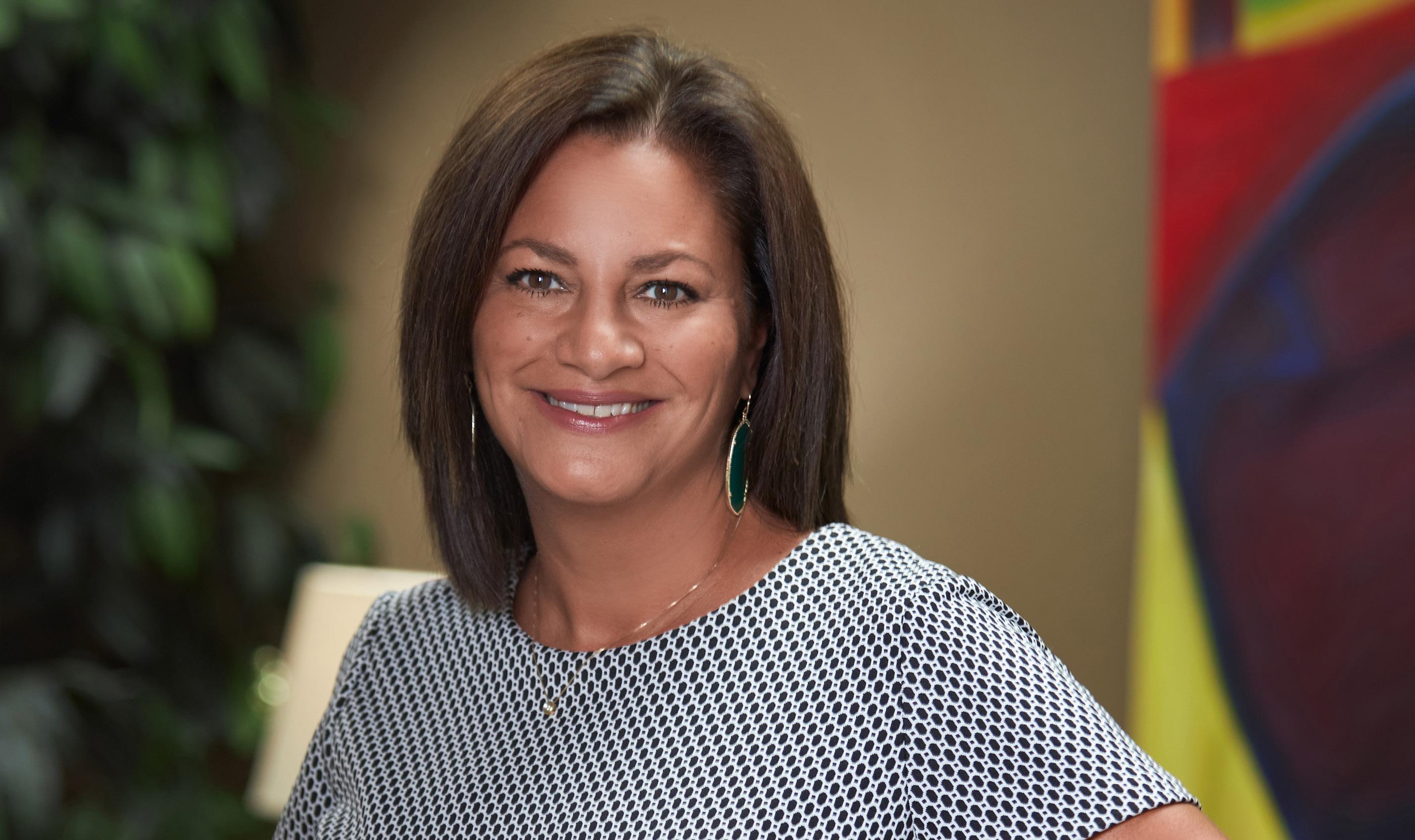
How did you get started in your industry?
I first entered the financial industry at Merrill Lynch after graduation. I joined the insurance industry in 2002, and I founded Paramount Financial shortly after with the goal of helping clients meet their retirement-planning needs. I hold licenses in Arkansas, Texas, Florida and North Carolina. Both my team and I take great pride in evaluating and assessing a client’s specific situation and making recommendations that are in their best interest, and we do so with integrity and transparency.
What are you most proud of when it comes to your work?
Working together with my team to give unparalleled service while at the same time ensuring my clients have a bright retirement future, to which I believe everyone is entitled.
What is the key to your success?
At Paramount Financial, our sole focus is the client. Since 2007, we have been working with friends and neighbors throughout Arkansas and beyond while understanding the importance of priorities, family, estate preparation and tax strategies to ensure confidence in the future. We are rooted in the community and have developed our business by creating close, personal relationships with our clients. My team and I strive daily to provide an exceptional customer experience. It is not our goal to meet a client’s expectations, rather to exceed them.
What sets you apart from your competitors?
Most people have a financial advisor, an insurance agent, an accountant, and an attorney. However, scarce are the places that exist which contain all. At Paramount Financial, our team of professionals can offer the following products and services: retirement income strategies, asset protection, annuities, life insurance, tax preparation, longterm care strategies, trusts, probate, charitable giving, IRA legacy planning, as well as wealth management.
What’s your favorite quote?
“A bird sitting on a tree is never afraid of the branch breaking, because her trust is not in the branch but on its own wings. Always believe in yourself,” by Charlie Wardle.
Tell us more about yourself:
I was born in upstate New York, grew up in Sherwood and attended the University of Arkansas, where I obtained my undergraduate degree and was a member of Pi Beta Phi sorority. I currently reside in central Arkansas with my husband, Matt, and our two children, Abby Rhea and Lilly. I attend the Cathedral of St. Andrew and have been active in volunteer work throughout my community for many years, including the 20th Century Club, the American Heart Association, the Dorcas House, the Little Rock Compassion Center, the Arkansas FoodBank, the Junior League of North Little Rock and Girl Scouts of America (troop leader), as well as my involvement with the girls’ school. I love traveling, gardening, music and Razorback football.
Pictured: Dawn Powell, Founder
LeafGuard of Arkansas was established in 2001 as a local, family-owned contractor business to bring the LeafGuard gutter system to Arkansas. The LeafGuard gutter system is the only one-piece covered gutter system available on the market and provides the ideal solution for keeping leaves and debris out and eliminating the hassle of clearing out clogs. The patented one-piece aluminum system allows water to flow seamlessly into the gutter while simultaneously shielding it from leaves overhead.
At LeafGuard of Arkansas, the key to success lies in its experienced team of gutter experts. The average tenure of one of its estimators or installers is more than a decade, giving staff a deep understanding of Arkansas homes and the LeafGuard system.
“Our mission is to help homeowners protect their homes,” said Bradley Wright, president of LeafGuard of Arkansas. “We do that by providing the best one-piece covered gutter system available in the market and using trained and experienced employees to assure the best installation for the home.”
An important aspect of gutter protection is a solid warranty, and LeafGuard’s lifetime clog-free warranty and excellent service ensure that a LeafGuard system will protect a customer’s home for years to come. Come bad weather and changing seasons, LeafGuard of Arkansas guarantees the satisfaction of a clog-free gutter.
7800 Counts Massie Road, North Little Rock • 501-664-5400 • leafguardandmore.com
LeafguardOfArkansas
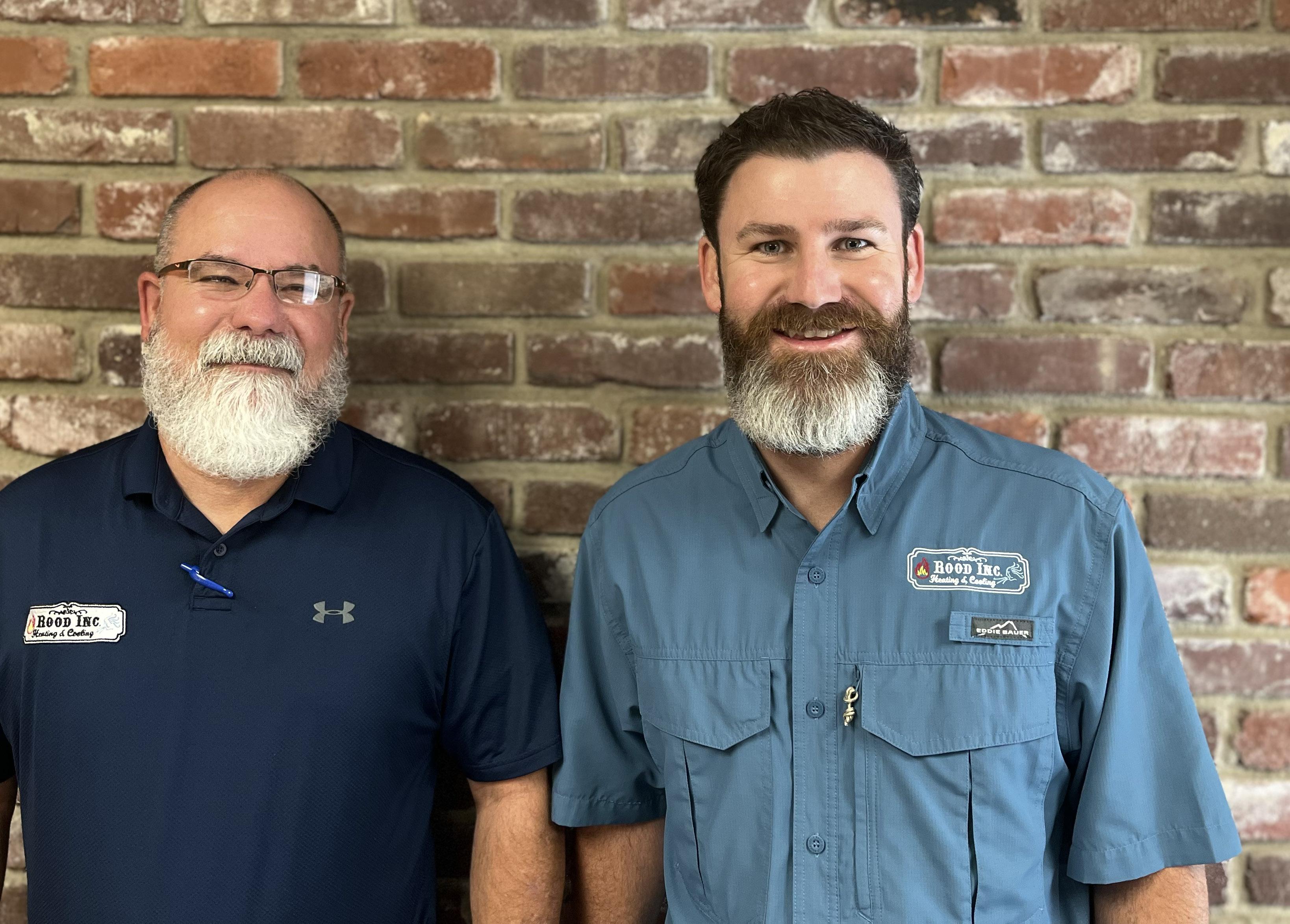
For nearly seven decades, Rood has served Arkansas and the River Valley. After being hired to dig plumbing ditches at Arkansas Tech University in Russellville in 1955, founder Fred Rood incorporated the business and built a foundation that would last through four generations of the Rood family: Fred, Freddie, Eddie and Preston. At least one of the family members oversees each job to be certain all jobs are performed to the highest standards possible.
Rood offers a wide range of products and services, from geothermal heating systems and plumbing to heating and air conditioning system sales and service, as well as installations and repairs. The company has a full-service department of highly trained technicians and offers service seven days a week, as well as emergency service, on all brands of equipment.
“We do what we say, and we give our honest opinion when asked instead of trying to push a sale on to a customer,” Preston said. “This has brought many customers back to us. For example, there are many heating and air systems sold that are not proper for the home size. This results in inefficiency and higher monthly energy bills, and it affects the comfort of the entire family.”
Rood’s legacy hinges on providing “dependable service you can trust,” and the company prides itself on performing every job, large or small, with a consistency and integrity that cannot be beaten, creating more loyal customers for generations to come. Ask about Rood’s “Happy Home Club” for big savings on home services in 2024.
Pictured: Eddie Rood, left, and Preston Rood
Tell us about the history of your business. For more than 100 years, Conway Regional has provided high-quality, compassionate health care by offering innovative services, introducing new specialists and expanding access to care. From primary care to times when specialty care is needed, our world-class providers are here to care for north central Arkansas, central Arkansas and the River Valley. We have overcome significant challenges during our lengthy history, such as responding to the care needed after tornadoes, floods and man-made disasters. Conway Regional Health System provides complete health care services to an eight-county service area of north central Arkansas and the River Valley, including Cleburne, Conway, Faulkner, Johnson, Perry, Pope, Van Buren and Yell counties. Centered on a 180-bed acute care medical center, the health system provides patients with a variety of services, including heart health, orthopedic care, neuro-spine surgery, vascular surgery, gastroenterology services, women’s
health, and surgery and rehabilitation. Conway Regional operates an expansive physician enterprise, including 10 primary care clinics and 17 specialty clinics.
What is your mission?
Conway Regional’s mission is to be accountable to the community and to provide high-quality, compassionate health care services. Our team’s work ethic and sense of calling motivate us to care for others despite the difficulty of the job.
What are your organization’s goals for the next few years?
Recruit and engage a highly skilled team to provide highquality, compassionate health care services. We want team members who share a vision and values with us and can achieve more with us through that sense of connection than they ever could outside our organization.

How did you get started in your industry?
My dad started his insurance agency in Oklahoma when I was five years old. I started with Merrill Lynch in Tulsa, Oklahoma, 28 years ago.
What is an alternative path you might have taken if things had played out differently?
Believe it or not, I almost didn’t go to college so I could start a sod farm on my family’s farm. I had the perfect name picked out too: Hod’s Sod Farm.
What is your mission?
The State Farm mission is to help people manage the risk of everyday life, recover from the unexpected and realize their dreams. As an agency owner, I am 100 percent aligned with that mission. It’s going to sound simple, but State Farm truly wants their agents to act as “a good neighbor.”
What sets you apart from your competitors?
I am hands on with my leadership style and with my customers, and I am always available to talk and assist with
products and coverages. State Farm is the largest provider of auto and home insurance in both the United State and in Arkansas. That gives us an advantage with name recognition and financial strength.
What are you most proud of when it comes to your work?
This profession allows you to help many customers in many ways. From delivering a life insurance check to a young widow with children to assisting a person who just lost a house due to fire or tornado to helping people set up savings and retirement plans to ensure their financial security, all of it makes me take pride in my work.
What kind of challenges is your industry facing?
Post-pandemic and inflationary forces have put tremendous pressure on pricing the insurance products adequately. Prices in both auto and homeowners’ insurance policies have increased at a faster rate than customers expected.
In 2023, the insurance industry paid out over $21 billion on just 10 storms nationwide.
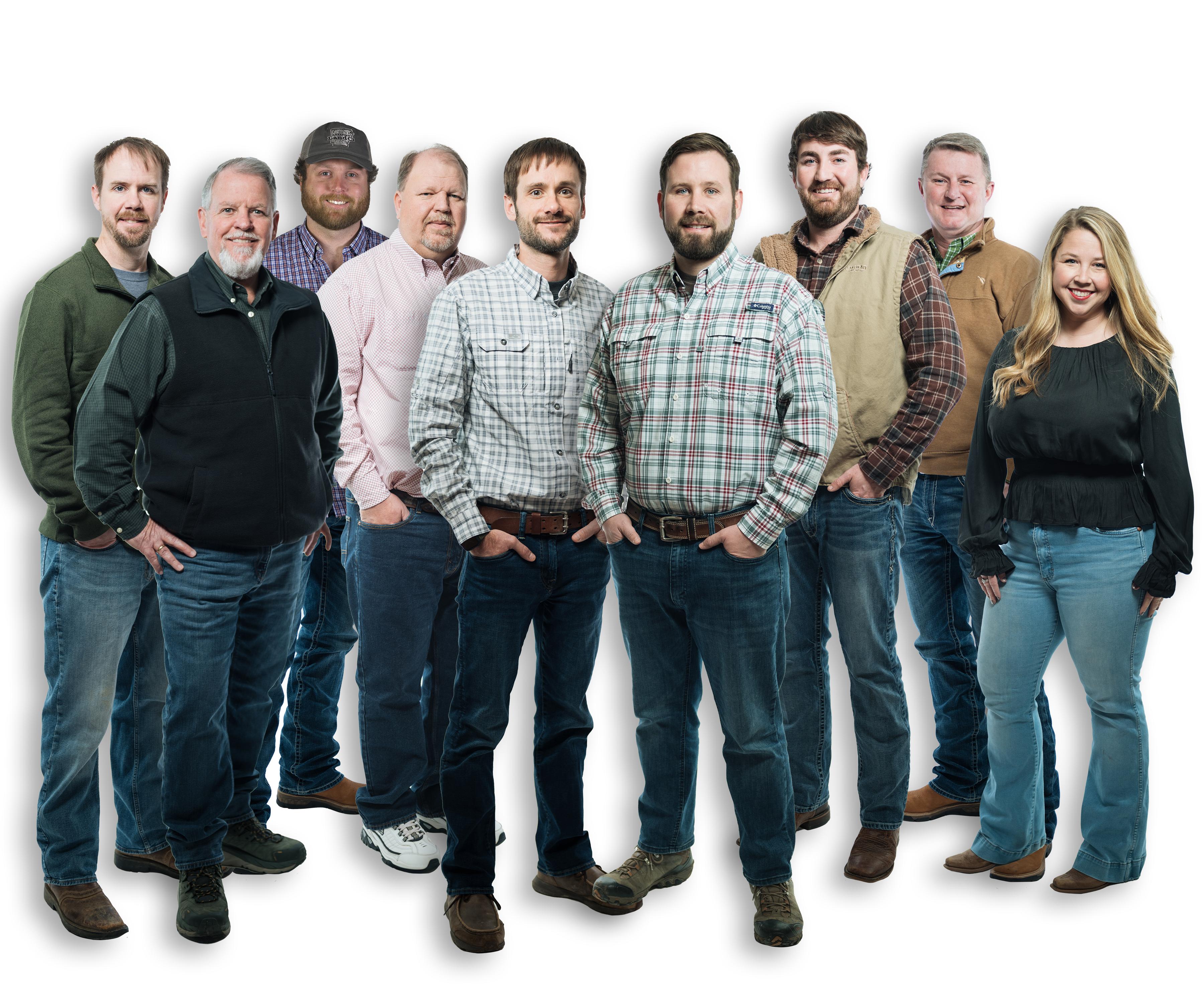
How did your business get its start?
Arkansas Land Co.’s roots date back to 2005, when Fred Eason and Bob LaRoche needed someone to both fulfill their land management needs for their personal holdings as well as expand their real estate portfolio. That was the beginning of Delta Land Management Co. We operated under a national franchise until January 2024, when the owners felt it was time to rebrand into our own local company focusing on Arkansas real estate. After all, Arkansas is our home, and land is our business.
What is the key to your success?
Arkansas Land Co. is more than just a real estate firm; it is a true partner invested in the success of clients in both agricultural and recreational landscapes. While it often requires more effort on the front end, we find that when we treat our clients with the utmost respect and help them find the property that truly meets their needs, they are more likely to do business with us again in the future.
What sets you apart from your competitors?
In conjunction with our client-first focus, Arkansas Land Co. is composed solely of brokers and agents who are outdoorsmen, farm managers, biologists and landowners. They understand Arkansas lands by living the lifestyle themselves and being directly involved in all the segments of real estate the Natural State offers.
What has been your organization’s proudest moment or accomplishment?
While it would be easy to promote large sales or an impressive total sales volume, our proudest moments stem from watching our clients consistently find success, whether that be in meeting financial goals on an investment grade farm, receiving a text image of child harvesting their first duck, deer or turkey on a property we helped them acquire, or a picture of a seller with a huge smile on their face from a successful hunt of their own.
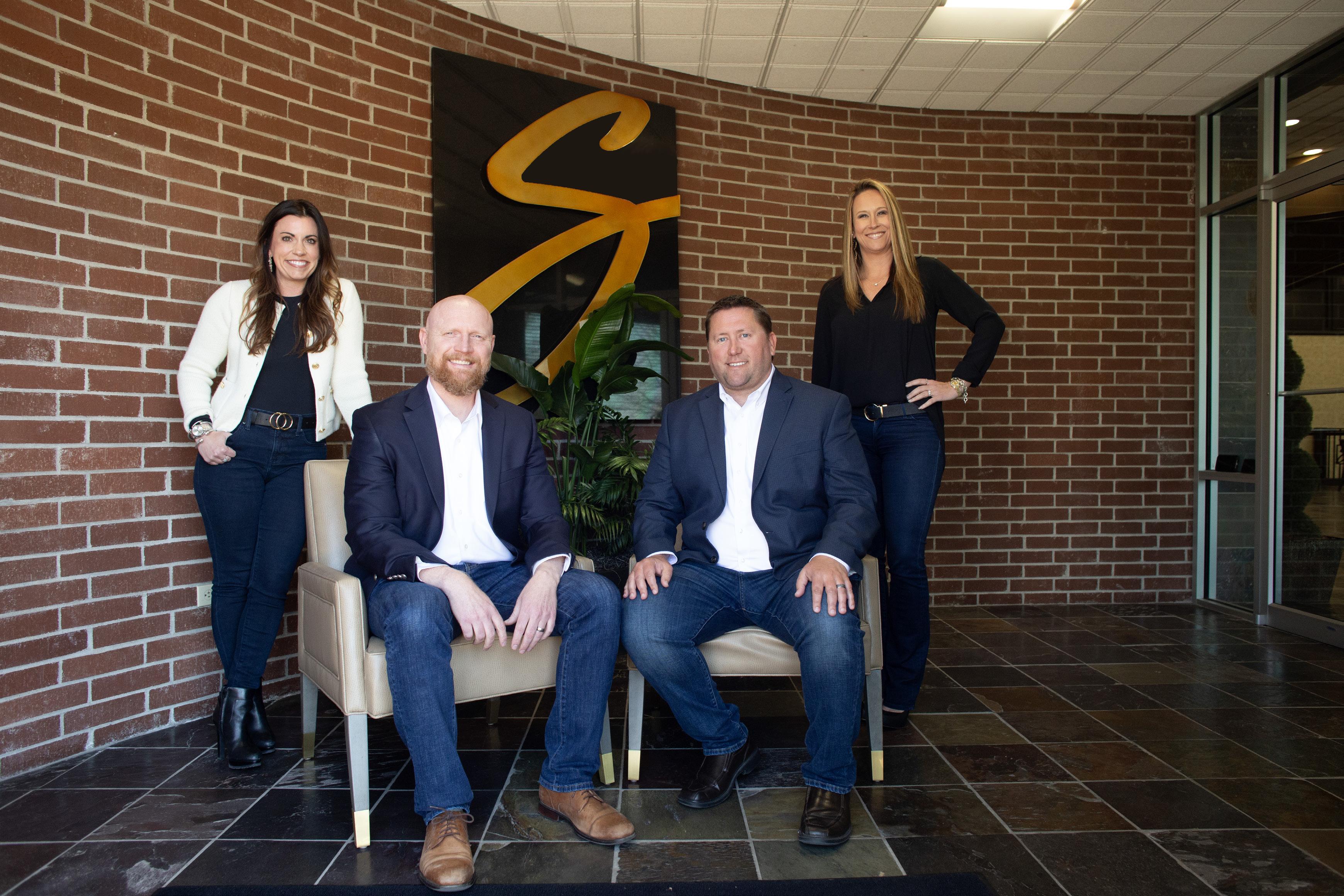
What is your mission?
We strive to become the premier community bank in the state by delivering exceptional financial services and actively supporting the growth and well-being of the communities we serve. We’re a locally grown, ground-up operation and a refreshing change from a big, impersonal bank. At Signature, we bank in blue jeans, creating an atmosphere where clients do not feel intimidated and can believe they have a true partner.
What has been the proudest accomplishment of your organization?
Every small business our bank has grown with and had the opportunity to witness mature into thriving, profitable enterprise is an accomplishment to us. The collective faith our customers have in us has built a billion-dollar bank that is poised to continue to enhance the lives of those in our community for years to come.
What are your organization’s goals for the next few years?
We have recently made significant financial investments across communities in Arkansas with new locations in
Jonesboro and Harrison, as well as Banco Sí in downtown Rogers and soon to be in downtown Springdale. We plan to grow our presence in each of these new communities, as well as the established communities we’ve served for years — Fayetteville, Springdale, Rogers, Bentonville and Brinkley — through our personalized brand of high-level customer service. We’ve also invested in creating a back-office team at our headquarters that gives us a tremendous opportunity for growth without adding meaningful labor cost.
What else should people know about you?
This quartet of C-suite executives has been on a journey together for nearly two decades, dating back to the very inception of Signature Bank of Arkansas. One or two of us even went to the store to buy the first trash cans for our fledgling office. We have a unique, unwavering commitment to our work, to each other and to the communities we serve. We four in particular have grown up together in Signature through plenty of highs and lows, with a shared vision for the future and a shared dedication to long-term success.
Pictured: Alexandria Gladden, COO; Brant Ward, President; Jeff Maland, Chief Risk Officer; Crandall Streett, Chief Administrative Officer
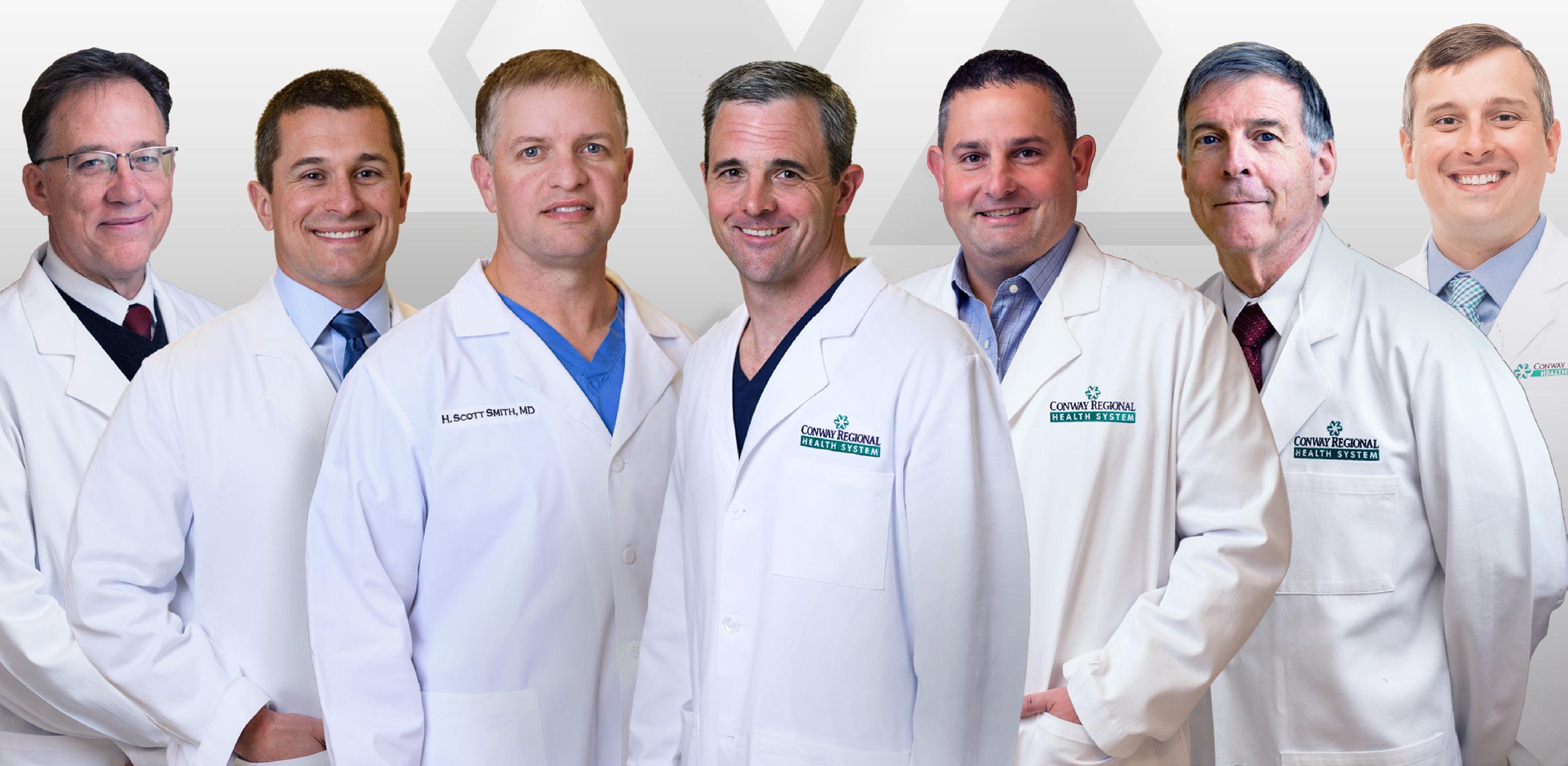
What is the key to your success?
Conway Orthopedic & Sports Medicine Center brings innovation and expertise in orthopedics and sports medicine care to north central Arkansas. The COSMC group has provided comprehensive orthopedic care to central Arkansas since 1988. The center of our practice is anchored by the experience and expertise of highly skilled orthopedic surgeons Scott Smith, M.D., Grant Bennett, M.D., Jay Howell, M.D., J. Tod Ghormley, M.D., Bryan Head, M.D., James Head, M.D., and Robert McCarron, M.D., who provide comprehensive orthopedic care for north central Arkansas and the River Valley. The center offers a wide range of services, including specialized care for the hand, upper extremity, foot and ankle; minimally invasive knee and hand surgeries; total hip, knee and shoulder replacements; and sports medicine services.
What are the latest technological advances in orthopedic surgery?
Technological advances are having a positive effect on orthopedic surgery. One of the biggest innovations over the past decade has been the use of percutaneous and minimally invasive surgery. This means using very small incisions, resulting in quicker healing with fewer complications. Our medical specialty continues to provide highquality health care using advanced technology, and our surgeons continue learning new techniques and technology, such as the Mako robotic surgical system.
What is Mako, and how does it work?
Mako Robotic-Arm Assisted Surgery is a new approach to joint replacement that assists the surgeon in a more precise, customized positioning of implants for each patient. A CT scan of a knee or hip is uploaded into the Mako system software, where a 3D model is created. This 3D model is used to preplan and assist surgeons in performing a hip or knee replacement.
From a surgeon’s perspective, the advantages are the precision and intraoperative customization Mako provides. That precision often enables orthopedic surgeons at COSMC to remove less bone or decrease the amount of soft tissue trauma. For many patients, this can translate into an improved range of motion and less time on crutches or a walker. The majority of patients return home the day after surgery.
What is the most important thing you do for Arkansans?
The most rewarding part of our profession is helping someone who is either critically injured or crippled with pain overcome their condition and regain their quality of life. Our talented group of orthopedic surgeons, surgical specialists, nurses and therapists offer a wide array of bone and joint disease evaluation, treatment and surgeries, including:
• Total joint and partial joint replacement
• Arthroscopic joint surgery
• Hands (carpal tunnel release and reconstructive surgery)
• Foot and ankles (sprains, fractures and reconstructive surgery)
• Sports medicine for athletes of all ages

Tell us about the history of your business.
Since 2001, the Payroll Co. has been dedicated to assisting our client partners in hiring, managing and growing their employees and businesses. Our journey began as a local payroll service bureau in Springfield, Missouri, with a clear objective: to manage the intricacies of payroll tasks, allowing business leaders to prioritize their focus on their employees and the growth of their businesses. We have since grown into a full human-capital management service bureau and human resources advisory firm with four offices and 60 employees located throughout the U.S.
What is the key to your success?
Our team is the cornerstone of our success. With an average employee tenure exceeding 10 years and the remarkable fact that we still have our first employee, we take immense pride in our team’s commitment and expertise. Our hands-on, white-glove approach is evident from the very first call, where a dedicated customer support person ensures an exceptional experience for our clients, showcasing our best-in-class service.
What kinds of challenges do you face in your industry, and how is your company handling them?
Our industry has experienced remarkable growth and expansion in recent years. Our client partners consistently rely on us to guide them through the dynamic and ever-evolving landscape of employment and labor. We’ve forged a strategic partnership with isolved HCM to integrate their cutting-edge technology package into our services. This collaboration enables us to offer our clients a top-tier, futureproof platform that’s adaptable and tailored to each client’s unique needs and circumstances. Furthermore, our dedicated team includes Society-for-Human-Resource-Managementcertified HCM experts who are well-equipped to support clients in navigating compliance law changes, implementing best practices for employee hiring and retention, and developing customized policies aligned with their organizational goals.

How did your business start?
In 2018, Eric Wright, M.D., transitioned from academics to private practice to pursue his interest in providing all aspects of plastic surgery. Wright Plastic Surgery offers aesthetic and reconstructive surgery for patient care, along with a variety of nonsurgical options.
What is the key to your success?
“Your Beauty, Our Expertise” is our motto. We know our patients have many choices, and helping them to make an informed decision about their care is what matters most to us. Dr. Wright is known for his extensive training in aesthetics and reconstructive surgery. Our well-trained staff provide comfort, as well as care, throughout a patient’s journey. Dr. Wright and his team have genuine compassion and interest in listening to their patients’ aesthetic goals.
What is the most important thing you do for Arkansans?
Dr. Wright is committed to bringing the latest advancements in medical technology to his surgical expertise, and Wright Plastic Surgery is known for helping many breast cancer patients. Dr. Wright recently completed the first use in
Arkansas of Resensation, an innovative breast cancer surgical procedure to restore sensation after mastectomy.
What sets you apart from your competitors?
Creating an experience for our patients while providing exceptional care and customer service. We pride ourselves on being with our patient from the initial phone call to their last appointment and through nonsurgical options, as well.
What are your organization’s goals for the next few years?
We recently relocated our clinic to a new location in Little Rock. We are excited to continue our expansion this year with an accredited surgical suite.
What kinds of challenges do you face in your industry, and how is your company facing them?
With the incredible advancements in aesthetic technology, time is our biggest challenge. Dr. Wright, along with his staff, continue their education to provide answers to all concerns. Research and continued educational training are a definite must.
How did you get started in your industry?
I’ve been a creative person my whole life. After graduating magna cum laude with my bachelor’s degree from Memphis College of Art in Tennessee, I returned home to Arkansas for an opportunity to work in advertising. Cut to now, and I have 18 years of recruiting experience under my belt, the last 12 of which I spent creating social media content for a multi-branch health care organization. Starting my own social media marketing business was a leap of faith in myself, and it has been a joy since day one.
What should people know about your business?
My passion lies in helping small-to-medium-sized businesses tell their unique story to the world and grow via social media. Authenticity is the buzzword for 2024 social media for a reason and I am an expert in this area. Too many social media management companies rely on stock photos and boring articles. VioletFig gets to the heart of who you are and becomes a member of your team, holding your hand every step of the journey to lessen your workload while increasing brand awareness and success.

What are you most proud of when it comes to your work?
My biggest source of pride is my happy clients. They are all strong, smart and successful business owners in their own right. Being a part of their journey is amazing.
What qualities are most important in your field?
Endless creativity and excellent artistic skills are the VioletFig difference. I’m often told, “Nicole, you are so good at thinking outside of the box,” but the thing is, there is no box. That mindset means I can achieve anything my clients need and things they didn’t even realize were possible.
What is your most productive part of the day?
I start creating at 5 a.m. every day. Early morning is “go time” for me. I also wake up with ideas in the middle of the night and scribble down notes in my notes app. This brain never shuts off.
How do you maintain work/life balance?
I’m very driven but disciplined, so I have to make sure I remember to enjoy the little things: down-time with my rescue cat, Kitty, painting, movies and family time. Creativity works best in an atmosphere of balance.
Pictured: Nicole Riedie, Owner

With one of the largest teams in the state, the spine team at the University of Arkansas for Medical Sciences takes a comprehensive approach to treating spine conditions. They are dedicated to identifying, diagnosing and treating the source of pain. That includes a thorough evaluation, selecting the best treatment options and utilizing the most advanced technology. The team’s treatment approach always begins with the least invasive option, depending on the severity of a patient’s symptoms. When surgery is required, the most cutting-edge, minimally invasive techniques are used, often including computerized image-guided surgery.
At UAMS Health, a passionate team of physicians and therapists works together to develop comprehensive, individualized treatment plans to ease patients’ pain, restore their functionality and maximize their quality of life.
The UAMS Health spine care team includes experts in neurosurgery, orthopedic surgery, sports medicine and pain management. The physicians
treat a variety of conditions ranging from the most acute issues to complex diagnoses. Conditions treated include back pain, degenerative disorders of the spine, spinal fractures, spinal stenosis and vertebral compression fractures. UAMS Health spine patients have access to innovative treatments that are not widely available and the most up-to-date imaging technologies for diagnosing spinal disorders.
Whether a patient’s back or neck pain stems from a simple issue or a complex condition, making the correct diagnosis is key to a successful treatment.
Patients are evaluated at the UAMS Health Back and Neck Clinic within three days to get them back to living life. With a commitment to excellence in research, education and patient care, UAMS Health remains at the forefront of spine care, continuously advancing the specialty to provide the highest standard of treatment and support.
Everyone at UAMS Health is “here for a better state of health.”
Pictured from left: Viktoras Palys, M.D., neurosurgeon; Hector E. Soriano Baron, M.D., neurosurgeon; Amelia A. Ray, CNP, acute care nurse practitioner; Samuel C. Overley, M.D., orthopaedic spine surgeon; Wayne L. Bruffett, M.D., orthopaedic spine surgeon; T. Glenn Pait, M.D., neurosurgeon; David B. Bumpass, M.D., orthopaedic spine surgeon; Jarna Shah, M.D., pain medicine anesthesiologist; Jordan M. Walters, M.D., orthopaedic spine surgeon; G. Lawson Smith, M.D., pain medicine anesthesiologist; Dana K. Lawrence, CNP, family nurse practitioner; Johnathan H. Goree, M.D., pain medicine anesthesiologist; Daniel Green, P.A., orthopaedic physician assistant; Aparna Jindal, M.D., pain medicine anesthesiologist
In 1988, restaurateur George Eldridge decided to bring his favorite steak place a little closer to home. After contracting with the Greenville, Mississippi, restaurant to bring the name and menu to Arkansas, Eldrige opened Doe’s Eat Place in Little Rock, and the rest is history.
Chef David Brown has manned the kitchen for nearly all of Doe’s 35 years in business, keeping the signature plates consistently delicious for scores of loyal patrons. The T-bones and porterhouses, served family style in the middle of the table, come in sizes that warrant sharing alongside a hearty serving of house-cut fries. Pair with the worldfamous tamales, and it is no wonder the restaurant has been frequented by entertainers, celebrities and professionals alike throughout the years.
Since taking over in 2012, George’s daughter Katherine has made it her mission to keep up the restaurant’s reputation for no-frills good food. In addition to maintaining the high quality that keeps repeat customers happy, Eldridge has focused on bringing in new faces, ensuring that the next generation of Doe’s fans get well acquainted with those iconic red-and-white checkered tables.
Pictured: Katherine Eldridge, Owner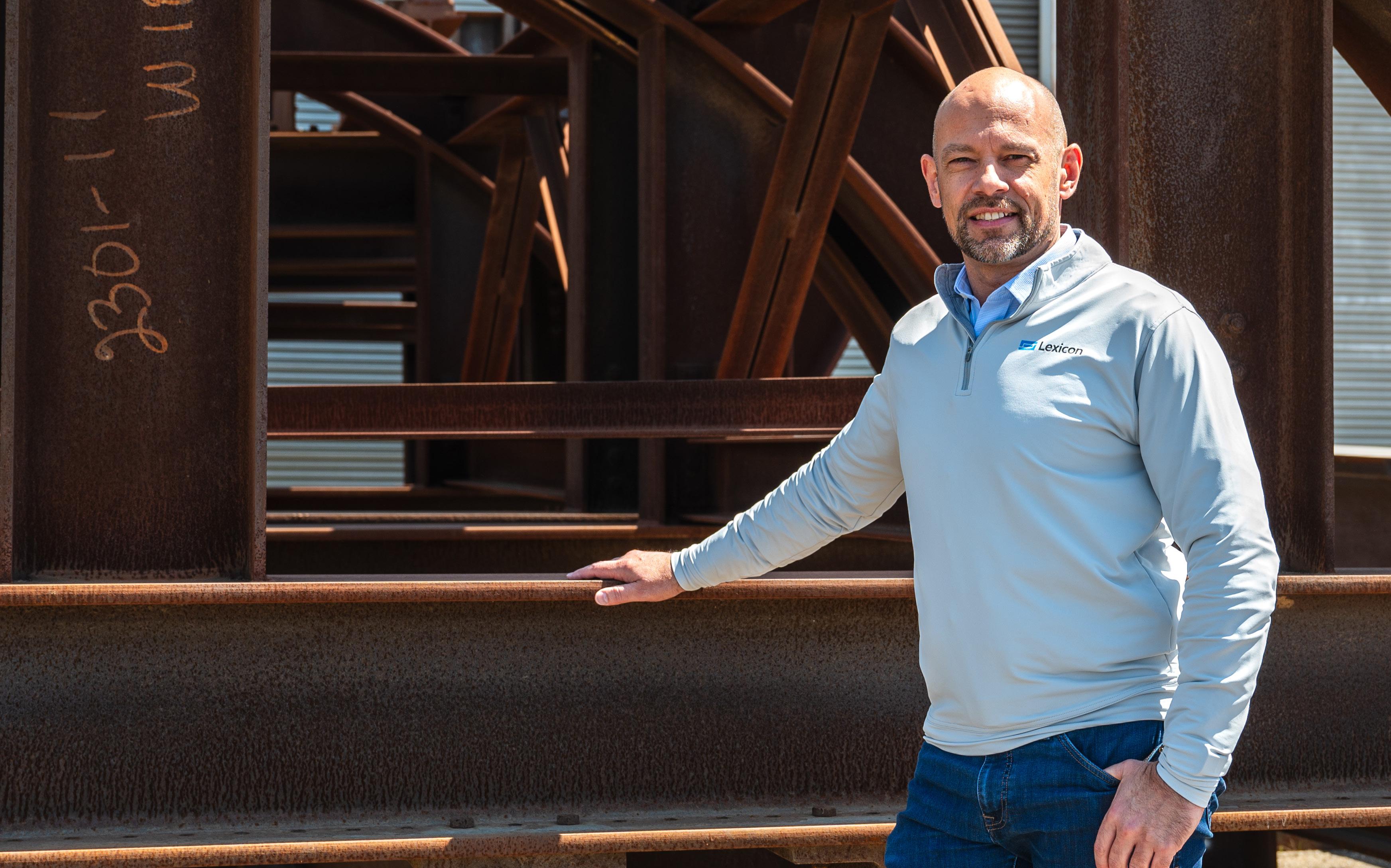
How did your business get its start?
Tom Schueck founded Schueck Steel, now Lexicon, in his garage in 1968 with one employee — his pregnant wife, Marge. Today, Lexicon is led by Tom’s son, Patrick, and provides construction management, steel fabrication and erection, mechanical installation, and plant maintenance for heavy industrial, commercial and bridge projects, as well as a full spectrum of golf course construction, renovation and management services. Lexicon’s capabilities include hospitals, bridges, airports, stadiums, data centers, electric vehicle and chip-manufacturing facilities, large-scale retail warehouses, steel mill construction, golf courses and more.
What is the key to your success?
We are guided by our visionary purpose: Real people. Lasting partnerships. Unfailing integrity. Building a better tomorrow one project at a time. We look at each decision through this lens, ensuring that people, quality, safety and innovation are top priorities. Patrick often says that we’re in the steel business, but also in the people business. We invest in career growth and empower our employees to reach their potential. This translates into a strong culture that helps attract talented, hardworking team members who are committed to this industry, our company and building America.
What are your proudest accomplishments?
Our industry-leading safety program is constantly being improved, and we’re proud to be a resource among peers and partners as they enhance their own safety practices. From an innovation perspective, Lexicon is a world leader in the use of robotics in structural steel fabrication. This commitment to staying ahead of the curve allows us to deliver exceptional, award-winning results and be a mentor for others in the industry. We’re also proud of our unique programs that prioritize well-being and professional growth, including Lexicon University, which empowers employees to enhance their skills and knowledge; an on-site health clinic that provides medical services, preventive care and wellness programs; and generous $10,000 all-taxes-paid bonuses to employees when they reach 20 years of service.
What are your organization’s goals for the next few years?
We’re hiring daily to keep up with current demand and seize new opportunities. We’re committed to smart, sustainable growth, ensuring we have the resources and talent to maintain our high standards.
Pictured: Steve Grandfield, Chief Operating Officer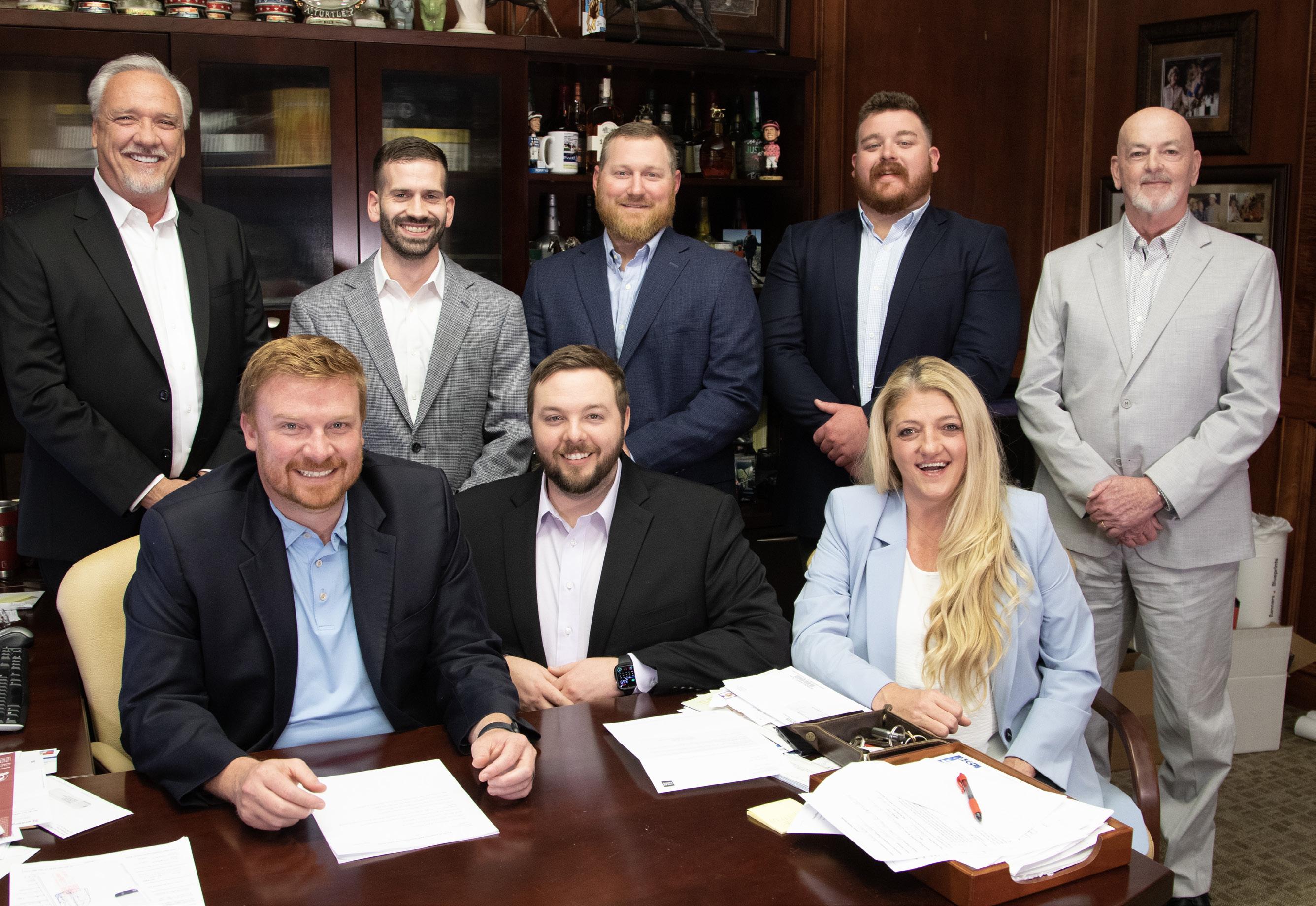
What should our readers know about you?
Stallion Transportation Group, with corporate offices located in Beebe, was established in 1992 and has recently celebrated 30 years in business as both an asset trucking company and third-party logistics division. We are a closeknit community of talented people with Christian values. We enjoy the outdoors, sports, friendly competition and serving the great state of Arkansas as a team.
What is the key to your success?
Our leadership has spent decades investing in the youth of the company. We are excited to be passing the reins to the next generation of executive leadership that we are confident will continue to foster relationships with our employees and customers.
What has been your organization’s proudest moment or accomplishment?
Approaching two million dollars in charitable contributions. Our staff is invested in philanthropy, and the framework of the company was built on generosity.
What kinds of challenges do you face in your industry, and how is your company facing them?
Stallion has been very fortunate to stay in front of industry hardships with a commendably low driver turnover and by maintaining quality customer relationships that have been loyal to our brand and service.
What is the most important thing you do for Arkansans?
Over the years we have proudly supported the prosperity of organizations vital to Arkansas: Arkansas Foodbank and Arkansas Hunger Relief Alliance, Arkansas Special Olympics, Make-A-Wish Foundation and local school and community organizations.
What are your organization’s goals for the next few years?
We plan to ensure the future growth and financial stability of the company, investing in advanced technology, employee success and leading customer experience. Stallion prides itself on reputation, integrity and being a bar-setting contributor to the transportation industry.
Stallion Transportation Group • 800-597-2425 • stalliontg.com stalliontg
Pictured: Front Row, left to right: Garland Rice, Colt Rice, Elizabeth Skinner Back Row, left to right: Butch Rice, Drew Parsons, Seth Carruth, Brody Welcher, Jeff Holt
How did your business start?
Founded in 1996 in Little Rock, Arkansas Urology has since become statewide with 11 locations, 14 physicians and more than 20 advanced practice providers treating over 130,000 patients a year across the Natural State.
What sets you apart from your competitors?
Arkansas Urology is the state’s premier urology practice, the leader in all things urology. We are proud to provide comprehensive treatment services for men and women of all ages. We provide our patients with the most effective, state-of-the-art procedures in a caring and compassionate atmosphere. We have nationally recognized clinical pathways which ensure that our patients get the best individualized treatment plan.
How is your company facing industry challenges?
One of the largest challenges in health care is ensuring access. The Arkansas Urology Foundation was launched to raise awareness about the importance of early detection with prostate cancer, comprehensive men’s health screenings and other urological issues to help serve the state’s underserved and underprivileged. We do this by providing free screenings across the state, offering educational information to our patients and referring physicians, as well as supporting initiatives that directly impact men’s and women’s health. Finally, we identify other health care needs which benefit Arkansans when it comes to improving their quality of life.
What has been your organization’s proudest moment or accomplishment?
In the spring of 2023, Arkansas Urology opened our 4,400square-foot diagnostic and treatment center. This location eliminates the hassle of patients having to coordinate multiple site visits as they move through various diagnostic and treatment procedures, in turn keeping costs lower for patients and allowing for more efficient care. The center features a 3 Tesla MRI machine with substantially more resolution; we also have plans to introduce new treatment procedures that are more targeted than surgical removal of the entire prostate.
What qualities are most important in your industry? When it comes to years of health care experience, along with our strong commitment to innovation, Arkansas Urology is proud to be the Face of Urology in Arkansas. Under the leadership of our physicians, we have many clinical pathways that ensure each and every one of our patients are taken care of in a caring and compassionate manner from day one. We make a commitment to our facilities and equipment as much as we do our clinical pathways. From our Centerview Surgery Center to the Arkansas Prostate Cancer Center, kidney stone walk-in clinics, diagnostic and imaging center, AU Pharmacy, men’s health clinics, Arkansas Urology Research Center and the AU Foundation, we lead the way in providing the most comprehensive umbrella of service with top notch equipment and technology when it comes to caring for our patients.
Arkansas Urology • 501-219-8900 • arkansasurology.com
Arkansas Urology ARUrology @ar_urology
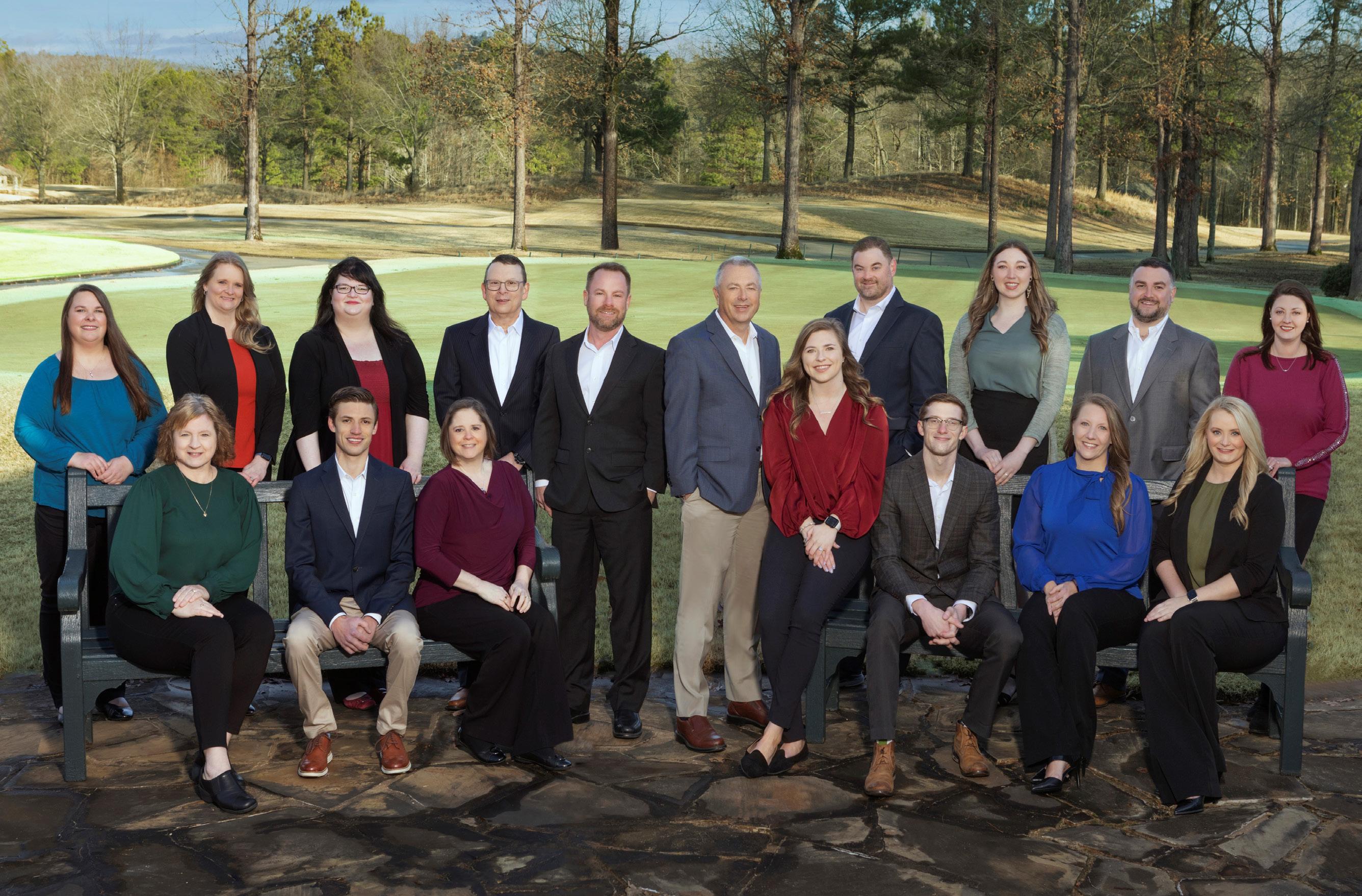
Tell us about the history of your business. We started 24 years ago by building client relationships built on trust, integrity, exceptional client service and solid financial planning. We opened our first office in Little Rock in 1999, we then opened our Tulsa office in 2002 and our Hot Springs Village office in 2010.
What sets you apart from your competitors?
We believe that reputation is crucial in attracting and retaining customers. Honesty, integrity and customer focus are qualities that we strive to embody, and we believe that our reputation is a testament to these values. We also recognize that offering innovative, high-quality products and services that meet our customers’ needs is essential to our success, in addition to our commitment to excellent customer service. Our deep expertise in areas such as investment management, financial planning, life insurance and long-term care sets us apart, and we work closely with
estate attorneys and tax planning attorneys to ensure a comprehensive approach to our clients’ financial needs. We also value a positive and supportive culture within our company, as it attracts and retains top talent and creates a strong sense of loyalty among employees and customers. With over 170-plus years of industry experience between our advisors and staff, we are committed to coaching our next generation of advisors to maintain our legacy of excellence.
What are your organization’s goals for the next few years?
With our customer base growing so rapidly, we must expand internally. Our focus here at Small & Associates is to make sure our customers are always taken care of. We plan to hire more advisors, more client service specialists and more management to make sure everything runs as smoothly as possible.

How would you describe your business?
Beyond Wellness is a total health destination that elevates the traditional wellness experience by serving individuals seeking a custom and holistic lifestyle. Utilizing functional medicine and cutting-edge breakthrough therapies, Beyond Wellness creates a specialized solution that promotes longevity and champions clients’ personalized wellness journey results.
What is your mission?
Our mission is to educate and lead our patients to individualized wellness and health care. We encourage health and wellness, starting from the inside and moving to the outside, through all-encompassing individualized health and wellness care. As a proud local business, we are committed to enhancing the well-being of our Arkansas community one individual at a time.
What sets you apart from your competitors?
We strive to lead our patients in personalized treatment strategies that address the root causes of their health concerns. Our innovative membership program, wide range of health and wellness services, and commitment to bringing a metropolitan model of wellness to Arkansas further underscore our uniqueness in reinventing health and beauty, backed by a team of local industry leaders and experts in the field.
What is the most important thing you do for Arkansans?
We introduce an unprecedented model of health and wellness to Arkansas, bringing access to a caliber of care traditionally reserved for major cities like New York and Los Angeles. Our presence signifies a new era of wellness inclusivity and sophistication for Arkansans.
Pictured: From left to right: Hanah Nichols; Victoria Nguyen; Misty Parker; Jordan Davidson, APRN; Ashley Huneycutt, owner, CEO; Matt Huneycutt, owner, COO; Christa Jackson, APRN; Madelyn Nicholas; Jackie Huneycutt; Rebekah Scott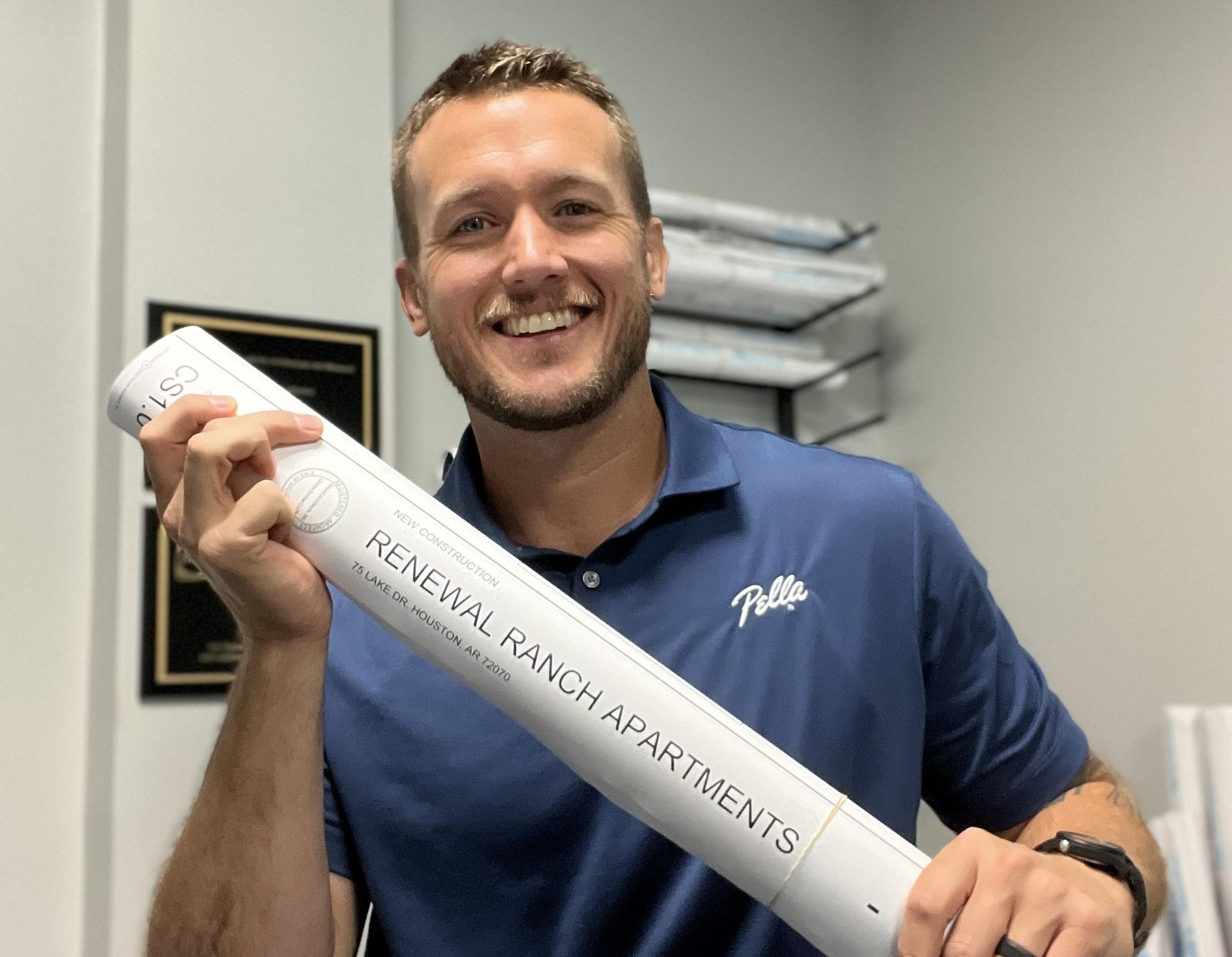
How did you get started in your industry?
I’ve been in sales most of my life for various companies. It occurred to me early on that selling a product or service that has a reputation for quality and superior service makes selling a lot easier. When I found out Pella was hiring, I took my shot.
What are you most proud of when it comes to your work?
After a back injury and two surgeries in 2001, I was lost in addiction for nearly two decades of my life. I found hope and sobriety at a faith-based recovery facility called Renewal Ranch in Conway. Five years to the day that I graduated from the program, I got to call the Ranch to let them know that Pella would be donating all of the windows and doors for the new phase 2 apartments they were building. We’ve also hired over a dozen recovery program graduates in the five years that I’ve been with the company.
What qualities are most important in your field?
Same as any other industry, I suppose — integrity. One of the biggest compliments I can receive is when one of my builders tells their homeowners or one of their peers, “If you bought it from Pella, they’ll take care of you.”
What else should readers know about you and your organization?
I am genuinely proud of the work we do here and the way we take care of our customers. I always invite people to come and find out why we are consistently voted “Central Arkansas’ Most Preferred Brand of Windows and Doors,” why we win AY’s Best Of awards, why we were voted Arkansas’ Best Place to Work and why our little branch here on Maumelle Boulevard won Pella’s National Top Gun award. We absolutely love what we do, and it shows.
Neil
Pictured: Neil Gray, Trade Sales Lead

What defines comfort food? For many, it is not taste, but memory — the memories of cherished family gatherings where elders teach youngsters about life, tradition and, often, cooking. “Comfort food is probably one of the best things I like because I think it’s comforting as a remembrance, in a sense, where people can just eat and remember certain aspects of their life or situation that they experience at home with this particular food or just bring back good memories of home cooking,” said Karri Harris, Quapaw Kitchen room chef at Saracen Casino Resort in Pine Bluff.
Harris learned to cook as a child while assisting his mother in the kitchen. Now, at Saracen, he serves up heaping helpings of prime rib, macaroni and cheese, and mashed potatoes, along with some dishes that might become guests’ new favorite foods.
“We often serve lamb racks — something special for the guests, something they’ve not had before. Some have not had that particular type of meat before,” he said. “We also serve shrimp and lobster scampi.” Just as important as the menu to Harris is creating a home away from home for patrons.

“Our customers are the biggest part of the casino,” he said. “They’re the ones that keep the steamboat running, so I always want to improve on that and make sure they’re comfortable every time they come to the casino.”
Harris took his first kitchen job as a student at the University of Arkansas at Pine Bluff. There, he worked his way up from dishwasher to lead cook at the university’s cafeteria. He has made similar progress at Saracen, where he started as an entry-level cook and was recently promoted to his current role.
“Working hard and being able to step up so quickly in the industry is probably one of my biggest achievements,” he said, adding that he credits his advancement to being diligent, developing proficient skills and going the extra mile in the kitchen.
Looking to leaders for guidance is another key to success. He said he learned much from his predecessor, Chef Deon Thomas, who was recently promoted to food and beverage operations manager, as well as executive sous chef Tyrone Fox.
“Chef Karri is a fantastic chef. He [had] the opportunity to become the room chef of our Quapaw Kitchen, and what he brings to the table is patience and vast knowledge of Southern cuisine, which is his favorite,” Fox said. “He mixes a little bit of Italian cuisine with it, and I think it’s a beautiful opportunity for him, and he’s a wonderful guy.”
Harris is currently working toward a master’s degree in mental health counseling, and in the future, he said, he would like to combine the mental health and culinary fields by “feeding the stomach and healing the mind.”
He added that he will prob ably always feel at home in the kitchen, where he can brighten people’s days by providing some extra comfort in the form of a favorite food.
“I enjoy putting smiles on people’s faces once they get into that first bite and they think about the taste and are savoring it,” he said. “Once they get that smile, I know I did the right thing.”

People happen into careers in all sorts of ways, and often, even having a clear idea in mind is not enough to truly predict one’s trajectory. Leslie Davis, president and CEO of Harbor, an environmental consulting firm in Little Rock, discovered her interest in the industry after getting a job answering phones for another environmental consulting company. She found that she enjoyed the work and the people involved, so she decided she would become an environmental attorney. That turned out not to be the right fit either.
“I realized that being an attorney meant you sat in an office and read all the time; I really wanted to be able to get out in the field a little bit and do different things,” she said. “That’s the nice thing about this career. You do get to see lots of cool things. You get to go into industries across the state and see how things are made and really get to learn how diverse our manufacturing is here in the state.”
For her current role at Harbor, the firm she founded in 2007 with thenbusiness-partner, Trena Adair, Davis oversees a busy company at the forefront of regulation, compliance and sustainability concerns for clients all over the state. Harbor works with industrial, commercial and government clients of all kinds, and the acquisition of Blaylock Threet Engineers in 2015 allowed the firm to offer even more design- and engineering-related solutions. As regulatory focus shifts to a more proactive approach centered on sustainability, Harbor’s sustainability group sets it apart as the firm of choice for businesses seeking to stay ahead of the rulemaking curve.
“We’re at that point with the regulations where what everyone is doing is voluntary,” Davis said. “We’ve had some [Securities and Exchange Commission] rules come out recently, but they’re not finalized yet, so really, consumer pressure is what’s causing companies to do these things — as well as investment pressure, being able to control some of the risks that are associated with climate change.”
Despite the company’s focus on finding compliance solutions that almost everyone can agree on, there are certain misconceptions about the firm’s work that can be hard to shake. That seems to come with the territory when words like “environmental regulation” are involved, no matter how positive the outcomes.
“My dad was a diesel mechanic, and I never could convince him that we weren’t [the Environmental Protection Agency], that we were not there to get you,” Davis said. “We are intended to be the link between the regulated industry and the regulator. We can come in and show you how to do things, how to fix the problem that you’ve got. No question is off limits with us. We have no regulatory authority. I can’t fine you anything, I can’t do anything like that. Our jobs are really like educators for those people. We have no ‘gotcha,’ no hammer.”
Despite the sometimes dizzying pace of the industry, there is one environment Davis is even more concerned about — the work environment. Watching her mother start her own company put the idea of business ownership in Davis’ head from a young age, and while she has worked for some “amazing companies,” she said, she had her own ideas about what a company could and should look like.

“I think watching my mom work hard and build her own business really gave me the confidence that I could do this,” she said. “I felt like the Lord was leading me in that way, and I knew that if he was going to entrust me with something like this, we had to do it right. We had to do it for the employees, not just for the clients.”
Davis is quick to point to the strength of her leadership team in explaining the company’s success. That collaborative, growth-minded work culture is something she and her colleagues try to pass on to the next group of Harbor executives, as well.
“We just have an amazing leadership team and project managers who are truly invested in the clients,” she said. “I really think that we’ve just been blessed beyond measure with real people who want to do well for their clients and do well for themselves. … It’s the reputation we have in the community, that we have from our employees, really, that if I get hit by a bus tomorrow, will be the things that I want folks to remember about this business.”
If big dreams are worth their weight in gold, then Todd Gold, senior director of hospitality at Saracen Casino Resort in Pine Bluff, must be a very wealthy man.
Gold joined the restaurant industry at age 15 as a dishwasher at Bruno’s Little Italy in Little Rock, where he worked his way up to kitchen manager before leaving to pursue culinary school in Tennessee at age 20.
He worked at a variety of country clubs, hotels and restaurants before landing at Acxiom, where he was a corporate executive chef for 10 years. During that time, he incorporated the Arkansas Culinary School, which started as an apprenticeship program and merged with Pulaski Technical College in 2006, eventually becoming the University of Arkansas-Pulaski Technical College Culinary Arts and Hospitality Management Institute in Little Rock, where he served as dean.
“It’s hard to describe when something just feels right, and what has always felt right to me is to be involved with folks who are eager to learn,” he said. “Throughout the years, I’ve heard many instructors say it, and it’s kind of cliché, but when you have a group of young men and women in front of you and you see those lightbulbs go off … it’s one of those feel-good moments.”
While serving as project owner and coordinator for the construction of the institute in 2013, Gold discovered a love for construction that was first kindled during a stint as president and owner of Purple Cow Restaurants from 2007 to 2012. Gold left the culinary institute to launch the opening of Saracen Casino Resort in Pine Bluff in 2020. Now he is ready for phase 2 of Saracen, which will include a hotel and event center set to open in fall 2025.
“I really enjoy everything I’m doing, and I’m glad I made the move,” he said. “It was the right fit, and you know, being 51, I can definitely see this being the position I finish my career out in.”
Gold serves with a number of professional organizations, including the Central Arkansas and Arkansas Delta chapters of the American Culinary Federation. This year, he is spearheading the inaugural Delta Diamond Chef Awards Gala and Competition which will include the finals of a culinary competition to determine the Delta Diamond Chef, as well as the chapters’ annual awards presentation. The event is scheduled for 6 to 10 p.m. Oct. 15 at the Pine Bluff Country Club.

“It’s a really unique fundraiser that we’re doing because we get to have the typical chef’s ball, the gala,” he said. “We give all the awards out to each chapter, but we also have this live competition going on at the same time, and we’ll have our first-ever Delta Diamond Chef awarded at the dinner, as well.”
He said he hopes the event will eventually raise enough money to fund the ACF’s larger goals of rehabilitating a building in downtown Pine Bluff to include a guest-chef restaurant, a community education center, kitchen facilities and an entertaining space that could house the event in the future.
“Pine Bluff was such a happening place 20 or 30 years ago, and it has just had some misfortune over the past couple decades,” he said. “I think with the right things happening and the right people coming back to the table, we can make a big change in that area. It’s such a great town. It has so many great people and so much huge potential.”
Bram Keahey, partner, manager and project architect with Taggart Architects in North Little Rock, is an optimist at heart. Keahey has been with the firm for 31 of its 50 years, and while he is not shy to admit any of the challenges faced by his industry today, he has always seen those hiccups as just another part of the journey to a successful project.
“Any difficult or trying situation is just a new experience and opportunity. I’ve learned that everything is manageable. I often tell myself that if I can make it through today, I can make it through any day,” he said, “and I do.”
Keahey originally planned to go into medicine, where he could combine his passion for people with his fascination with science. After landing on the architecture path instead, he found that the two professions had more in common than at first thought. Both are a mixture of art and science, he said, and now he can improve lives in a different way — by building places for people to live, work and play.

“I like being in a space that inspires me to be better and to see a world that is more resolved and intentional,” he said. “Good design benefits everyone, which in turn makes living in a community more fulfilling. We try to create something that makes going to work, walking in a plaza or just studying in a well-lit space a beneficial experience.”
Architecture school at the University of Arkansas in Fayetteville taught him to “solve problems with a purpose,” he said, and that commitment has served him well over three decades at Taggart. The firm’s client-centric approach means that, even when things don’t go according to plan, Keahey and the rest of the team do whatever it takes to bring a client’s vision to life. His role, as he sees it, is that of a narrator. Constraints such as timing and budgeting turn him into a discerning editor, as well, he said.
“When you’re designing and you’re coming up with the best solution, it’s not terribly disappointing to me to have to change gears or to lose something, because I know inevitably the client’s
By Mak Millardgoing to appreciate that,” he said. “Having limits causes you to focus on what’s essential to the project, and yeah, maybe you lose something that was a great feature or a perfect design element, but the project becomes stronger because you focus on the things that are important.”
Keahey also credited two of the firm’s earliest partners, the late Jerry Currence and chairman emeritus Bill Gray, for their profound impact on both his career and the Taggart design ethos. For a long time, Keahey said, Currence and Gray were “the heart and soul of the company.”
“Jerry taught me the value of clientfocused design and service. His natural gift of knowing the client and quickly getting to their solution is something that I work on every day,” Keahey said. “Bill Gray taught me, and continues to guide us as chairman emeritus, that it’s the staff and people around you that make a difference.”
Taggart’s move from its longtime location off McCain Boulevard to its new digs on Main Street in the Argenta Arts District represented another key development in the firm’s philosophy. The building has given Taggart a front row seat to — and a large hand in — the transformation of the area.
“We’re much more engaged with the Argenta Historic Design Commission, much more engaged with the city on how they’re developing and continuing to grow,” Keahey said. “By being downtown and making that move, we’re much more engaged with the heart of North Little Rock.”
As it celebrates its 50-year milestone, the firm is already looking ahead to the next half-century. The Taggart team, which is made up of mostly longtime employees, is committed to strengthening those things that have set it apart so far, whether it be cultivating deeper relationships with repeat clients, attention to detail or unwavering quality in the finished product. True to form, Keahey is eager for what’s to come, both challenges and successes alike.
“It’s a good time to be at Taggart.”
In the Book of Exodus, Moses begs the Lord to choose another to carry his case to the Egyptians, denigrating himself as “slow of speech and of a slow tongue.”
Even after 32 years in ministry — 23 as pastor — Rod Loy, lead pastor at First Assembly of God North Little Rock, can still relate to what Moses was driving at. Looking back, he said there is little there to suggest he would end up where he did.
“I was a misfit, a reject, a nerd. Every generation has a word for it,” he said. “I was that kid who was picked on and bullied, very introverted. I’d cry if I had to give a book report. Just standing up in front of a class was terrifying for me.”
In youth services as a seventh grader, sitting in his customary seat in the back, God moved Loy irreversibly toward ministry, a message so clear and powerful that within months, the kid who hardly ever spoke was donning a pink bunny costume to speak at kids’ church, an inauspicious debut if there ever was one. Yet, against all logic and reason, he never wavered from that call.
“It didn’t make a whole lot of logical sense, given my personality and my shortcomings and flaws, but I never moved from that,” he said. “I never had a moment where I thought I was supposed to be doing something else. I knew that’s what I was designed to do.”
One of Loy’s useful attributes dating back to the beginning was an acute self-awareness that led him to identify and attack the elements of his personality that needed work. Recognizing he was not a natural communicator topped the list.
“At a young age, I started studying communicators who were able to capture the attention of a crowd, and I began to learn,” he said. “I envy those guys who are natural-born communicators. I had to learn it through trial and error. I started as a kids’ pastor initially. Kids ministry was a great place. Kids are a very forgiving audience, and they also give you immediate feedback.
“I remember in kids service once, one of the kids raised their hand, and I just knew they were going to ask a question about my great message. He said, ‘Pastor Rod, this is boring.’ I stopped, and rather than get mad, I said, ‘How many of you think it’s boring?’ About 80 percent of the room raised their hand. I said, ‘OK, we’re going to do something else.’”

Loy’s penchant for continuous learning extended to his formal training, as well. He earned his undergraduate degree through Nelson University in Texas and, just three years ago, earned a master’s degree from Assemblies of God Theological Seminary in Springfield, Missouri. He capped that off with a doctorate of ministry from Liberty University in Virginia last fall.
Even with these credentials, he continues to develop new ways to lead others, always humbly and always as a fellow seeker of a deeper relationship with God.
“My lane, I’ve found, is I do pretty well at taking things that are difficult or complex truths and just talking in common, ordinary language, where they’re understandable and applicable to the average person,” he said. “You don’t hear a lot of elaborate phrases. My goal is not for everyone to say, ‘Oh, wow, that’s amazing. How did he come up with that?’ Instead, I want them to say, ‘Oh yeah, I could see that.’ I see my role more as a tour guide. Here’s what I’ve seen in scripture. Come see it with me.”
Throughout her career, Stephanie Malone has been a study in contrasts — a female member of her college’s sports information department who was assigned to cover men’s sports; a state legislator who never ran for so much as student council in high school; a consummate communicator who, in her words, is not particularly effective as a public speaker; and the non-lawyer leading a trade association representing attorneys.
Yet it is from that posture of apparent disadvantage in virtually every chapter of her career that her superpower arose. Malone is a connector of the highest order, a woman of vast networking resources, connecting them to address problems and get needed projects done.
“The biggest thing that I’ve leaned into was my ability and my friendships and my relationships, bringing everybody together in a room to just sit down and talk,” she said. “With that comes trust, you know, ‘OK, if there’s going to be this type of proposal, then here are the effects.’
“I’ve developed a lot of trust through the years that people knew I would set meetings up and trust that in those meetings, everyone could get their message across in a safe and effective way.”
Each stop on Malone’s professional journey underscored her natural ability to bring different kinds of people together for a common purpose, starting at the University of Arkansas in Fayetteville, where she earned a degree in broadcast journalism. Her first jobs in Fort Smith after graduation addressed economic development and helped reimagine Fort Chaffee prior to her time serving in the Arkansas legislature.
“I was 29 when I was elected. There were several women in the legislature with me, but I was by far the youngest,” she said. “My first term, I went in to sit at a committee table, and a staff member came up and turned to one of my colleagues and said, ‘Your daughter can’t be with you at the committee table.’ I was like, “Oh my gosh, no, I’m a legislator. I promise I’m supposed to be here.’”
Most recently has been her time as CEO of the Arkansas Trial Lawyers Association, taking the job a couple of weeks after COVID-19 shut everything down. She survived those stressful early challenges and today is tackling the issue of building a fu-

ture attorney workforce in a state that is critically underserved.
“The last year and a half, we’ve been very proactive in reaching out to both of the state’s law schools. We host job fairs, and we invite [students] to our continuing education classes to make those connections and for our members to be mentors,” she said.
“It’s a great opportunity for our members to mix with them, to help them work out their frustrations with law school and with balancing school and life.”
Malone’s overarching responsibilities are to help ease members’ burden over building and maintaining legal practices for the good of all Arkansans.
“I think most people don’t think about how important lawyers are until they need one,” she said. “We are a rural state, and a lot of our members are a one-stop shop who are the front line for when someone has been wronged.
“Our members aren’t corporate lawyers; they’re individual Arkansans who went to law school and earned a law degree to go help the underdog and fight for the little guy. They live in our communities, and they’re all across the state. They go to church with us, they’re Little League coaches, and they’re who Arkansans turn to in a crisis.”
No conversation with Dustin McDaniel, former Arkansas attorney general and partner at McDaniel Wolff law firm in Little Rock, would be complete without his frequent nods to the many people he helped gain a leg up in Arkansas and beyond, colleagues who benefited from his public service and, although it could be seen as predestined, a law career that he made uniquely his own.
“I was kind of born into law,” he said. “My dad is a lawyer, and we had various relatives that were lawyers and judges. My brother and cousins are lawyers. I come from a long family history of practicing law.”
Despite that, McDaniel put off law school to attend the police academy, and although he has not been a full-time police officer since 1996, he has maintained his certification for 30 years and is an active volunteer at the Poinsett County Sheriff’s Office.
When he did graduate from law school, however, he took Arkansas by storm, becoming elected to the Arkansas House of Representatives in 2004 and as attorney general in 2006.
When he reached his term limits as attorney general and left office in 2015, he formed McDaniel, Richardson & Calhoun, which later became McDaniel Wolff, its success accented by a snazzy new building with a view of the Arkansas State Capitol.
McDaniel’s background has put him in an interesting niche. Although McDaniel Wolff is a full-service business practice, McDaniel has built a national practice representing companies such as Amazon, the Cigna Group, Xcaliber International tobacco company and Meta, the parent company of Facebook, in their dealings with attorneys general.
“It is a unique practice,” he said. “It’s certainly different than what my dad does for a living or my brother, but I’ve been very blessed, and I love doing it, and I’m proud to be able to be in Arkansas, leading a practice that has been so successful around the nation.”
He also serves as the Democratic co-chair of the Society of Attorneys General Emeritus, and he teaches a spring-semester course on attorneys general at his alma mater, the University of Arkansas at Little Rock William H. Bowen School of Law.
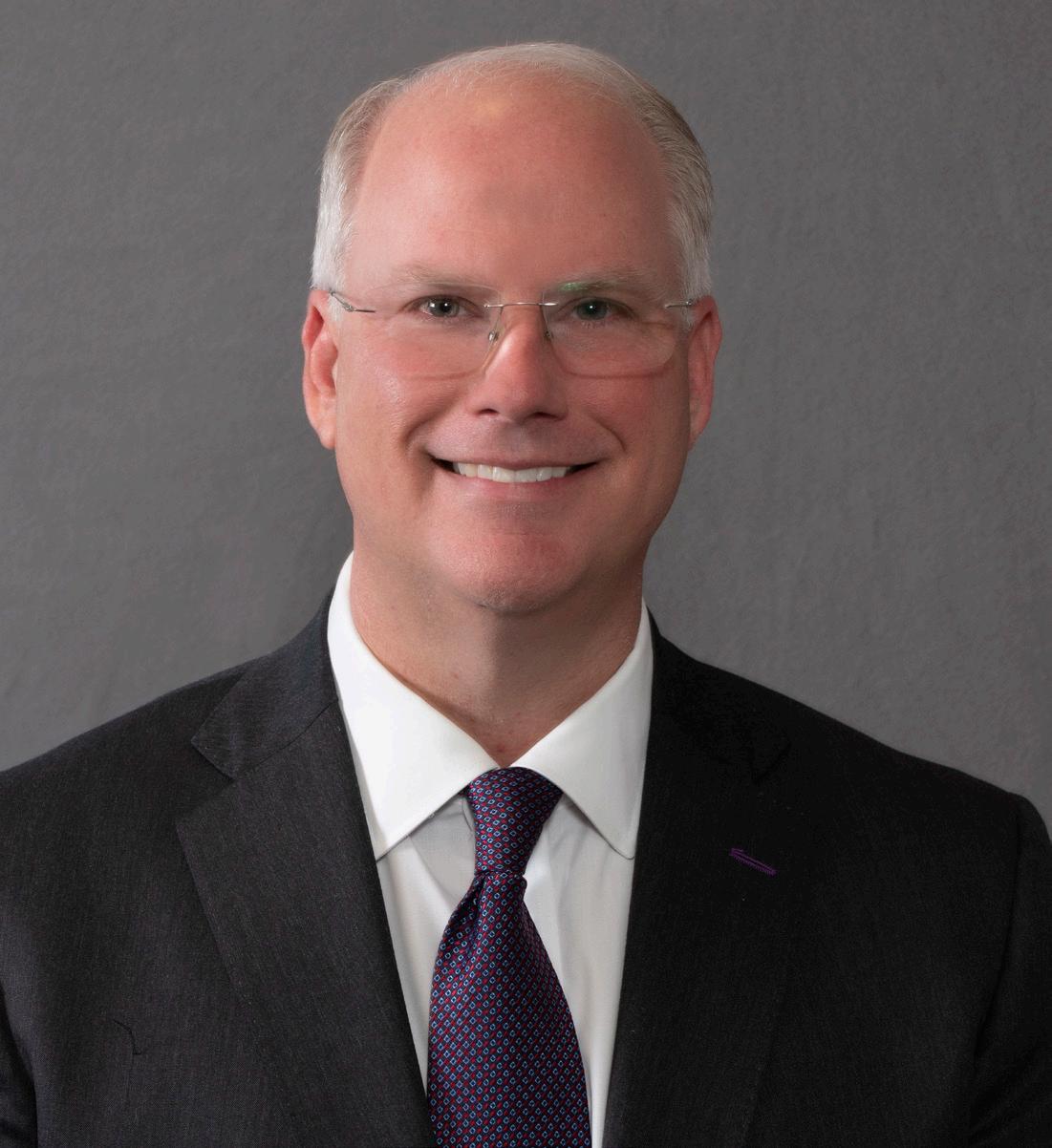
“I still get to do those things and be involved and have a voice and represent clients in the big issues of the day that AGs all over the country are working on, even though I’m not running for office, so I feel like I get the best of all worlds,” he said.
He is currently working with Vince Ward, managing partner, to provide opportunities for young attorneys and grow McDaniel Wolff over the next 10 years so that when McDaniel is ready to retire, he will have a lucrative business to hand to the next generation.
Besides growing his practice, working with attorneys general on a national level, and mentoring up-and-comers, other current activities include helping secure the Pope County casino license for Cherokee Nation Businesses, securing a law license in South Dakota, where he hunts for pheasants, and sneaking in time to duck hunt in Poinsett County.
“If I was ever worried about being bored after I left office, that has not been a concern,” he said.
Although he is often asked about the old days — entering the law field, his time in politics, founding his firm — he said he prefers to focus on the future.
“I love every minute of my public service, and I was very grateful for the opportunity to serve, but I spend my time now thinking about what the next 20 years are going to look like,” he said. “I’m really grateful that I have the opportunity to engage and still be relevant among the nation’s attorneys general.”
An employment opportunity in accounting added up to a career for Michael Morton.
A fledgling accountant with an eye on law school, Morton, at the time a 22-year-old graduate of Northeastern State University in Oklahoma, accepted an accounting job for a group that owned seven nursing homes. From that in troduction to long-term care in the early 1970s, it has been a straight line to Morton’s position as president of Fort Smith-based Central Arkansas Nursing Centers.
“I started to work for them, and I worked for them for four years,” said Morton, 73, of his first job. “That led to me being associated with a lot of people in the long-term care industry.”
During those four years, Morton dealt with everything from securing Small Business Administration loans to a tornado that flattened one of the facilities. By the end of the fourth year, he had amassed enough knowledge, both about the industry and to under stand he would not be following a legal career, that he seized the chance to borrow money and, with a partner, buy his first nursing home in Booneville in 1976.
“When I first started, the only requirement to get into a nursing home was you had to be on welfare,” Morton said. “Now you have to be sick.”
From changes to federal and state rules and regulations to advancements in therapies and treatments and the advent of industry degree programs, long-term care has changed during Morton’s run, but he said the foundation of care remains the same.
“It goes back to the three basics of when it was a welfare program. If you kept it clean and you fed them good and had good care, you’d be successful,” Morton said.
Morton is confident in the care his company provides and urges people to visit and compare different homes when seeking a place for a loved one. Speaking of which, Morton’s late mother and, now, his father, Don Morton, have been cared for at a Central
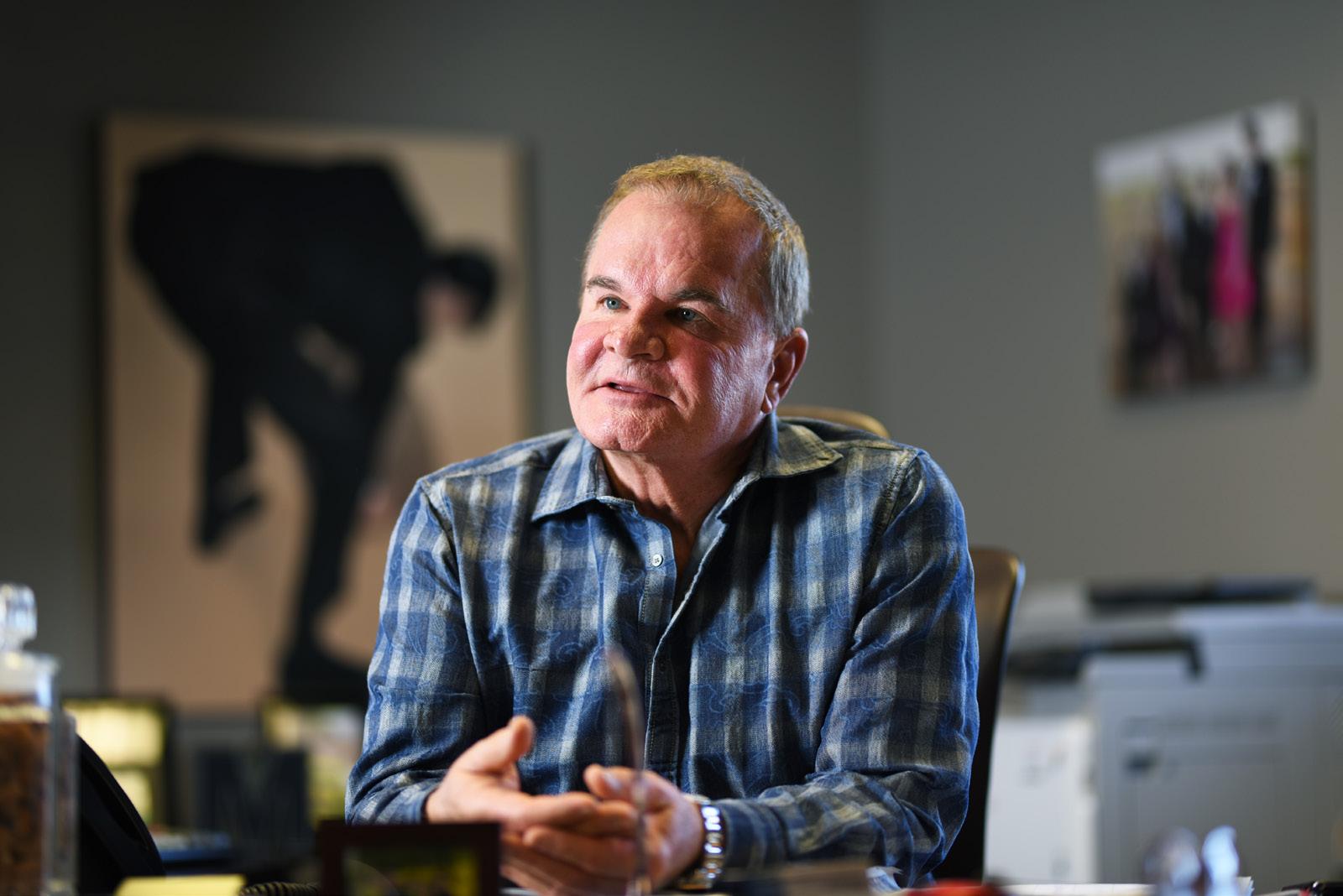
“The only way you can get that [experience] is to live it,” Morton said.
Today, Central Arkansas Nursing Centers has 40 locations that offer extended care, occupational and recreational therapies, and rehabilitation services.
“From Booneville, I was young, you know. Since I had come from a deal where they had seven, I looked at trying to do the same thing those people had done,” Morton said. “Little did I know I would far exceed what they had done.”
He has continued to spread the reach of his company from Booneville to communities around the state. He said his newest facility in Benton, when built, will be his last.
Don Morton began his residence when he stayed with Morton’s mother while she battled dementia and other issues. At 98, he still gets around well, Michael Morton said, and elected to continue his stay after
Morton said the social aspect of longterm care is often not stressed and people like his father frequently flourish with new friends, activities and social occasions. Also, not everyone needs assisted living — many people stay only for as long as they
“They’re not long term,” Morton said. “They could become long term. They can come in, and we offer that. We want them to be able to be offered the therapies and stuff.”
Morton credited the staff he has built through the years. He praised the employees, many of whom become close to their guests and are saddened when they die, for the quality care and for working through challenges like the COVID-19 pandemic, which was especially hard on health care facilities for safety and social distancing reasons.
“The quality of care a lot of times, I think, is tied to retaining those employees,” Morton said.
It is that quality of care that feeds Morton’s confidence in his company.
“No one wakes up anywhere and says ‘You know, it’s nice and sunny out there. I think I’ll go check into a nursing home,’” Morton said. “I want the people who do check into mine, I want the families to feel confident and rest easy that whoever checks in there will be taken care of.”
Garland “Butch” Rice III, president and CEO of Stallion Transportation in Beebe, has a lot of love for his family, his company and his native Natural State.
“To me, Arkansas is just a great place to have a family, to enjoy the outdoors, to start a business and to have success,” Rice said. “I could not have picked a better state to do these things in. I love to spend time with my wife and our family. I also love to fish, hunt and ride horses.”
While Rice puts family first in his life, he is passionate about the trucking industry, where he has slowly but surely worked his way to the top.
“A friend of my father’s introduced me to a gentleman that owned a trucking company in North Little Rock, and I went to work for him at 14, cleaning bathrooms and working in the shop,” Rice said.
At the time, Rice’s father was working for a terminal that saw many fuel trucks coming in and out daily.
“I would go spend time with my dad at his office, and I got to talk to a lot of the drivers, and the driver part of the business was actually what got me excited about trucking,” Rice said, adding that his father taught him the importance of dedication and loyalty.
“When somebody talks about trucking, they typically talk about driving, and there are so many opportunities besides driving in this industry, from working in the office to accounting and safety department operations,” Rice said. “I would encourage anybody that is looking for a field that they can grow in and that is rewarding, I would definitely push trucking.”
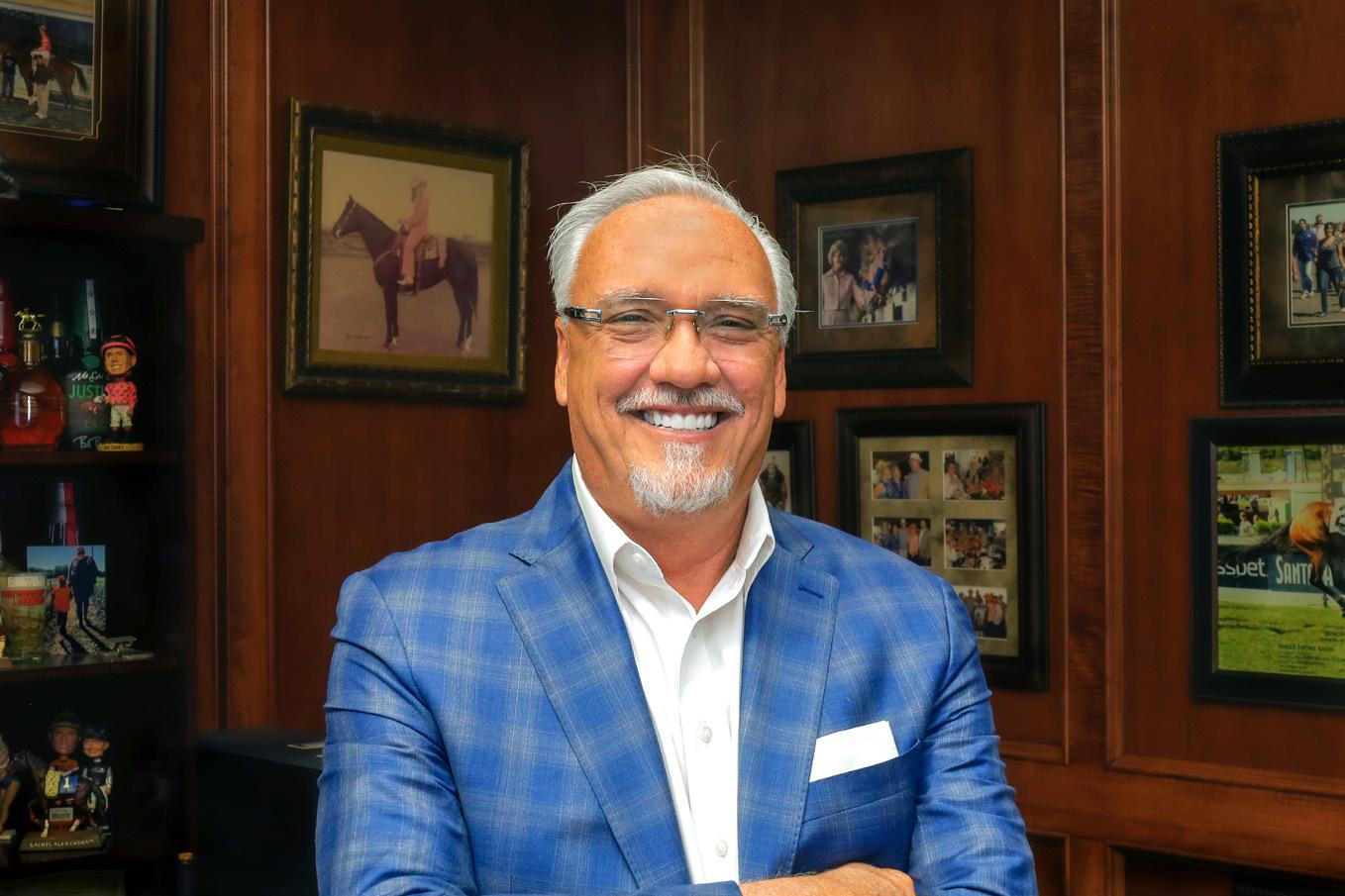
In both life and work, Rice has looked to several great professionals for guidance, including Craig Harper, the former chief operating officer of J.B. Hunt, who retired earlier this year. Rice said Harper’s knowledge and guidance have been a huge help to his
Outside of the 9-to-5 grind, Rice is a big proponent of philanthropic work. He said he considers his charitable endeavors to represent the most meaningful part
“The philanthropy work we do at Stallion is such a big part of who we are,” Rice said. “I think [giving back] is so important to me because of how I was raised. I grew up in a medium-to-low-income home, and I worked for several different companies that I never saw give back to their communities. I always told myself that if I was ever in the position to give back, that it was going to be a top priority for me.”
In 1992, Rice opened Stallion Express, a third-party logistics company, with one other employee. Six years later, Stallion Express was formed as an asset-based full truckload carrier. More than 30 years later, Stallion Transportation Group has 158 employees and annual sales of $75 million.
Throughout his success in the industry, Rice has maintained a passion for leading a moral and Christian-minded company that supports its employees and their families. As Rice puts it, trucking is a unique industry that welcomes change daily. In all of its capacities, the business has continued to keep him on his toes, he said.
Rice is involved in the community in many ways. He has served on the board of directors for the Arkansas Trucking Association since 2005 and currently holds the position of vice president. He also serves as committee chair for the ATA political action committee, as a member of the Arkansas State University-Beebe advisory committee and was appointed by Gov. Sarah Huckabee Sanders to serve on the Arkansas Office of Skills Development Career Education and Workforce Development Board.
Out of all his accomplishments, Rice said he is most proud of his company’s heart and the commitment fostered in employees to strive for success in both work and philanthropy.
When it comes to using one’s platform to elevate the community, a shining example is Donna Terrell, anchor at Fox16 News in Little Rock, who stands out not only for her dedicated news reporting, but for her dedication to nonprofit work in central Arkansas.
Terrell began writing for the school newspaper and yearbook during her high school years in Michigan. She also competed on the forensics team. When she was introduced to TV news in 11th grade, she decided a broadcast career would allow her to combine her passion for storytelling with her love of public speaking.
Terrell’s future plans could have been upended when she became a mother at 16, but her parents were committed to her attending college, she said, so she decided to run, not walk, toward her degree.
“I felt like I had to have my mind made up on the day I arrived,” she said. “On the day I was accepted into college, I needed to know specifically what it was that I was going to do. I didn’t have the luxury of saying, ‘Well, I’m still trying to figure out what my major is.’”
After graduating from Central Michigan University, Terrell worked as an anchor in Detroit until her station closed. She was working freelance when Fox16 recruited her to Arkansas.
“I signed a three-year contract, and I figured that was it — three years, done,” she said. “Turns out it’s been 20 years.”
Terrell has become a beloved member of the central Arkansas media scene not only for her energetic, humorous personality and stories that have garnered Emmy Awards, Edward R. Murrow Awards, an Associated Press award and induction into the MidAmerica chapter of the National Association of Television Arts and Sciences Silver Circle; she is also known for her commitment to community service.
She has volunteered for several organizations, but perhaps the one most dear to her heart is Donna Terrell’s Yoga Warriors Fighting Colon Cancer, which she founded in 2014 to honor her daughter, who died from the disease in 2011.
Not only did yoga help her daughter during her cancer treatment, but the practice also helped Terrell cope with the death of her only child. When Terrell and then-news director Austin Kellerman were discussing a way to honor her daughter’s memory, he suggested a yoga event.
“I was like, ‘Yoga — that’s it,’” she said.
Since then, Yoga Warriors has raised $180,000 for organizations such as CARTI, Goodness Village and 20th Century Club of Little Rock, Terrell said, and there is still more to come. This year, she expects to break ground on Don na Terrell’s Warrior Lodge at Jef ferson Regional Medical Center in Pine Bluff.
“Our motivation has always been, as an organization, to take on projects that I know my daugh ter benefited from or what she could have benefited from, and certainly, this is one of them,” Terrell said. “We admire what’s being done in Little Rock to help cancer patients who need housing or lodging, and Jefferson County doesn’t have anything like that, so this will be the first of its kind.”
Yoga Warriors will also host its annual golf tournament at Maumelle Country Club in October, and the organization hopes to bring back its community yoga event in Little Rock next year, she added.

In her roles as cultural affairs manager for Visit Hot Springs and executive director for the Hot Springs Sister City Program, Mary Zunick wears many hats professionally, but her work usually boils down to anything related to arts and culture in the Spa City.
Originally from just outside of Clarksville, Zunick moved to Hot Springs Village in 2007 and later relocated to Hot Springs proper. For her, Hot Springs is unlike any other city in Arkansas — or anywhere else for that matter.
“If you are at a restaurant or anywhere else, you see people you know, like any other small town, but we have all of these incredible offerings that not all small towns have,” Zunick said. “I’m very fortunate to get to be involved in so many of those activities.”
In 2008, Zunick began her job with the Sister City Program and, in doing so, found her niche.
“I’ve done a little bit of everything, but I’ve been very fortunate in this position. It is something that I enjoy, and I feel like it feeds my soul to be able to take part in these exchanges and connect with people on the other side of the world,” she said.
In leading the Sister City Program, Zunick has a front-row seat to witness the transformation people have when taking part in an international cultural exchange.
“I think the opportunity to learn about another culture firsthand is precious, whether it comes from hosting a student for exchange or being able to travel to Hanamaki, [Japan],” Zunick said.
Hot Springs has long been known for noteworthy events such as the World’s Shortest St. Patrick’s Day Parade and the Racing Festival of the South at Oaklawn Racing Casino Resort. This year, Zunick worked to bring new events to the scene, including the American Craft Sake Festival and the state’s first sumo exhibition.
“Having sumo in Arkansas for the first time was huge, and getting to help bring the American Craft Sake Festival to Hot Springs was also incredible,” she said.
Zunick is involved in the Hot Springs community in numerous ways. She is a founding board member of the Hot Springs Women’s Leadership Alliance and a member of the Rotary Club of Hot Springs National Park and the Downtown Association of
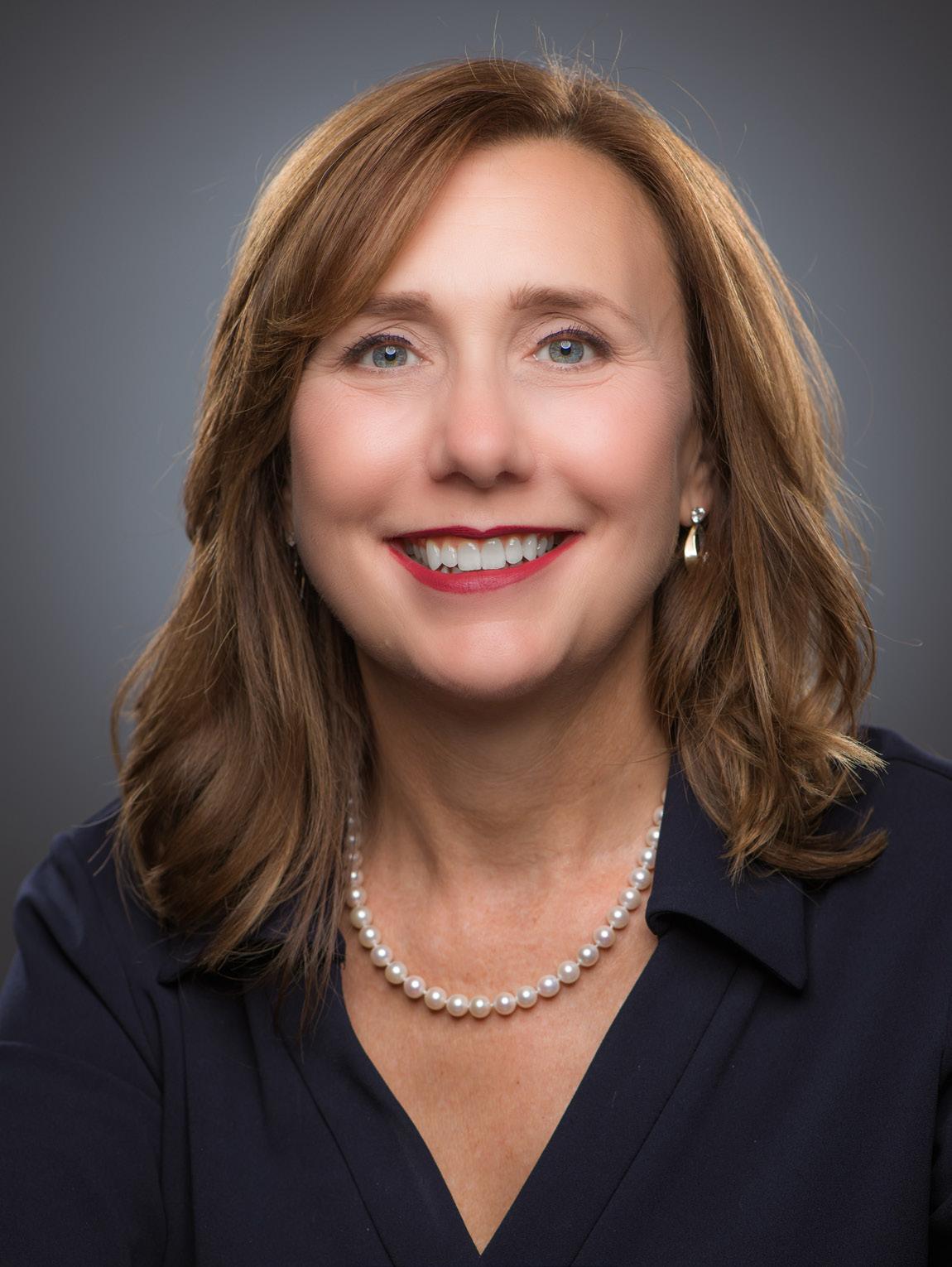
Hot Springs. She also sits on the boards of directors for the Hot Springs Documentary Film Festival and Arkansans for the Arts.
From her work with Hot Springs’ multiple festivals and events, Zunick has been able to encourage learning in hands-on ways.
“I feel very blessed to have these positions,” she said. “So much of what I do for my work is what I enjoy doing outside of work, as well.”
Vicki Stephens still blazing trails for women in trucking in Arkansas
By Dwain Hebda
In 1966, Vicki (Jones) Stephens stunned her father, C.C. Jones, with the announcement that she was not going to college. Her father, founder of C.C. Jones Trucking in North Little Rock, responded to his headstrong daughter by playing hardball.
“When I graduated from high school, my dad had it all mapped out,” she said. “He’d given me a 1966 Mustang for going off to college, and I didn’t want to do that.
I wanted to marry my childhood sweetheart. In order to keep me from doing that, he said, ‘OK, then you go get a job, and you’re going to pay for half of this car.’
I said, ‘OK, that’s what I’ll do.’”
In a show of determination that would become a hallmark of her career, Stephens marched down to Southwestern Bell, interviewed for and landed a job, then came back to inform her father and ask for half the car note.
“He just looked at me in shock and said, ‘Well, I really need some help with my bookkeeping department. Would you consider coming to work for me?’” she said. “I said, ‘Sure.’ It didn’t matter to me. I just needed a job because I now had to pay for a car.”
At that, she let out a knowing chuckle.
“The cost of that car was my future,” she said.
So began the official tenure of one of Arkansas’ pioneering women in trucking, although unofficially, it began almost from the moment she was born.
“My father owned and drove a truck when I was born, and I was an only child for five years,” she said.
“Mother and I would sometimes go with him on the truck. I guess maybe that’s
First of all, don’t give up. It’s just a setback, and it may be a setback for all the right reasons. Maybe it’s not what would have been best for you. We’re human. We make mistakes and things happen, but you learn from your mistakes. You learn from your failures. It’ll be OK as long as you don’t give up and you just keep on going.
when I got hooked was at a very early age.”
As evidenced by the spat over college, there were plenty of opportunities for Stephens to have chosen another route in life, especially given the attitude of the trucking industry toward women in roles of authority — an attitude, it should be said, that was shared in some ways by her father.
“My dad was a Great Depression baby. He always thought women had their place, and my place was not sitting at the dispatch table,” she said. “It was sitting back in the bookkeeping department, where I was overseeing the money and making sure that the money was coming in.
“This all rocked along, and I was perfectly content. I was involved in the school. I even ran for school board and served seven and a half years on the North Little Rock board of education and still worked and did everything that I needed to do and oftentimes took my kid to baseball practice and all the things that mamas tend to do. I just managed to juggle it all.”
By the mid 1980s, C.C. Jones’ partner retired, and in his place, he took on his daughter and Buddy Eubanks, the company dispatcher, as business partners. Things went along fine until one day, an off-the-cuff remark changed the course of Stephens’ life.
I know that I don’t have all the answers to all the problems. I surround myself with people who are a lot smarter than I am, and I allow them to do their job. I just try to lead by example. I just ask them to put forth the effort as if [the company] was theirs, and they do, and it all works.
“My dad was one of a kind. One day, he popped off to me, and he said, ‘Well, I’ll tell you what. If you and Buddy can pay me off in four years, I’ll just retire,’” she said. “I just grinned. Four years to the day [in 1990], I threw him a retirement party. I always said you throw me a challenge, and I will attempt to meet it.”
Stephens was now in very select territory because a woman owning a trucking company was all but unheard
All my life, I have worked for what I thought was right. I haven’t won on every one of them. I’ve had some major setbacks in life, but you know what? As long as you know you’ve done the right thing and you can look at yourself in the mirror and you like what you see, it’s going to be OK.
of in Arkansas at that time. She threw herself into the role to build upon the foundation her father had created.
“When it came down to the opportunity to own part of this business and my dad asked me to do it, to me, that was the ultimate compliment. I said, ‘Of course. That’s exactly what I want to do,’” she said. “Buddy and I set out to continue to keep the business going, and we worked seven days a week. We would swap weekends, and I would do a little dispatching. I just ventured out and started doing new and different things other than billing.”
More than once, Stephens’ strength would be tested by men, both in her professional life and privately. After 29 years, her marriage ended, and around that time, Eubanks sent her legal papers to dissolve the company her father had built due to a loggerhead they reached over his asking price for her to buy him out.
“Going through a divorce was pretty stressful and was pretty expensive,” she said. “The business part was different. [Buddy] told me once when I went in there, ‘It’s not personal. It’s business.’ I went, ‘It’s very personal.’”
Stephens not only prevailed in the transaction, buying Eubanks out at a price to her liking, but she brought her son, Gabe, on board as a partner. This brought the company under sole ownership by the family, and the two have run the company with great aplomb ever since.
“Gabe grew up down here around the office, back in the shop. He grew up around trucks. He said he can remember walking underneath them. He grew up here on East Broadway around the business,” she said. “Now he’s the third generation that owns this company. He is so much like his granddad in the love that he has for it. He wears many hats, and I could not have ever made it
through this stage of the game without him.”
In addition to her ownership of the company, Stephens also blazed new trails in leadership roles through the Arkansas Trucking Association, joining the board of directors, where she was nominated to be the body’s chairman in 2003, the first woman in the group’s 70-plus-year history to do so. She served two terms as chair, displaying a deft touch with the male egos in the room.
“After meetings, we’d go have dinner, and then maybe it would be time to go have a cigar and a drink,” she said. “Well, I might swing by and have a little drink with them, but then I’d leave. I just had enough sense to know that they needed their time and their space to do the male things, and I didn’t need to be interfering with that, so I think I had a little bit of common sense. I think from that, I gained their respect, and they would listen to me.”
One major battle Stephens won during her tenure came in the early 2000s, when a proposal was floated to charge sales tax retroactively on equipment held by Arkansas trucking companies that had not been licensed in the state. Once again, Stephens found a fight that was as personal as it was professional.
“That was going to put a lot of small trucking companies like mine out of business,” she said, “so I had to stand before those people in a board meeting and explain to them the situation that was going to happen to a large segment of the membership of the Arkansas Trucking Association.
“There were a couple that didn’t really care, but there were two in particular that really did care, and they made the motion, and they seconded it, and it passed to fight it. We set about fighting that, and by the time we got to that stage, I was the spokesperson. I could speak about it from my heart because of how it was going to affect the company that my dad had spent his life building.”
Another achievement among many she looks back on with pride was a project taken on with fellow female board member
The concern I have with the kids today is that they come into this world feeling they’re entitled, and they just don’t want to put forth the effort that they need to put forth. It concerns me. I’m working on my 58th year here, and I still come to work four days a week and on my day off sometimes because that’s just what I do. I like to think that I got that from my father.
There’s not really anybody I pattern myself after other than just myself and what I believe in. I have a strong feeling about what I believe is the right thing to do and how to go about it. That includes when you see something that’s wrong or that can be improved. You just don’t sit back and bitch about it, you do something about it. That’s just my personality, I guess.
Marr Lynn Bearden to create a self-insured fund within the association to help member companies deal with the escalating cost of workers’ comp insurance. The program returns dividends to stakeholders in years when money is left over after paying claims, so it has not only reduced costs it has also driven better safety management by participating companies.
“I do believe that Marr Lynn and I played a huge role in making change in the industry because today when you look at the board of trustees for the workers’ comp fund, there are three new women who sit on that board,” she said.
In and amongst the association work, Stephens and her son have sustained the family business through good times and lean. The company hauls perishable food, running 18 trucks and 25 trailers.
“We have a special little niche that has worked out really well for the family,” she said. “We basically haul poultry and products out of Arkansas to California and from California back into Arkansas, Tennessee and this area. We’ve basically done the same route and the same product forever, and we’ve been pretty successful at that.
“The industry has been really good for us because people are going to eat, regardless. Even during [the COVID-19 pandemic], when it was a little slow with schools that were shut down and restaurants that were shut down, we were still able to keep all of our drivers working that needed to work. We were able to get through that fine.”
As she approaches 60 years with the family firm, health issues have caused her to curtail some of her extracurricular activities. Yet Stephens still reports to the office regularly, where she greets drivers, mechanics and shop workers in a tone closer to den mother than boss, which is just how she likes it.
“We’ve made some changes. For instance, we don’t deadhead [pull empty trailers] like we used to,” she said. “We used
to take the load and deliver it, come back to the yard. Now when they leave here and go to California, there’s going to be a load waiting for them in California so they can bring it back here.
“In a lot of other ways, we just do it the same way we’ve done it for all these years. We’re a small company. We’re family oriented. We still basically hire everybody out of Arkansas, and we know so much about our employees and their families. Gabe schedules trip loads around their schedules when possible in order for them to have a family life and family time at home.”
Of all the accomplishments she has enjoyed, longevity might be the sweetest plum of all. Looking around the industry, Stephens can see many more women who have ascended to positions of leadership and authority at trucking companies large and small. She is proud to still be standing among them.
“I like to think that I have my father’s work ethic. He had a difficult childhood, a difficult life, but he worked hard, and he succeeded,” she said. “I truly believe, if people have the desire and the will, that things will work. As a woman, I’ve always been a minority in this industry, but that doesn’t matter. Sometimes it may be a disadvantage, but if you want it bad enough and you put forth the effort and you keep on, the odds of you succeeding are much greater than if you give up.
“Me, I’m just pretty stubborn, pretty bullheaded. If I fall flat on my face, I just pick myself up and brush myself off and go on.”







To borrow a phrase, one is what one drives. According to Fortune Business Insights, the global luxury auto market reached $1.1 trillion worldwide in 2022 and is expected to reach $2.6 trillion by 2030. Collectively, Asia leads the world, but on an individual country basis, the U.S. is without peer, and Americans purchased $7 billion worth of luxury autos in 2022, the market’s best year by far since 2018.
Long a symbol of success, a high-end vehicle speaks volumes about its owner, and when it comes to performance, luxury and prestige, BMW sets the bar for many driving enthusiasts. Arkansas Money & Politics visited with the experts at BMW of Little Rock to discover what those in the know are driving from this legendary brand.

Virtually every carmaker has jumped onto the electric vehicle bandwagon by now, but leave it to BMW to do it in a way unlike anyone else. The i5 sedan debuted last year and has quickly turned the EV world on its head with beautiful styling and punchy, nimble performance that has impressed consumers and the automotive press alike.
“The 2025 i5 offers much the same driving experience as its gasoline-powered sibling, meaning it’s a comfortable and cosseting car with a taste of BMW’s trademark athleticism — minus the sound of a gas engine, of course,” Drew Dorian wrote in Car and Driver. “Like its rivals, the i5 offers an eco-friendliness blended with plenty of luxury.”
The technological appointments, driven by Operating System 8.5 and controlled using a sweeping panoramic dashboard panel, are all the more impressive, considering it shares the same power source as the one driving the car. BMW’s next-gen batteries deliver a range between 266 and 295 miles, depending on car model and conditions, and recharge in less than 10 hours.
The all-electric i5 offers two power plant models: the eDrive 40, which delivers 335 horsepower and 295 pound-feet of torque, and the dual-motor xDrive 40, which offers 389 HP and 435 LBFT torque. Those seeking something a little less pedestrian should seriously consider the i5 M60 model, which, with 593 horses and 586 pound feet of torque, redefines performance in the EV space.
Another benefit: The i5’s reasonable starting price ($67,000 to $84,000 depending on model) allows those still climbing the ladder of success to show the higher-ups their good taste (and social consciousness) without sacrificing savings or breaking the bank.



Motor: All electric single (e40); double (x40/M60)
HP: Up to 335 (e40); up to 389 (x40); up to 593 (M60)
0-60: 5.7 seconds (e40); 5.2 (x40); 3.7 (M60)
Range: 240 to 295 miles depending on model and driving conditions
Charging: Less than 10 hours
Starting MSRP: $66,800 (e40); $70,100 (x40); $84,100 (M60)
Source: BMWusa.com

There are cars one buys and cars one covets, and when it comes to pure performance, the M8 Competition coupe is without peer in the BMW lineup. With a reputation as sterling as BMW’s, it is difficult to single out one model that represents the pinnacle of the German carmaker’s art, but the M8 Competition comes mighty close.
Sleek, overtly powerful and incredibly nimble, the model brings together everything the company is known for wrapped in a package that screams success.

“BMW’s V8 in its full-on M machines is a combination of so many qualities that’ll make an enthusiast giddy, and it shines particularly bright in the M8 Competition Coupe,” Zac Palmer wrote at autoblog.com last summer. “Press the red start button, and it barks to life with an authoritative bite that clearly marks its dominance over BMW’s inline-sixes. If you like muscle, you’re going to like this sound.”
A growling 4.4-liter V-8 engine delivers 617 horsepower and 553 pound-feet of torque that races 0 to 60 in an eye-popping 3 seconds. The 8-speed M Sport automatic transmission gives the driver options from smooth to aggressive thanks to the three-stage Drivelogic shifting system. It also comes standard with Adaptive M Suspension, yielding superior handling and an impressive amount of control while offering different driving modes to suit one’s mood.
BMW engineered everything about the car to reflect the high-performance angle, and that extends to the interior. More elegant than plush, it nonetheless offers ambient lighting, a next-level Harman Kardon premium sound system and a feature-rich infotainment system. As nice as those all are on their own, there is no question that what really pays the bills in the M8 Competition is the monster under the hood and the joy of letting it rip.

Engine: 4.4-liter V-8 M TwinPower Turbo
HP: Up to 617
0-60: 3 seconds
Transmission: 8-Speed sport automatic (paddle manual available)
Mileage: 15/22 mpg
Starting MSRP: $138,800
Source: BMWusa.com
The unquestioned flagship model of the BMW line, the 7 Series, needs little introduction to those accustomed to the finer things in life. What makes the car such an enduring symbol of success is BMW’s relentless drive to keep up with times. Although many writers mention how the current model hearkens to earlier body styles, there is nothing stodgy or outdated about the many appointments the car offers.
The cabin is overflowing with technology that entertains and connects the occupants (including an optional 31.3-inch rear-seat theater screen that deploys from the ceiling) while also bringing unsurpassed control to the driver’s fingertips. All of that can be enjoyed while wrapped in supple leather or available cashmere upholstery and metal or exotic wood trim.
Precision engineering is a given when buying a BMW, and the 7 Series is no exception, even though the models focus more on comfort than white-knuckle performance. Current configurations offer the driver a range of gas, hybrid and even all-electric options via the i7 series.
A 3-liter inline-six engine offering 375 horses is base, but that is by no means the ceiling on guts. The plug-in hybrid, for instance, runs on a 483-horsepower powertrain consisting of a turbocharged 3-liter inlinesix and an electric motor, while the attention-grabbing 760i xDrive boasts a 536-hp twin-turbocharged 4.4-liter V-8. In every configuration, the car delivers a silky ride under all driving conditions.
Making a statement from every angle, the 7 Series immediately tells the world something about the owner. If the M8 Competition speaks of those with a taste to race, the 7 Series is the calling card of those who have already come in first.



740i/740i xDrive/760i xDrive
HP: Up to 375 (740i/740i x); up to 536 (760i)
0-60: 5.2 (740i); 4.9 (740i x); 4.1 (760i)
Mileage: 25/31 (740i/740i x); 18/25 (760i x)
Starting MSRP: $96,400 (740i); $99,400 (741i x); $121,300 (760i)
750e hybrid/i7 eDrive50, 60/M70
HP: Up to 449 (750e); 449, 536 (i7 eDrive 50, 60); 650 (M70)
Range: 274-321 miles, depending on model and driving conditions
Charging Time: Less than 10 hours (750e); 12 hours (i7 eDrive50, 60/M70)
Starting MSRP: $107,000 (750e); $105,700(i7 eDrive50); $124,200 (i7 eDrive60); $168,500 (M70)

xDrive40i/M60i/XB7
HP: Up to 375 (40i); up to 523 (M60i); up to 631 (XB7)
0-60: 5.6 (40i); 4.5 (M60i); 3.9 (XB7)
Mileage: 20/24 (40i); 16/20 (M60i); 16/20 (XB7)
MSRP: From $83,500 (40i); from $110,900 (M60i); from $152,400 (XB7)
Source: BMWusa.com
Even CEOs have to shuttle the kids to soccer now and again, but that is not a reason to sacrifice. BMW proves that point via the X7, a workhorse that gets the chores done while still delivering all of the engineering and luxury one would expect.
Let’s face it, an SUV is not made nor can be expected to compete with a high-performance coupe but is judged on spaciousness and creature comforts compared to other vehicles in its class. Thus, X7 engineering focuses on ride, handling and cabin appointments, and it shows. Standard two-axle air suspension provides driving comfort, while the adjustable height allows for easier entry and loading. A panoramic glass roof, standard, adds to the open, spacious feel.
Occupants are also protected by a range of safety features; the 2025 models include active blind spot detection, frontal collision warning with city collision mitigation and lane departure warning. Also available is a highway assistant with

active lane change, part of the Driving Assistance Professional Package, which allows for hands-free driving up to 85 miles per hour.
The onboard technology inherent to the X7 is equally focused on the convenient and practical. Voice-activated apps and various customizable features of the sprawling panoramic display allow for easy operation. A mobile app provides up-to-theminute diagnostics, mapping and remote engine start at the touch of a smartphone.
The X7 comes in three models: the base xDrive 40i, the mid-range M60i and the top-of-the-line XB7, the latter of which offers a muscular 4.4-liter BMW Alpina bi-turbo V-8 capable of generating more than 600 horsepower and covering 0 to 60 in 3.9 seconds, just in case others get the idea drivers have settled down entirely.
Savoring Your Success is a monthly feature that offers the best in life for those who have reached the top or are well on their way. Each issue, Arkansas Money & Politics showcases the ultimate accouterments to success, from fine wine and exclusive experiences to high-performance vehicles and more.
When it comes to retirement planning, there is a lot of advice and anxiety circulating in equal measure. For those still early on in their careers, the end of one’s working life can seem too distant to commit any real thought towards. For others approaching that golden age, there might be uncertainty around what it takes to be truly ready for the transition. All these considerations make it essential to consult with an expert, such as the professionals at Trek Wealth Solutions, a division of Registered Investment Advisor, Sowell Management.
“When most people come in and they start talking about retirement, everyone seems to ask, ‘How much do I need to retire?’” said Miki Morrow, client relationship manager at Trek Wealth Solutions’ northwest Arkansas office. “The answer is always, ‘It depends,’ because it depends on their spending habits. It depends on their goals. It depends on the choices that they’ve made previously in order to prepare for retirement.”
gressively and never worried about market fluctuations. Then the day they retire, all of a sudden they’re extremely emotional about every single move in the market,” said John Davis, an advisor at Trek Wealth’s Little Rock office. “That’s where you make mistakes, because you abandon the strategy out of fear, or you liquidate at the bottom of a market because you just can’t take it anymore. That’s where a professional comes in to help maintain those emotions. I tell people sometimes, I’m as much of a therapist as I am an investment professional, because sometimes you just need to talk those fears out with somebody who is thinking maybe a little more levelheaded than you are about your own personal savings.”
...you can live your life and accomplish some of your goals through smart planning and working with people who think that way, who allow you to actually experience your life now. That’s why the company was named Trek Wealth. It’s about the journey.
The unknown is a major contributing factor to retirement-based worrying, and it can manifest in many different ways. The strength of one’s retirement plan can allay some of those concerns, since a solid strategy is designed to weather market fluctuations and unexpected life events. Still, retirement gives people more time to ponder everything that could go wrong, which can shake even the surest investors.
— Erin Taylor, Sowell Managment
To stand out from the bevy of other retirement planning strategies on the market today, the team at Trek Wealth Solutions proposes a different approach. Dubbed “Bucket List Living,” the strategy separates a client’s assets into four different groups, or buckets. The first, the liquid cash bucket, covers short-term needs over the next one to three years. Next is the lifestyle bucket, typically made up of low-risk assets and looking towards the next four to seven years. The lifetime bucket, over a horizon of eight years and beyond, is aimed at long-term needs, while the legacy bucket is where clients can plan for what they will leave to future generations.
“You might have a client that for 25 years invested extremely ag-
“We create different investment strategies for when you’re going to need those funds,” Morrow said. “If you have a little bit
more time, you can take a little bit more risk with those sets of funds that you’re not going to need for years four to seven. But you don’t want to invest it with too much risk, because you may need it a little sooner, or you don’t have time for the historical 10-year window of the fluctuation of the market. The third bucket is going to be your eight years and further, so you’re going to take more of a growth approach with those.”

The name Bucket List Living, however, speaks to a deeper mo tivation behind the strategy. Life does not start after retirement, after all, and there will be vacations to take, milestones to reach and goals to achieve in the meantime. Trek Wealth’s approach is designed to help clients live in the moment and cross items off their bucket list throughout their lives, not just after their working years are behind them.
“One of the things I really like about this concept is that it’s re freshing,” said Erin Taylor, managing director of marketing and communications at Sowell. “It allows you to actually think that you can live your life and accomplish some of your goals through smart planning and working with people who think that way, who allow you to actually experience your life now. That’s why the company was named Trek Wealth. It’s about the journey.”
Those buckets, in addition to serving as a handy visualization tool for where one’s money is going, is also a useful reminder of the “why” behind all those savings. Trek Wealth’s goal is to figure out what is truly important to a client’s life — not reaching a certain number on an investment portfolio, but the experiences and life one builds along the way. Even with the legacy bucket, there are ways of shaping one’s plan to maximize meaning, rather than money.


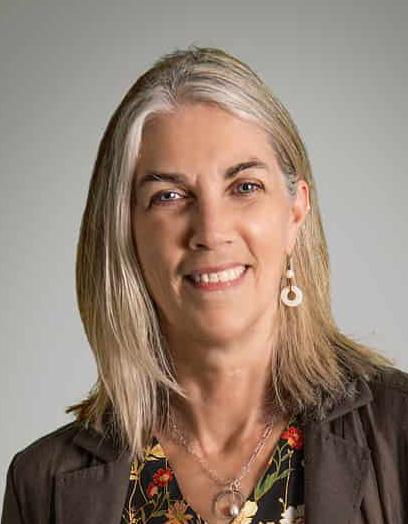
“The way we lay it out really fits someone getting close to retirement and looking for that comfort because when that income goes away, it’s an uncomfortable moment,” Davis said. “I find that people are more likely to not spend in that first couple of years because of the fear. That’s exactly what this strategy does is stress test what they have for retirement, put a plan together and get them enjoying their life because it typically takes a year or so for a lot of clients to be comfortable going out and spending that. Knowing that they can survive without that income takes time to accept. I think this accelerates that with a plan in place.”
The bucket approach is also flexible in the face of changing circumstances, whether those are due to needing money sooner than expected or simply adjusting one’s long-term vision for the future. Doing the legwork up front and being intentional with one’s initial plan, Morrow said, opens up possibilities and makes it easier to follow through on that plan as time wears on.
“One of the things I strongly encourage our advisors to talk about is that concept of a living legacy,” said Sowell President Daryl Seaton. “You’re planning on leaving dollars to the family, resources to the family, to your kids, your grandkids. How about using some of those while you’re alive, while you’re healthy, to go out and take the entire family on a trip or help your grandchildren with a down payment on a home?
“Those are great examples of enjoying your legacy with your family versus waiting until you are gone. You can make a big impact. It comes down to understanding what truly are the valuable things to these families and then using those buckets accordingly. Is the legacy bucket a little bit smaller that’s going to go to the kids? Yeah, but I think they got something of greater value by getting to enjoy it with them.”
Bucket List Living has other advantages, as well. Like much of financial planning, there is an element of psychology involved. Positive reinforcement can go a long way towards encouraging one to stick to the plan, and Trek Wealth’s bucket approach gives clients the ability to spend with confidence within each of those timeframes. The goal, as Davis explained, is to have a purpose for every dollar.
“We try to recreate the ‘what-if’ scenarios: If this were to happen, then this would be the impact on your different buckets, so what does that look like?” Morrow said. “They may decide, ‘OK, well, we want to take this money. What would it look like if we decide to buy a vacation home? What would that do to our retirement?’ If we have the roots of their financial planning in place, then we can continue to monitor that as their life situation changes, if they decide to retire early or work longer, and what that means.”
While a Trek Wealth Solutions advisor will be able to help one map the ins and outs of a specific plan, getting started with Bucket List Living can be as simple as putting down on paper — in a notebook, on a whiteboard or even a vision board — those bucket list items. Whether it is trips to take, experiences with family and friends to have or certain impacts one wants to have through a financial legacy, knowing what is most important allows one to put more energy into those dreams earlier on.
“Whether you follow this approach with us or do this on your own, planning to include some fun in your financial planning, planning some bucket list milestones in there, makes planning fun,” Seaton said. “Then people will actually follow through and do it. If you make it this nebulous thing that’s gonna happen 30, 40 years from now, it’s really hard to get motivated when you’re younger and you’re dealing with the bills and the children and the school and all the crazy stuff that’s going on in life. Whether you’re planning or not, you’ve got to enjoy life. This approach allows you to do that.”
When the subject of U.S. tech incubators comes up, downtown Little Rock is probably not the first hotspot that springs to mind, or even the second or third. The Little Rock Technology Park, however, has been quietly helping tech entrepreneurs bring their visions to life and shaping the central Arkansas startup ecosystem since 2017.
This summer, the Tech Park will embark on phase 2 of its multi-part master plan, and sub-phases will come online as needed. The new phase will be geared toward tech-related tenants who are not quite ready for regular commercial office spaces but need more space than is currently available.
Brent Birch, LRTP’s executive director, whittled the park’s concept down to “an office facility specifically dedicated to housing technology-focused companies.” Tech park tenants have represented a wide range of life cycles, from a gleam in someone’s eye to a going, growing startup.
Success stories abound, Sullivan Wright Technologies, Servato Corp., Bond.AI, Data Driven Partners, Sequretek, WhiteRock and Rock City Digital among them. Birch said the Tech Park serves startups by bringing together like-minded people under one roof, where casual interactions and relationships can spark creative ideas.
“Lexamica recently moved on to a bigger space on President Clinton Avenue,” Birch said. “Our biggest success story to date, Apptegy, outgrew us before we were even able to open on Main Street. Jeston George started working by himself out of our space when we were in the Statehouse Convention Center. Before you know it, he took over a large facility in the Riverdale area with well over 300 employees.”
This mingling of expertise can help break through dense problems. The park mission also includes counseling, programming and financial advice and, of course, space available for meetings and presentations.
Plus, there is really good coffee. Birch said this kind of everyday interplay does not happen on a couch at home with
leaf blowers blaring. The Tech Park offers private, totally enclosed office spaces, as well as semi-private offices with open tops and glass walls. Workstations are available for people who are not completely ready to commit to an office but thrive in a dedicated workspace, and there are phone booths on every floor for privacy.
“Our blend of tech companies of different shapes and sizes creates a kind of ecosystem where idea sharing and mentorship can easily take place,” he said. “It’s widely recognized that this brand of tech community can be critical to helping companies succeed.”
The overarching goal behind the park is to boost the tech startup ecosystem, from spurring new ventures to attracting fledgling efforts to central Arkansas. In partnership with the Venture Center, the entrepreneurial resource provider that calls

The
counseling, programming and space for meetings and presentations. Plus, there is really good coffee. (Photos by Steve Spencer)
LRTP home, the park has successfully recruited companies from places such as Atlanta, New York, New Jersey, New Orleans, St. Louis and Austin.
The long-term goal of the park is to continue that trend. Instead of Arkansas entrepreneurs fleeing to Austin, Dallas or Nashville, why not foster an environment where technology companies and talent — local or otherwise — can succeed in central Arkansas? To that end, extensive renovations for phase 2 expansion are underway inside the building at the corner of Capitol Avenue and Main Street in downtown Little Rock, next door to the existing LRTP building.
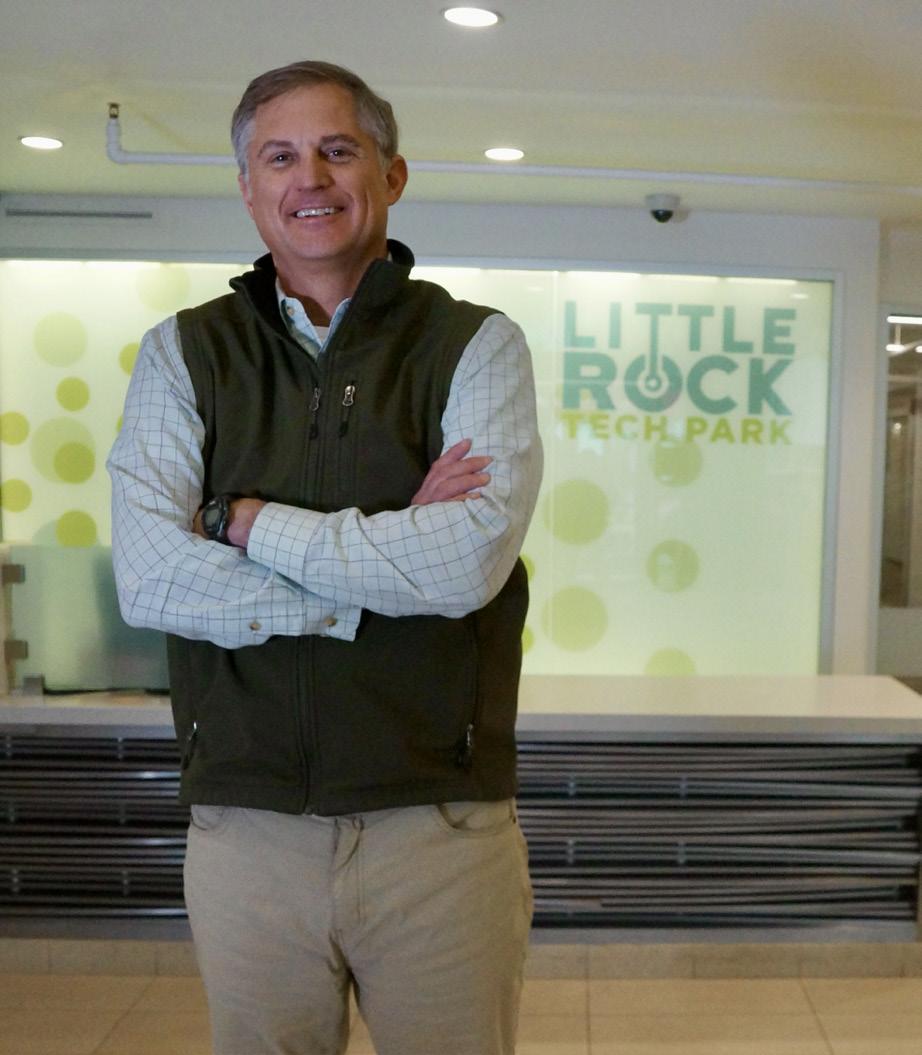
Christopher Wright, a partner at Sullivan Wright Technologies, said the possibility of expanding his company’s footprint is a huge positive.
“We’ve been in the tech park in some fashion since it opened, growing from a small office on the third floor to two larger offices on the fifth,” he said. “The meeting spaces make this a great place to bring clients and partners.”
Phase 2 plans include a state-of-the-art conference center and more meeting spaces.
“The park’s central location means we can hold a structured meeting here and then head out and walk to a restaurant down the street for a social hour afterwards,” Sullivan said, adding that is where the real work gets done.
Chris Mangum moved his company, Servato, to Little Rock from New Orleans two years ago. Servato has an operations facility in Nashua, N.H., and additional employees in Boston and Dallas, but Magnum was looking for a way to move closer to his aging parents. He said he loved the atmospheres of tech-centered spaces in more well-known tech hubs and poked around, looking for something like that in Little Rock.
“The flexibility of an affordable, month-to-month lease here and the bundled offering of Wi-Fi, cool office space, printing, conference rooms and the growing community of entrepreneurs was a powerful inducement to get me invested here,” he said. “With the expansion going on in phase 2, I think we could stay in the tech park for some time as we grow our local presence.”
Mangum said downtown Little Rock has momentum and cited the area’s restaurants and cultural centers, as well as the “sense of belonging” beginning to envelop the area, as major pluses.”
“This place is a great attraction for the kind of talent we look
“Our blend of tech companies of different shapes and sizes creates a kind of ecosystem where idea sharing and mentorship can easily take place.”
— Brent Birch, executive director of the Little Rock Technology Park
to recruit for Servato,” he said. “I have even joined the Downtown Little Rock Rotary Club. I’ll be the incoming program chair in July.”
Another growing park success story is Christopher Wright’s Central Arkansas Hackers, a grass-roots cybersecurity networking and mentorship group.
“We have our monthly meetings in the building,” he said. “It’s a great meeting place for the burgeoning tech workforce in Little Rock.”
Birch said the ongoing revitalization of downtown Little Rock, the renovations and updating of available office space, and the growth of residential properties and retail works hand in hand with resources such as the tech park. This adds to the feeling that something truly exciting is going on downtown
“We hope this rolling expansion causes people to step back and realize that they really do not need to move to Dallas or Nashville or Austin or anywhere else,” he said. “A secondary focus of phase 2 is to help us to recruit more companies to come to central Arkansas and figure out what a great place to grow this is, that they’ll have access to capital and a skilled workforce.”
There is no one factor that makes the technology sector take off in a specific geographic location, so why not Little Rock?
“Tech is such a multidimensional, interconnected animal,” Birch said. “We’re aiming to supply all the ingredients that attract tech-minded businesspeople here. Phase 2 will supercharge our ability to leverage the resurgence of downtown Little Rock and boost our area’s whole economy.”
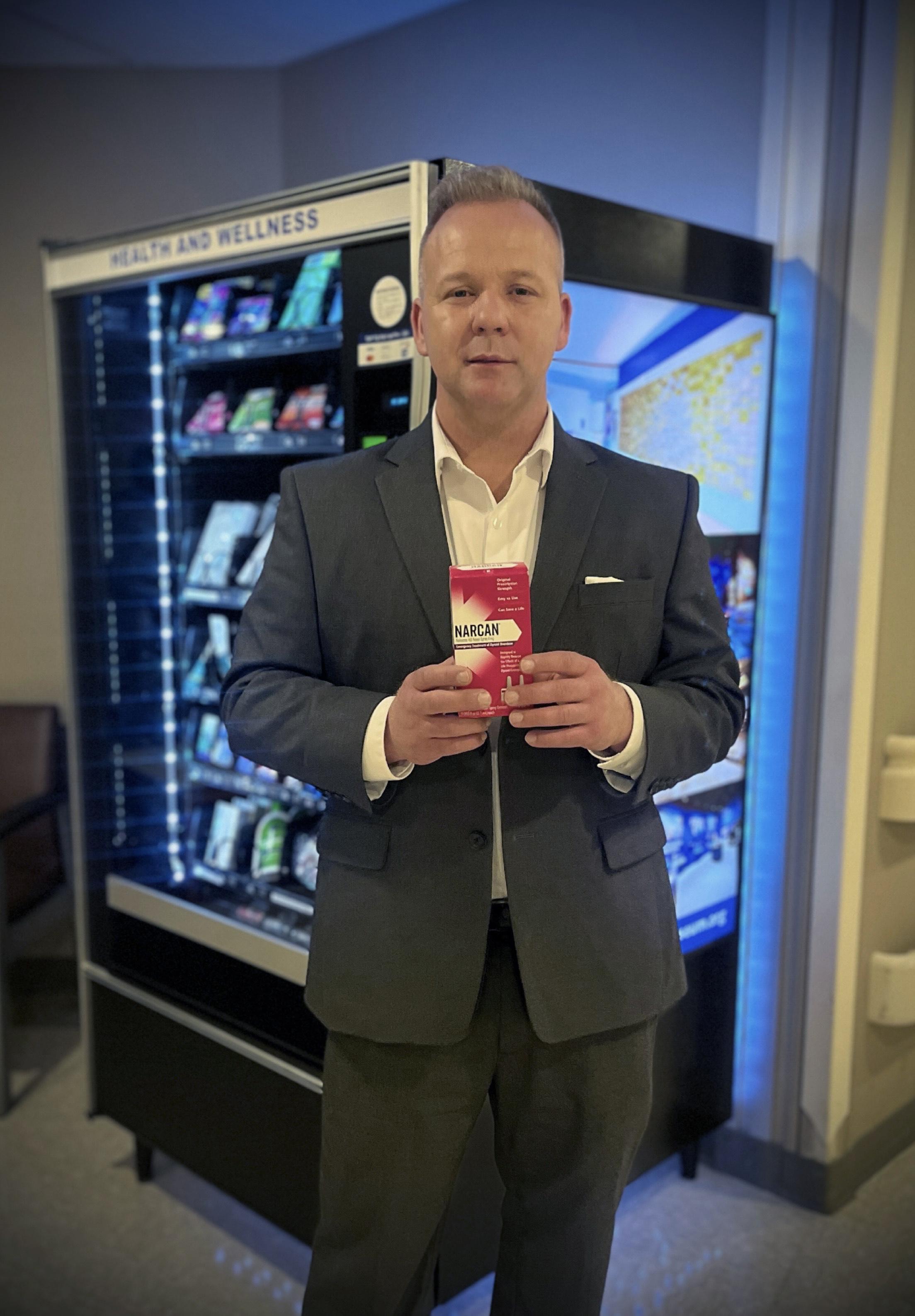
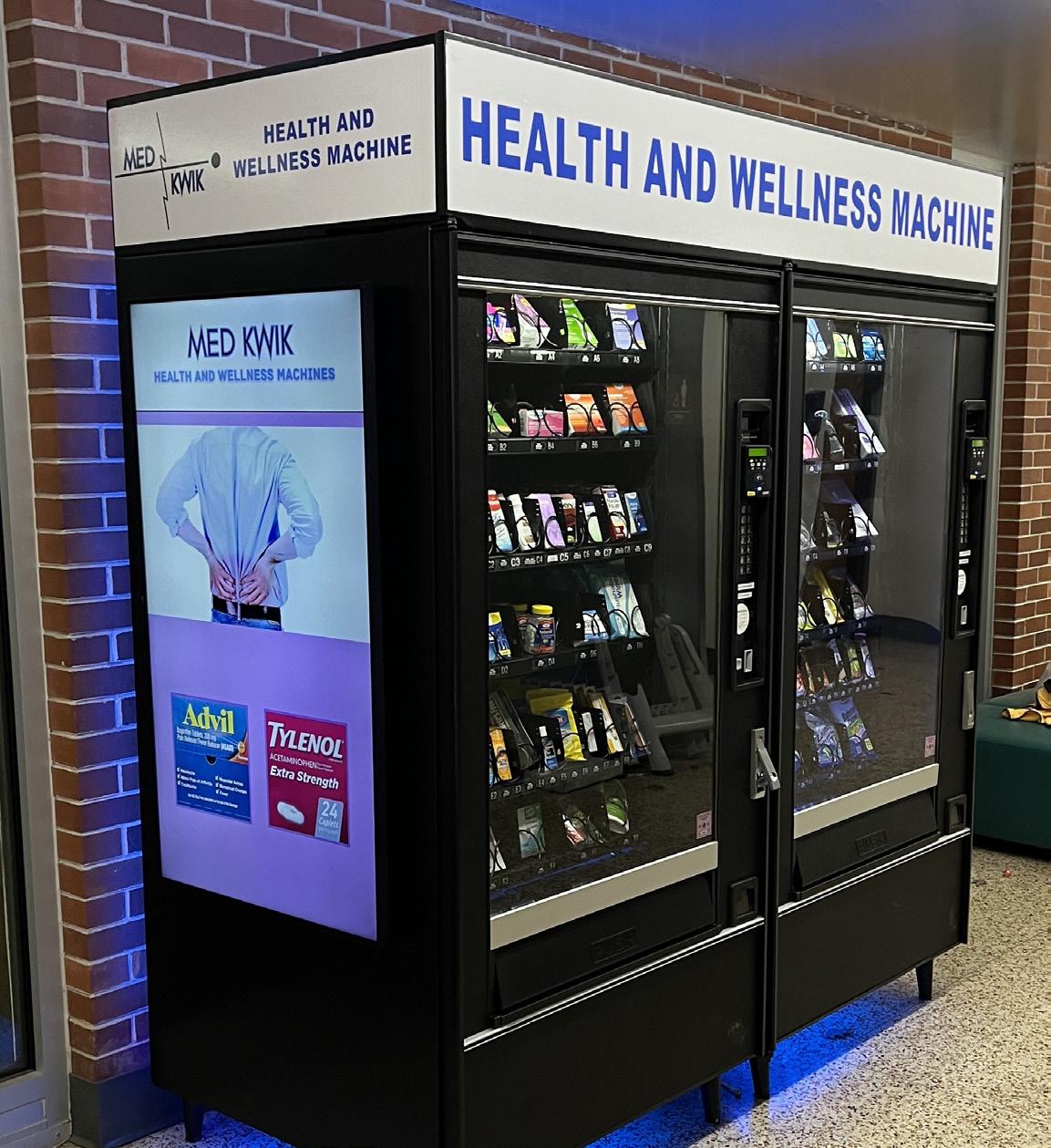
What makes it a family enterprise is the involvement of the Whittingtons’ two children: Nate, 17, and Avery, 15. The idea was Avery’s, Gary Whittington said, and Nate’s coding and technical expertise was applied in the development of a digital display on the side of the machines, for which a U.S. patent is pending. The displays will include instructions, public health announcements and related messages of awareness.
In addition, Nate, a National Merit finalist at Van Buren High School who is listed as co-inventor on the patent, is developing a push-button audio guide for using Narcan that is integrated directly into the machine and will provide step-by-step instructions for how to use the spray.
spray used to treat opioid overdose emergencies.
Meanwhile, Avery, the 2024 Miss Western Arkansas’ Teen, changed her pageant platform to the opioid crisis and launched a community service initiative called “You Can Save a Life” that
aims to increase Narcan awareness and make Narcan more accessible through Med Kwik. She was motivated to do so by an overdose death at her school and a near miss in which a student ate a snack that he did not know had been laced with fentanyl.
In her platform statement for Miss Arkansas’ Teen, she wrote that she could have helped her classmate immediately if Narcan had been available on the scene. Fortunately, help arrived in time, and Avery is intent on increasing education and access.
“It’s been really cool seeing them embrace this like they have,” Gary said. “We couldn’t have done it without them.”
Rebecca and Gary are the former pharmacist-owners of Medi-Quik Pharmacy in their hometown of Mulberry about 25 miles east of Fort Smith in Crawford County. The startup name was spun off from it. Rebecca, who still works part time behind the counter at Coleman Pharmacy of Alma, handles the startup’s accounting operations, and Gary is a clinical pharmacist at Mercy Hospital Fort Smith.
The Med Kwik machine on the ACHE campus is the first and, for now, the only one in Arkansas to dispense Narcan. That should soon change. Gary Whittington said Med Kwik is working with the office of Tom Fisher, the state’s drug director, to roll out 10 to 20 Narcan-only machines across the state by September. Also, a recent partnership with Fort Smith’s Harbor House will place Narcan-only machines throughout west-central Arkansas, where opioid abuse is among the highest in the state. Charity sponsors include the United Way, Ronald McDonald House Charities of Arkansas & North Louisiana, and the Good Samaritan Clinic in Fort Smith.
Med Kwik is working to secure federal grant funding that would enable it to dispense Narcan for free. Otherwise, the cost is $44 per box. Whittington said the Narcan-only machines should be distributed throughout the state by September, and colleges and universities are primary targets.
Whittington said many people, including those who would do so with the intention of having it available for friends, do not buy Narcan because they are afraid it will identify them as drug users.
“There’s still a little bit of a stigma,” he said. “People are scared to carry it. They’re afraid that if they get pulled over, the police will assume they are illegal drug users, even if they just have it on hand for a friend, but it’s really no different than carrying a first aid kit with you. It will be huge in helping people who want to be proactive. Normalizing the Narcan will empower people and make them more confident, and that could save lives.”
Med Kwik’s machines are filled with products specific to their locations. For example, machines in hotels might include toothpaste and toothbrushes and similar items that travelers often forget to pack, or machines in airports might include nausea medicine and even phone chargers.
Currently, Med Kwik has 21 machines at ACHE, the University of Arkansas at Fort Smith, Fort Smith Regional Airport, Arkansas Tech University in Russellville, ATU’s Ozark campus, the University of the Ozarks in Clarksville, North Arkansas College in Harrison, Mercy Hospital Fort Smith, Baptist HealthFort Smith, and Northeastern State University and Northeastern Health in Oklahoma.
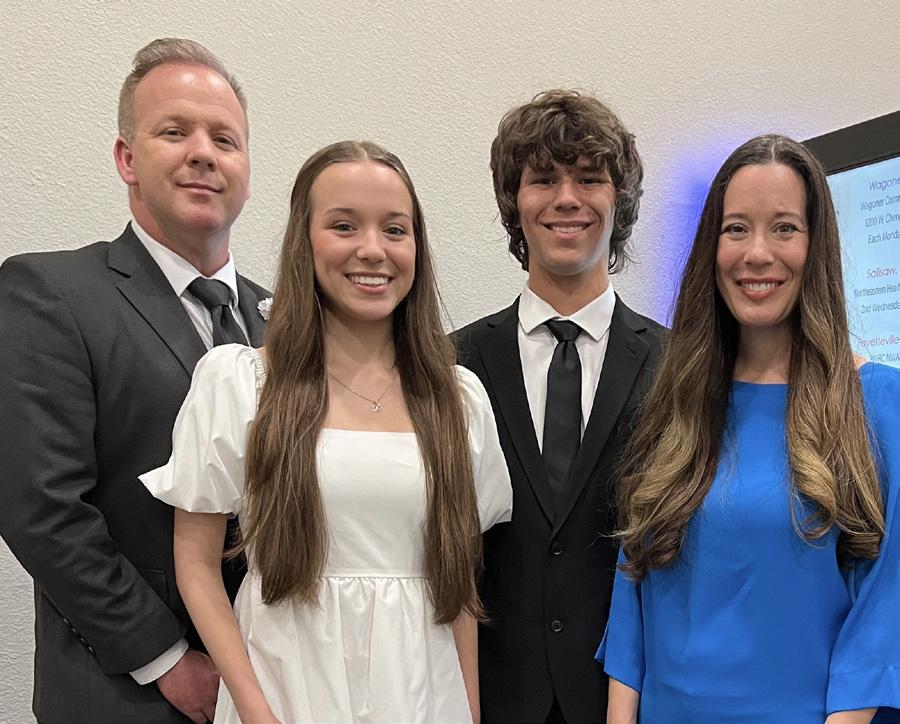
Of the more than 106,000 overdose deaths in the United States reported by the federal Centers for Disease Control and Prevention, 75 percent involved the use of at least one opioid. In Arkansas, data from the state Department of Health’s Vital Statistics reports 487 overdose deaths in the calendar year 2022 alone.
Whittington does not believe Med Kwik is providing the solution to the opioid problem, officially classified as an epidemic. He is confident, however, that making Narcan available quickly, discreetly and, most importantly, for free, will make a difference.
“We want to try a more proactive approach and offer Narcan for free to those who need it,” he said, noting as helpful a change in the law that protects individuals who call in drug overdoses from having drug charges filed against them. “The advantage of these machines is that it allows for a little bit of discretion and privacy. I think it’s going to be huge, especially in our area. Sebastian County was No. 1 in the state for total overdoses in 2023.”
Whittington said a deal is in place to bring the machines to the University of Arkansas for Medical Sciences in Little Rock by the end of June, and another is being finalized with the University of Arkansas in Fayetteville.
Plus, Mercy recently agreed to place Med Kwik machines in all 17 of its hospitals in Arkansas, Missouri and Oklahoma.
Whittington and his wife launched the startup in March 2023, and there has not been a slow day since, he said.
“The interesting thing about Med Kwik is that we rolled all of this out in about six months,” he said. “We would be the first ones in the state to place Narcan in vending machines free for public use. Each state that borders Arkansas is using vending machines in this same way, and they’ve had so much success with it.”
In addition to the simple business smarts of providing vending-machine access to OTC and other personal health items, Whittington said he believes the Narcan machines will provide much needed access and education to a population desperately in need of both.
“At first, everyone took the stand that we had to prevent opioids — we can’t have them,” he said. “We’re to the point now where it’s here, and we have to figure out a different method. We need to have [Narcan] available. Eventually, it will be mandated in all public areas. The paradigm has shifted from prevention to dealing with the effects, and these machines will help to localize that.”
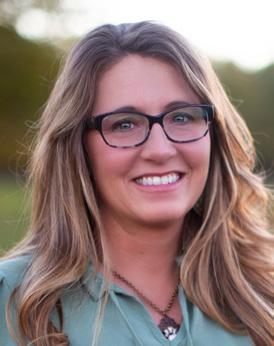




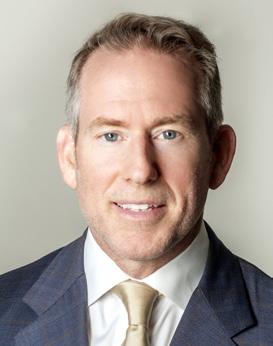

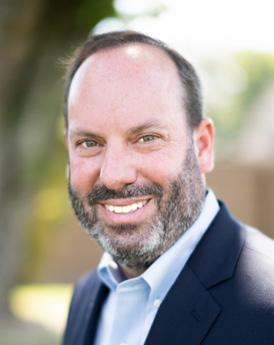
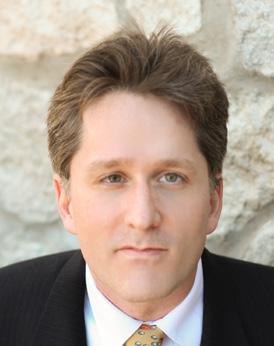
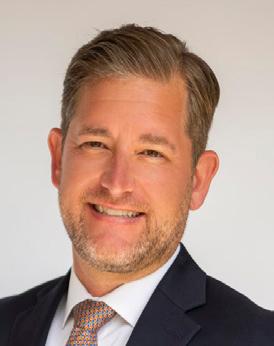
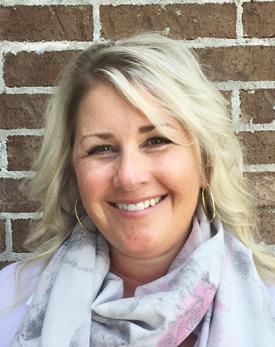
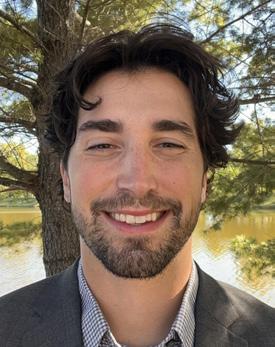
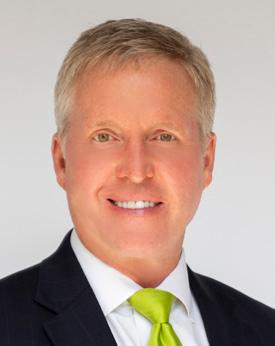



Who are Arkansas’ most influential up-and-comers? Who are the future drivers of the Arkansas economic engine, of policy and culture? Help us determine who the state’s real drivers are shaping up to be. Your vote will help us determine the 2024 Arkansas Money & Politics’ Future 50. This list will be featured in the July issue of AMP.
Nominate your favorite Future 50 by visiting armoneyandpolitics.com and go to the “nominate” tab.
Nominations close May 25.
At OrthoArkansas, we are dedicated to providing comprehensive, holistic care for individuals dealing with rheumatic diseases and musculoskeletal disorders. At our Rheumatology center patients can receive their treatments, infusion, labs and imaging all in one place.
Rheumatology Center Now Open Infusion Center on-site.
Ask your provider for a referral.
O
501-500-3500
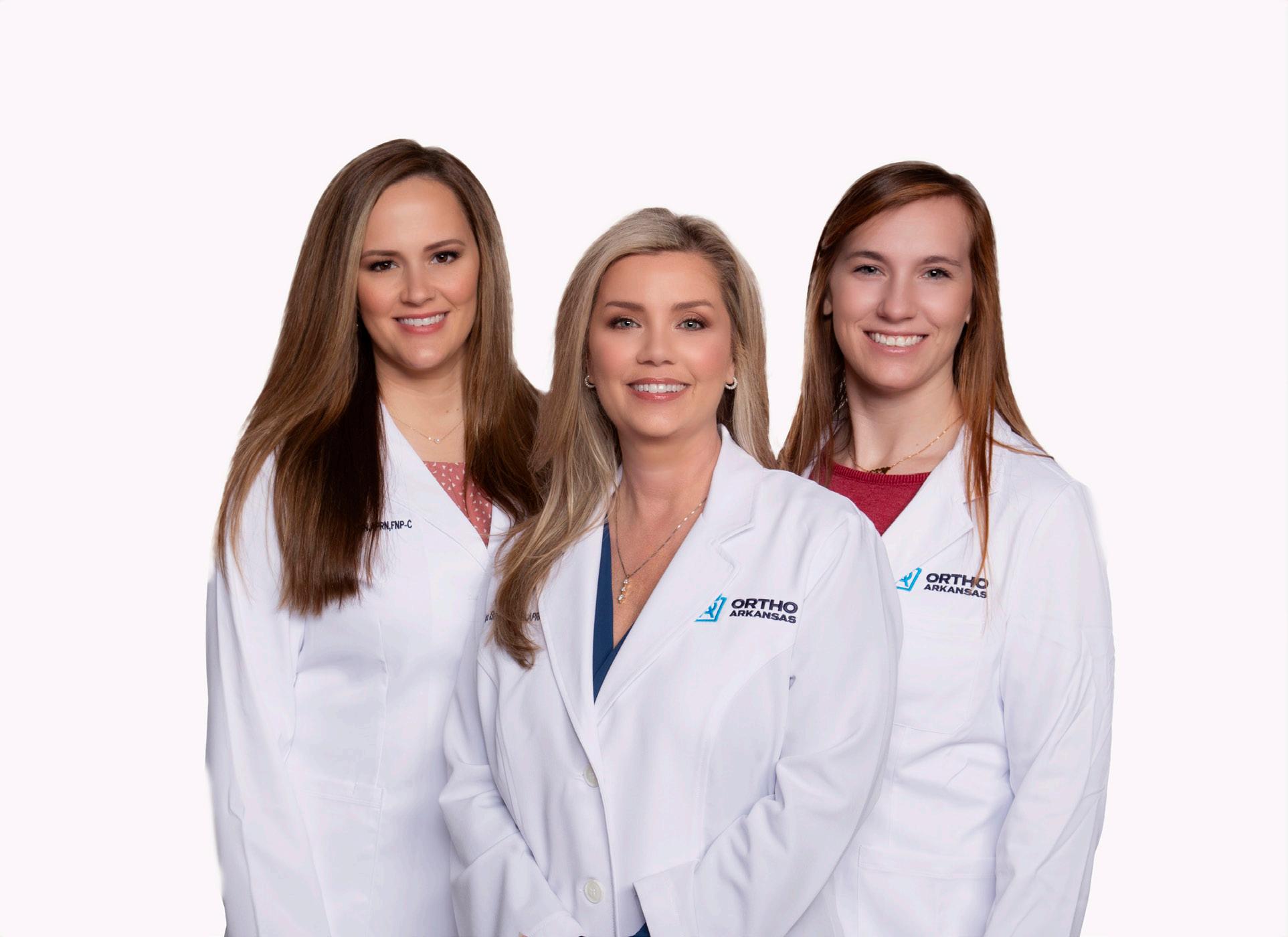

The company tagline — tiny scale, massive impact — effectively conveys the concept behind the commercialization of graphene, of which Fayetteville sits on the cutting edge and NTS Innovations seeks to market.

NTS is a Florida-based firm with a location at the Arkansas Research and Technology Park in Fayetteville, where the firm hopes to commercialize the groundbreaking research of University of Arkansas scientists pertaining to graphene energy harvesting.
Graphene is a microscopic, naturally modified structure extracted from graphite. Made of pure carbon, it consists of a single layer of atoms arranged in a hexagonal lattice. Though graphene had existed in theory for decades and had likely been discovered unintentionally through various applications of graphite on metal surfaces, it was 2004 before graphene was isolated and identified at the University of Manchester in England. That work earned the Manchester scientists a Nobel Prize.
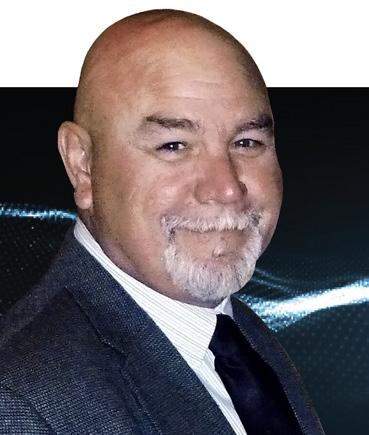
modern-day mithril from Tolkien’s legendarium is currently used for small-scale applications such as electronics, energy storage, sensors and biomedical devices. If the effective use of graphene could be scaled up, the material’s potential is vast.
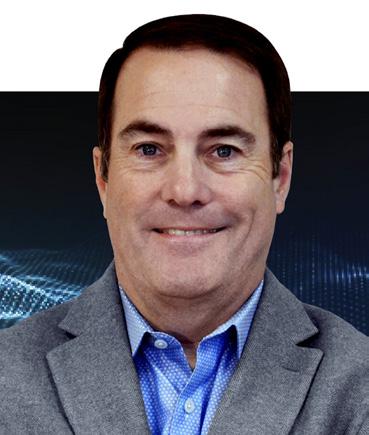
Graphene is known for its extreme strength, light weight, flexibility, transparency, endurance and ability to absorb light of all visible wavelengths. Plus, it is an efficient conductor of heat and electricity. It represents the strongest material ever measured at a microscopic level, according to research published in Science and Nature Connections.
“Graphene has become a valuable and useful nanomaterial due to its exceptionally high tensile strength, electrical conductivity, transparency and ultra-thinness,” said Tom Buzzell, chief operating officer at NTS.
Urban legend even says graphene can stop a bullet. The
“Graphene is the strongest material ever tested in a laboratory and comprises a single layer of carbon atoms,” Buzzell said. “The Royal Swedish Academy of Sciences illustrated that a one-square-meter graphene hammock would support a 4-kilogram cat but would weigh only as much as one of the cat’s whiskers. As with any nanomaterial, graphene requires specific procedures and careful handling steps to confirm and preserve its quality.”
That is where the work being done by UA researchers in Fayetteville comes in. Physicist Paul Thibado and his team invented a process called graphene energy harvesting that could help scientists preserve the material’s quality as it is scaled up for use with larger devices. Their work in this area spans almost a decade.
“The group was studying the properties of graphene using a scanning tunneling microscope and observed behavior in freestanding graphene they theorized could be leveraged for energy harvesting,” said NTS CEO Don Meyer.
“Since then, the group has been rigorously researching the topic and have produced several groundbreaking papers.”
Energy harvesting derives energy from the ambient environment for storage or use by electronic devices.
“Traditional sources of ambient energy include light, vibration, radio waves, temperature gradients and more,” Meyer said. “What is unique about graphene energy harvesting is the ability
to create nanoscale ‘harvesters’ that can be operated in locations and form factors where traditional harvesting methods are not practical due to cost, size or environmental limitations.”
The graphene energy harvester being developed by Tibado and his team entails the design of a graphene circuit capable of gathering energy from the heat of the earth and storing it in capacitors for later use. It is potentially groundbreaking stuff. The energy harvester could also apply to other microscopic materials.
“The ability to harvest energy in all types of ambient environments at nanoscale is a gamechanging opportunity,” said Ryan McCoy, vice president of sales and marketing at NTS. “Imagine having an energy harvester small enough to implement directly into electronic devices. Today, wireless sensor networks typically rely on finite batteries. Batteries are desirable because they allow sensors to be placed remotely without the need to be hardwired. Eventually, however, batteries run out and need to be replaced or recharged.”
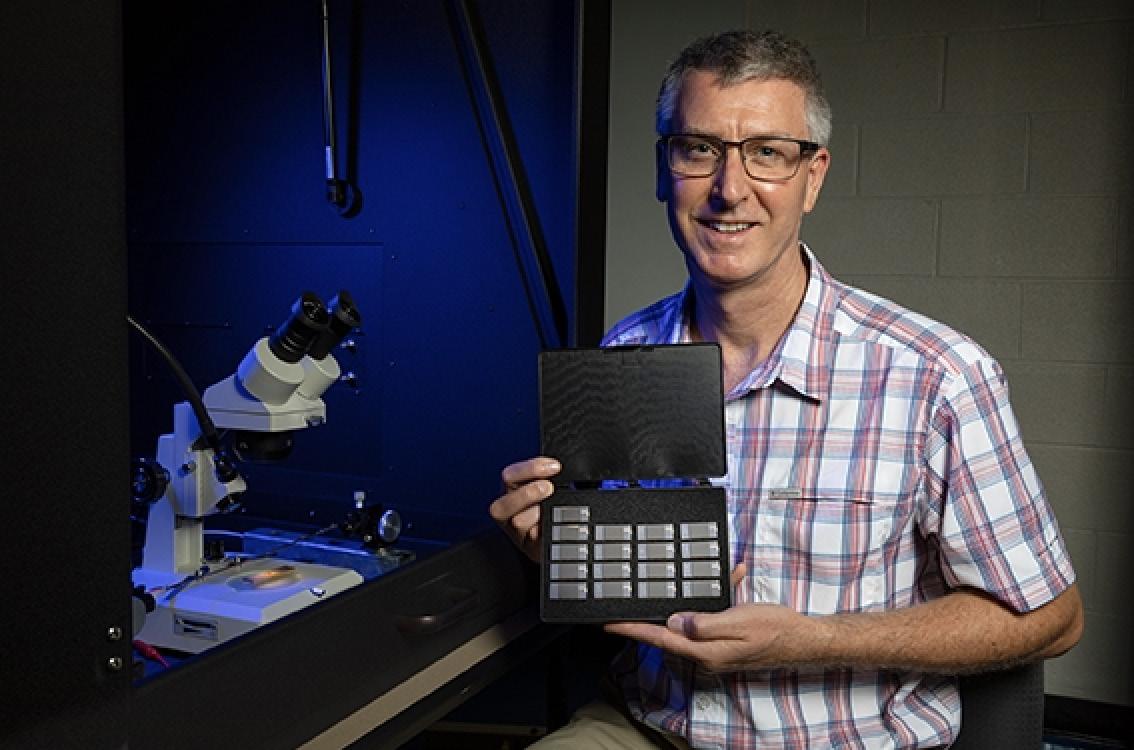
When multiplied by billions of sensors, labor to change the batteries is costly and cumbersome, and the environmental impact of disposed batteries becomes a concern, he added.
“Being able to lengthen battery life or, in some cases, completely self-power electronics is an exciting prospect of graphene energy harvesting,” McCoy said.
In 2020, Tibado’s team created a circuit capable of capturing graphene’s thermal motion and converting it into an electrical current.
“There was always this question out there: ‘If our graphene device is in a really quiet, really dark environment, would it harvest any energy or not?’ The conventional answer to that is no, as it apparently defies the laws of physics, but the physics had never been looked at carefully,” he said. “I think people were afraid of the topic a bit, so everybody just said, ‘I’m not touching that,’ but the question just kept demanding our attention. Honestly, its solution was only found through the perseverance and diverse approaches of our unique team.”
The kicker, of course, is making the process work reliably and affordably on a bigger stage. Buzzell said one of the challenges has been scaling graphene production for use in bulky products such as building materials, composites and batteries at a cost acceptable to the marketplace.
“In the past few years, graphene production has made strides in terms of increasing volume and quality of material, as well as reducing price,” he said. “For example, as of 2021, Ford Motor Co. has begun using graphene-enhanced components in multiple areas of its vehicles.”
Ford developed a graphene-enhanced polyurethane foam that reduces noise in vehicles while also lowering their weight. The foam is now used in all Ford’s North American vehicles. One of the biggest challenges was dispersing graphene into a viscous polymer and keeping it from collapsing during mixing, Ford officials reported at a recent polyurethane industry conference.
NTS was founded in 2016 to commercialize nanotechnology. It acquired its first license to commercialize graphene energy harvesting from the UA in 2018, set up shop inside the Innovation Center on the research park campus and has since partnered with the university on two more related licenses.
Meyer said the setup in Fayetteville has enabled NTS to effectively collaborate with UA students and staff and leverage the university’s talent pool through the hiring of full- and parttime staff and interns. Now, the firm is preparing for the next step in the process.
“NTS has engaged with over 100 organizations regarding interest in graphene energy harvesting and is currently involved in investor and partnership discussions,” he said. “In parallel with GEH, NTS is also developing other energy harvesting components, including a patent-pending form of rectification for existing transducers.”

P.J. Haynie farms on the same Virginia land that his family has had for five generations using some of the same conservation practices his relatives have employed for decades to maintain the land.
He also farms on land near Pine Bluff, growing rice, corn and soybeans in Phillips, Lee and Jefferson counties. He was a finalist for 2024 U.S. Top Farm Producer of the Year.
“It’s a real honor to be a farmer and farm on the land my family has had, but it’s a challenge,” Haynie said.
The challenges are even greater now, he said, because Congress stalled in an attempt to enact a new Farm Bill. The bill, updated in 2018, set policy and funding for farm, food and conservation practices. It is set for review every five years, but legislators are grappling over a couple of major items.
At issue is what Haynie calls the “safety net” of payments to farmers for conservation practices. Programs the bill could fund include building reservoirs and tailwater recovery pits that can recirculate water and save farmers expensive irrigation costs. The bill can also pay for rotational crop grazing.
It has become a partisan struggle. Republicans see the bill’s Inflation Reduction Act appropriations for conservation programs as creating a surplus funding pool for the farm legislation. Dem-
ocrats say the $20 billion appropriated to land-saving measures is necessary and vital to farming success.
“This funding makes sure we have one of the most safe and abundant food-secure nations in the world,” Haynie said. “When you say grace over your dinner tonight, you need to thank a farmer for putting it there.”
Legislators are also disagreeing on funding for the Supplemental Nutrition Assistance Program, once known as food stamps. Republicans want to put more restrictions on funding that would limit disbursements. Democrats say that would jeopardize the bill.
“The problem is that we don’t have a true farm representation doing this,” Haynie said of the legislative debate over the Farm Bill. “There’s not enough dirty boots under the table making decisions.”
Rep. Rick Crawford (R-Arkansas) said some of the delays in approving a new farm bill boil down to partisan politics. Crawford represents Arkansas’ 1st District, which covers most of the Delta.
“Unfortunately, the Farm Bill has evolved into partisan issues,” he said. “The contentiousness between parties is the most difficult part.”
Crawford said the Farm Bill is steeped in science and takes into consideration climate change. While some say temperatures are constantly rising, Crawford and other Republicans want more evidence of global warming before committing to what they view as expensive provisions of the bill.
“We know the climate is changing,” he said. “It’s been changing since time began, but we run into issues with the other side if you don’t agree with everything they say. We’re called ‘science deniers.’ We’re not denying science. If we don’t question facts, it won’t be an intellectual and honest discussion.”
It is those kinds of debates that have farmers concerned about the revised Farm Bill’s future and potential cuts that could hurt their operations.
Jared and Lindi Phillips raise about 60 sheep on their Branch Mountain Farm in Washington County.
“Most farmers practice conservation practices anyway,” Jared Phillips said. “That’s just good farming. It’s common sense, but I don’t understand the cuts in conservation funding. It’s good business. It makes good sense. It’s a huge investment to invest in yourselves without having to get loans. The government has offered funding to do what we probably have already done.”
He said he does not think the bill, which expired in September and is now enacted in a provisional mode, will be renewed before the presidential election in November.
Phillips and Haynie, along with scores of other Arkansas farmers, are participating in a campaign that raises awareness of potential cuts to the Farm Bill. The campaign, called Invest in Our Land, is running advertisements and informational notices via television, online and print venues across the state. The campaign is also working with farmers and ranchers in 10 other states to promote keeping conservation practices intact.
“[The Farm Bill] policies are good for business and for the state of Arkansas,” Phillips said.
If the bill is not renewed with the conservation practices still in place, it will “change the game for farmers across the state,” he said, adding, “This will pass on to the next generation of farmers.”
He said the current Farm Bill helps small farmers remain viable.
“We used conservation practices and saved money,” he said. “We saw a 20- to 30-percent jump in productivity using those practices. This bill is a make-or-break deal for many.”
In addition to working with Invest in Our Land, Haynie is the chairman of the National Black Growers Council, an agency striving to increase efficiency, productivity and sustainability of Black farmers.
Black farmers comprise about only 2 percent of all American farmers, Haynie said. Of those farmers, only 8 percent are row-crop farmers, he added.
“Black farmers are historically underserved,” Haynie said. “We need to get diversity in all programs.”
He said any cuts in the Farm Bill funding would be yet another detriment both Black and white farmers will face.
“This really isn’t a Black and white issue,” he said. “It’s an all-farmer issue. We step out on the limb of faith to farm. It’s a real honor to be a farmer, but it has its challenges.”
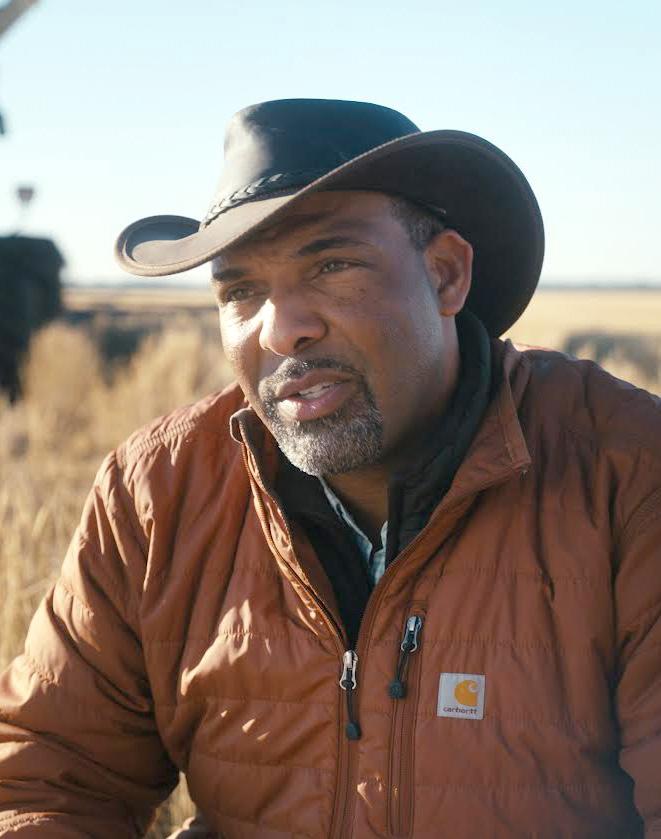
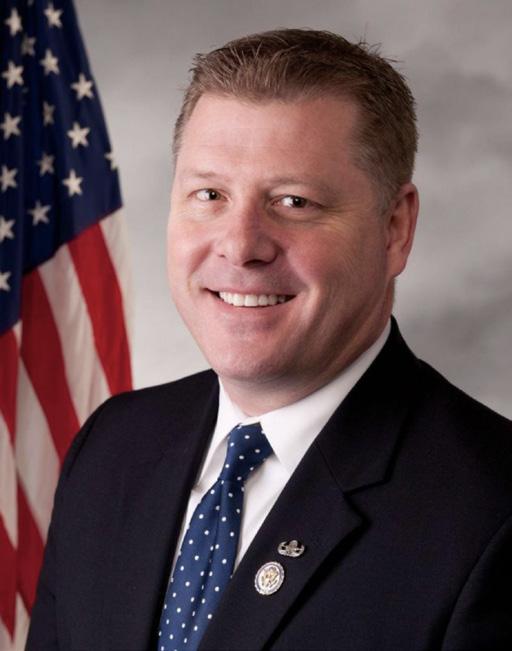
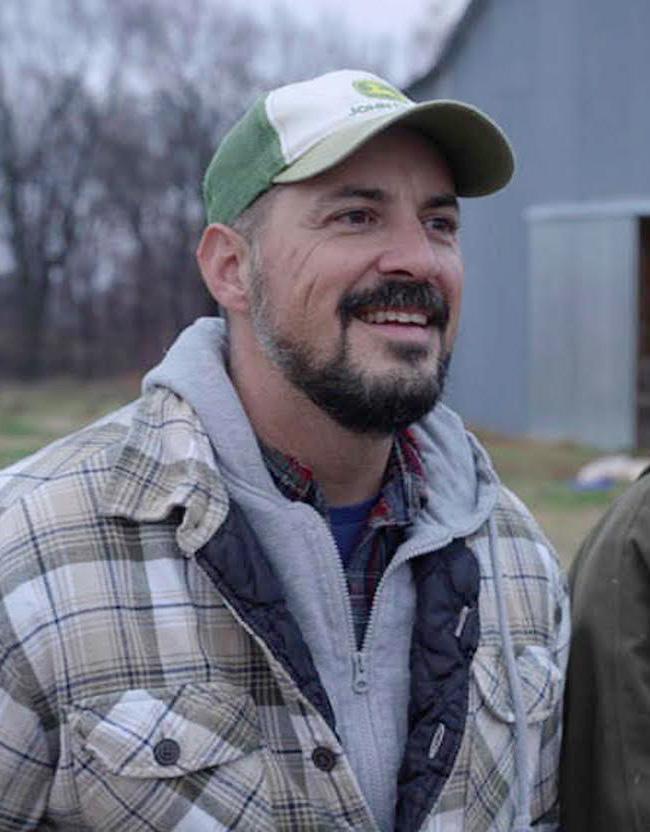


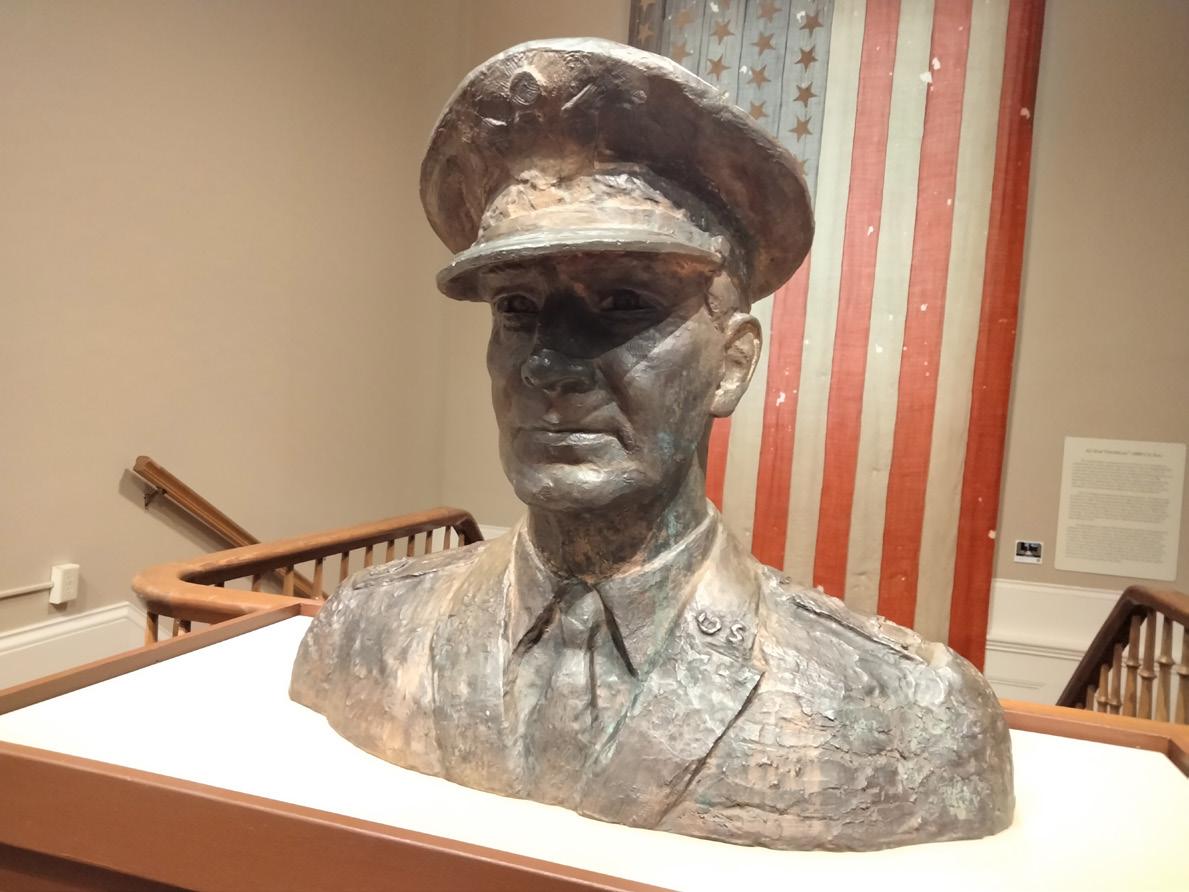
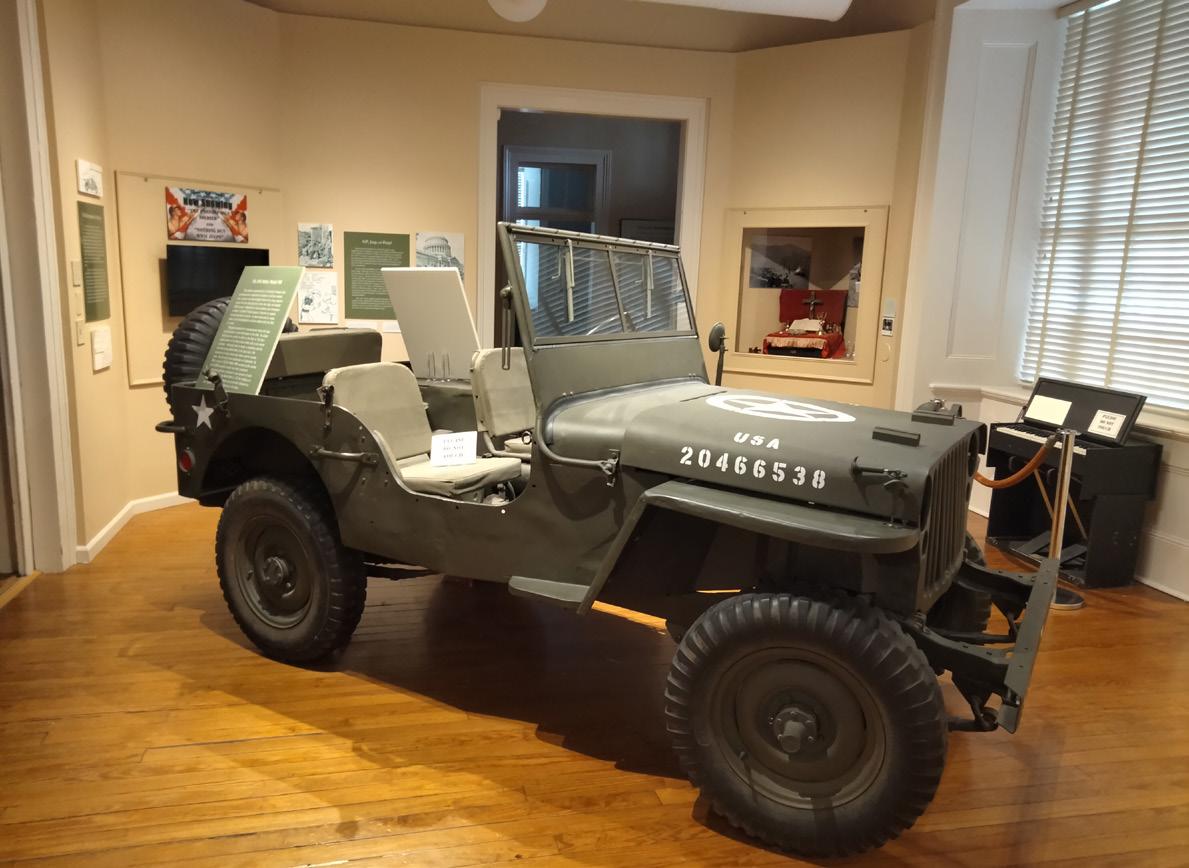
The Tower Building that houses the MacArthur Museum of Arkansas Military History in downtown Little Rock’s MacArthur Park is one of the most iconic buildings in Arkansas, as well as one of the oldest structures in central Arkansas. Built in 1840 as a munitions warehouse for the U.S. Army, the building boasts exterior walls that are three feet thick.
The building’s claim to fame, of course, aside from a near disastrous confrontation during the Civil War, is its status as birthplace of U.S. Army Gen. Douglas MacArthur, whose name now adorns the museum, as well as the park that surrounds it.
The Tower Building was part of the old Little Rock Arsenal, which was established in 1836 to store “munitions and weapons in defense of the frontier,” the museum’s website states. More than 30 buildings were constructed on the 36-acre site, including an armory, officers’ quarters, barracks for enlisted men and more. The Tower Building, constructed in 1840, is the last building standing from those that filled the 36-acre site.
The arsenal almost became a flashpoint at the onset of the Civil War. According to the museum’s history page:
In February 1861, armed citizens threatened to seize the arsenal in anticipation of Arkansas’ secession from the Union. A confrontation was averted when authorities
Museum exhibits include a bust of Gen. Douglas MacArthur, top, who was born in the building that houses the museum, and a U.S. Army Jeep from World War II.
negotiated a peaceful compromise with the commander, Capt. James Totten, and federal troops withdrew from Little Rock.
After Arkansas seceded in May 1861, Confederate forces used the arsenal until Sept. 11, 1863, when Union troops commanded by Gen. Frederick Steele captured Little Rock. Renamed the Little Rock Barracks in 1873, the post was used to garrison troops until it closed in 1890. Shane Lind, program coordinator for the museum, said the Army converted the Tower Building to officers’ quarters after the war ended and added white porches to provide a homier setting. White porches still adorn the building’s facade today.
The Army was gone by 1892, having traded the arsenal property to the city of Little
Rock for 1,000 acres atop “Big Rock” overlooking the Arkansas River in what is now North Little Rock. It took all the buildings with it save for the seemingly impregnable Tower Building. The federal government transferred ownership of the old arsenal property to Little Rock on the condition that it always be used as a park.
Before the arsenal hopped the river to become Fort Roots, its legacy was set in motion in 1879. That was when Capt. Arthur MacArthur Jr. was transferred to Little Rock with his wife, seven months pregnant, and two young sons in tow. On Jan. 26, 1880, inside the family’s quarters on the second floor of the Tower Building, Mary MacArthur gave birth to her third son, Douglas, the future five-star general and commander of Army forces in the Pacific theater during World War II.
Six months later, McArthur was transferred again, but Little Rock’s role in the legacy was set in the story of one of the nation’s most decorated military leaders.
The city did indeed develop its first municipal park, MacArthur Park, on the site of the old arsenal, but the Tower Building went unused until 1942. After undergoing renovations, it became home of the Arkansas Museum of Natural History and Antiquities (later the Museum of Science and Natural History and, much later, the Museum of Discovery), which occupied the building until 1997.
This time, the city would not allow the building to sit empty for long, Lind said. In 2001, the McArthur Museum of Military History was opened and dedicated to preserving the military history of Arkansas, which includes its connection to MacArthur.
Lind said McArthur made it back to Little Rock just once, in 1952, after he had retired from service. Still one of the most famous people on the planet, McArthur made a whirlwind five-hour stop in Arkansas’ capitol city and visited the old arsenal site. A crowd estimated at 10,000 gathered in the park to hear him speak, Lind said.
The Tower Building remained the park’s structural anchor until 1937 when Little Rock’s original Museum of Fine Arts was opened. That museum became the Arkansas Arts Center in 1963, and in 2022 the reimagined Arkansas Museum of Fine Arts took its place.
The art museum represents the biggest draw to MacArthur Park, and Lind said the military museum benefits from the increased traffic.
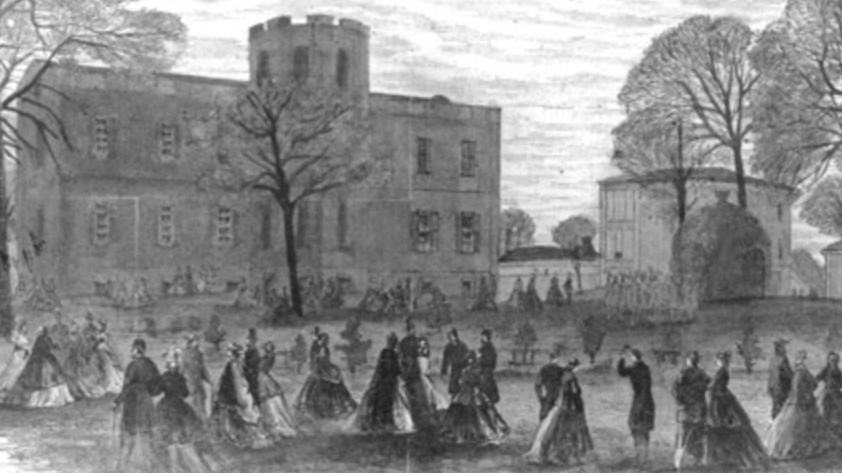

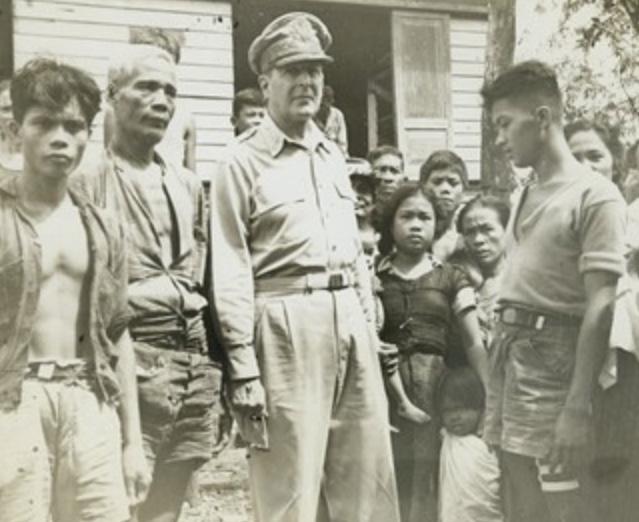
Including off-site and online programs, it reached a record 40,000 people in 2023, he said.
Those who find their way into the Tower Building will discover the MacArthur Museum’s powerful collection of artifacts and exhibits depicting the experiences of Arkansas’ war veterans and more. Artifacts include uniforms, photographs, weapons, documents and other items that help portray the experiences of Arkansas military veterans.
Permanent exhibits include “From Turbulence to Tranquility: The Little Rock Arsenal,” “Capital in Crisis: Little Rock and the Civil War,” “First Call: American Posters of World War I,” “The Sun Never Sets on the Mighty Jeep: The Jeep During World War II,” “Duty, Honor and Country: Gen. Douglas MacArthur” and “By the President in the Name of Congress: Arkansas’ Medal of Honor Recipients.”
Current exhibits on display through April 21 tackle the Doolittle Raiders; Japanese-American soldiers in WWII;
the fight for women’s suffrage through political cartoons and their connections to WWI propaganda; Vietnam through the photography of Jim Guy Tucker, the former Arkansas governor, and Bruce Wesson, both of whom served in the military after graduating from Little Rock’s Hall High School in 1961; and photos, letters and more from Arkansans who fought in the Civil War.
Virtual exhibits include the photography of U.S. Army Sgt. Albert Morgan Jr., another Little Rock native deployed to Vietnam, and the Allison collection of WWII photographs. In 1977, former Houston Press sportswriter James Allison donated his collection of war photographs to the Arkansas Museum of Science and Natural History. These were photos not printed in the daily newspaper. Allison received permission to save the images, which by the war’s end totaled more than 4,600, many of them graphic. The MacArthur Museum now owns and preserves the photos, Lind said.
The museum also offers specialized guided tours for groups and schools designed to meet specific curriculum or grade-level needs. Important history lives on at the MacArthur Museum symbolically through the photos and exhibits, and perhaps, it does so otherwise as well. The Tower Building has long had a reputation
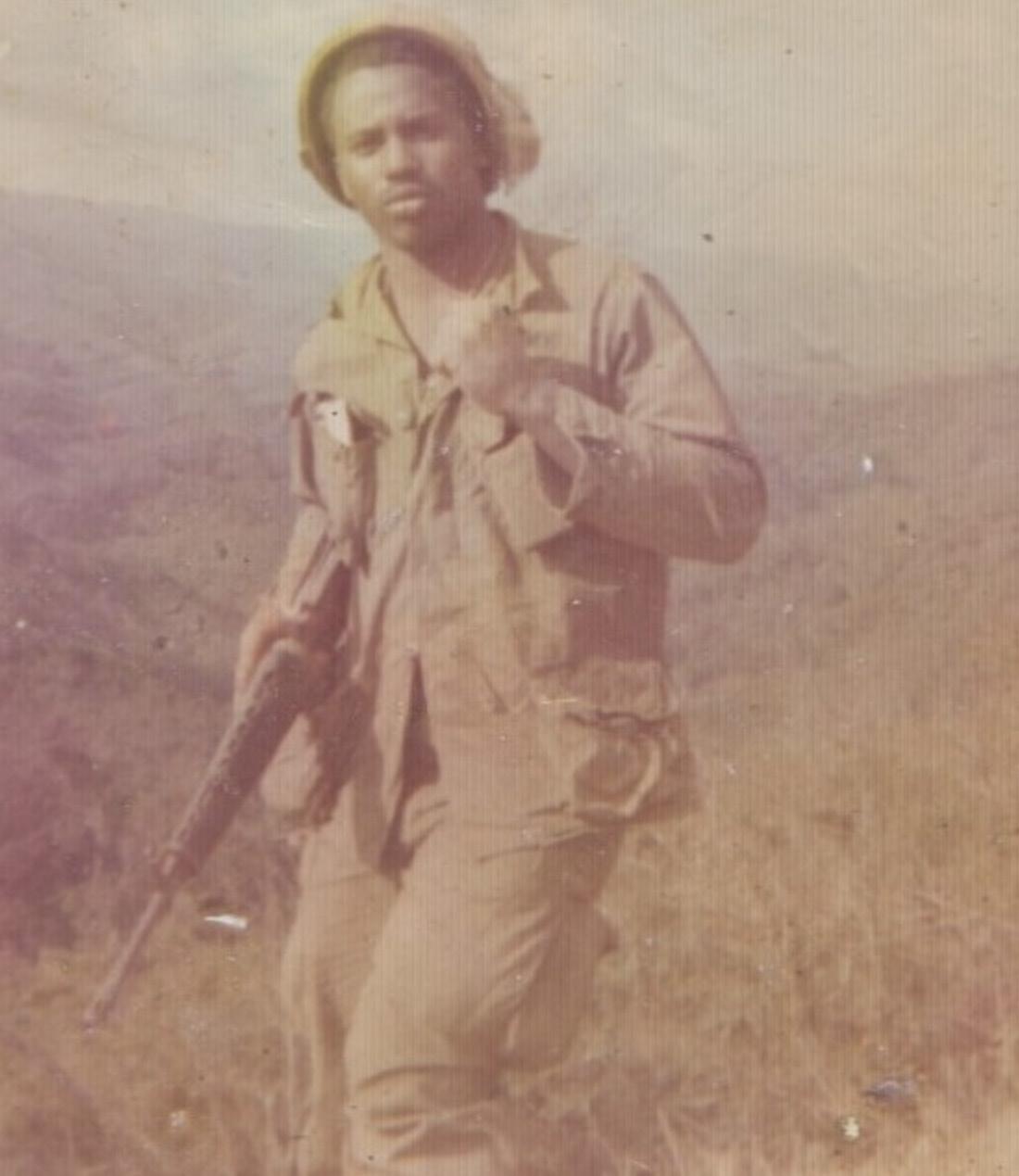
Though the house ghost goes by “Sarge,” Linn said visitors have reported seeing images of a woman and a young child, as well as a man in uniform.
for being haunted. It has even drawn the inspection of so-called ghost hunters. Even the most ardent ghost debunker would have to concede that it certainly looks haunted.
Lind spends most days inside the structure, and while he will not admit to a haunting, neither will he rule one out.
“People say they’ve seen and heard things on the top floor,” Linn said.
Though the house ghost goes by “Sarge,” Linn said visitors have reported seeing images of a woman and a young child, as well as a man in uniform.
“I’ve never seen a ghost, but I hear things,” Linn said. “I don’t pay much attention anymore. I figure I’ll leave them alone, and they’ll leave me alone.”
Linn said it is not uncommon for visitors to experience cold spots or see shadows moving in their peripheral vision. His most tangible, possibly otherworldly experience came about five years ago, he said.
“I had closed up the building and was going around turning off all the lights,” he said. “This is before we had an automated system and motion detectors put in. I was about to walk out when I heard footsteps on [the tower] staircase. I just thought, ‘Well, I’ve locked somebody in here.’ I looked and nobody was there.”
Linn added that he heard tangible footsteps coming down the stairs.
“Those old stairs make a particular noise when you walk on them, and I heard it, but no one was there.”
Linn said he likely puts it down to residual energy, a concept that attributes such phenomena to energy imprints of past events on replay mode inside a certain location.
If such a thing as residual energy does indeed exist, the MacArthur Museum no doubt is on a constant loop — there are few places in Arkansas better equipped to relive history, after all.
The museum, located at 503 E. Ninth St., is open Tuesday through Saturday from 10 a.m. to 5 p.m. and Sunday from 1 p.m. to 5 p.m. Admission is free, but donations are appreciated. In addition to Mondays, the museum is closed Thanksgiving Day, Christmas Eve, Christmas Day and New Year’s Day.
The museum, overseen by the city’s parks and recreation division, made Monday exception on April 8, the day of the total eclipse expected to cast a complete shadow over much of the state. Thousands were expected in downtown Little Rock that day, and the Museum of Fine Arts hosted a watch party on its lawn next to the Tower Building.
“We’ve already been pretty busy this March,” Linn said before the eclipse. “The way spring break lined up in other states, it seems like we had three spring breaks in a row, so we’ll be ready.”
For more information on the MacArthur Museum of Arkansas Military History, visit LittleRock.gov/MacArthur, email MacArthur@LittleRock.gov or call 501-376-4602.
Iwas talking to a friend who lives in Little Rock recently when the wailing of tornado sirens near her home came through her telephone.
She became terrified, and she had the right to be.
She was living in west Little Rock when the March 2023 tornado bore down on that area, making a direct bee-line to her apart ment complex that afternoon. She said she had been outside and no ticed the quiet, muggy weather that’s con ducive to a tor nado’s forma tion. The sirens began, and she immediately heard the roaring of the approaching tornado.
As the twister be gan tearing through the complex just off Reservoir Road, she huddled in a tiny bathroom with her two cats and waited. In a few seconds, it was over, but it seemed like a lifetime.
The tornado tore the roof off of her twostory apartment and destroyed most of her belongings.
Since then, she had moved to an apart ment near downtown, and now, a year after that devastating strike at her home, the si rens began screaming again.
The system was following a similar path as that storm from a year ago, but it did not drop a tornado this time. It passed, and the sirens eventually became silent. Still, it was unnerving, and my friend was an emotional wreck.
National Weather Service in North Little Rock says there is an average of 37 tornadoes a year in Arkansas. Many are short-lived and don’t hit urban areas, but there are always a few.
When I was the northeast Arkansas bureau reporter for the Arkansas Democrat-Gazette, I covered weather for the newspaper. It wasn’t because I had any meteorological background. It was because the storms always passed through my area last before leaving the state, and I’d always have to write the latest updates for our stories if any damage ensued here. I decided I’d just take over the whole cover-

She had become a member of the fraternity of twister survivors who then had to go through another traumatizing scare.
There are scores of them throughout the state, and the group grows each year. The
I never saw a tornado in the 20 years I was with the paper, but I did see the aftermaths of dozens of them. People would stand amongst the splintered wreckage of their homes, stunned, staring blankly and wondering what they would do next.
I was in Manila, covering an EF4 tornado that ripped through the Mississippi County town in April 1998 and killed two children. While I talked to workers at the town’s school, which had been converted into a makeshift shelter, the following morning, another tornado was spotted forming near the town, and the sirens there went off. Those in the shelter feared the twister would hit
I’ve seen tornado damage in Marmaduke (twice), Beebe, Earle, West Memphis and that horrific one in Vilonia in April 2014, but I never saw a tornado actually spinning on the ground in all those years.
Then, on March 20, 2020, three years after I had Democrat-Gazette, I was working weekends as a security officer at a Jonesboro assisted living and senior apartment complex.
A tornado suddenly dropped to the south of the complex, and we had to rush the residents into a basement shelter. I looked out a window and saw the twister. I thought it was right on us. Fortunately, I was wrong. It was still at least a couple of miles from us, but the size of it and its noise were misleading.
It passed east of us, but as I watched the live television coverage of it, I saw the tornado continue to grow and head toward the Jonesboro airport and the area where my wife and I live.
My wife huddled in the bathroom and waited it out. It missed us. It hit a subdivision a couple of miles east of us. But still, it was terrifying.
Now, when the tornado sirens begin their ominous moans, it takes on a different meaning. My wife and I were spared in 2020, but others weren’t, and now a friend of mine has gone through a tornadic event, and it has changed her.
It’s April now, one of the more popular months for tornadoes. The sounds of spring will include those sirens, and others will join that fraternity that keeps growing.
We listen carefully, thoughtfully analyze how our processes, services and technologies impact your experience, and customize solutions to meet your supply chain needs. It’s more than just knowing your business — it’s about developing true connections, so when you need help with a problem, you know just who to call.

Ship freight anywhere, at any time, and effectively manage your supply chain — no matter the size of the shipment, type of product or speed of delivery.
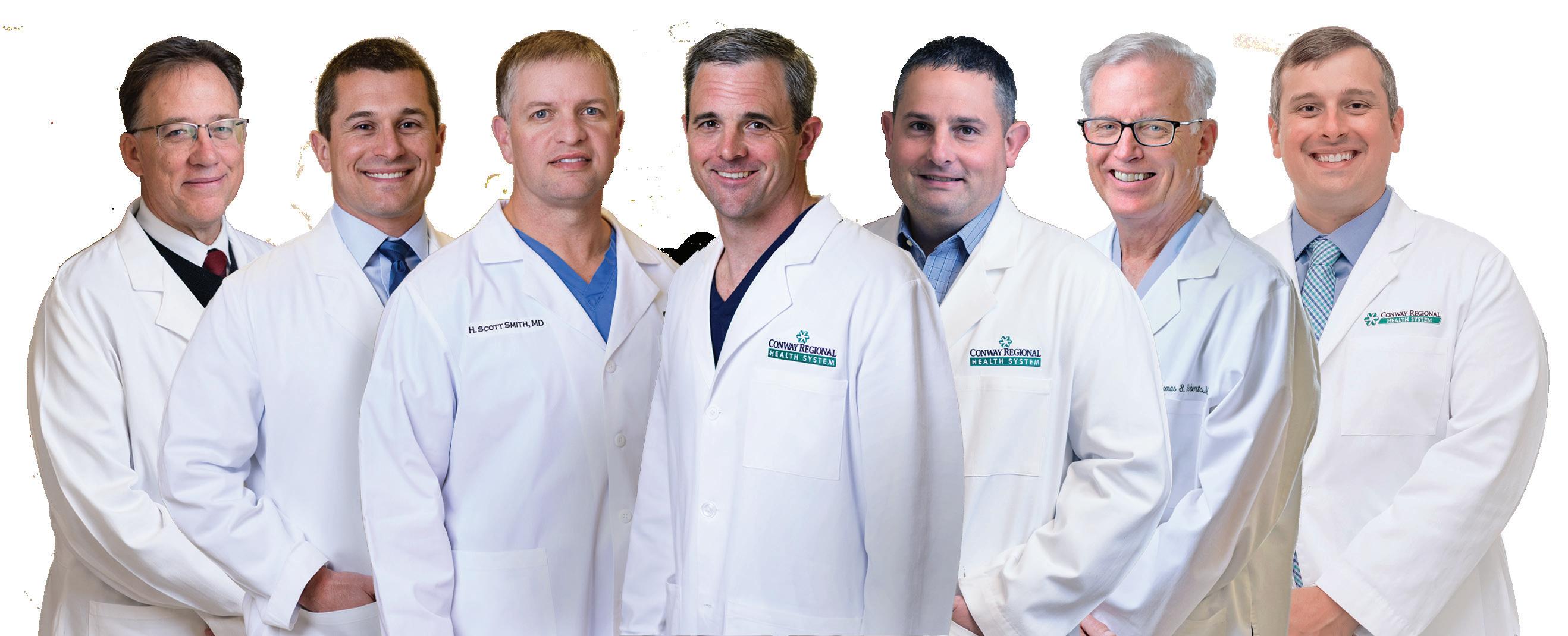

At Conway Regional, our team of talented orthopedic surgeons and specialists are dedicated to helping you regain mobility and recover from injury and disease. We are honored to have been voted "Best Sports Medicine Clinic” in the state by the readers of AY Magazine and “Most Admired Company” by readers of AMP for multiple years. Several of our surgeons have also been voted AY’s Best for muriple years in a row.
2023
MOSTADMIRED COMPANIES
Learn more about our award-winning providers at ConwayRegional.org.
2023
Left to Right: J. Tod Ghormley, MD, James Head, MD, Scott Smith, MD, Grant Bennett, MD, James Howell, MD, Tom Roberts, MD, and Bryan Head, MD